BSc (Hons) Nursing - Student Academic and Professional Portfolio
VerifiedAdded on 2023/04/20
|88
|11105
|210
AI Summary
The BSc (Hons) Nursing - Student Academic and Professional Portfolio is designed to represent a comprehensive record of learning achievements throughout the nursing course at Anglia Ruskin University. It helps students record, evaluate, and reflect on their progress during their course of study leading to registration as a nurse. The portfolio also supports the development of professional skills, digital literacy, graduate attributes, and the demonstration of NHS values.
Contribute Materials
Your contribution can guide someone’s learning journey. Share your
documents today.
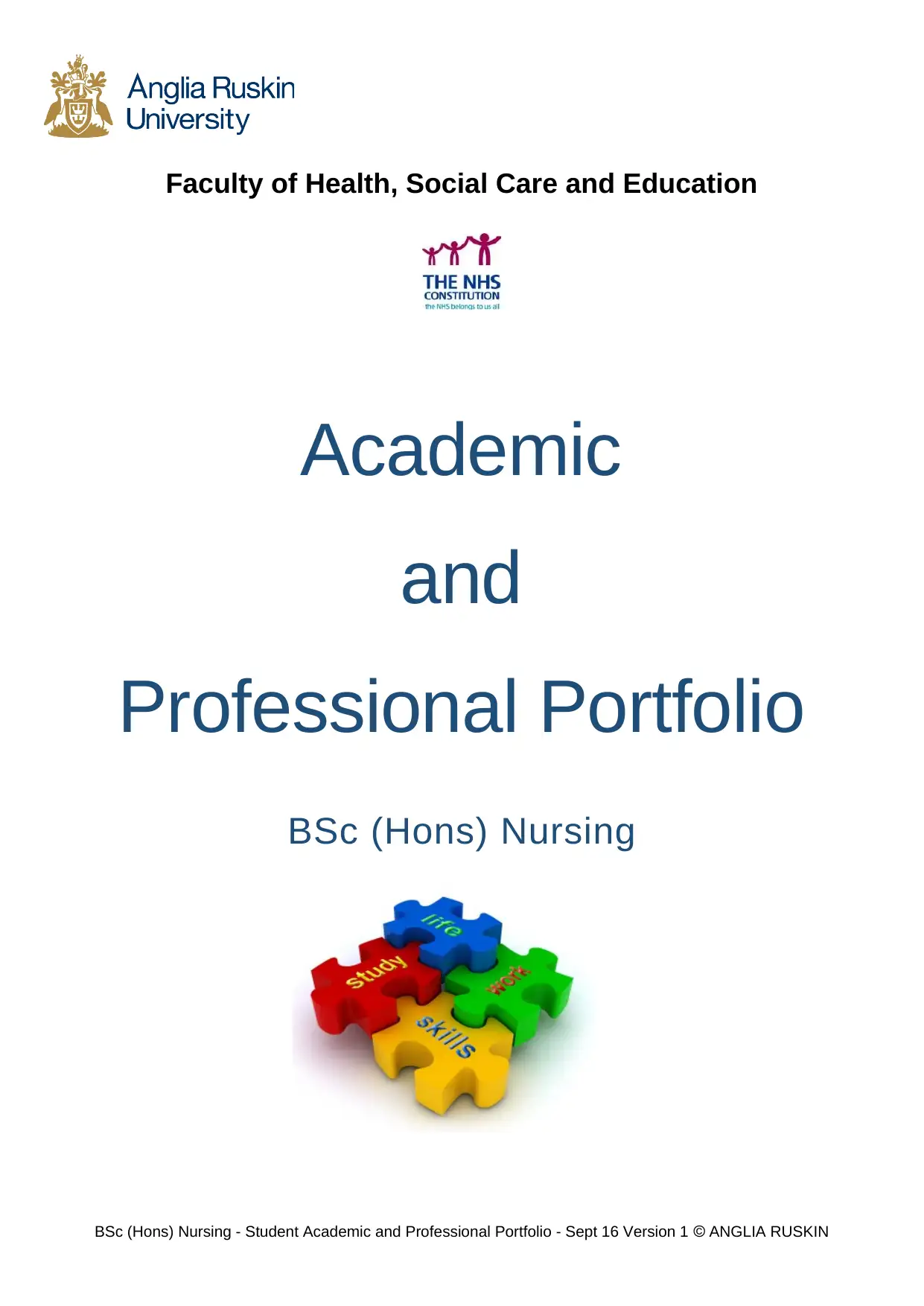
Faculty of Health, Social Care and Education
Academic
and
Professional Portfolio
BSc (Hons) Nursing
BSc (Hons) Nursing - Student Academic and Professional Portfolio - Sept 16 Version 1 ANGLIA RUSKIN
Academic
and
Professional Portfolio
BSc (Hons) Nursing
BSc (Hons) Nursing - Student Academic and Professional Portfolio - Sept 16 Version 1 ANGLIA RUSKIN
Secure Best Marks with AI Grader
Need help grading? Try our AI Grader for instant feedback on your assignments.
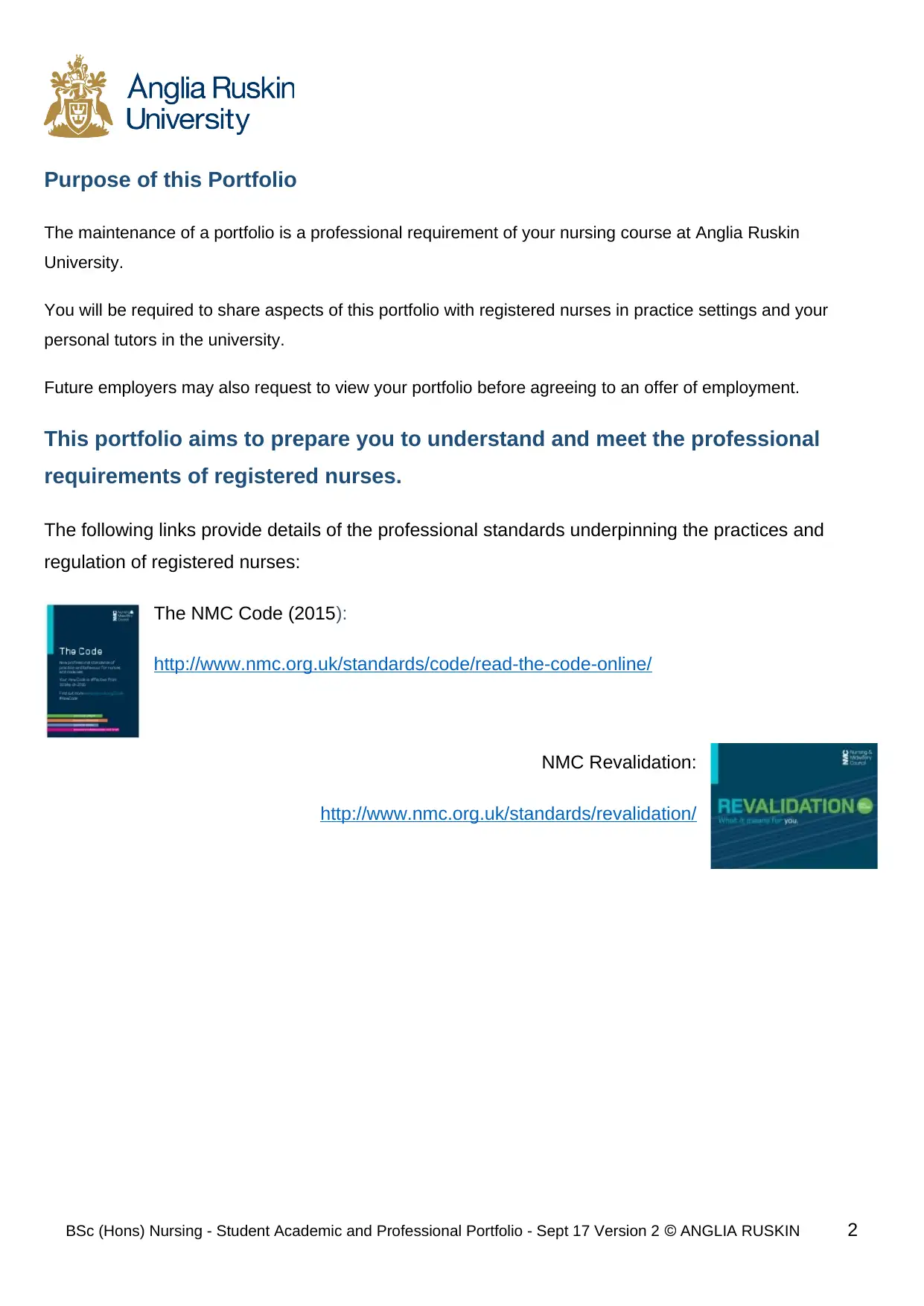
Purpose of this Portfolio
The maintenance of a portfolio is a professional requirement of your nursing course at Anglia Ruskin
University.
You will be required to share aspects of this portfolio with registered nurses in practice settings and your
personal tutors in the university.
Future employers may also request to view your portfolio before agreeing to an offer of employment.
This portfolio aims to prepare you to understand and meet the professional
requirements of registered nurses.
The following links provide details of the professional standards underpinning the practices and
regulation of registered nurses:
The NMC Code (2015):
http://www.nmc.org.uk/standards/code/read-the-code-online/
NMC Revalidation:
http://www.nmc.org.uk/standards/revalidation/
BSc (Hons) Nursing - Student Academic and Professional Portfolio - Sept 17 Version 2 ANGLIA RUSKIN 2
The maintenance of a portfolio is a professional requirement of your nursing course at Anglia Ruskin
University.
You will be required to share aspects of this portfolio with registered nurses in practice settings and your
personal tutors in the university.
Future employers may also request to view your portfolio before agreeing to an offer of employment.
This portfolio aims to prepare you to understand and meet the professional
requirements of registered nurses.
The following links provide details of the professional standards underpinning the practices and
regulation of registered nurses:
The NMC Code (2015):
http://www.nmc.org.uk/standards/code/read-the-code-online/
NMC Revalidation:
http://www.nmc.org.uk/standards/revalidation/
BSc (Hons) Nursing - Student Academic and Professional Portfolio - Sept 17 Version 2 ANGLIA RUSKIN 2
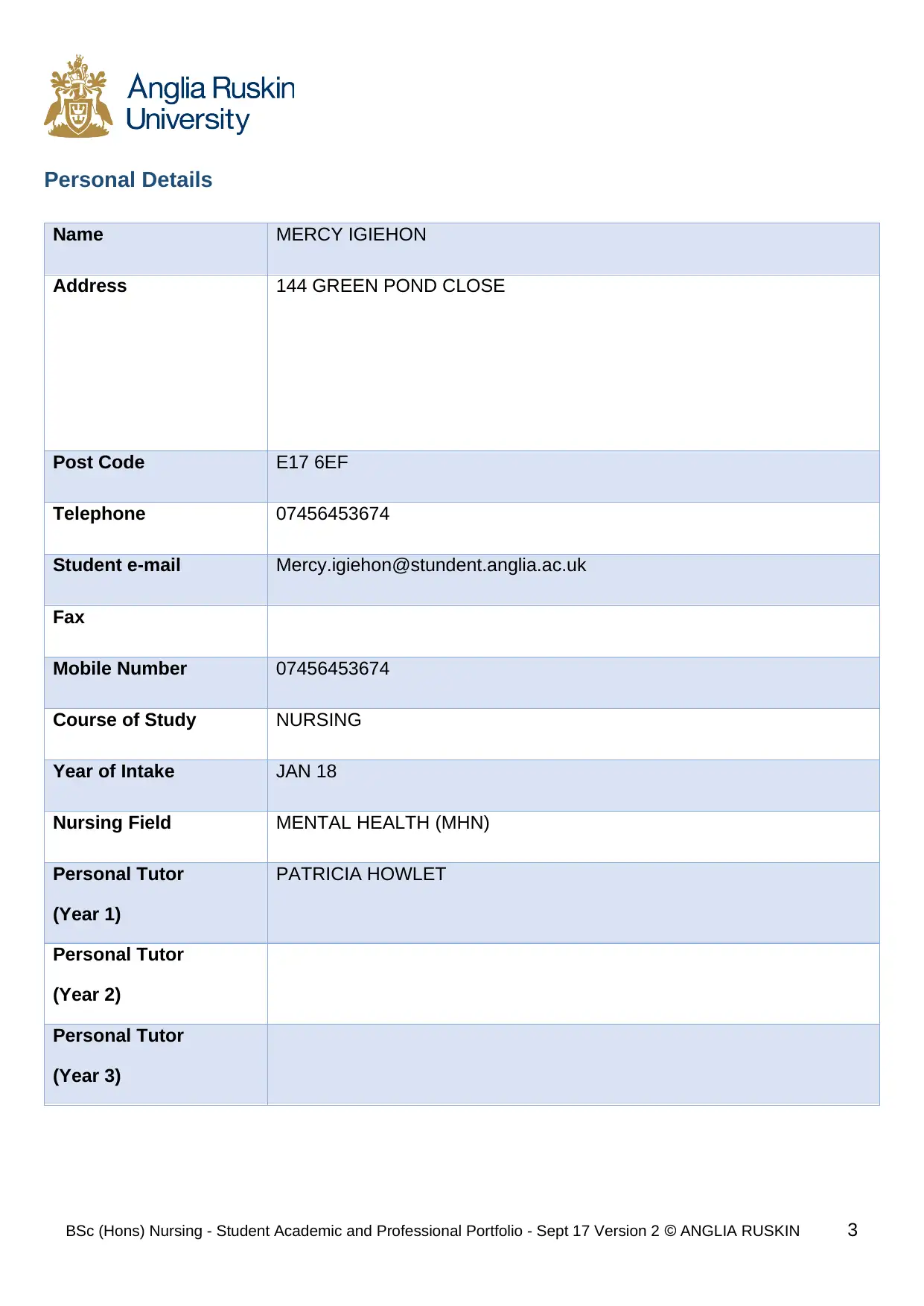
Personal Details
Name MERCY IGIEHON
Address 144 GREEN POND CLOSE
Post Code E17 6EF
Telephone 07456453674
Student e-mail Mercy.igiehon@stundent.anglia.ac.uk
Fax
Mobile Number 07456453674
Course of Study NURSING
Year of Intake JAN 18
Nursing Field MENTAL HEALTH (MHN)
Personal Tutor
(Year 1)
PATRICIA HOWLET
Personal Tutor
(Year 2)
Personal Tutor
(Year 3)
BSc (Hons) Nursing - Student Academic and Professional Portfolio - Sept 17 Version 2 ANGLIA RUSKIN 3
Name MERCY IGIEHON
Address 144 GREEN POND CLOSE
Post Code E17 6EF
Telephone 07456453674
Student e-mail Mercy.igiehon@stundent.anglia.ac.uk
Fax
Mobile Number 07456453674
Course of Study NURSING
Year of Intake JAN 18
Nursing Field MENTAL HEALTH (MHN)
Personal Tutor
(Year 1)
PATRICIA HOWLET
Personal Tutor
(Year 2)
Personal Tutor
(Year 3)
BSc (Hons) Nursing - Student Academic and Professional Portfolio - Sept 17 Version 2 ANGLIA RUSKIN 3
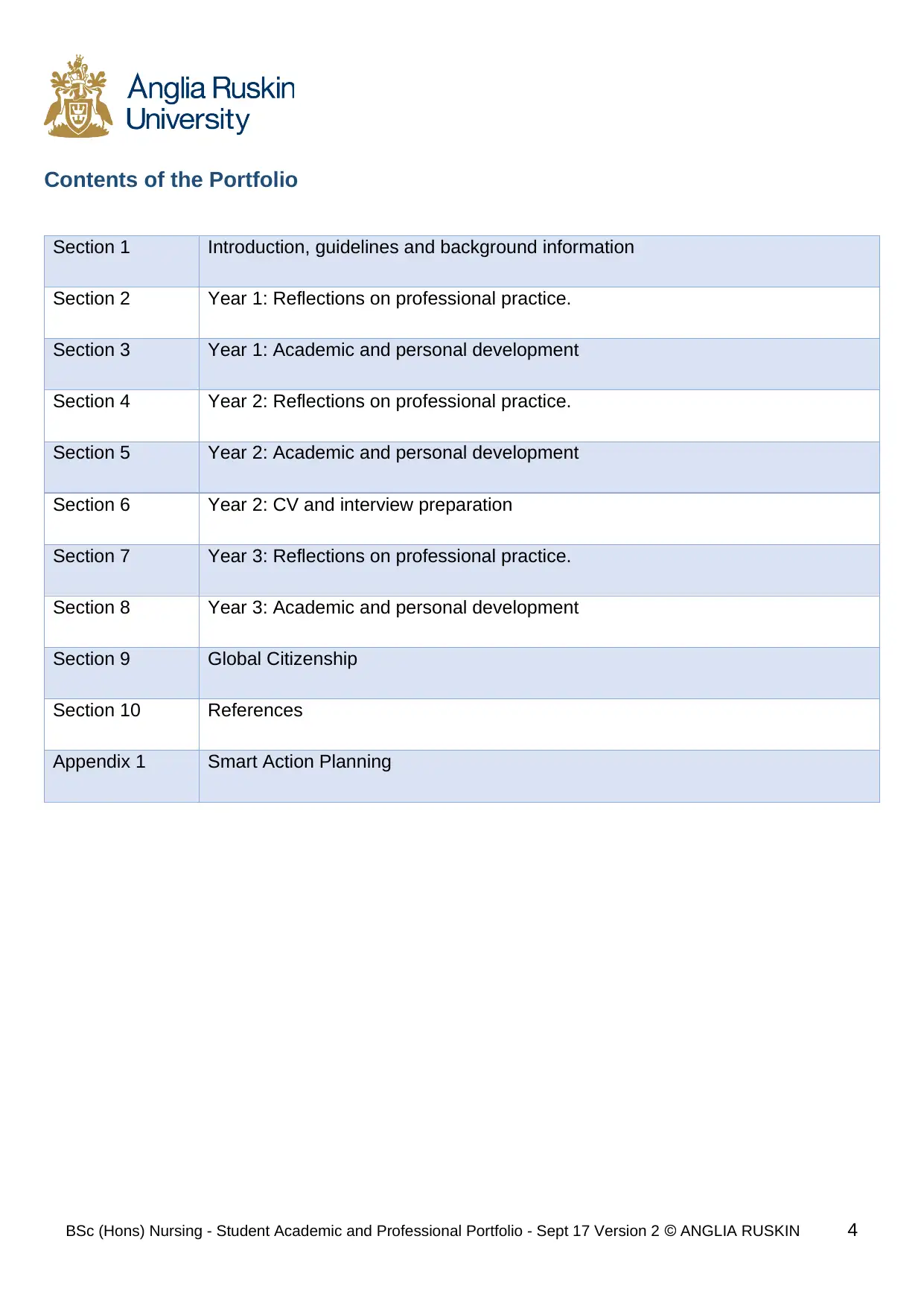
Contents of the Portfolio
Section 1 Introduction, guidelines and background information
Section 2 Year 1: Reflections on professional practice.
Section 3 Year 1: Academic and personal development
Section 4 Year 2: Reflections on professional practice.
Section 5 Year 2: Academic and personal development
Section 6 Year 2: CV and interview preparation
Section 7 Year 3: Reflections on professional practice.
Section 8 Year 3: Academic and personal development
Section 9 Global Citizenship
Section 10 References
Appendix 1 Smart Action Planning
BSc (Hons) Nursing - Student Academic and Professional Portfolio - Sept 17 Version 2 ANGLIA RUSKIN 4
Section 1 Introduction, guidelines and background information
Section 2 Year 1: Reflections on professional practice.
Section 3 Year 1: Academic and personal development
Section 4 Year 2: Reflections on professional practice.
Section 5 Year 2: Academic and personal development
Section 6 Year 2: CV and interview preparation
Section 7 Year 3: Reflections on professional practice.
Section 8 Year 3: Academic and personal development
Section 9 Global Citizenship
Section 10 References
Appendix 1 Smart Action Planning
BSc (Hons) Nursing - Student Academic and Professional Portfolio - Sept 17 Version 2 ANGLIA RUSKIN 4
Secure Best Marks with AI Grader
Need help grading? Try our AI Grader for instant feedback on your assignments.
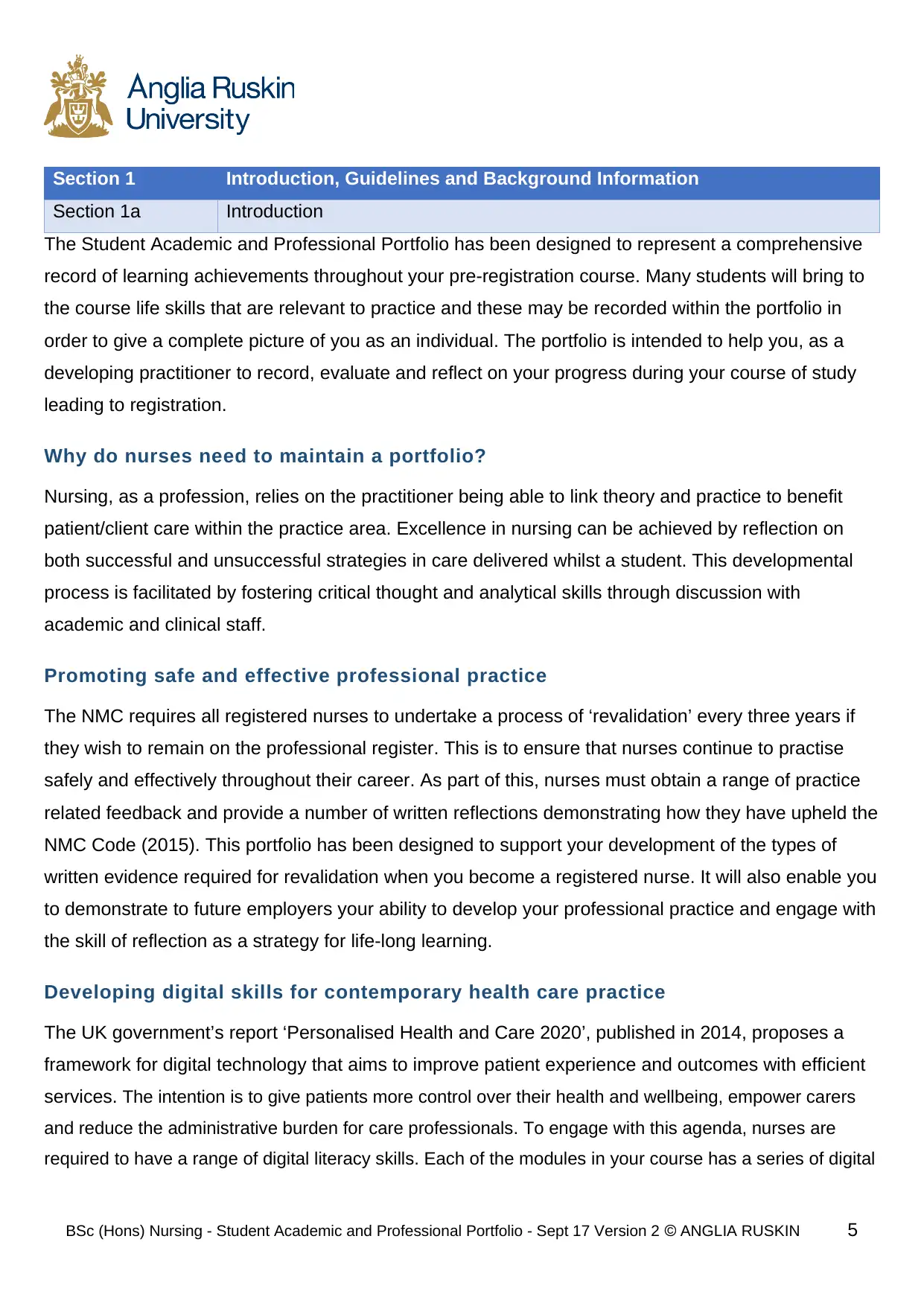
Section 1 Introduction, Guidelines and Background Information
Section 1a Introduction
The Student Academic and Professional Portfolio has been designed to represent a comprehensive
record of learning achievements throughout your pre-registration course. Many students will bring to
the course life skills that are relevant to practice and these may be recorded within the portfolio in
order to give a complete picture of you as an individual. The portfolio is intended to help you, as a
developing practitioner to record, evaluate and reflect on your progress during your course of study
leading to registration.
Why do nurses need to maintain a portfolio?
Nursing, as a profession, relies on the practitioner being able to link theory and practice to benefit
patient/client care within the practice area. Excellence in nursing can be achieved by reflection on
both successful and unsuccessful strategies in care delivered whilst a student. This developmental
process is facilitated by fostering critical thought and analytical skills through discussion with
academic and clinical staff.
Promoting safe and effective professional practice
The NMC requires all registered nurses to undertake a process of ‘revalidation’ every three years if
they wish to remain on the professional register. This is to ensure that nurses continue to practise
safely and effectively throughout their career. As part of this, nurses must obtain a range of practice
related feedback and provide a number of written reflections demonstrating how they have upheld the
NMC Code (2015). This portfolio has been designed to support your development of the types of
written evidence required for revalidation when you become a registered nurse. It will also enable you
to demonstrate to future employers your ability to develop your professional practice and engage with
the skill of reflection as a strategy for life-long learning.
Developing digital skills for contemporary health care practice
The UK government’s report ‘Personalised Health and Care 2020’, published in 2014, proposes a
framework for digital technology that aims to improve patient experience and outcomes with efficient
services. The intention is to give patients more control over their health and wellbeing, empower carers
and reduce the administrative burden for care professionals. To engage with this agenda, nurses are
required to have a range of digital literacy skills. Each of the modules in your course has a series of digital
BSc (Hons) Nursing - Student Academic and Professional Portfolio - Sept 17 Version 2 ANGLIA RUSKIN 5
Section 1a Introduction
The Student Academic and Professional Portfolio has been designed to represent a comprehensive
record of learning achievements throughout your pre-registration course. Many students will bring to
the course life skills that are relevant to practice and these may be recorded within the portfolio in
order to give a complete picture of you as an individual. The portfolio is intended to help you, as a
developing practitioner to record, evaluate and reflect on your progress during your course of study
leading to registration.
Why do nurses need to maintain a portfolio?
Nursing, as a profession, relies on the practitioner being able to link theory and practice to benefit
patient/client care within the practice area. Excellence in nursing can be achieved by reflection on
both successful and unsuccessful strategies in care delivered whilst a student. This developmental
process is facilitated by fostering critical thought and analytical skills through discussion with
academic and clinical staff.
Promoting safe and effective professional practice
The NMC requires all registered nurses to undertake a process of ‘revalidation’ every three years if
they wish to remain on the professional register. This is to ensure that nurses continue to practise
safely and effectively throughout their career. As part of this, nurses must obtain a range of practice
related feedback and provide a number of written reflections demonstrating how they have upheld the
NMC Code (2015). This portfolio has been designed to support your development of the types of
written evidence required for revalidation when you become a registered nurse. It will also enable you
to demonstrate to future employers your ability to develop your professional practice and engage with
the skill of reflection as a strategy for life-long learning.
Developing digital skills for contemporary health care practice
The UK government’s report ‘Personalised Health and Care 2020’, published in 2014, proposes a
framework for digital technology that aims to improve patient experience and outcomes with efficient
services. The intention is to give patients more control over their health and wellbeing, empower carers
and reduce the administrative burden for care professionals. To engage with this agenda, nurses are
required to have a range of digital literacy skills. Each of the modules in your course has a series of digital
BSc (Hons) Nursing - Student Academic and Professional Portfolio - Sept 17 Version 2 ANGLIA RUSKIN 5
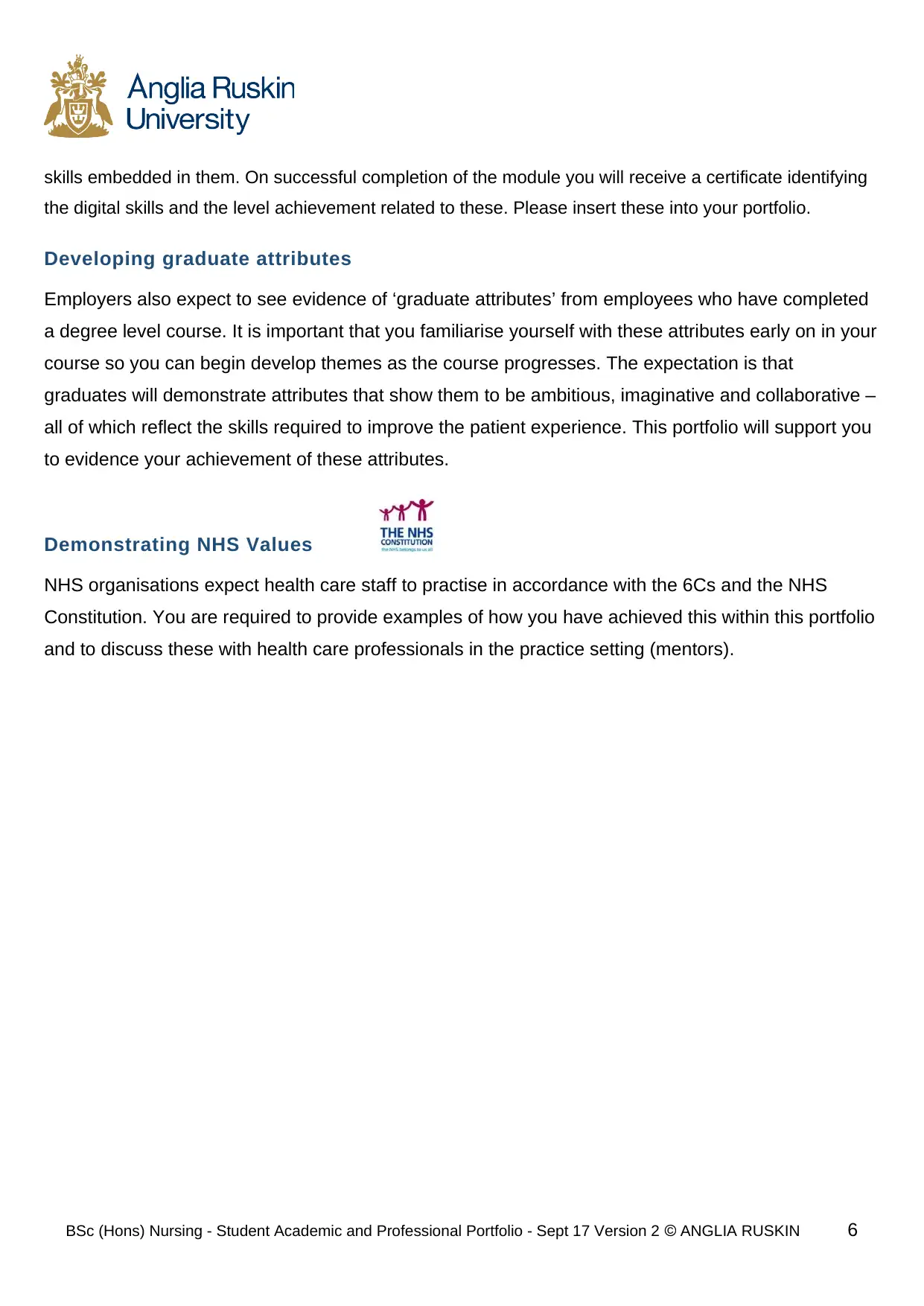
skills embedded in them. On successful completion of the module you will receive a certificate identifying
the digital skills and the level achievement related to these. Please insert these into your portfolio.
Developing graduate attributes
Employers also expect to see evidence of ‘graduate attributes’ from employees who have completed
a degree level course. It is important that you familiarise yourself with these attributes early on in your
course so you can begin develop themes as the course progresses. The expectation is that
graduates will demonstrate attributes that show them to be ambitious, imaginative and collaborative –
all of which reflect the skills required to improve the patient experience. This portfolio will support you
to evidence your achievement of these attributes.
Demonstrating NHS Values
NHS organisations expect health care staff to practise in accordance with the 6Cs and the NHS
Constitution. You are required to provide examples of how you have achieved this within this portfolio
and to discuss these with health care professionals in the practice setting (mentors).
BSc (Hons) Nursing - Student Academic and Professional Portfolio - Sept 17 Version 2 ANGLIA RUSKIN 6
the digital skills and the level achievement related to these. Please insert these into your portfolio.
Developing graduate attributes
Employers also expect to see evidence of ‘graduate attributes’ from employees who have completed
a degree level course. It is important that you familiarise yourself with these attributes early on in your
course so you can begin develop themes as the course progresses. The expectation is that
graduates will demonstrate attributes that show them to be ambitious, imaginative and collaborative –
all of which reflect the skills required to improve the patient experience. This portfolio will support you
to evidence your achievement of these attributes.
Demonstrating NHS Values
NHS organisations expect health care staff to practise in accordance with the 6Cs and the NHS
Constitution. You are required to provide examples of how you have achieved this within this portfolio
and to discuss these with health care professionals in the practice setting (mentors).
BSc (Hons) Nursing - Student Academic and Professional Portfolio - Sept 17 Version 2 ANGLIA RUSKIN 6
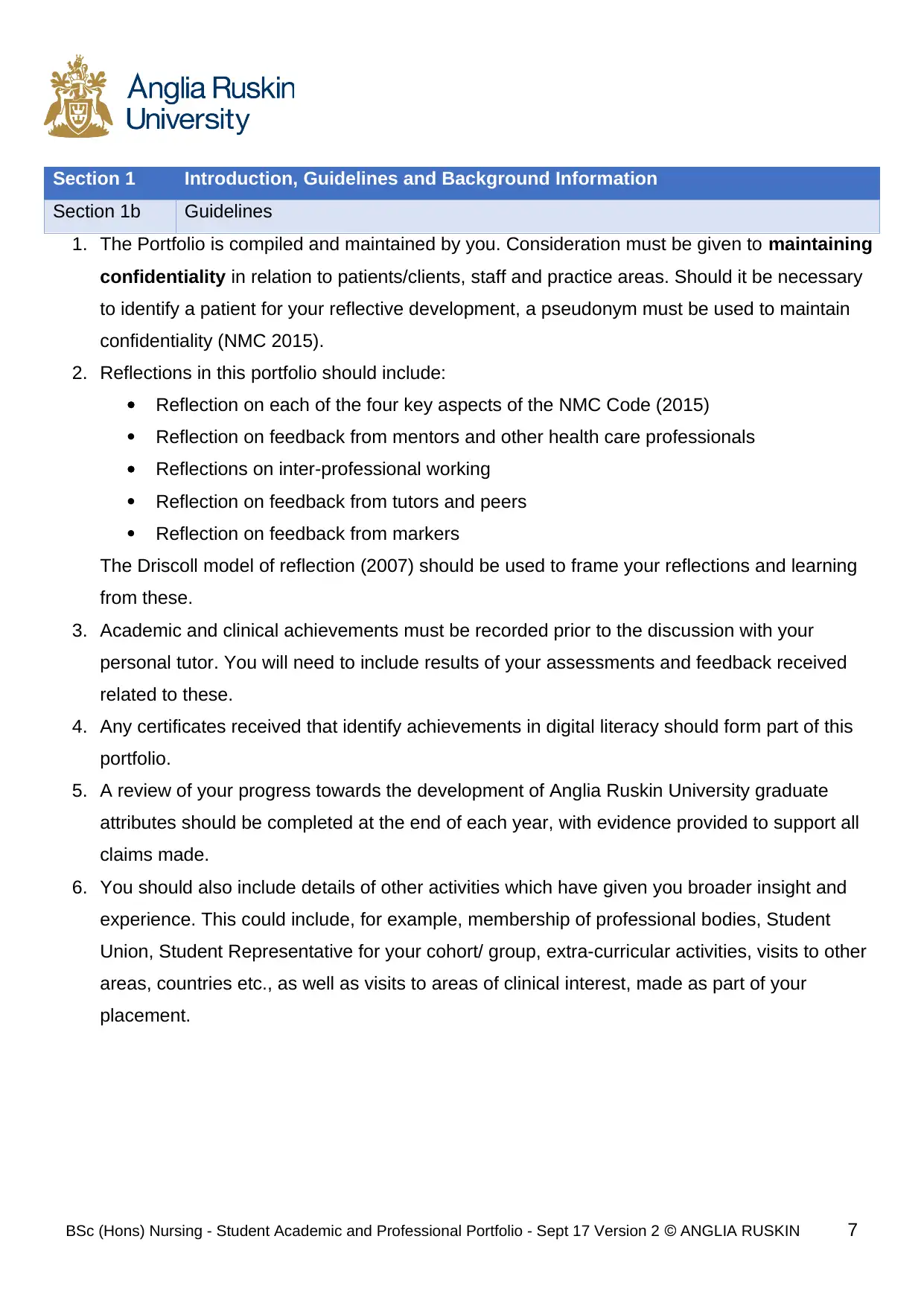
Section 1 Introduction, Guidelines and Background Information
Section 1b Guidelines
1. The Portfolio is compiled and maintained by you. Consideration must be given to maintaining
confidentiality in relation to patients/clients, staff and practice areas. Should it be necessary
to identify a patient for your reflective development, a pseudonym must be used to maintain
confidentiality (NMC 2015).
2. Reflections in this portfolio should include:
Reflection on each of the four key aspects of the NMC Code (2015)
Reflection on feedback from mentors and other health care professionals
Reflections on inter-professional working
Reflection on feedback from tutors and peers
Reflection on feedback from markers
The Driscoll model of reflection (2007) should be used to frame your reflections and learning
from these.
3. Academic and clinical achievements must be recorded prior to the discussion with your
personal tutor. You will need to include results of your assessments and feedback received
related to these.
4. Any certificates received that identify achievements in digital literacy should form part of this
portfolio.
5. A review of your progress towards the development of Anglia Ruskin University graduate
attributes should be completed at the end of each year, with evidence provided to support all
claims made.
6. You should also include details of other activities which have given you broader insight and
experience. This could include, for example, membership of professional bodies, Student
Union, Student Representative for your cohort/ group, extra-curricular activities, visits to other
areas, countries etc., as well as visits to areas of clinical interest, made as part of your
placement.
BSc (Hons) Nursing - Student Academic and Professional Portfolio - Sept 17 Version 2 ANGLIA RUSKIN 7
Section 1b Guidelines
1. The Portfolio is compiled and maintained by you. Consideration must be given to maintaining
confidentiality in relation to patients/clients, staff and practice areas. Should it be necessary
to identify a patient for your reflective development, a pseudonym must be used to maintain
confidentiality (NMC 2015).
2. Reflections in this portfolio should include:
Reflection on each of the four key aspects of the NMC Code (2015)
Reflection on feedback from mentors and other health care professionals
Reflections on inter-professional working
Reflection on feedback from tutors and peers
Reflection on feedback from markers
The Driscoll model of reflection (2007) should be used to frame your reflections and learning
from these.
3. Academic and clinical achievements must be recorded prior to the discussion with your
personal tutor. You will need to include results of your assessments and feedback received
related to these.
4. Any certificates received that identify achievements in digital literacy should form part of this
portfolio.
5. A review of your progress towards the development of Anglia Ruskin University graduate
attributes should be completed at the end of each year, with evidence provided to support all
claims made.
6. You should also include details of other activities which have given you broader insight and
experience. This could include, for example, membership of professional bodies, Student
Union, Student Representative for your cohort/ group, extra-curricular activities, visits to other
areas, countries etc., as well as visits to areas of clinical interest, made as part of your
placement.
BSc (Hons) Nursing - Student Academic and Professional Portfolio - Sept 17 Version 2 ANGLIA RUSKIN 7
Paraphrase This Document
Need a fresh take? Get an instant paraphrase of this document with our AI Paraphraser
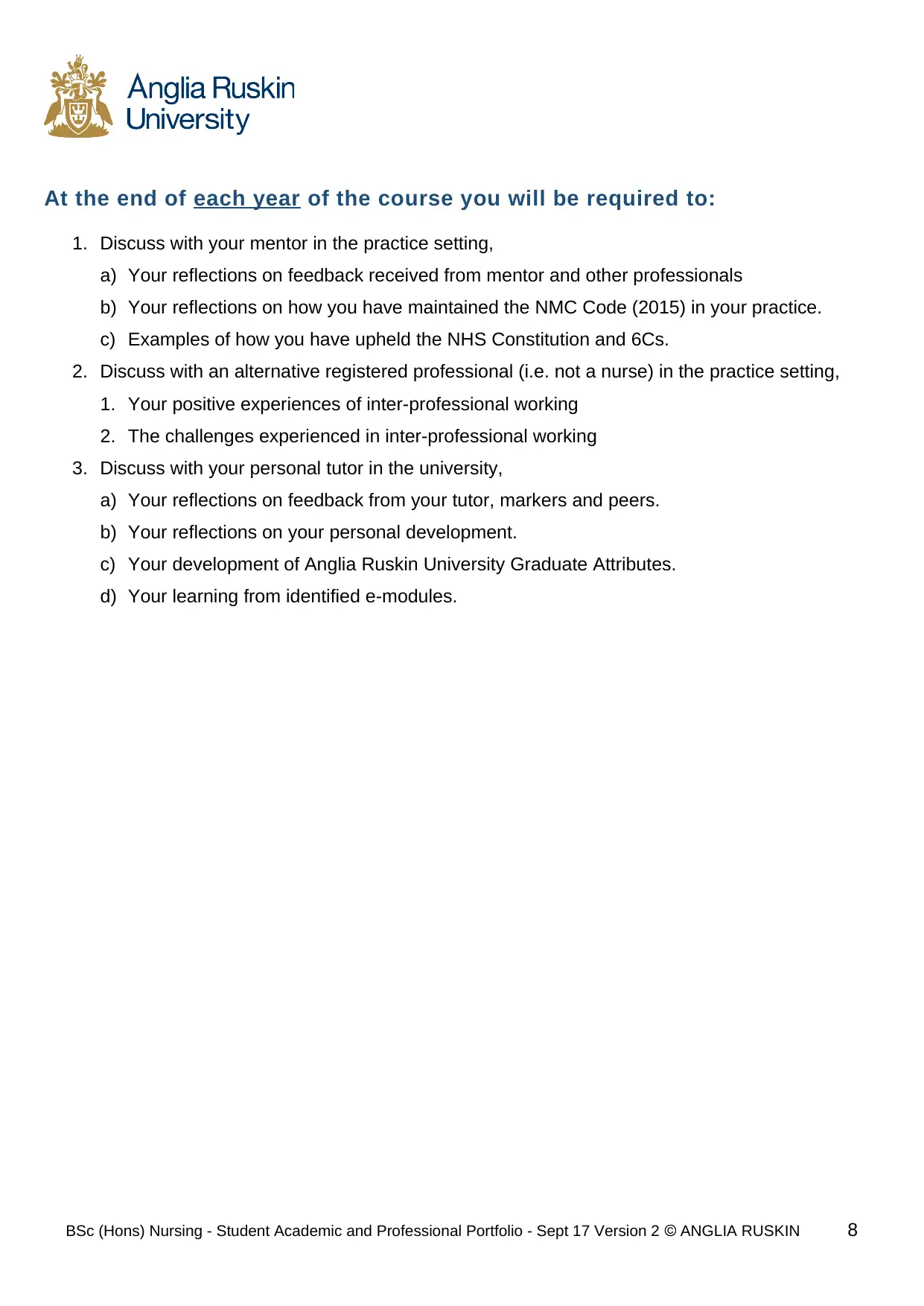
At the end of each year of the course you will be required to:
1. Discuss with your mentor in the practice setting,
a) Your reflections on feedback received from mentor and other professionals
b) Your reflections on how you have maintained the NMC Code (2015) in your practice.
c) Examples of how you have upheld the NHS Constitution and 6Cs.
2. Discuss with an alternative registered professional (i.e. not a nurse) in the practice setting,
1. Your positive experiences of inter-professional working
2. The challenges experienced in inter-professional working
3. Discuss with your personal tutor in the university,
a) Your reflections on feedback from your tutor, markers and peers.
b) Your reflections on your personal development.
c) Your development of Anglia Ruskin University Graduate Attributes.
d) Your learning from identified e-modules.
BSc (Hons) Nursing - Student Academic and Professional Portfolio - Sept 17 Version 2 ANGLIA RUSKIN 8
1. Discuss with your mentor in the practice setting,
a) Your reflections on feedback received from mentor and other professionals
b) Your reflections on how you have maintained the NMC Code (2015) in your practice.
c) Examples of how you have upheld the NHS Constitution and 6Cs.
2. Discuss with an alternative registered professional (i.e. not a nurse) in the practice setting,
1. Your positive experiences of inter-professional working
2. The challenges experienced in inter-professional working
3. Discuss with your personal tutor in the university,
a) Your reflections on feedback from your tutor, markers and peers.
b) Your reflections on your personal development.
c) Your development of Anglia Ruskin University Graduate Attributes.
d) Your learning from identified e-modules.
BSc (Hons) Nursing - Student Academic and Professional Portfolio - Sept 17 Version 2 ANGLIA RUSKIN 8
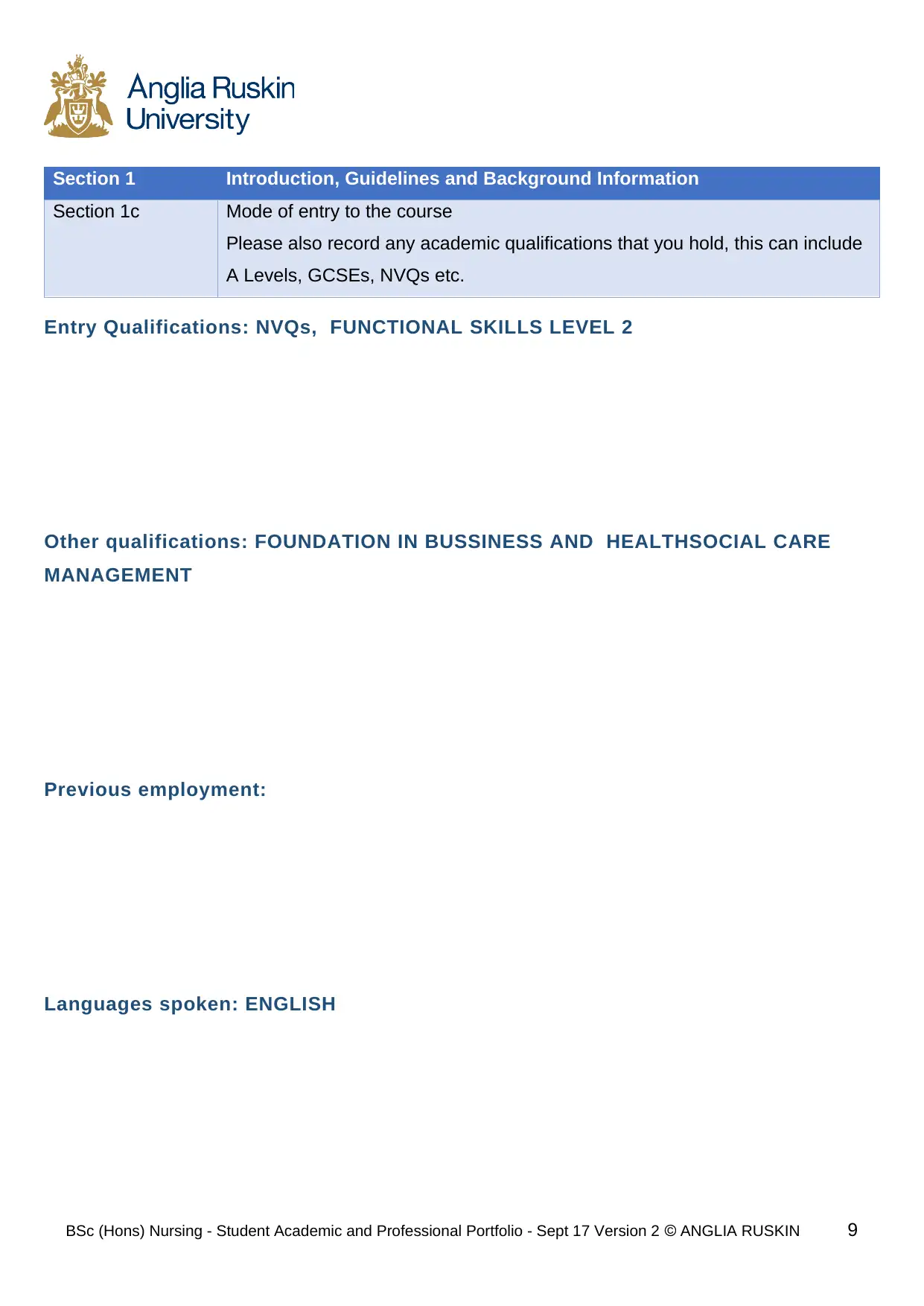
Section 1 Introduction, Guidelines and Background Information
Section 1c Mode of entry to the course
Please also record any academic qualifications that you hold, this can include
A Levels, GCSEs, NVQs etc.
Entry Qualifications: NVQs, FUNCTIONAL SKILLS LEVEL 2
Other qualifications: FOUNDATION IN BUSSINESS AND HEALTHSOCIAL CARE
MANAGEMENT
Previous employment:
Languages spoken: ENGLISH
BSc (Hons) Nursing - Student Academic and Professional Portfolio - Sept 17 Version 2 ANGLIA RUSKIN 9
Section 1c Mode of entry to the course
Please also record any academic qualifications that you hold, this can include
A Levels, GCSEs, NVQs etc.
Entry Qualifications: NVQs, FUNCTIONAL SKILLS LEVEL 2
Other qualifications: FOUNDATION IN BUSSINESS AND HEALTHSOCIAL CARE
MANAGEMENT
Previous employment:
Languages spoken: ENGLISH
BSc (Hons) Nursing - Student Academic and Professional Portfolio - Sept 17 Version 2 ANGLIA RUSKIN 9
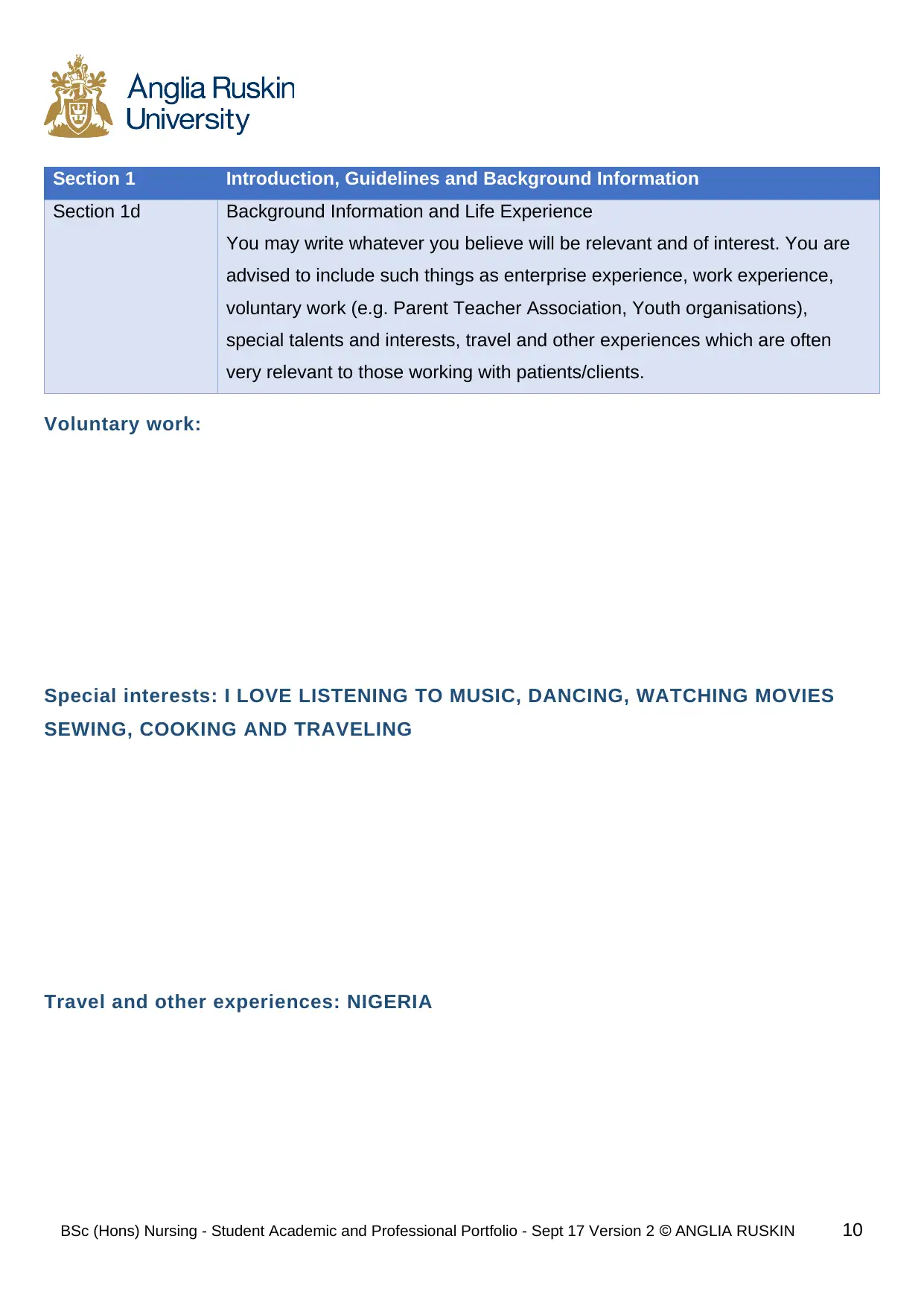
Section 1 Introduction, Guidelines and Background Information
Section 1d Background Information and Life Experience
You may write whatever you believe will be relevant and of interest. You are
advised to include such things as enterprise experience, work experience,
voluntary work (e.g. Parent Teacher Association, Youth organisations),
special talents and interests, travel and other experiences which are often
very relevant to those working with patients/clients.
Voluntary work:
Special interests: I LOVE LISTENING TO MUSIC, DANCING, WATCHING MOVIES
SEWING, COOKING AND TRAVELING
Travel and other experiences: NIGERIA
BSc (Hons) Nursing - Student Academic and Professional Portfolio - Sept 17 Version 2 ANGLIA RUSKIN 10
Section 1d Background Information and Life Experience
You may write whatever you believe will be relevant and of interest. You are
advised to include such things as enterprise experience, work experience,
voluntary work (e.g. Parent Teacher Association, Youth organisations),
special talents and interests, travel and other experiences which are often
very relevant to those working with patients/clients.
Voluntary work:
Special interests: I LOVE LISTENING TO MUSIC, DANCING, WATCHING MOVIES
SEWING, COOKING AND TRAVELING
Travel and other experiences: NIGERIA
BSc (Hons) Nursing - Student Academic and Professional Portfolio - Sept 17 Version 2 ANGLIA RUSKIN 10
Secure Best Marks with AI Grader
Need help grading? Try our AI Grader for instant feedback on your assignments.
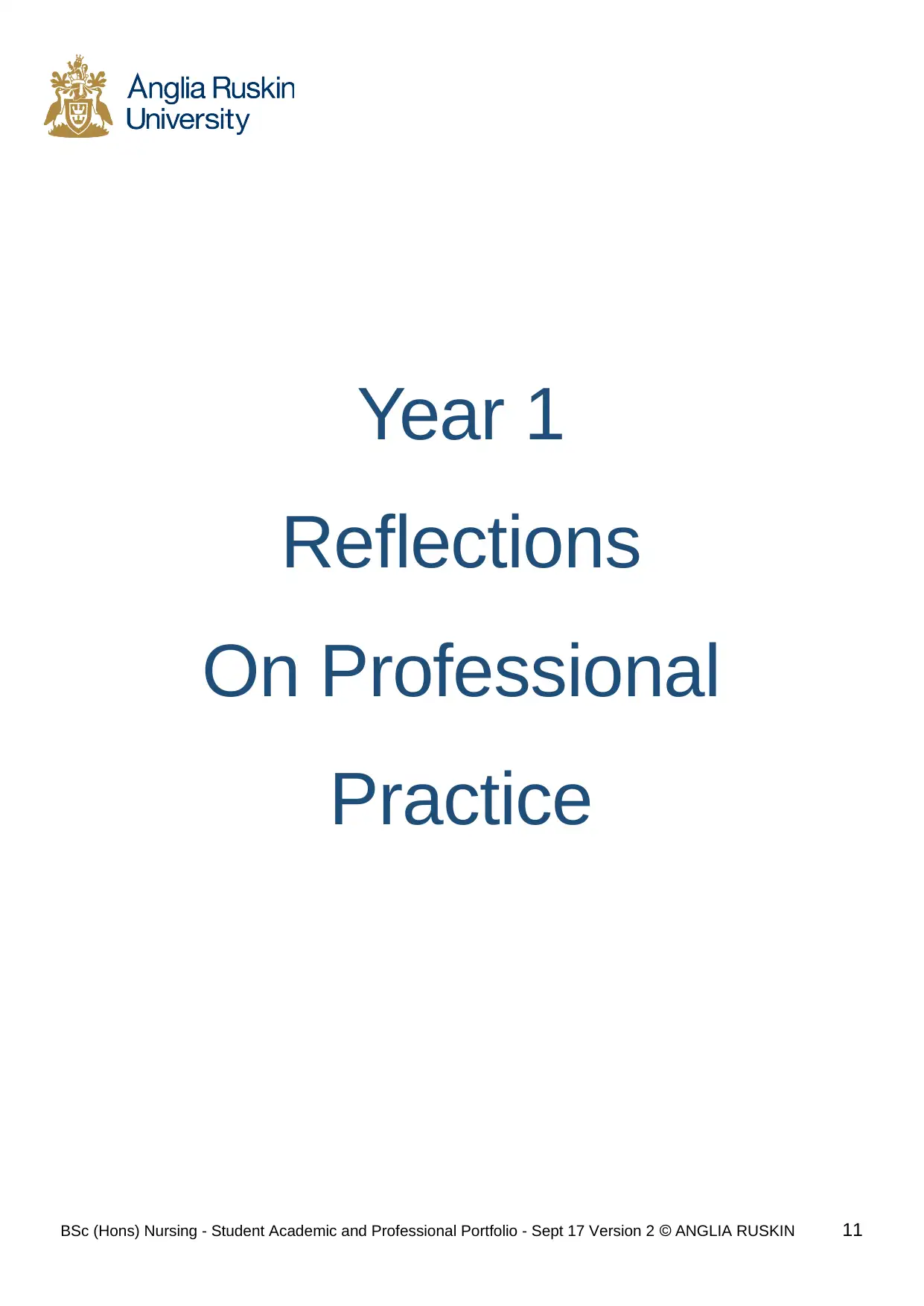
Year 1
Reflections
On Professional
Practice
BSc (Hons) Nursing - Student Academic and Professional Portfolio - Sept 17 Version 2 ANGLIA RUSKIN 11
Reflections
On Professional
Practice
BSc (Hons) Nursing - Student Academic and Professional Portfolio - Sept 17 Version 2 ANGLIA RUSKIN 11
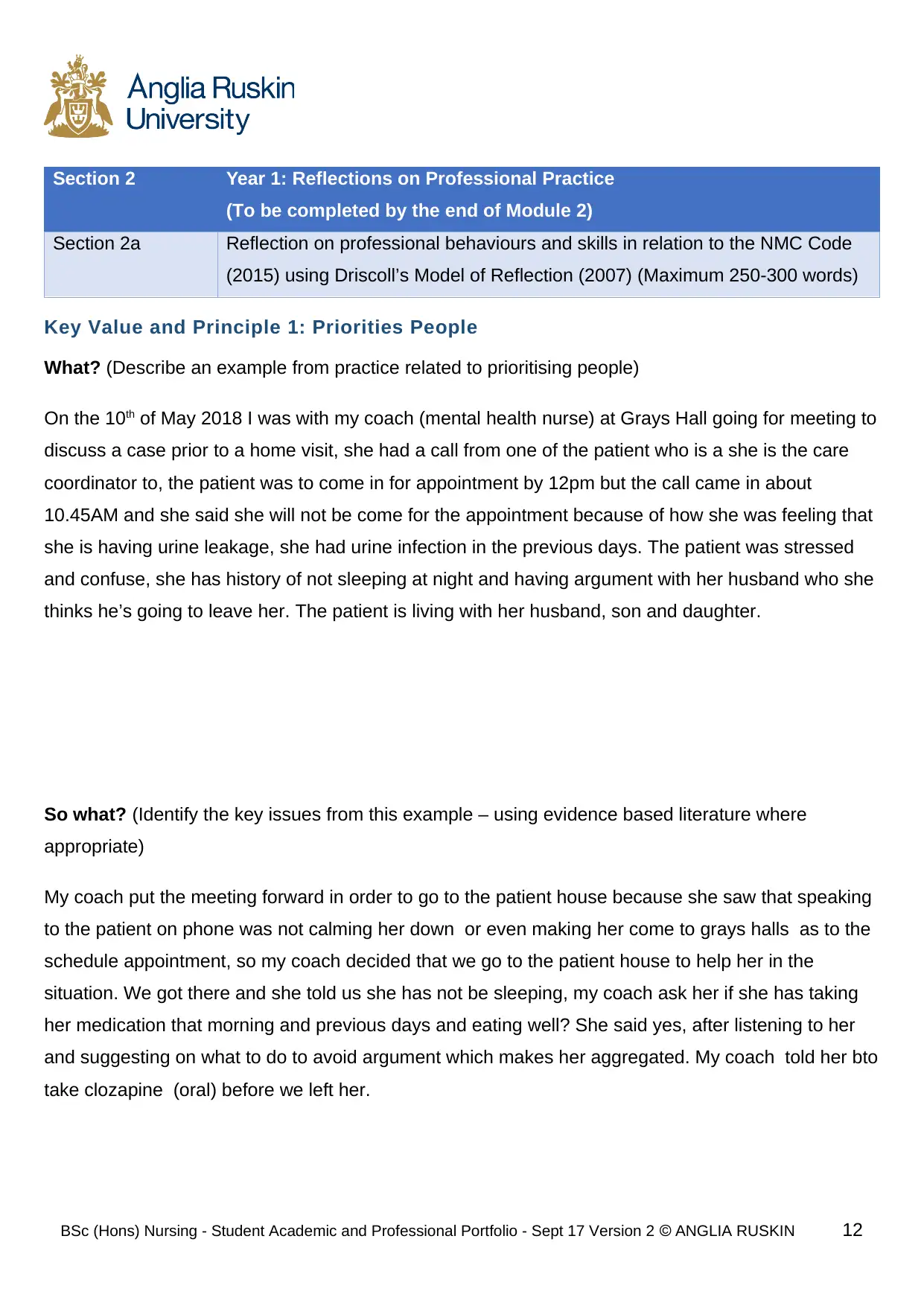
Section 2 Year 1: Reflections on Professional Practice
(To be completed by the end of Module 2)
Section 2a Reflection on professional behaviours and skills in relation to the NMC Code
(2015) using Driscoll’s Model of Reflection (2007) (Maximum 250-300 words)
Key Value and Principle 1: Priorities People
What? (Describe an example from practice related to prioritising people)
On the 10th of May 2018 I was with my coach (mental health nurse) at Grays Hall going for meeting to
discuss a case prior to a home visit, she had a call from one of the patient who is a she is the care
coordinator to, the patient was to come in for appointment by 12pm but the call came in about
10.45AM and she said she will not be come for the appointment because of how she was feeling that
she is having urine leakage, she had urine infection in the previous days. The patient was stressed
and confuse, she has history of not sleeping at night and having argument with her husband who she
thinks he’s going to leave her. The patient is living with her husband, son and daughter.
So what? (Identify the key issues from this example – using evidence based literature where
appropriate)
My coach put the meeting forward in order to go to the patient house because she saw that speaking
to the patient on phone was not calming her down or even making her come to grays halls as to the
schedule appointment, so my coach decided that we go to the patient house to help her in the
situation. We got there and she told us she has not be sleeping, my coach ask her if she has taking
her medication that morning and previous days and eating well? She said yes, after listening to her
and suggesting on what to do to avoid argument which makes her aggregated. My coach told her bto
take clozapine (oral) before we left her.
BSc (Hons) Nursing - Student Academic and Professional Portfolio - Sept 17 Version 2 ANGLIA RUSKIN 12
(To be completed by the end of Module 2)
Section 2a Reflection on professional behaviours and skills in relation to the NMC Code
(2015) using Driscoll’s Model of Reflection (2007) (Maximum 250-300 words)
Key Value and Principle 1: Priorities People
What? (Describe an example from practice related to prioritising people)
On the 10th of May 2018 I was with my coach (mental health nurse) at Grays Hall going for meeting to
discuss a case prior to a home visit, she had a call from one of the patient who is a she is the care
coordinator to, the patient was to come in for appointment by 12pm but the call came in about
10.45AM and she said she will not be come for the appointment because of how she was feeling that
she is having urine leakage, she had urine infection in the previous days. The patient was stressed
and confuse, she has history of not sleeping at night and having argument with her husband who she
thinks he’s going to leave her. The patient is living with her husband, son and daughter.
So what? (Identify the key issues from this example – using evidence based literature where
appropriate)
My coach put the meeting forward in order to go to the patient house because she saw that speaking
to the patient on phone was not calming her down or even making her come to grays halls as to the
schedule appointment, so my coach decided that we go to the patient house to help her in the
situation. We got there and she told us she has not be sleeping, my coach ask her if she has taking
her medication that morning and previous days and eating well? She said yes, after listening to her
and suggesting on what to do to avoid argument which makes her aggregated. My coach told her bto
take clozapine (oral) before we left her.
BSc (Hons) Nursing - Student Academic and Professional Portfolio - Sept 17 Version 2 ANGLIA RUSKIN 12
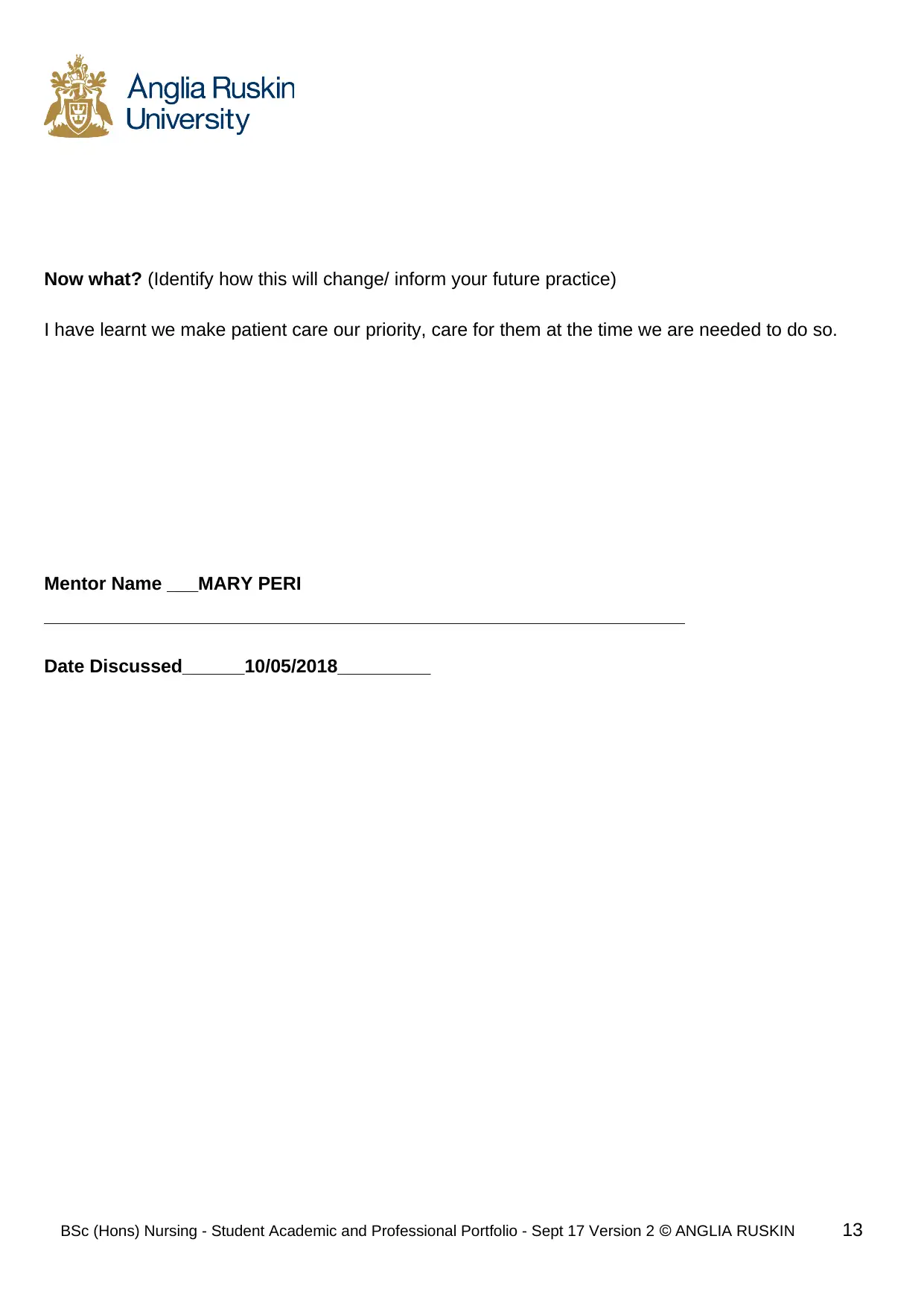
Now what? (Identify how this will change/ inform your future practice)
I have learnt we make patient care our priority, care for them at the time we are needed to do so.
Mentor Name ___MARY PERI
______________________________________________________________
Date Discussed______10/05/2018_________
BSc (Hons) Nursing - Student Academic and Professional Portfolio - Sept 17 Version 2 ANGLIA RUSKIN 13
I have learnt we make patient care our priority, care for them at the time we are needed to do so.
Mentor Name ___MARY PERI
______________________________________________________________
Date Discussed______10/05/2018_________
BSc (Hons) Nursing - Student Academic and Professional Portfolio - Sept 17 Version 2 ANGLIA RUSKIN 13
Paraphrase This Document
Need a fresh take? Get an instant paraphrase of this document with our AI Paraphraser
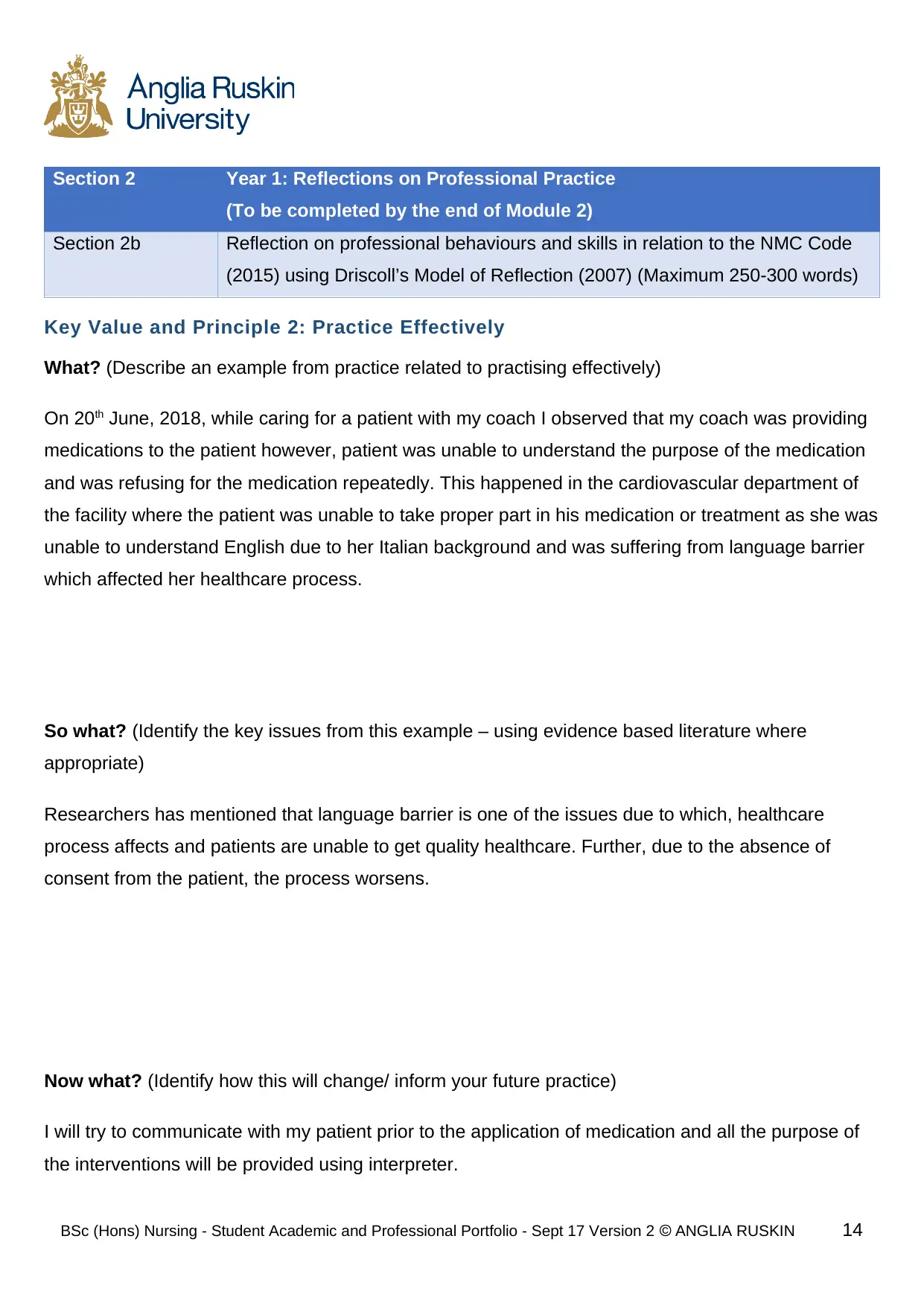
Section 2 Year 1: Reflections on Professional Practice
(To be completed by the end of Module 2)
Section 2b Reflection on professional behaviours and skills in relation to the NMC Code
(2015) using Driscoll’s Model of Reflection (2007) (Maximum 250-300 words)
Key Value and Principle 2: Practice Effectively
What? (Describe an example from practice related to practising effectively)
On 20th June, 2018, while caring for a patient with my coach I observed that my coach was providing
medications to the patient however, patient was unable to understand the purpose of the medication
and was refusing for the medication repeatedly. This happened in the cardiovascular department of
the facility where the patient was unable to take proper part in his medication or treatment as she was
unable to understand English due to her Italian background and was suffering from language barrier
which affected her healthcare process.
So what? (Identify the key issues from this example – using evidence based literature where
appropriate)
Researchers has mentioned that language barrier is one of the issues due to which, healthcare
process affects and patients are unable to get quality healthcare. Further, due to the absence of
consent from the patient, the process worsens.
Now what? (Identify how this will change/ inform your future practice)
I will try to communicate with my patient prior to the application of medication and all the purpose of
the interventions will be provided using interpreter.
BSc (Hons) Nursing - Student Academic and Professional Portfolio - Sept 17 Version 2 ANGLIA RUSKIN 14
(To be completed by the end of Module 2)
Section 2b Reflection on professional behaviours and skills in relation to the NMC Code
(2015) using Driscoll’s Model of Reflection (2007) (Maximum 250-300 words)
Key Value and Principle 2: Practice Effectively
What? (Describe an example from practice related to practising effectively)
On 20th June, 2018, while caring for a patient with my coach I observed that my coach was providing
medications to the patient however, patient was unable to understand the purpose of the medication
and was refusing for the medication repeatedly. This happened in the cardiovascular department of
the facility where the patient was unable to take proper part in his medication or treatment as she was
unable to understand English due to her Italian background and was suffering from language barrier
which affected her healthcare process.
So what? (Identify the key issues from this example – using evidence based literature where
appropriate)
Researchers has mentioned that language barrier is one of the issues due to which, healthcare
process affects and patients are unable to get quality healthcare. Further, due to the absence of
consent from the patient, the process worsens.
Now what? (Identify how this will change/ inform your future practice)
I will try to communicate with my patient prior to the application of medication and all the purpose of
the interventions will be provided using interpreter.
BSc (Hons) Nursing - Student Academic and Professional Portfolio - Sept 17 Version 2 ANGLIA RUSKIN 14
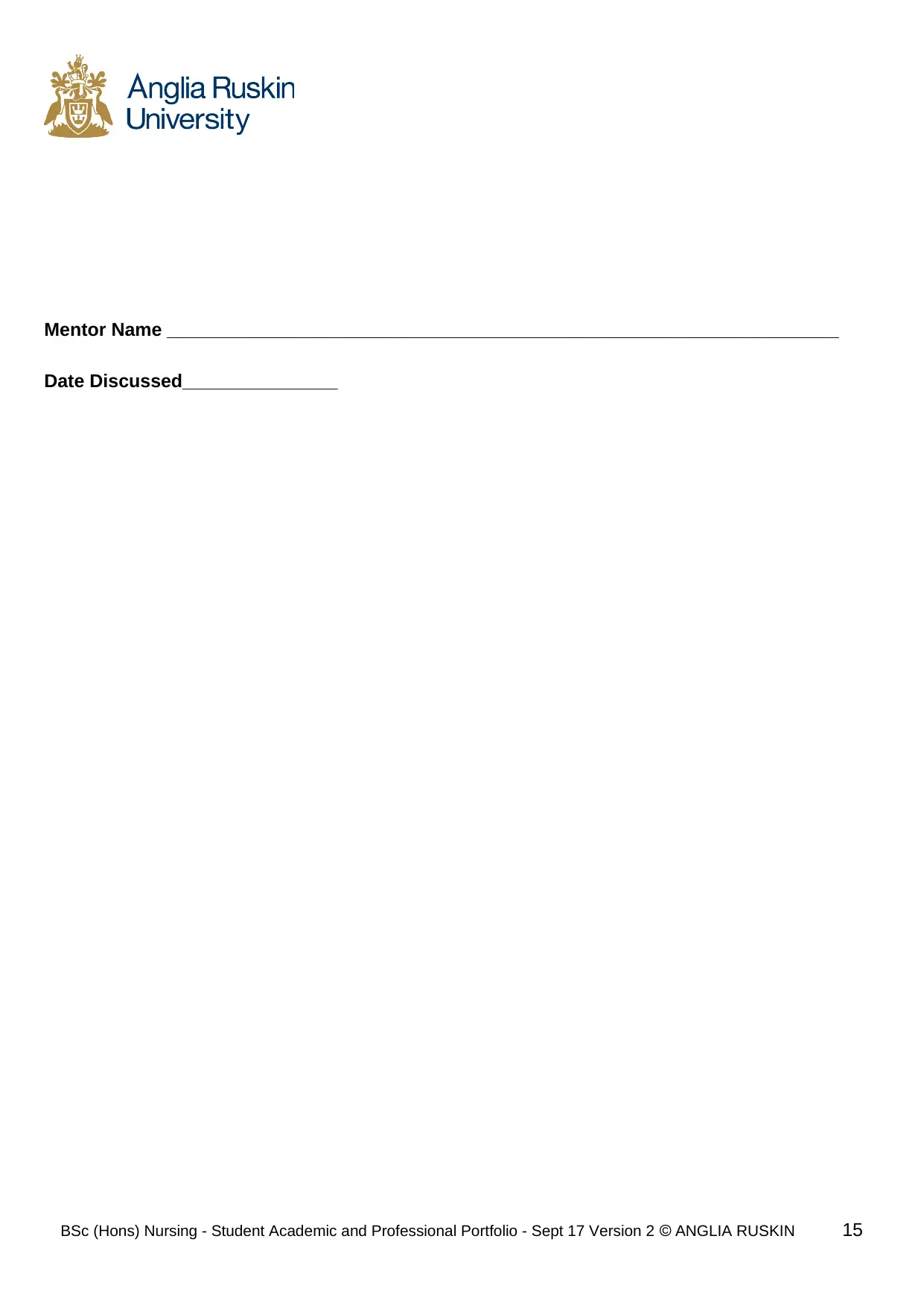
Mentor Name _________________________________________________________________
Date Discussed_______________
BSc (Hons) Nursing - Student Academic and Professional Portfolio - Sept 17 Version 2 ANGLIA RUSKIN 15
Date Discussed_______________
BSc (Hons) Nursing - Student Academic and Professional Portfolio - Sept 17 Version 2 ANGLIA RUSKIN 15
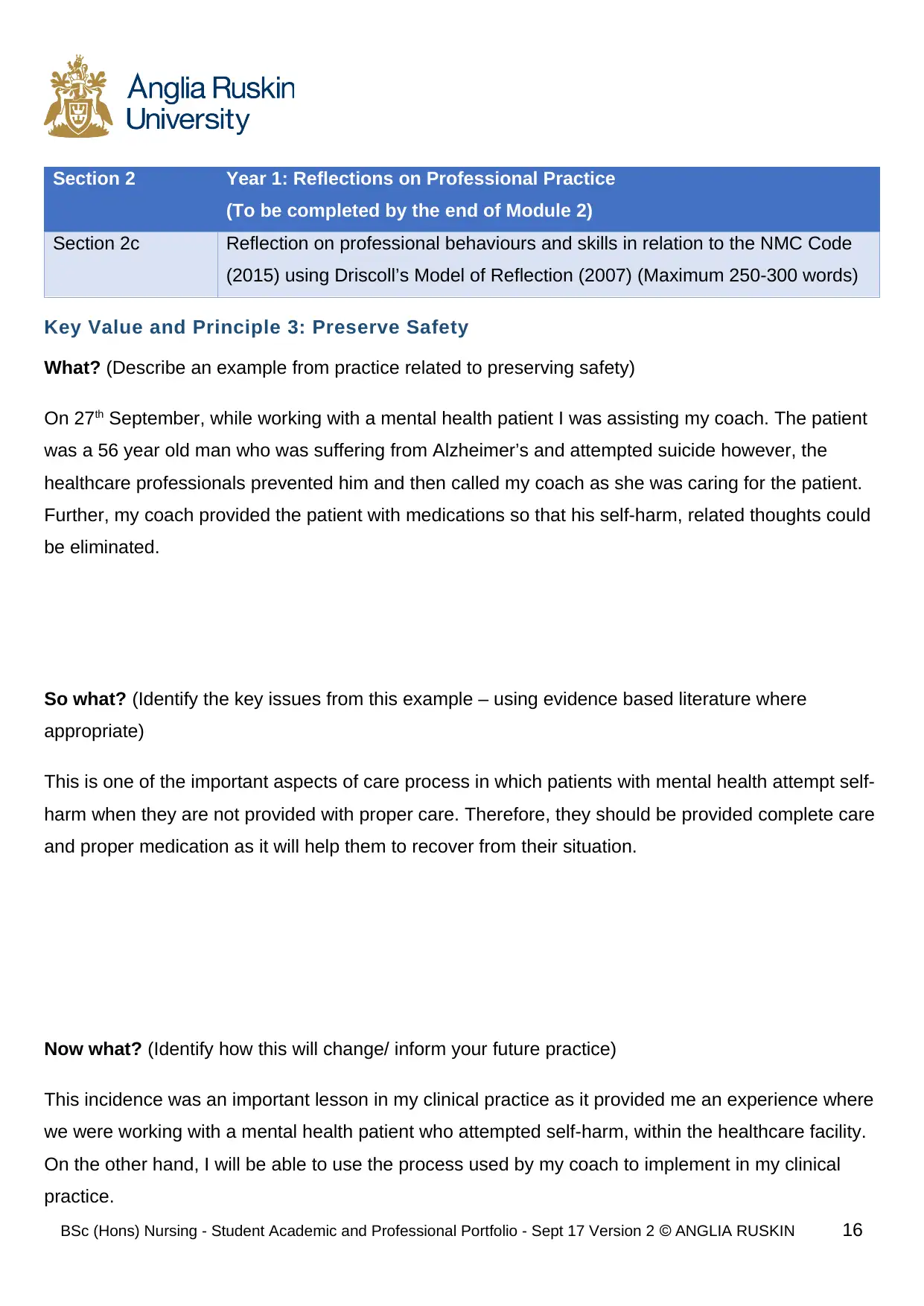
Section 2 Year 1: Reflections on Professional Practice
(To be completed by the end of Module 2)
Section 2c Reflection on professional behaviours and skills in relation to the NMC Code
(2015) using Driscoll’s Model of Reflection (2007) (Maximum 250-300 words)
Key Value and Principle 3: Preserve Safety
What? (Describe an example from practice related to preserving safety)
On 27th September, while working with a mental health patient I was assisting my coach. The patient
was a 56 year old man who was suffering from Alzheimer’s and attempted suicide however, the
healthcare professionals prevented him and then called my coach as she was caring for the patient.
Further, my coach provided the patient with medications so that his self-harm, related thoughts could
be eliminated.
So what? (Identify the key issues from this example – using evidence based literature where
appropriate)
This is one of the important aspects of care process in which patients with mental health attempt self-
harm when they are not provided with proper care. Therefore, they should be provided complete care
and proper medication as it will help them to recover from their situation.
Now what? (Identify how this will change/ inform your future practice)
This incidence was an important lesson in my clinical practice as it provided me an experience where
we were working with a mental health patient who attempted self-harm, within the healthcare facility.
On the other hand, I will be able to use the process used by my coach to implement in my clinical
practice.
BSc (Hons) Nursing - Student Academic and Professional Portfolio - Sept 17 Version 2 ANGLIA RUSKIN 16
(To be completed by the end of Module 2)
Section 2c Reflection on professional behaviours and skills in relation to the NMC Code
(2015) using Driscoll’s Model of Reflection (2007) (Maximum 250-300 words)
Key Value and Principle 3: Preserve Safety
What? (Describe an example from practice related to preserving safety)
On 27th September, while working with a mental health patient I was assisting my coach. The patient
was a 56 year old man who was suffering from Alzheimer’s and attempted suicide however, the
healthcare professionals prevented him and then called my coach as she was caring for the patient.
Further, my coach provided the patient with medications so that his self-harm, related thoughts could
be eliminated.
So what? (Identify the key issues from this example – using evidence based literature where
appropriate)
This is one of the important aspects of care process in which patients with mental health attempt self-
harm when they are not provided with proper care. Therefore, they should be provided complete care
and proper medication as it will help them to recover from their situation.
Now what? (Identify how this will change/ inform your future practice)
This incidence was an important lesson in my clinical practice as it provided me an experience where
we were working with a mental health patient who attempted self-harm, within the healthcare facility.
On the other hand, I will be able to use the process used by my coach to implement in my clinical
practice.
BSc (Hons) Nursing - Student Academic and Professional Portfolio - Sept 17 Version 2 ANGLIA RUSKIN 16
Secure Best Marks with AI Grader
Need help grading? Try our AI Grader for instant feedback on your assignments.
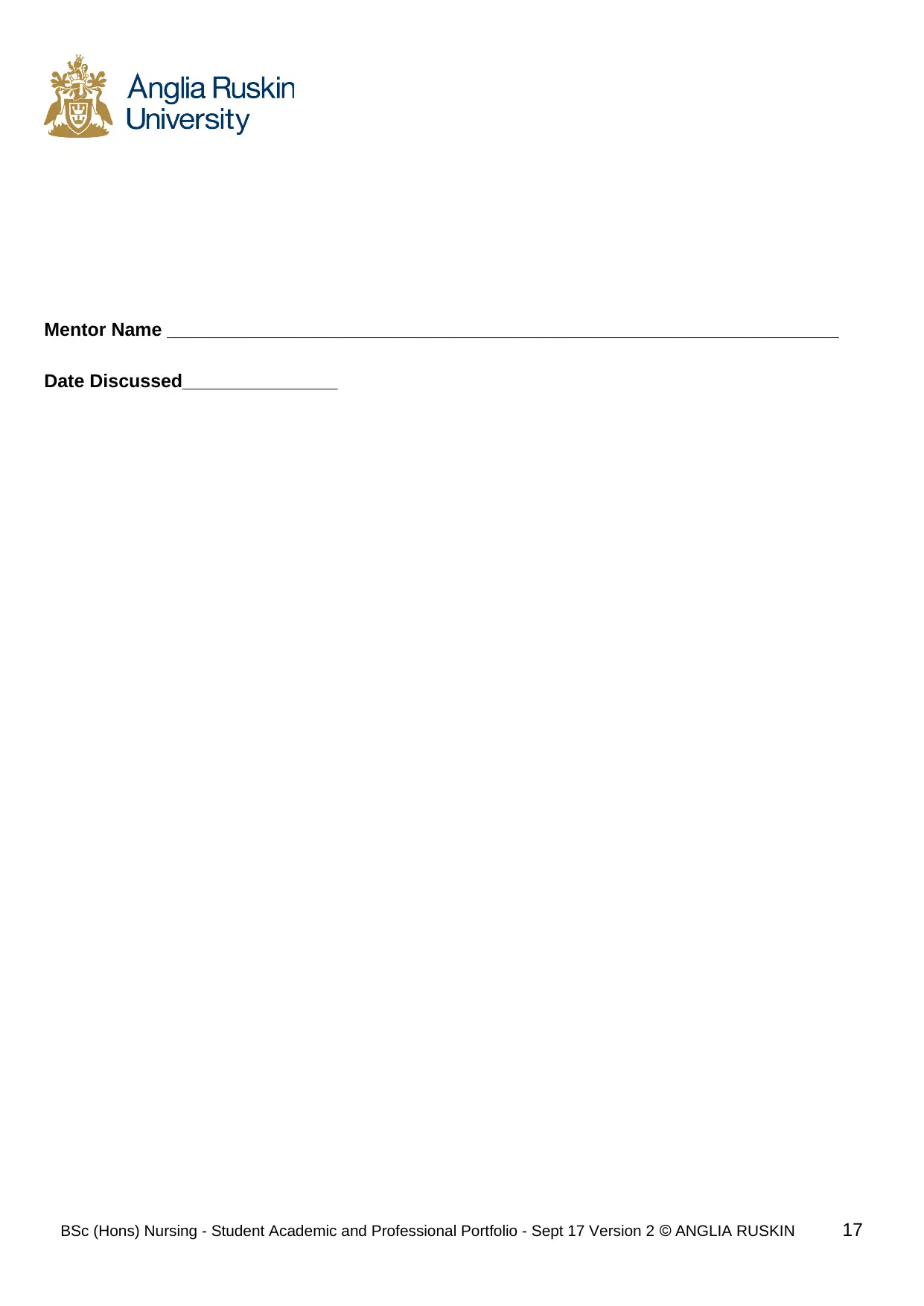
Mentor Name _________________________________________________________________
Date Discussed_______________
BSc (Hons) Nursing - Student Academic and Professional Portfolio - Sept 17 Version 2 ANGLIA RUSKIN 17
Date Discussed_______________
BSc (Hons) Nursing - Student Academic and Professional Portfolio - Sept 17 Version 2 ANGLIA RUSKIN 17
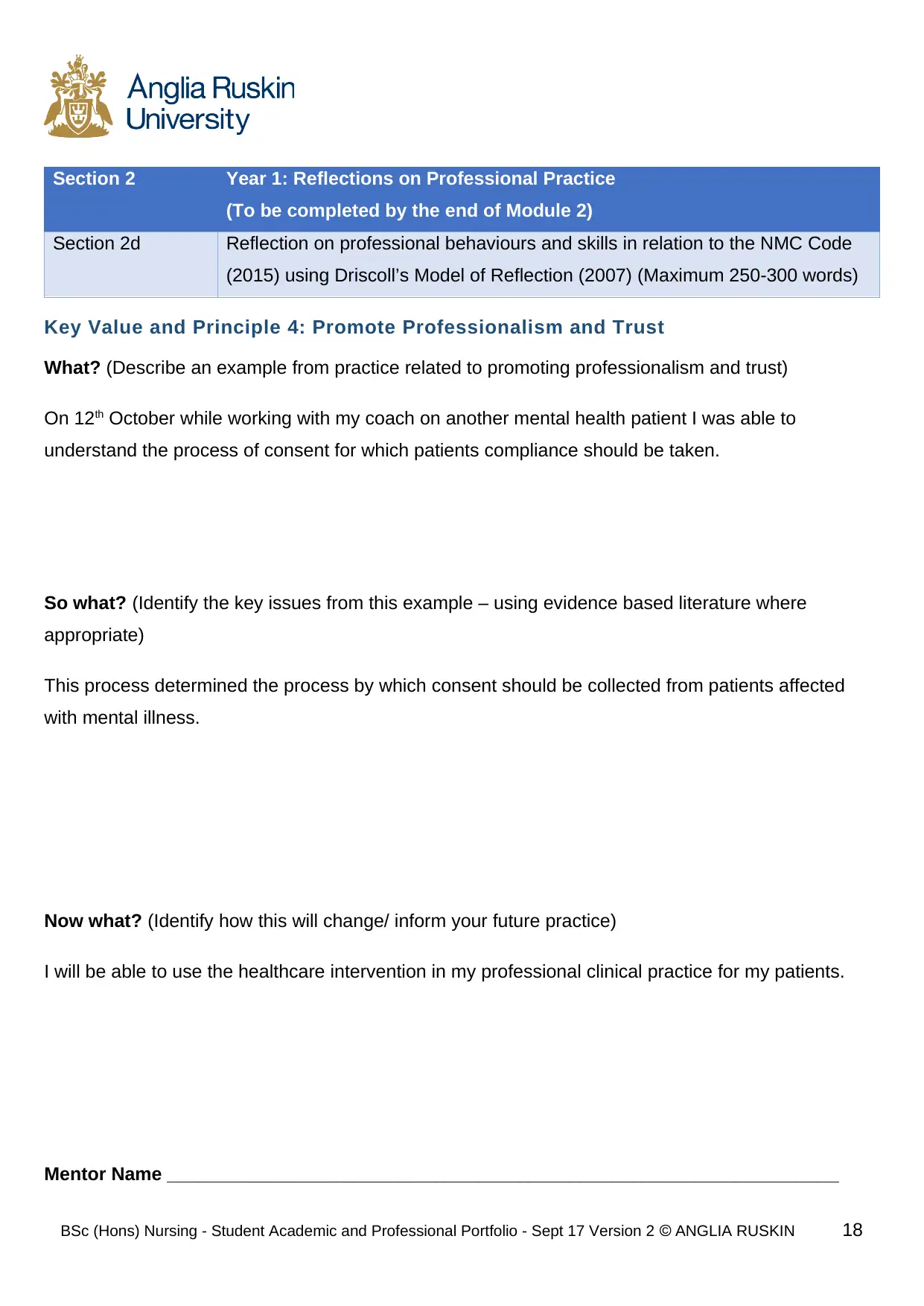
Section 2 Year 1: Reflections on Professional Practice
(To be completed by the end of Module 2)
Section 2d Reflection on professional behaviours and skills in relation to the NMC Code
(2015) using Driscoll’s Model of Reflection (2007) (Maximum 250-300 words)
Key Value and Principle 4: Promote Professionalism and Trust
What? (Describe an example from practice related to promoting professionalism and trust)
On 12th October while working with my coach on another mental health patient I was able to
understand the process of consent for which patients compliance should be taken.
So what? (Identify the key issues from this example – using evidence based literature where
appropriate)
This process determined the process by which consent should be collected from patients affected
with mental illness.
Now what? (Identify how this will change/ inform your future practice)
I will be able to use the healthcare intervention in my professional clinical practice for my patients.
Mentor Name _________________________________________________________________
BSc (Hons) Nursing - Student Academic and Professional Portfolio - Sept 17 Version 2 ANGLIA RUSKIN 18
(To be completed by the end of Module 2)
Section 2d Reflection on professional behaviours and skills in relation to the NMC Code
(2015) using Driscoll’s Model of Reflection (2007) (Maximum 250-300 words)
Key Value and Principle 4: Promote Professionalism and Trust
What? (Describe an example from practice related to promoting professionalism and trust)
On 12th October while working with my coach on another mental health patient I was able to
understand the process of consent for which patients compliance should be taken.
So what? (Identify the key issues from this example – using evidence based literature where
appropriate)
This process determined the process by which consent should be collected from patients affected
with mental illness.
Now what? (Identify how this will change/ inform your future practice)
I will be able to use the healthcare intervention in my professional clinical practice for my patients.
Mentor Name _________________________________________________________________
BSc (Hons) Nursing - Student Academic and Professional Portfolio - Sept 17 Version 2 ANGLIA RUSKIN 18
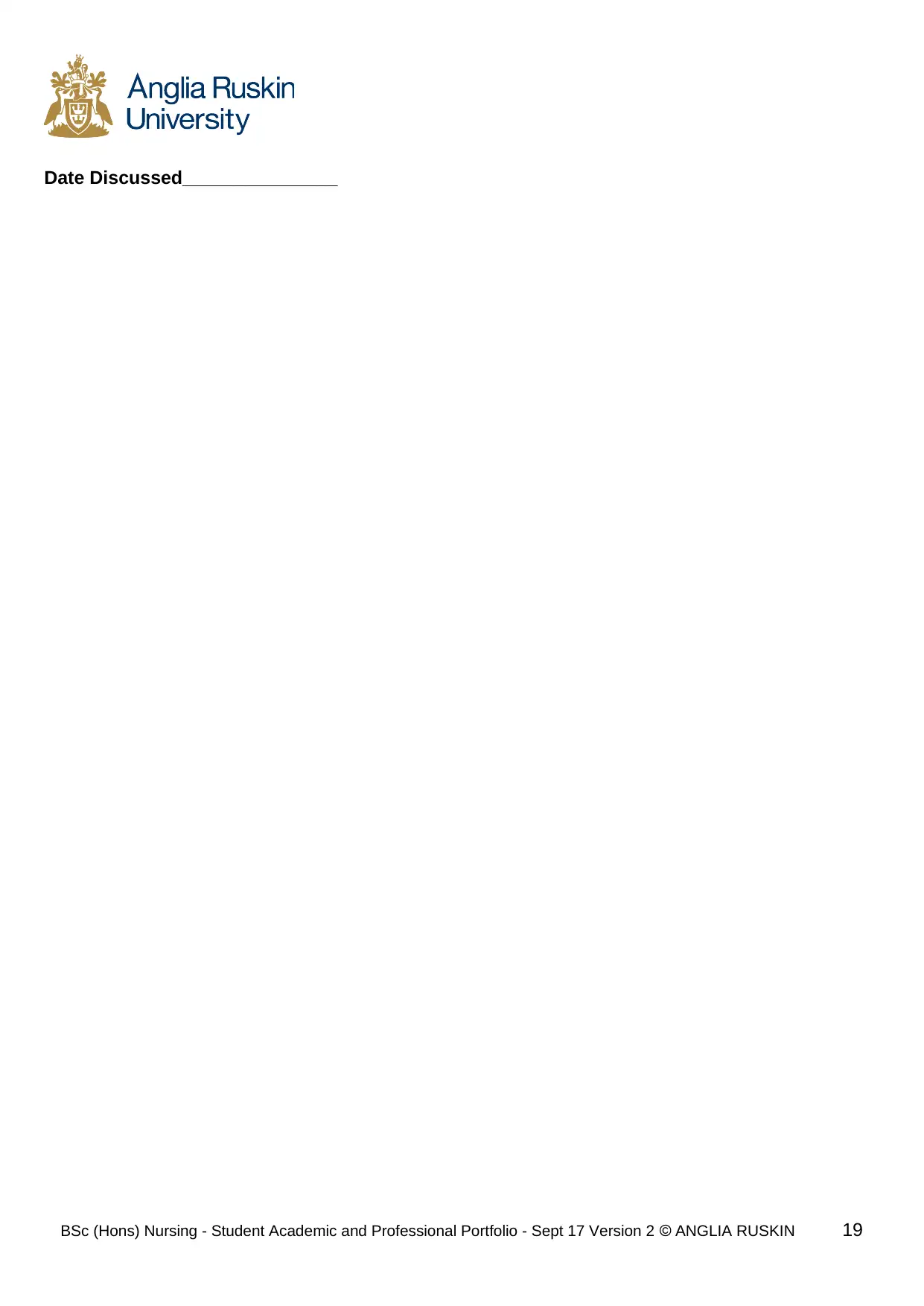
Date Discussed_______________
BSc (Hons) Nursing - Student Academic and Professional Portfolio - Sept 17 Version 2 ANGLIA RUSKIN 19
BSc (Hons) Nursing - Student Academic and Professional Portfolio - Sept 17 Version 2 ANGLIA RUSKIN 19
Paraphrase This Document
Need a fresh take? Get an instant paraphrase of this document with our AI Paraphraser
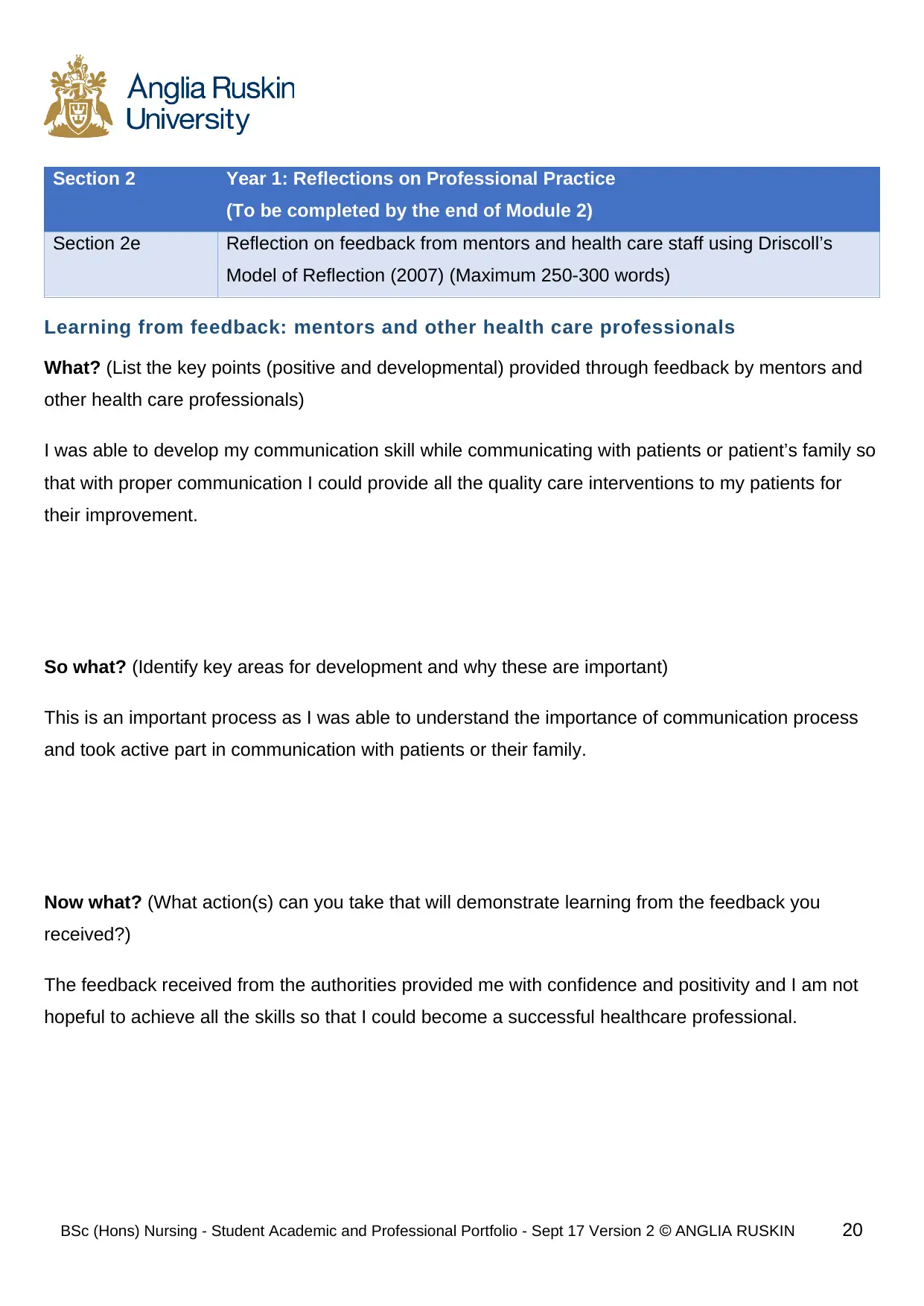
Section 2 Year 1: Reflections on Professional Practice
(To be completed by the end of Module 2)
Section 2e Reflection on feedback from mentors and health care staff using Driscoll’s
Model of Reflection (2007) (Maximum 250-300 words)
Learning from feedback: mentors and other health care professionals
What? (List the key points (positive and developmental) provided through feedback by mentors and
other health care professionals)
I was able to develop my communication skill while communicating with patients or patient’s family so
that with proper communication I could provide all the quality care interventions to my patients for
their improvement.
So what? (Identify key areas for development and why these are important)
This is an important process as I was able to understand the importance of communication process
and took active part in communication with patients or their family.
Now what? (What action(s) can you take that will demonstrate learning from the feedback you
received?)
The feedback received from the authorities provided me with confidence and positivity and I am not
hopeful to achieve all the skills so that I could become a successful healthcare professional.
BSc (Hons) Nursing - Student Academic and Professional Portfolio - Sept 17 Version 2 ANGLIA RUSKIN 20
(To be completed by the end of Module 2)
Section 2e Reflection on feedback from mentors and health care staff using Driscoll’s
Model of Reflection (2007) (Maximum 250-300 words)
Learning from feedback: mentors and other health care professionals
What? (List the key points (positive and developmental) provided through feedback by mentors and
other health care professionals)
I was able to develop my communication skill while communicating with patients or patient’s family so
that with proper communication I could provide all the quality care interventions to my patients for
their improvement.
So what? (Identify key areas for development and why these are important)
This is an important process as I was able to understand the importance of communication process
and took active part in communication with patients or their family.
Now what? (What action(s) can you take that will demonstrate learning from the feedback you
received?)
The feedback received from the authorities provided me with confidence and positivity and I am not
hopeful to achieve all the skills so that I could become a successful healthcare professional.
BSc (Hons) Nursing - Student Academic and Professional Portfolio - Sept 17 Version 2 ANGLIA RUSKIN 20
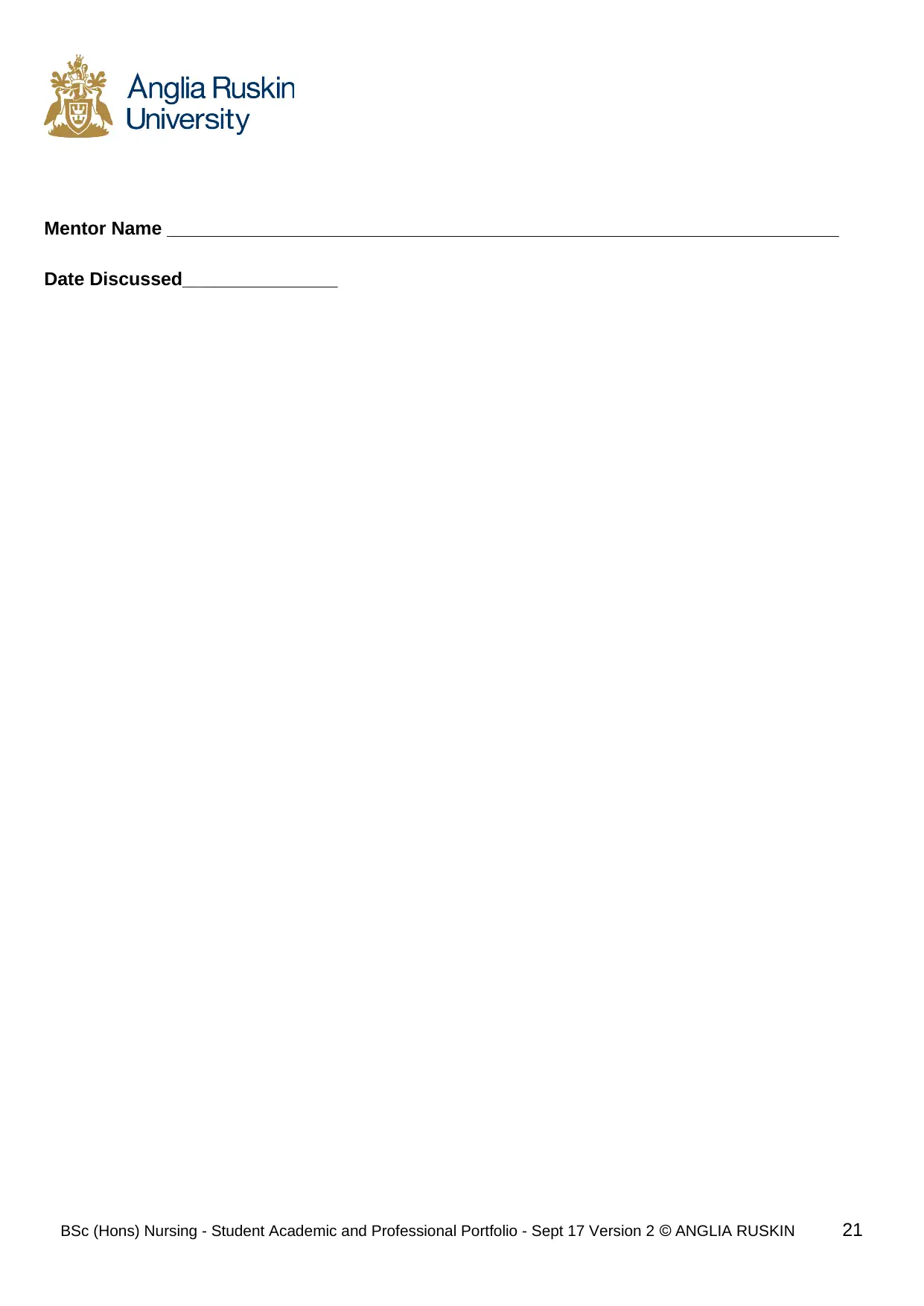
Mentor Name _________________________________________________________________
Date Discussed_______________
BSc (Hons) Nursing - Student Academic and Professional Portfolio - Sept 17 Version 2 ANGLIA RUSKIN 21
Date Discussed_______________
BSc (Hons) Nursing - Student Academic and Professional Portfolio - Sept 17 Version 2 ANGLIA RUSKIN 21
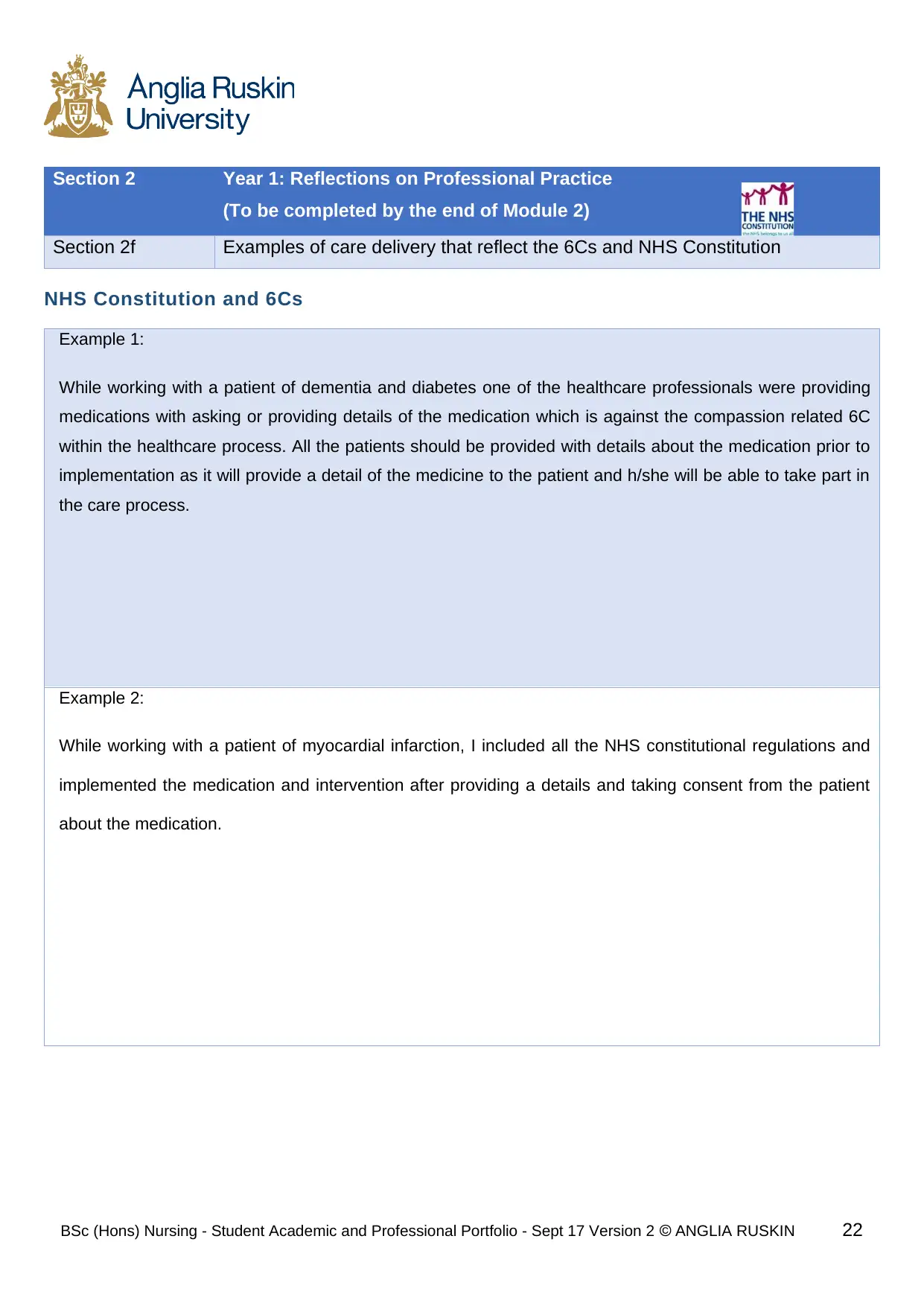
Section 2 Year 1: Reflections on Professional Practice
(To be completed by the end of Module 2)
Section 2f Examples of care delivery that reflect the 6Cs and NHS Constitution
NHS Constitution and 6Cs
Example 1:
While working with a patient of dementia and diabetes one of the healthcare professionals were providing
medications with asking or providing details of the medication which is against the compassion related 6C
within the healthcare process. All the patients should be provided with details about the medication prior to
implementation as it will provide a detail of the medicine to the patient and h/she will be able to take part in
the care process.
Example 2:
While working with a patient of myocardial infarction, I included all the NHS constitutional regulations and
implemented the medication and intervention after providing a details and taking consent from the patient
about the medication.
BSc (Hons) Nursing - Student Academic and Professional Portfolio - Sept 17 Version 2 ANGLIA RUSKIN 22
(To be completed by the end of Module 2)
Section 2f Examples of care delivery that reflect the 6Cs and NHS Constitution
NHS Constitution and 6Cs
Example 1:
While working with a patient of dementia and diabetes one of the healthcare professionals were providing
medications with asking or providing details of the medication which is against the compassion related 6C
within the healthcare process. All the patients should be provided with details about the medication prior to
implementation as it will provide a detail of the medicine to the patient and h/she will be able to take part in
the care process.
Example 2:
While working with a patient of myocardial infarction, I included all the NHS constitutional regulations and
implemented the medication and intervention after providing a details and taking consent from the patient
about the medication.
BSc (Hons) Nursing - Student Academic and Professional Portfolio - Sept 17 Version 2 ANGLIA RUSKIN 22
Secure Best Marks with AI Grader
Need help grading? Try our AI Grader for instant feedback on your assignments.
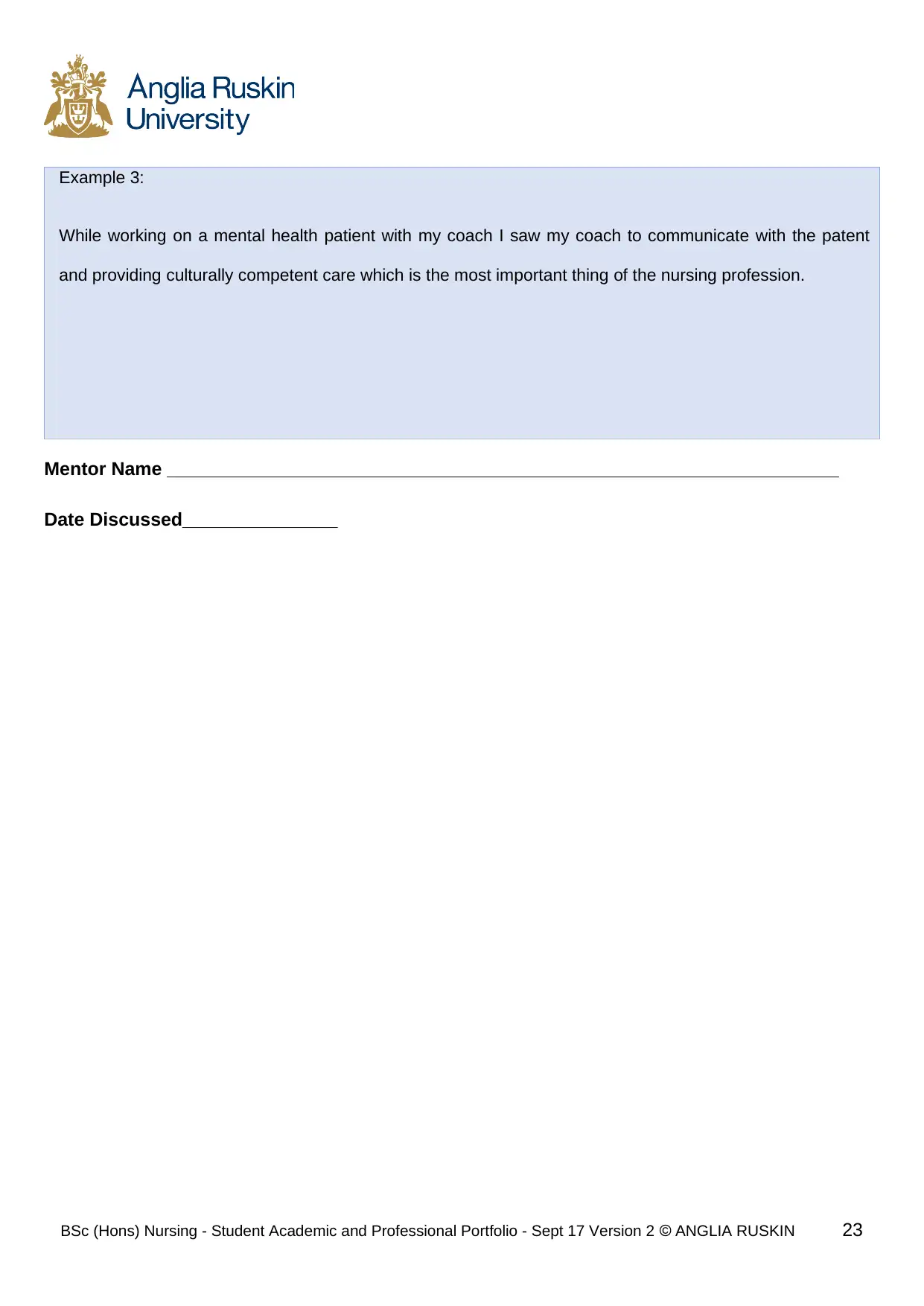
Example 3:
While working on a mental health patient with my coach I saw my coach to communicate with the patent
and providing culturally competent care which is the most important thing of the nursing profession.
Mentor Name _________________________________________________________________
Date Discussed_______________
BSc (Hons) Nursing - Student Academic and Professional Portfolio - Sept 17 Version 2 ANGLIA RUSKIN 23
While working on a mental health patient with my coach I saw my coach to communicate with the patent
and providing culturally competent care which is the most important thing of the nursing profession.
Mentor Name _________________________________________________________________
Date Discussed_______________
BSc (Hons) Nursing - Student Academic and Professional Portfolio - Sept 17 Version 2 ANGLIA RUSKIN 23
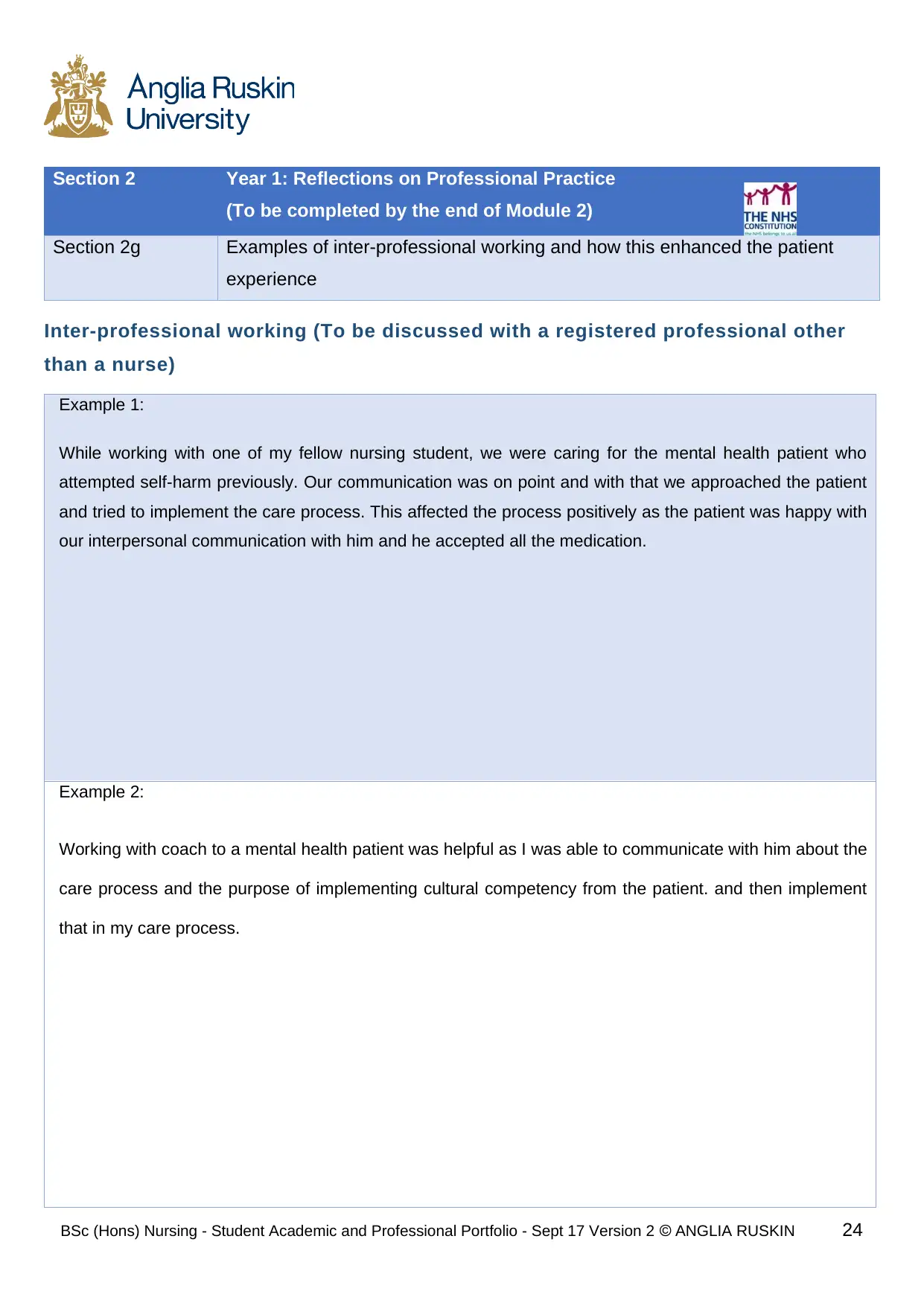
Section 2 Year 1: Reflections on Professional Practice
(To be completed by the end of Module 2)
Section 2g Examples of inter-professional working and how this enhanced the patient
experience
Inter-professional working (To be discussed with a registered professional other
than a nurse)
Example 1:
While working with one of my fellow nursing student, we were caring for the mental health patient who
attempted self-harm previously. Our communication was on point and with that we approached the patient
and tried to implement the care process. This affected the process positively as the patient was happy with
our interpersonal communication with him and he accepted all the medication.
Example 2:
Working with coach to a mental health patient was helpful as I was able to communicate with him about the
care process and the purpose of implementing cultural competency from the patient. and then implement
that in my care process.
BSc (Hons) Nursing - Student Academic and Professional Portfolio - Sept 17 Version 2 ANGLIA RUSKIN 24
(To be completed by the end of Module 2)
Section 2g Examples of inter-professional working and how this enhanced the patient
experience
Inter-professional working (To be discussed with a registered professional other
than a nurse)
Example 1:
While working with one of my fellow nursing student, we were caring for the mental health patient who
attempted self-harm previously. Our communication was on point and with that we approached the patient
and tried to implement the care process. This affected the process positively as the patient was happy with
our interpersonal communication with him and he accepted all the medication.
Example 2:
Working with coach to a mental health patient was helpful as I was able to communicate with him about the
care process and the purpose of implementing cultural competency from the patient. and then implement
that in my care process.
BSc (Hons) Nursing - Student Academic and Professional Portfolio - Sept 17 Version 2 ANGLIA RUSKIN 24
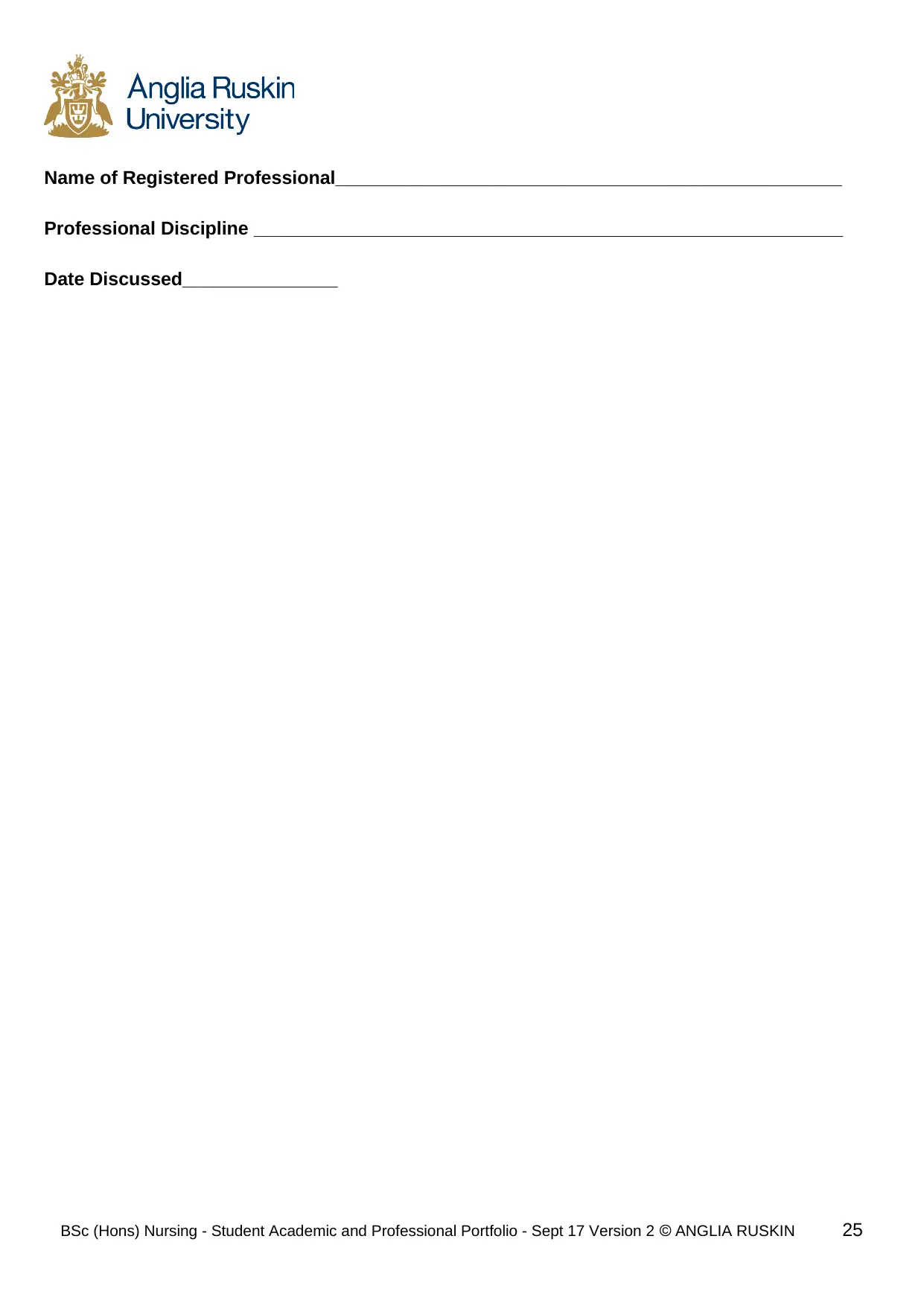
Name of Registered Professional_________________________________________________
Professional Discipline _________________________________________________________
Date Discussed_______________
BSc (Hons) Nursing - Student Academic and Professional Portfolio - Sept 17 Version 2 ANGLIA RUSKIN 25
Professional Discipline _________________________________________________________
Date Discussed_______________
BSc (Hons) Nursing - Student Academic and Professional Portfolio - Sept 17 Version 2 ANGLIA RUSKIN 25
Paraphrase This Document
Need a fresh take? Get an instant paraphrase of this document with our AI Paraphraser
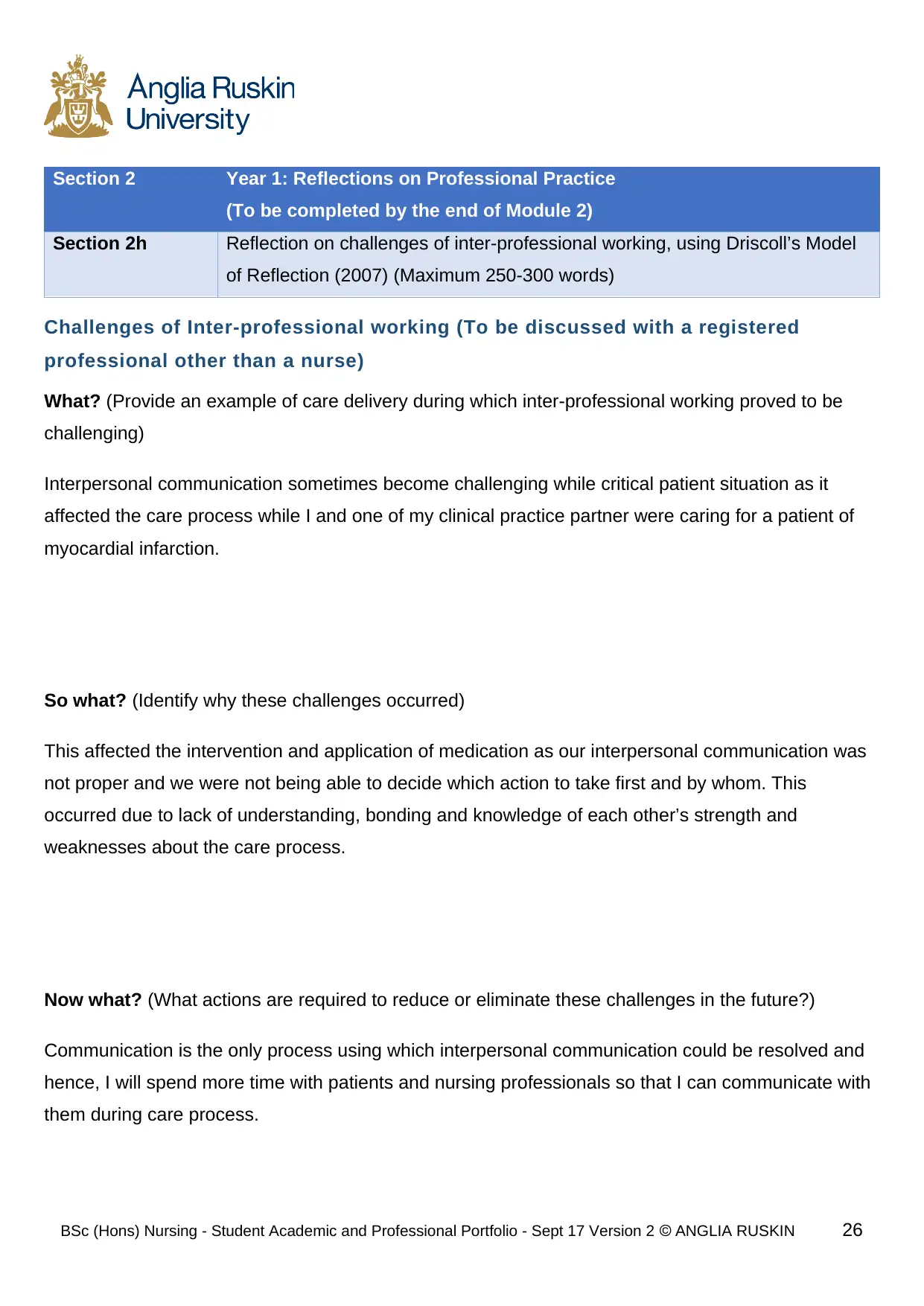
Section 2 Year 1: Reflections on Professional Practice
(To be completed by the end of Module 2)
Section 2h Reflection on challenges of inter-professional working, using Driscoll’s Model
of Reflection (2007) (Maximum 250-300 words)
Challenges of Inter-professional working (To be discussed with a registered
professional other than a nurse)
What? (Provide an example of care delivery during which inter-professional working proved to be
challenging)
Interpersonal communication sometimes become challenging while critical patient situation as it
affected the care process while I and one of my clinical practice partner were caring for a patient of
myocardial infarction.
So what? (Identify why these challenges occurred)
This affected the intervention and application of medication as our interpersonal communication was
not proper and we were not being able to decide which action to take first and by whom. This
occurred due to lack of understanding, bonding and knowledge of each other’s strength and
weaknesses about the care process.
Now what? (What actions are required to reduce or eliminate these challenges in the future?)
Communication is the only process using which interpersonal communication could be resolved and
hence, I will spend more time with patients and nursing professionals so that I can communicate with
them during care process.
BSc (Hons) Nursing - Student Academic and Professional Portfolio - Sept 17 Version 2 ANGLIA RUSKIN 26
(To be completed by the end of Module 2)
Section 2h Reflection on challenges of inter-professional working, using Driscoll’s Model
of Reflection (2007) (Maximum 250-300 words)
Challenges of Inter-professional working (To be discussed with a registered
professional other than a nurse)
What? (Provide an example of care delivery during which inter-professional working proved to be
challenging)
Interpersonal communication sometimes become challenging while critical patient situation as it
affected the care process while I and one of my clinical practice partner were caring for a patient of
myocardial infarction.
So what? (Identify why these challenges occurred)
This affected the intervention and application of medication as our interpersonal communication was
not proper and we were not being able to decide which action to take first and by whom. This
occurred due to lack of understanding, bonding and knowledge of each other’s strength and
weaknesses about the care process.
Now what? (What actions are required to reduce or eliminate these challenges in the future?)
Communication is the only process using which interpersonal communication could be resolved and
hence, I will spend more time with patients and nursing professionals so that I can communicate with
them during care process.
BSc (Hons) Nursing - Student Academic and Professional Portfolio - Sept 17 Version 2 ANGLIA RUSKIN 26
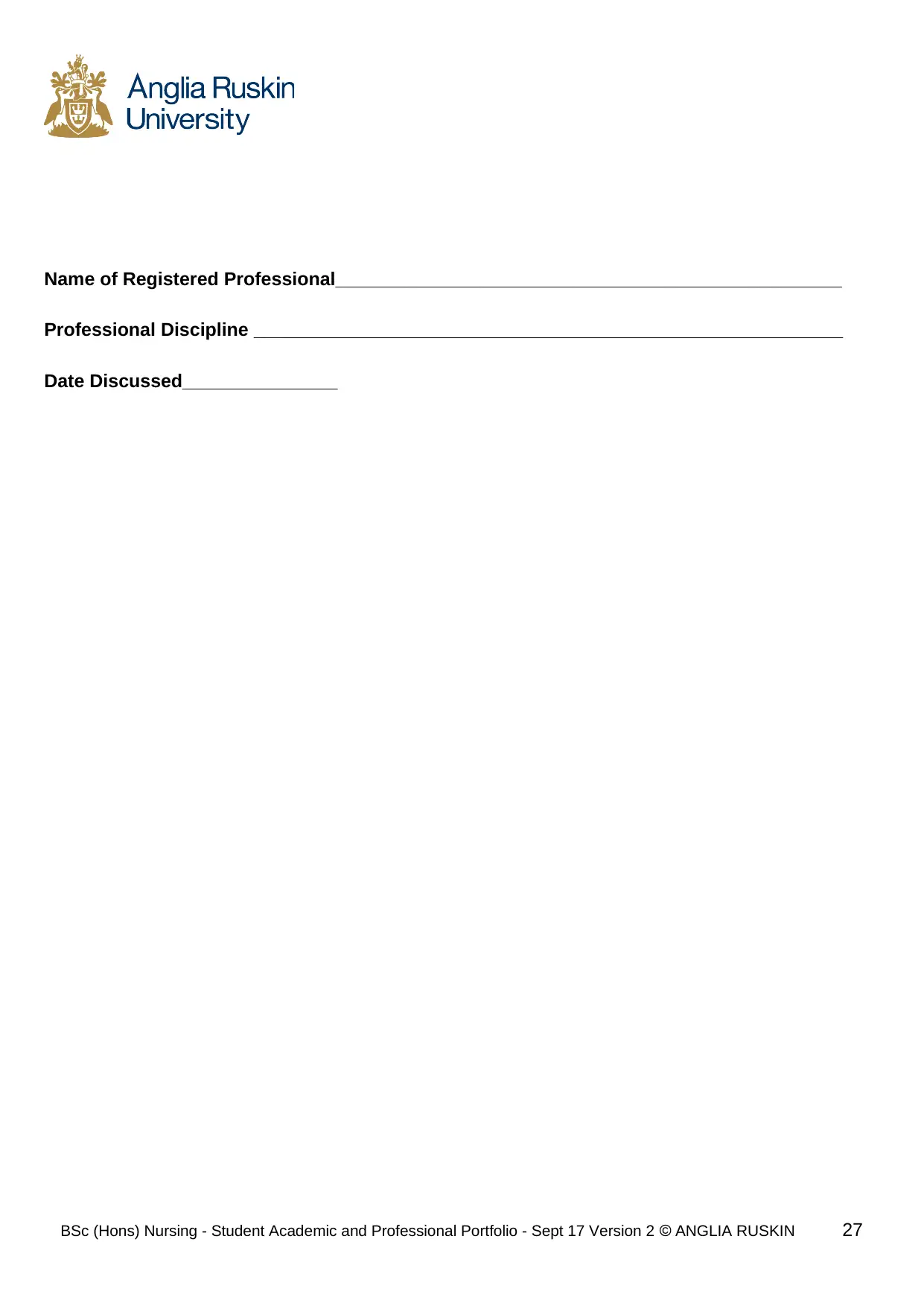
Name of Registered Professional_________________________________________________
Professional Discipline _________________________________________________________
Date Discussed_______________
BSc (Hons) Nursing - Student Academic and Professional Portfolio - Sept 17 Version 2 ANGLIA RUSKIN 27
Professional Discipline _________________________________________________________
Date Discussed_______________
BSc (Hons) Nursing - Student Academic and Professional Portfolio - Sept 17 Version 2 ANGLIA RUSKIN 27
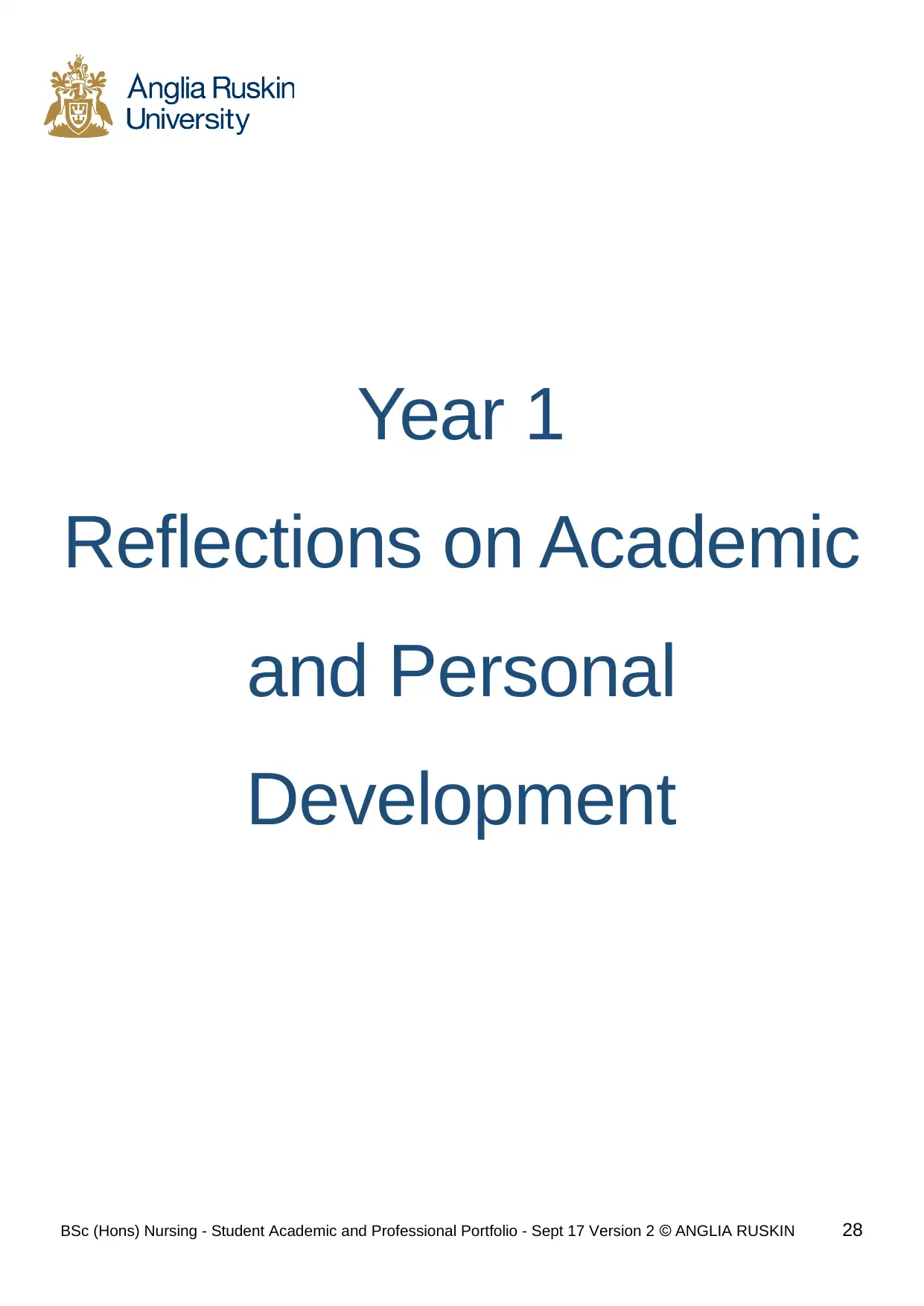
Year 1
Reflections on Academic
and Personal
Development
BSc (Hons) Nursing - Student Academic and Professional Portfolio - Sept 17 Version 2 ANGLIA RUSKIN 28
Reflections on Academic
and Personal
Development
BSc (Hons) Nursing - Student Academic and Professional Portfolio - Sept 17 Version 2 ANGLIA RUSKIN 28
Secure Best Marks with AI Grader
Need help grading? Try our AI Grader for instant feedback on your assignments.
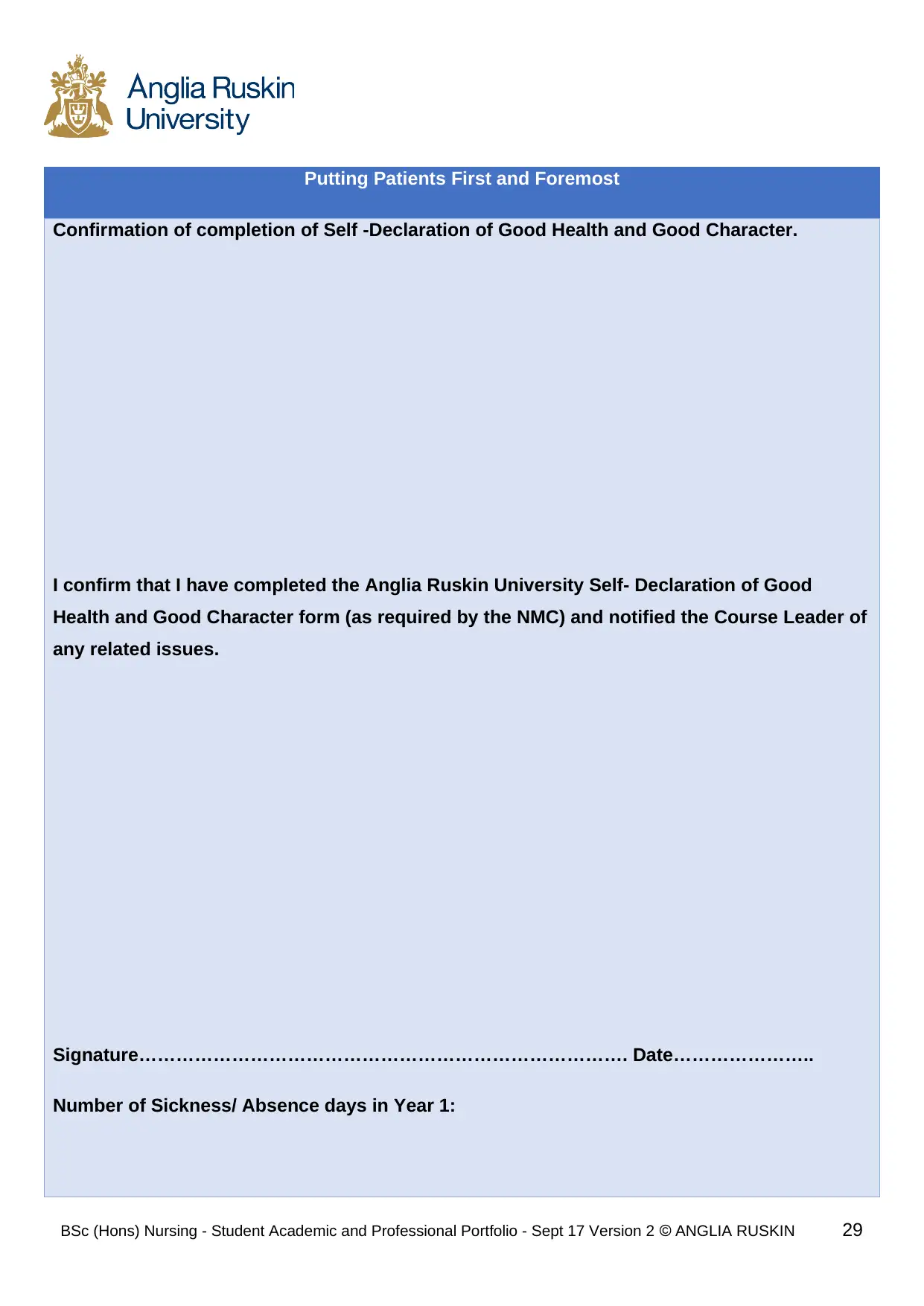
Putting Patients First and Foremost
Confirmation of completion of Self -Declaration of Good Health and Good Character.
I confirm that I have completed the Anglia Ruskin University Self- Declaration of Good
Health and Good Character form (as required by the NMC) and notified the Course Leader of
any related issues.
Signature……………………………………………………………………. Date…………………..
Number of Sickness/ Absence days in Year 1:
BSc (Hons) Nursing - Student Academic and Professional Portfolio - Sept 17 Version 2 ANGLIA RUSKIN 29
Confirmation of completion of Self -Declaration of Good Health and Good Character.
I confirm that I have completed the Anglia Ruskin University Self- Declaration of Good
Health and Good Character form (as required by the NMC) and notified the Course Leader of
any related issues.
Signature……………………………………………………………………. Date…………………..
Number of Sickness/ Absence days in Year 1:
BSc (Hons) Nursing - Student Academic and Professional Portfolio - Sept 17 Version 2 ANGLIA RUSKIN 29
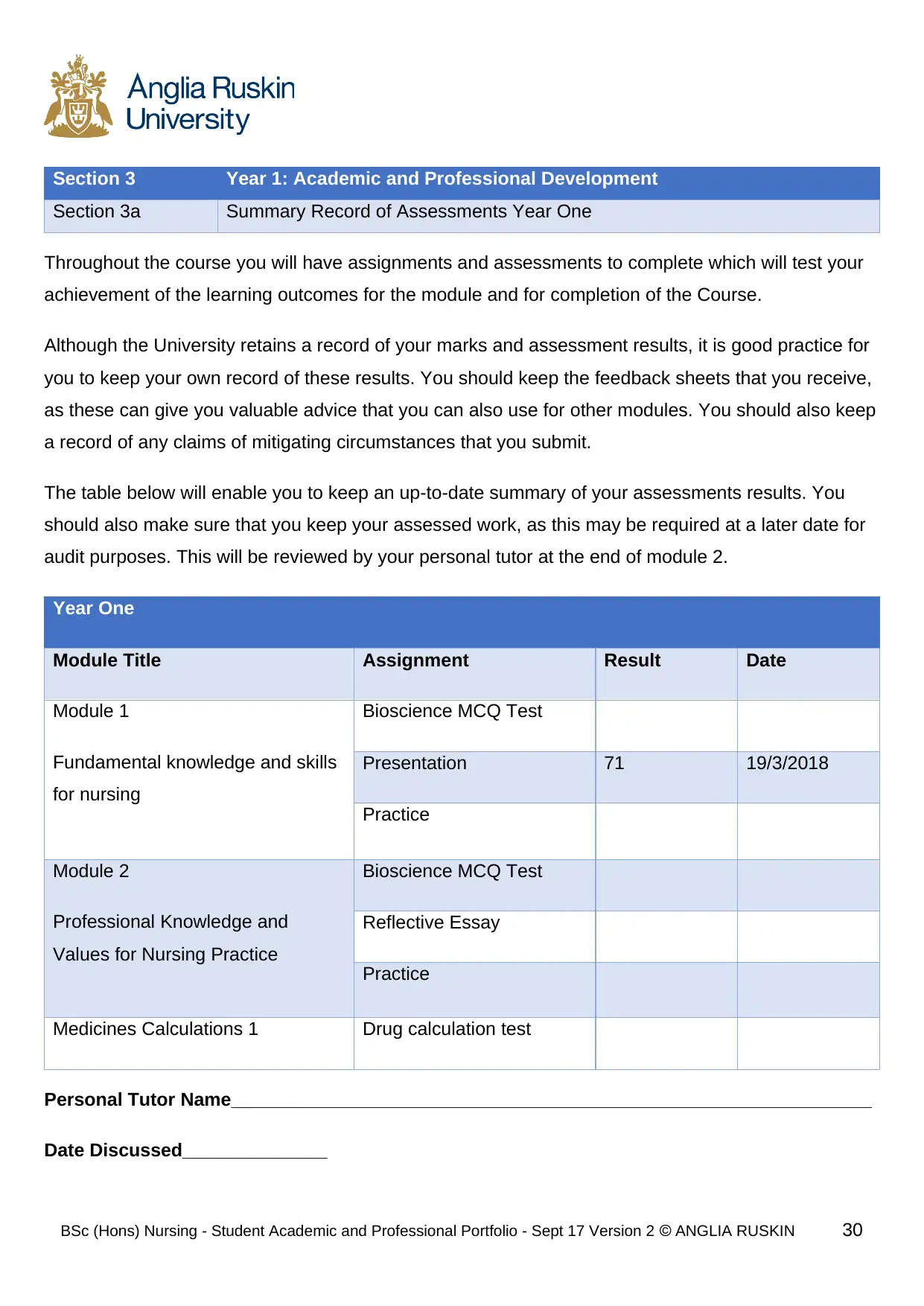
Section 3 Year 1: Academic and Professional Development
Section 3a Summary Record of Assessments Year One
Throughout the course you will have assignments and assessments to complete which will test your
achievement of the learning outcomes for the module and for completion of the Course.
Although the University retains a record of your marks and assessment results, it is good practice for
you to keep your own record of these results. You should keep the feedback sheets that you receive,
as these can give you valuable advice that you can also use for other modules. You should also keep
a record of any claims of mitigating circumstances that you submit.
The table below will enable you to keep an up-to-date summary of your assessments results. You
should also make sure that you keep your assessed work, as this may be required at a later date for
audit purposes. This will be reviewed by your personal tutor at the end of module 2.
Year One
Module Title Assignment Result Date
Module 1
Fundamental knowledge and skills
for nursing
Bioscience MCQ Test
Presentation 71 19/3/2018
Practice
Module 2
Professional Knowledge and
Values for Nursing Practice
Bioscience MCQ Test
Reflective Essay
Practice
Medicines Calculations 1 Drug calculation test
Personal Tutor Name______________________________________________________________
Date Discussed______________
BSc (Hons) Nursing - Student Academic and Professional Portfolio - Sept 17 Version 2 ANGLIA RUSKIN 30
Section 3a Summary Record of Assessments Year One
Throughout the course you will have assignments and assessments to complete which will test your
achievement of the learning outcomes for the module and for completion of the Course.
Although the University retains a record of your marks and assessment results, it is good practice for
you to keep your own record of these results. You should keep the feedback sheets that you receive,
as these can give you valuable advice that you can also use for other modules. You should also keep
a record of any claims of mitigating circumstances that you submit.
The table below will enable you to keep an up-to-date summary of your assessments results. You
should also make sure that you keep your assessed work, as this may be required at a later date for
audit purposes. This will be reviewed by your personal tutor at the end of module 2.
Year One
Module Title Assignment Result Date
Module 1
Fundamental knowledge and skills
for nursing
Bioscience MCQ Test
Presentation 71 19/3/2018
Practice
Module 2
Professional Knowledge and
Values for Nursing Practice
Bioscience MCQ Test
Reflective Essay
Practice
Medicines Calculations 1 Drug calculation test
Personal Tutor Name______________________________________________________________
Date Discussed______________
BSc (Hons) Nursing - Student Academic and Professional Portfolio - Sept 17 Version 2 ANGLIA RUSKIN 30
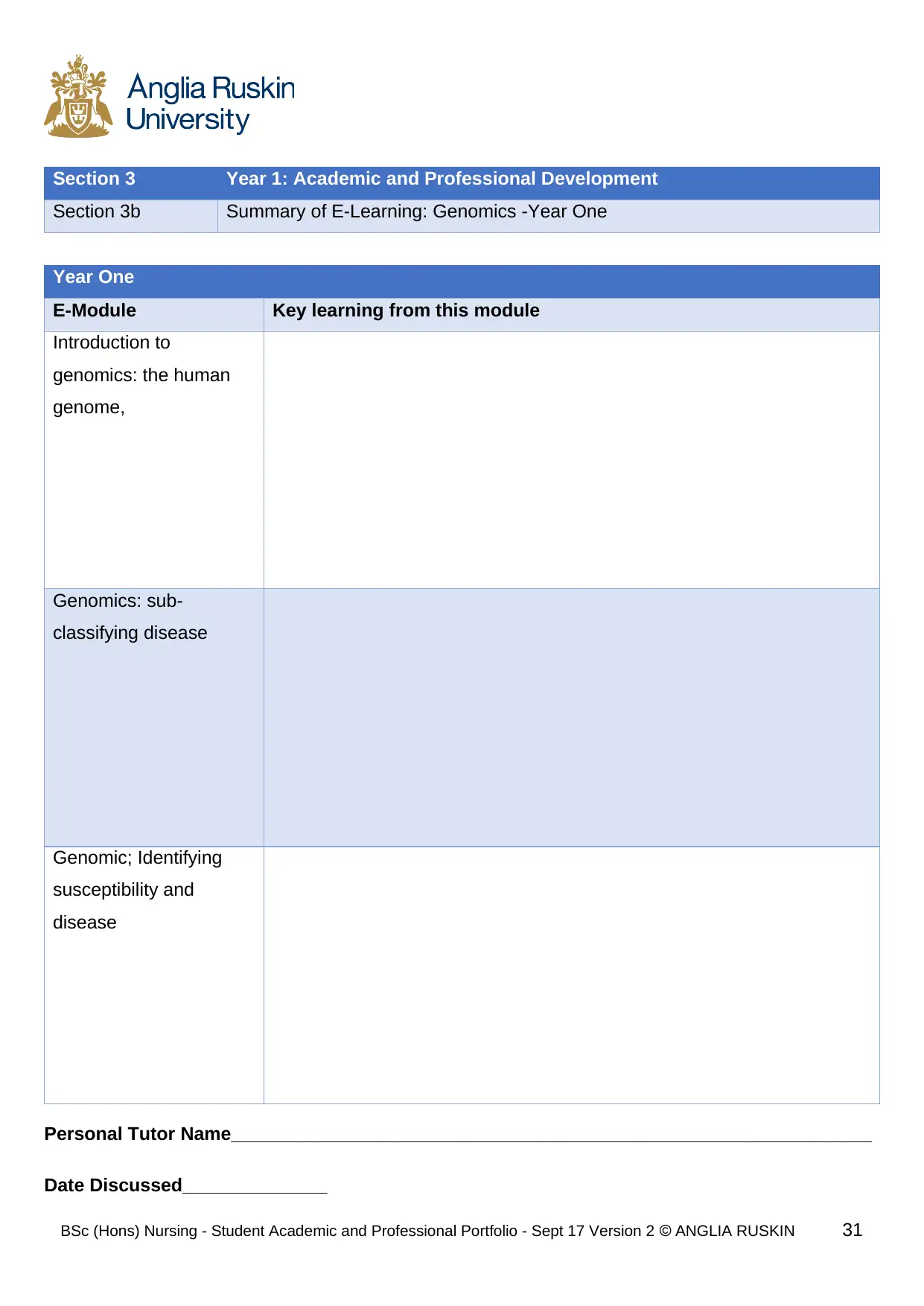
Section 3 Year 1: Academic and Professional Development
Section 3b Summary of E-Learning: Genomics -Year One
Year One
E-Module Key learning from this module
Introduction to
genomics: the human
genome,
Genomics: sub-
classifying disease
Genomic; Identifying
susceptibility and
disease
Personal Tutor Name______________________________________________________________
Date Discussed______________
BSc (Hons) Nursing - Student Academic and Professional Portfolio - Sept 17 Version 2 ANGLIA RUSKIN 31
Section 3b Summary of E-Learning: Genomics -Year One
Year One
E-Module Key learning from this module
Introduction to
genomics: the human
genome,
Genomics: sub-
classifying disease
Genomic; Identifying
susceptibility and
disease
Personal Tutor Name______________________________________________________________
Date Discussed______________
BSc (Hons) Nursing - Student Academic and Professional Portfolio - Sept 17 Version 2 ANGLIA RUSKIN 31
Paraphrase This Document
Need a fresh take? Get an instant paraphrase of this document with our AI Paraphraser
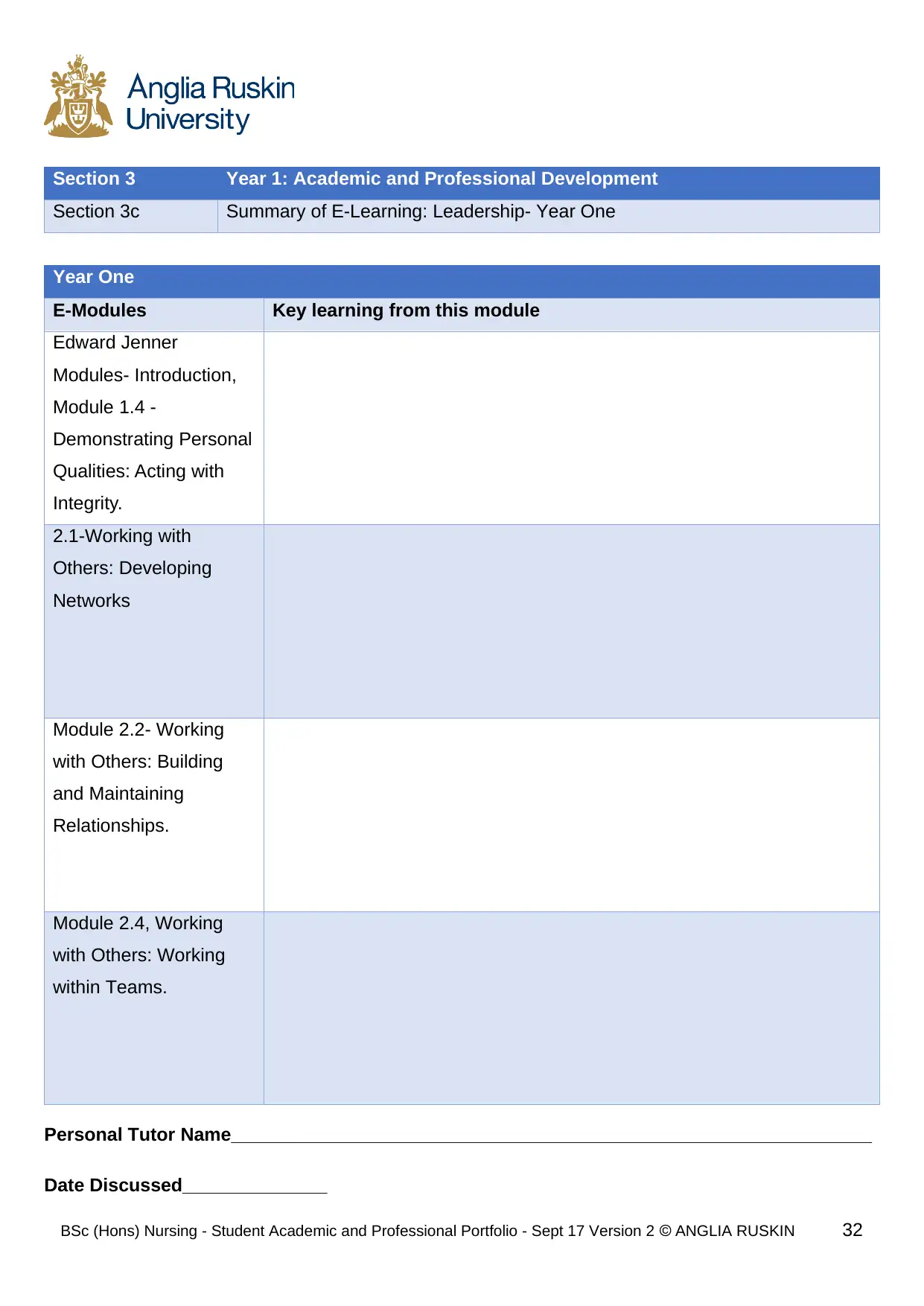
Section 3 Year 1: Academic and Professional Development
Section 3c Summary of E-Learning: Leadership- Year One
Year One
E-Modules Key learning from this module
Edward Jenner
Modules- Introduction,
Module 1.4 -
Demonstrating Personal
Qualities: Acting with
Integrity.
2.1-Working with
Others: Developing
Networks
Module 2.2- Working
with Others: Building
and Maintaining
Relationships.
Module 2.4, Working
with Others: Working
within Teams.
Personal Tutor Name______________________________________________________________
Date Discussed______________
BSc (Hons) Nursing - Student Academic and Professional Portfolio - Sept 17 Version 2 ANGLIA RUSKIN 32
Section 3c Summary of E-Learning: Leadership- Year One
Year One
E-Modules Key learning from this module
Edward Jenner
Modules- Introduction,
Module 1.4 -
Demonstrating Personal
Qualities: Acting with
Integrity.
2.1-Working with
Others: Developing
Networks
Module 2.2- Working
with Others: Building
and Maintaining
Relationships.
Module 2.4, Working
with Others: Working
within Teams.
Personal Tutor Name______________________________________________________________
Date Discussed______________
BSc (Hons) Nursing - Student Academic and Professional Portfolio - Sept 17 Version 2 ANGLIA RUSKIN 32
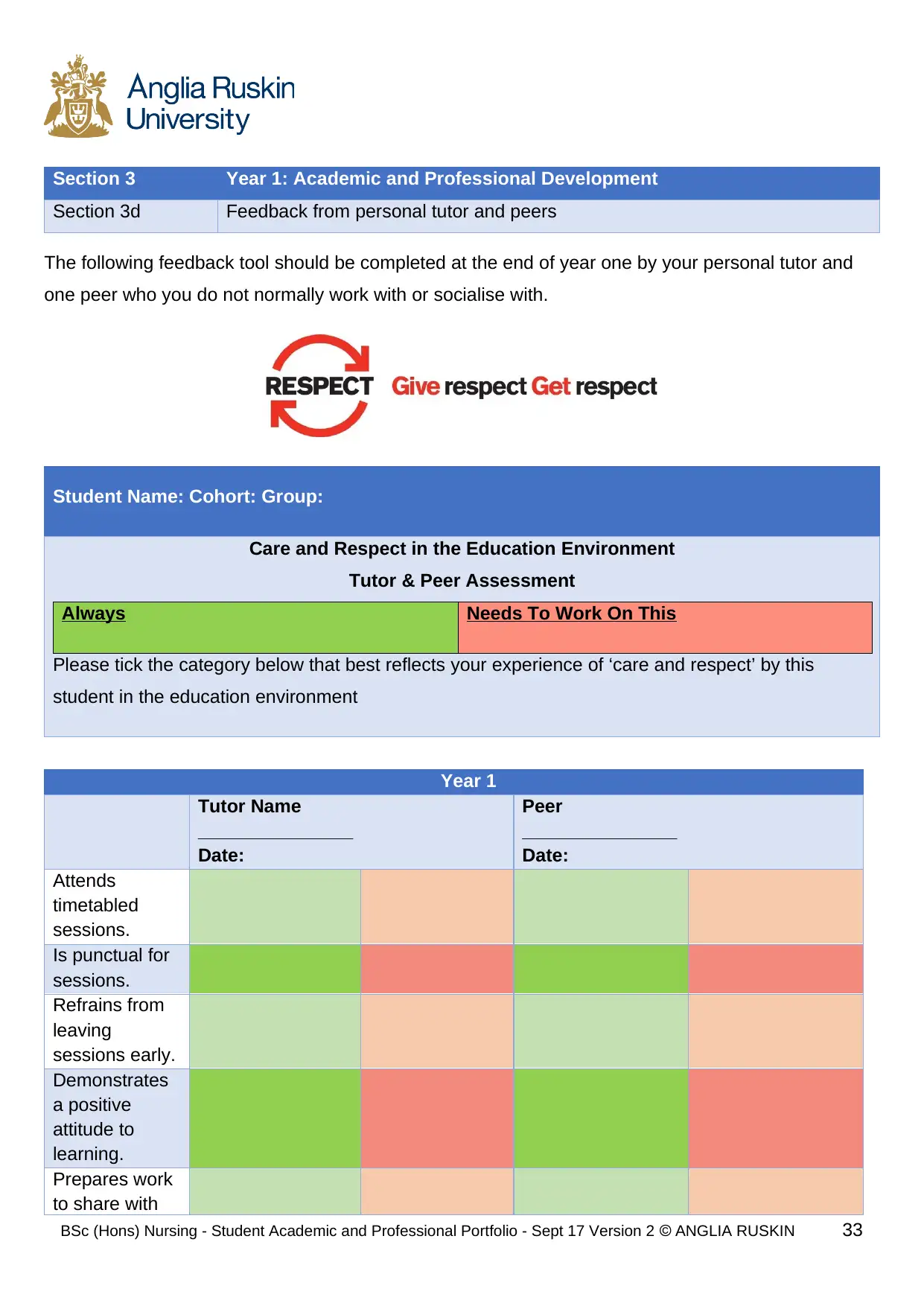
Section 3 Year 1: Academic and Professional Development
Section 3d Feedback from personal tutor and peers
The following feedback tool should be completed at the end of year one by your personal tutor and
one peer who you do not normally work with or socialise with.
Student Name: Cohort: Group:
Care and Respect in the Education Environment
Tutor & Peer Assessment
Always Needs To Work On This
Please tick the category below that best reflects your experience of ‘care and respect’ by this
student in the education environment
Year 1
Tutor Name
_______________
Date:
Peer
_______________
Date:
Attends
timetabled
sessions.
Is punctual for
sessions.
Refrains from
leaving
sessions early.
Demonstrates
a positive
attitude to
learning.
Prepares work
to share with
BSc (Hons) Nursing - Student Academic and Professional Portfolio - Sept 17 Version 2 ANGLIA RUSKIN 33
Section 3d Feedback from personal tutor and peers
The following feedback tool should be completed at the end of year one by your personal tutor and
one peer who you do not normally work with or socialise with.
Student Name: Cohort: Group:
Care and Respect in the Education Environment
Tutor & Peer Assessment
Always Needs To Work On This
Please tick the category below that best reflects your experience of ‘care and respect’ by this
student in the education environment
Year 1
Tutor Name
_______________
Date:
Peer
_______________
Date:
Attends
timetabled
sessions.
Is punctual for
sessions.
Refrains from
leaving
sessions early.
Demonstrates
a positive
attitude to
learning.
Prepares work
to share with
BSc (Hons) Nursing - Student Academic and Professional Portfolio - Sept 17 Version 2 ANGLIA RUSKIN 33
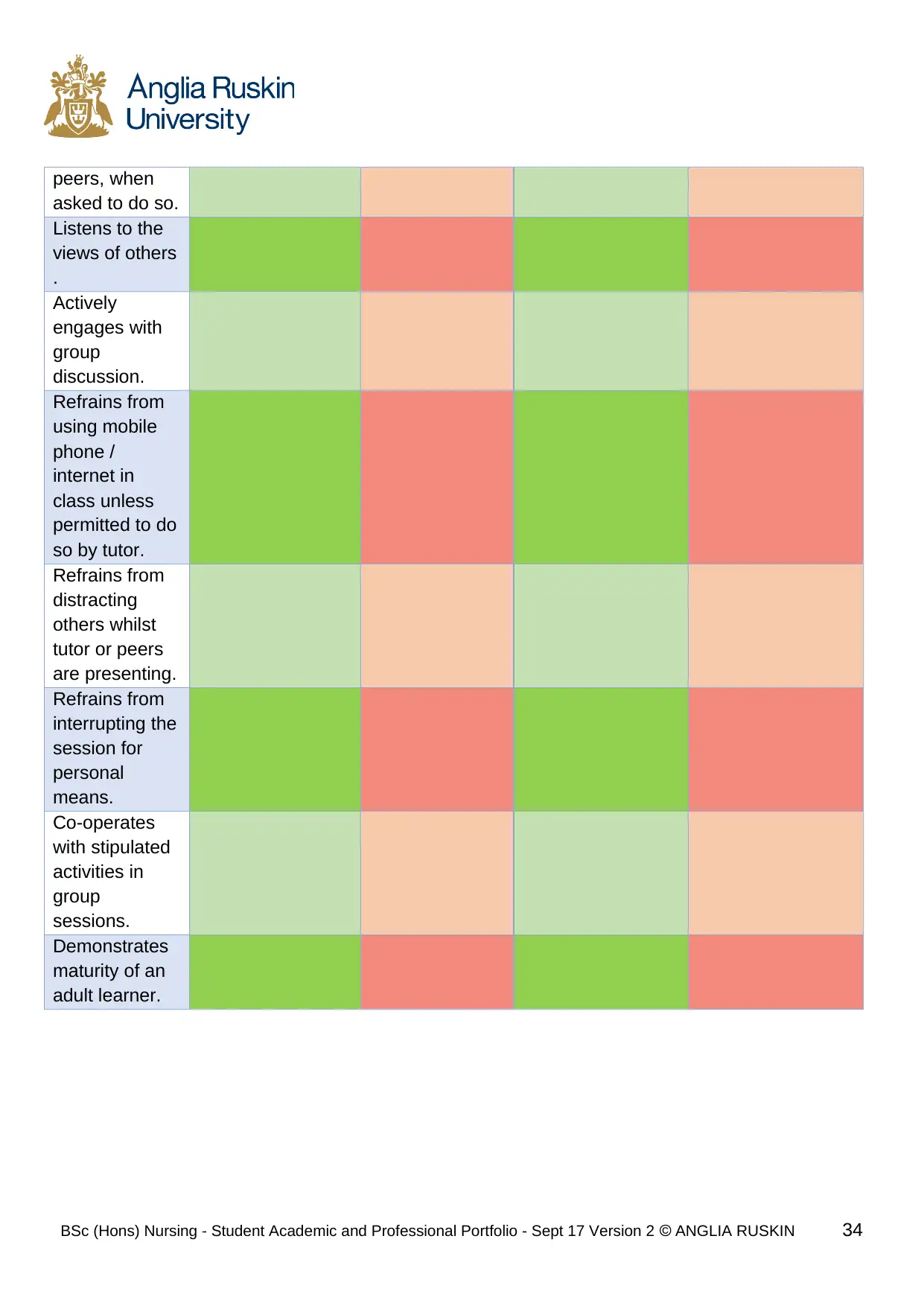
peers, when
asked to do so.
Listens to the
views of others
.
Actively
engages with
group
discussion.
Refrains from
using mobile
phone /
internet in
class unless
permitted to do
so by tutor.
Refrains from
distracting
others whilst
tutor or peers
are presenting.
Refrains from
interrupting the
session for
personal
means.
Co-operates
with stipulated
activities in
group
sessions.
Demonstrates
maturity of an
adult learner.
BSc (Hons) Nursing - Student Academic and Professional Portfolio - Sept 17 Version 2 ANGLIA RUSKIN 34
asked to do so.
Listens to the
views of others
.
Actively
engages with
group
discussion.
Refrains from
using mobile
phone /
internet in
class unless
permitted to do
so by tutor.
Refrains from
distracting
others whilst
tutor or peers
are presenting.
Refrains from
interrupting the
session for
personal
means.
Co-operates
with stipulated
activities in
group
sessions.
Demonstrates
maturity of an
adult learner.
BSc (Hons) Nursing - Student Academic and Professional Portfolio - Sept 17 Version 2 ANGLIA RUSKIN 34
Secure Best Marks with AI Grader
Need help grading? Try our AI Grader for instant feedback on your assignments.
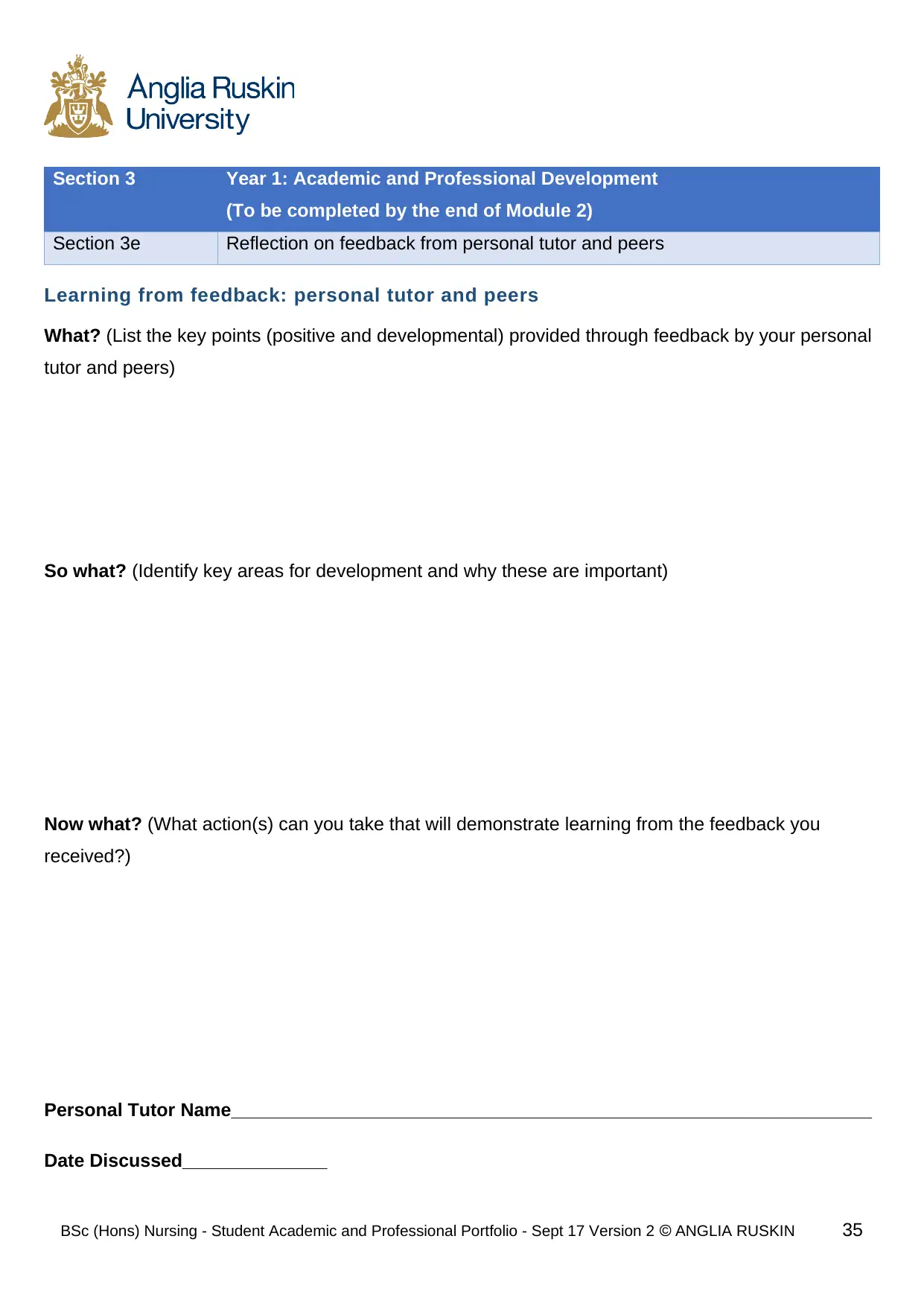
Section 3 Year 1: Academic and Professional Development
(To be completed by the end of Module 2)
Section 3e Reflection on feedback from personal tutor and peers
Learning from feedback: personal tutor and peers
What? (List the key points (positive and developmental) provided through feedback by your personal
tutor and peers)
So what? (Identify key areas for development and why these are important)
Now what? (What action(s) can you take that will demonstrate learning from the feedback you
received?)
Personal Tutor Name______________________________________________________________
Date Discussed______________
BSc (Hons) Nursing - Student Academic and Professional Portfolio - Sept 17 Version 2 ANGLIA RUSKIN 35
(To be completed by the end of Module 2)
Section 3e Reflection on feedback from personal tutor and peers
Learning from feedback: personal tutor and peers
What? (List the key points (positive and developmental) provided through feedback by your personal
tutor and peers)
So what? (Identify key areas for development and why these are important)
Now what? (What action(s) can you take that will demonstrate learning from the feedback you
received?)
Personal Tutor Name______________________________________________________________
Date Discussed______________
BSc (Hons) Nursing - Student Academic and Professional Portfolio - Sept 17 Version 2 ANGLIA RUSKIN 35
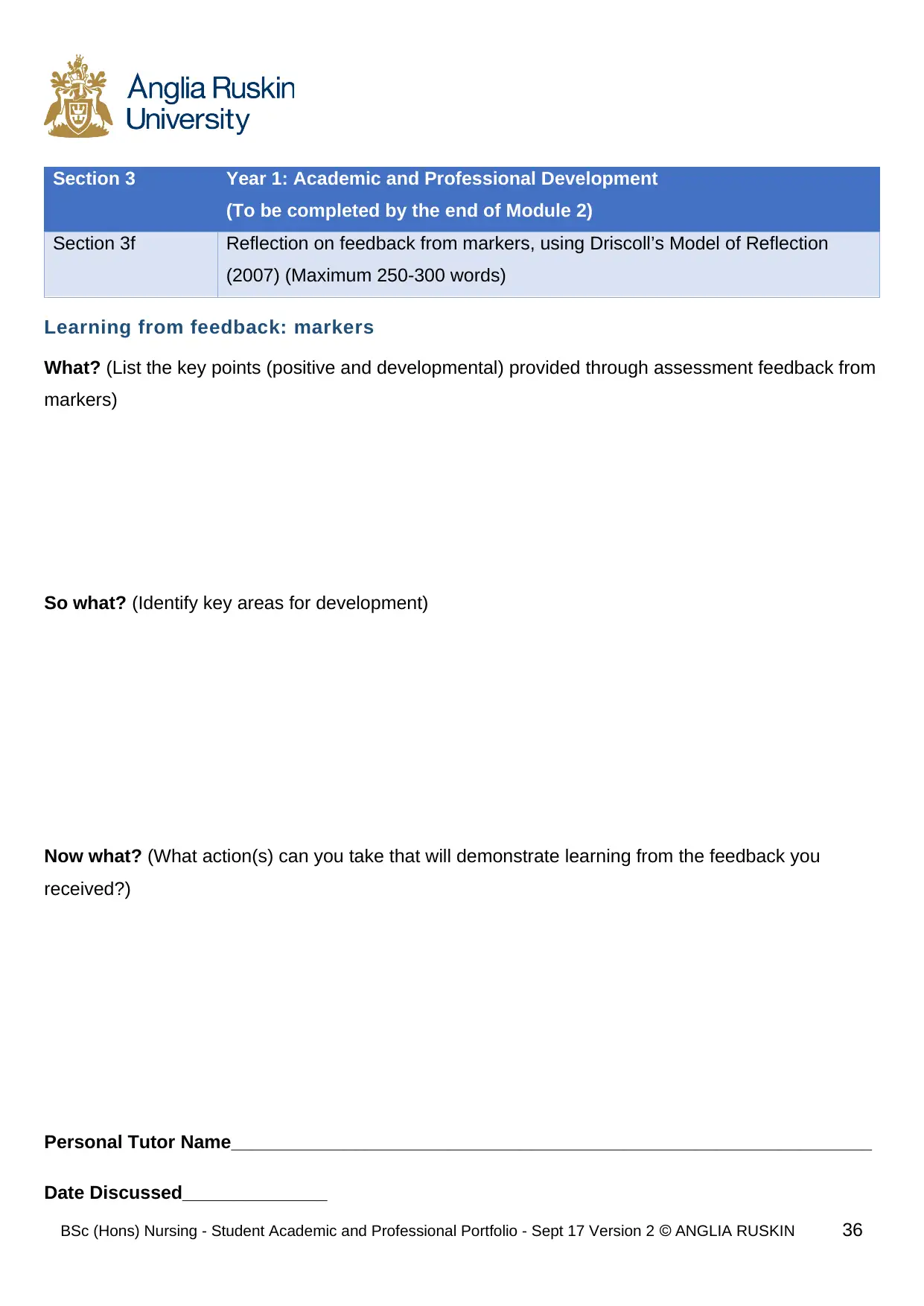
Section 3 Year 1: Academic and Professional Development
(To be completed by the end of Module 2)
Section 3f Reflection on feedback from markers, using Driscoll’s Model of Reflection
(2007) (Maximum 250-300 words)
Learning from feedback: markers
What? (List the key points (positive and developmental) provided through assessment feedback from
markers)
So what? (Identify key areas for development)
Now what? (What action(s) can you take that will demonstrate learning from the feedback you
received?)
Personal Tutor Name______________________________________________________________
Date Discussed______________
BSc (Hons) Nursing - Student Academic and Professional Portfolio - Sept 17 Version 2 ANGLIA RUSKIN 36
(To be completed by the end of Module 2)
Section 3f Reflection on feedback from markers, using Driscoll’s Model of Reflection
(2007) (Maximum 250-300 words)
Learning from feedback: markers
What? (List the key points (positive and developmental) provided through assessment feedback from
markers)
So what? (Identify key areas for development)
Now what? (What action(s) can you take that will demonstrate learning from the feedback you
received?)
Personal Tutor Name______________________________________________________________
Date Discussed______________
BSc (Hons) Nursing - Student Academic and Professional Portfolio - Sept 17 Version 2 ANGLIA RUSKIN 36
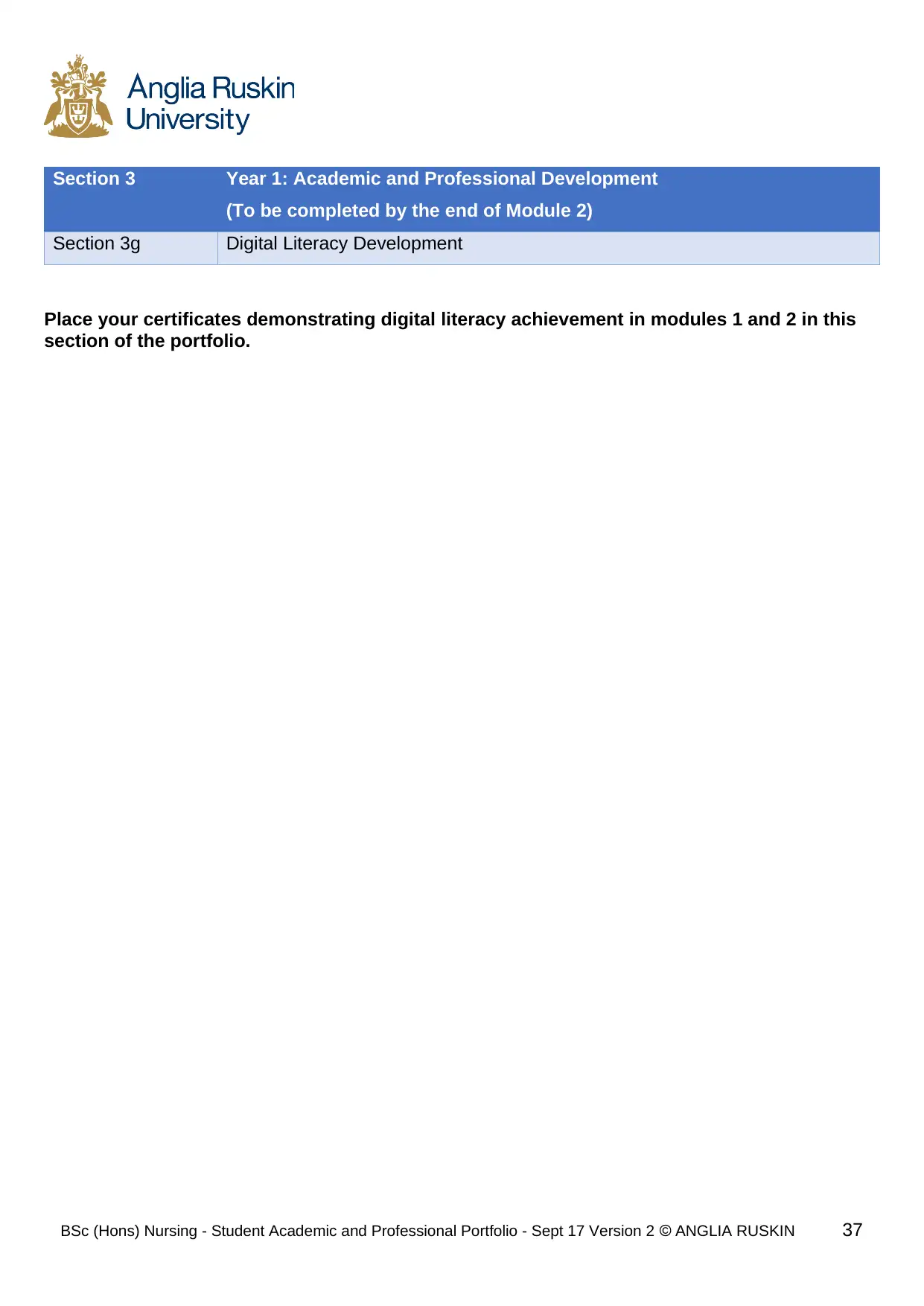
Section 3 Year 1: Academic and Professional Development
(To be completed by the end of Module 2)
Section 3g Digital Literacy Development
Place your certificates demonstrating digital literacy achievement in modules 1 and 2 in this
section of the portfolio.
BSc (Hons) Nursing - Student Academic and Professional Portfolio - Sept 17 Version 2 ANGLIA RUSKIN 37
(To be completed by the end of Module 2)
Section 3g Digital Literacy Development
Place your certificates demonstrating digital literacy achievement in modules 1 and 2 in this
section of the portfolio.
BSc (Hons) Nursing - Student Academic and Professional Portfolio - Sept 17 Version 2 ANGLIA RUSKIN 37
Paraphrase This Document
Need a fresh take? Get an instant paraphrase of this document with our AI Paraphraser
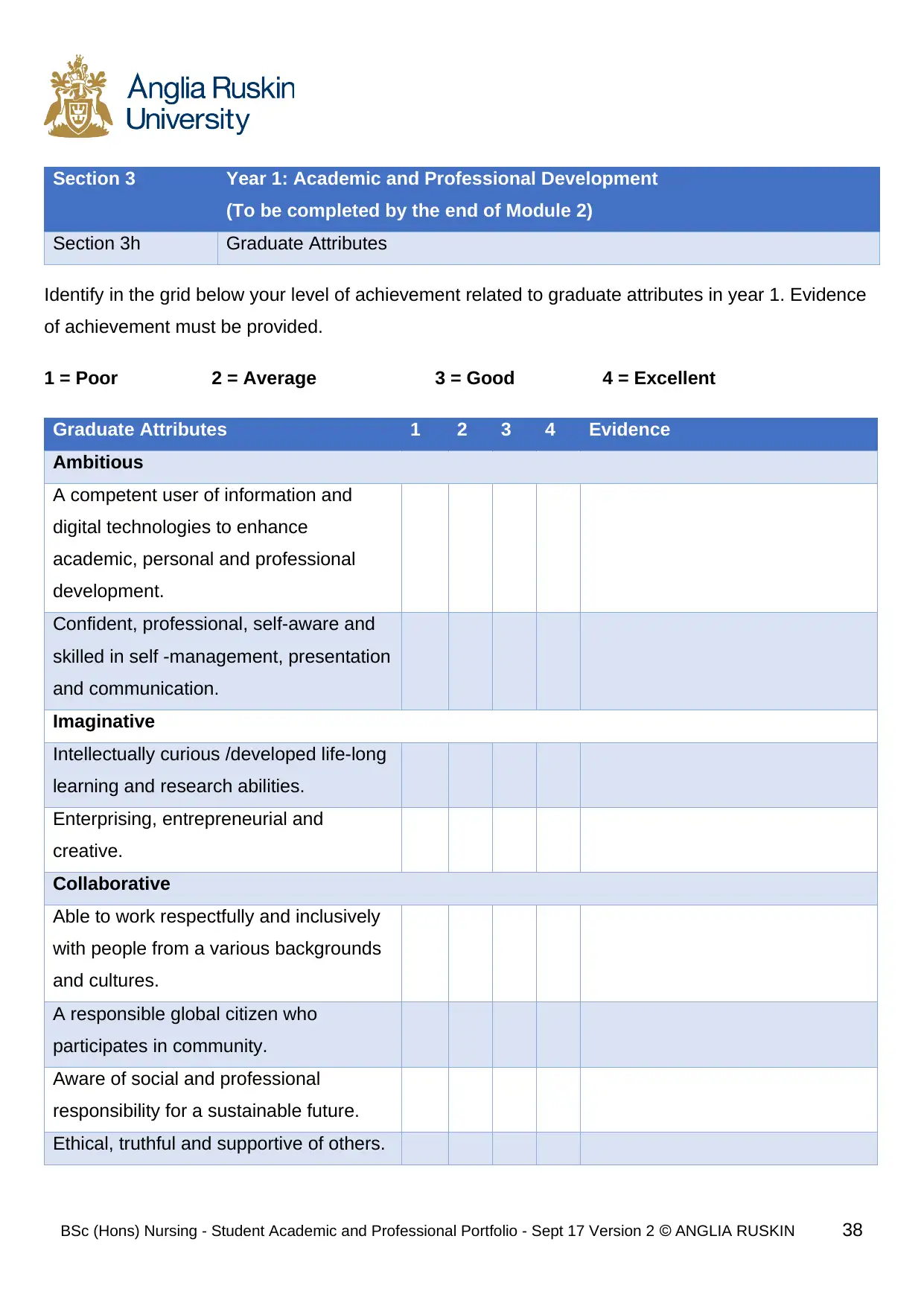
Section 3 Year 1: Academic and Professional Development
(To be completed by the end of Module 2)
Section 3h Graduate Attributes
Identify in the grid below your level of achievement related to graduate attributes in year 1. Evidence
of achievement must be provided.
1 = Poor 2 = Average 3 = Good 4 = Excellent
Graduate Attributes 1 2 3 4 Evidence
Ambitious
A competent user of information and
digital technologies to enhance
academic, personal and professional
development.
Confident, professional, self-aware and
skilled in self -management, presentation
and communication.
Imaginative
Intellectually curious /developed life-long
learning and research abilities.
Enterprising, entrepreneurial and
creative.
Collaborative
Able to work respectfully and inclusively
with people from a various backgrounds
and cultures.
A responsible global citizen who
participates in community.
Aware of social and professional
responsibility for a sustainable future.
Ethical, truthful and supportive of others.
BSc (Hons) Nursing - Student Academic and Professional Portfolio - Sept 17 Version 2 ANGLIA RUSKIN 38
(To be completed by the end of Module 2)
Section 3h Graduate Attributes
Identify in the grid below your level of achievement related to graduate attributes in year 1. Evidence
of achievement must be provided.
1 = Poor 2 = Average 3 = Good 4 = Excellent
Graduate Attributes 1 2 3 4 Evidence
Ambitious
A competent user of information and
digital technologies to enhance
academic, personal and professional
development.
Confident, professional, self-aware and
skilled in self -management, presentation
and communication.
Imaginative
Intellectually curious /developed life-long
learning and research abilities.
Enterprising, entrepreneurial and
creative.
Collaborative
Able to work respectfully and inclusively
with people from a various backgrounds
and cultures.
A responsible global citizen who
participates in community.
Aware of social and professional
responsibility for a sustainable future.
Ethical, truthful and supportive of others.
BSc (Hons) Nursing - Student Academic and Professional Portfolio - Sept 17 Version 2 ANGLIA RUSKIN 38
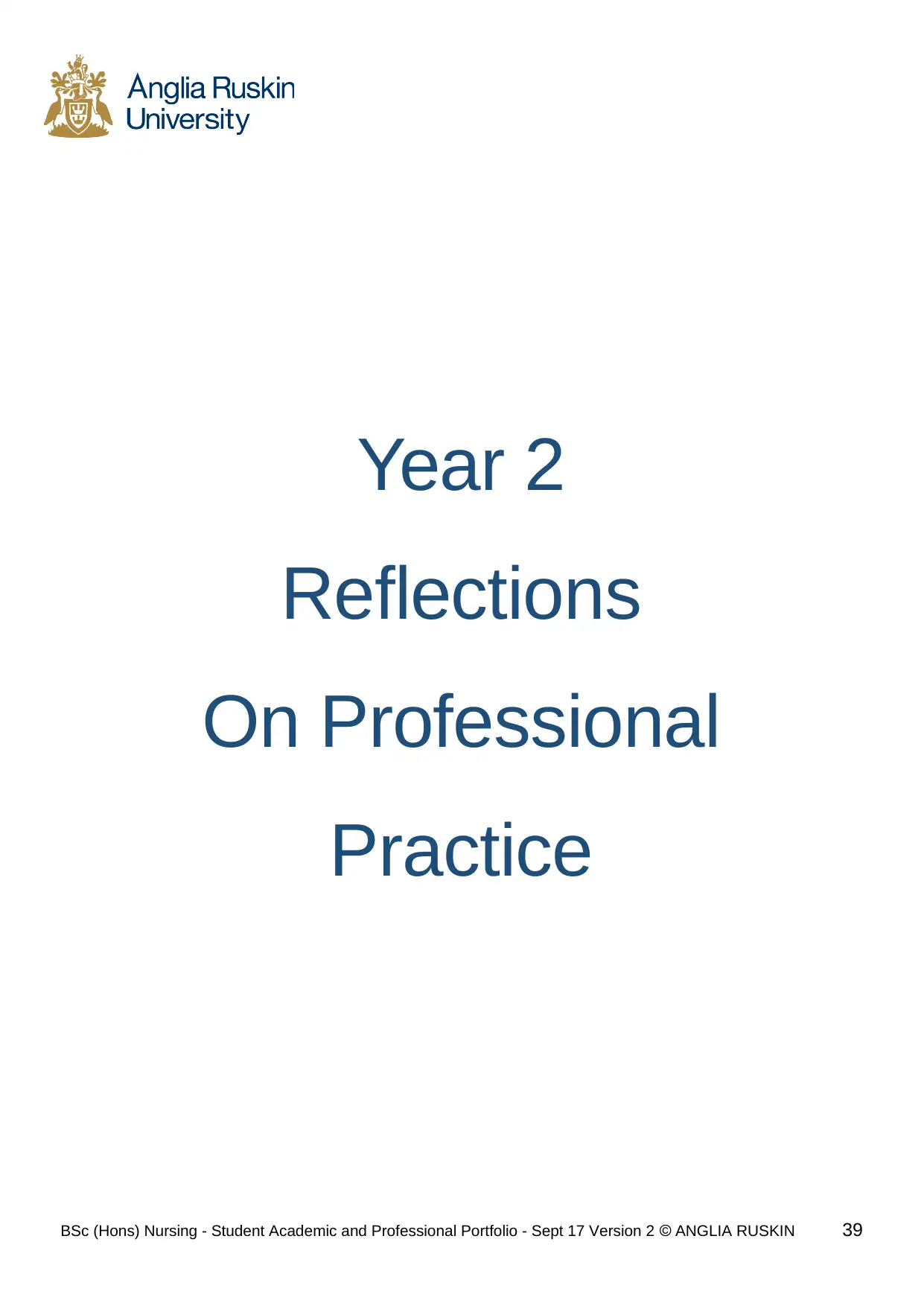
Year 2
Reflections
On Professional
Practice
BSc (Hons) Nursing - Student Academic and Professional Portfolio - Sept 17 Version 2 ANGLIA RUSKIN 39
Reflections
On Professional
Practice
BSc (Hons) Nursing - Student Academic and Professional Portfolio - Sept 17 Version 2 ANGLIA RUSKIN 39
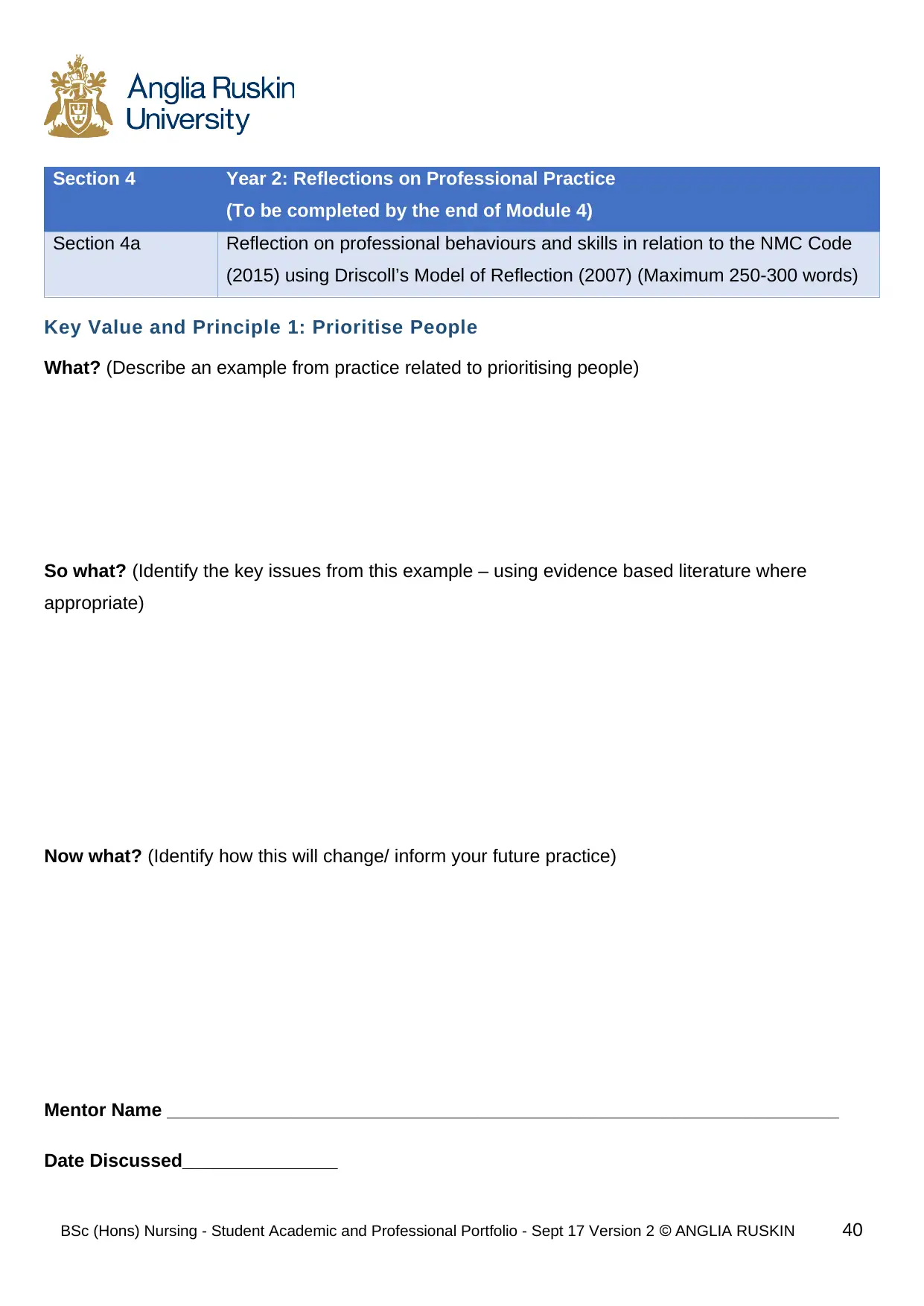
Section 4 Year 2: Reflections on Professional Practice
(To be completed by the end of Module 4)
Section 4a Reflection on professional behaviours and skills in relation to the NMC Code
(2015) using Driscoll’s Model of Reflection (2007) (Maximum 250-300 words)
Key Value and Principle 1: Prioritise People
What? (Describe an example from practice related to prioritising people)
So what? (Identify the key issues from this example – using evidence based literature where
appropriate)
Now what? (Identify how this will change/ inform your future practice)
Mentor Name _________________________________________________________________
Date Discussed_______________
BSc (Hons) Nursing - Student Academic and Professional Portfolio - Sept 17 Version 2 ANGLIA RUSKIN 40
(To be completed by the end of Module 4)
Section 4a Reflection on professional behaviours and skills in relation to the NMC Code
(2015) using Driscoll’s Model of Reflection (2007) (Maximum 250-300 words)
Key Value and Principle 1: Prioritise People
What? (Describe an example from practice related to prioritising people)
So what? (Identify the key issues from this example – using evidence based literature where
appropriate)
Now what? (Identify how this will change/ inform your future practice)
Mentor Name _________________________________________________________________
Date Discussed_______________
BSc (Hons) Nursing - Student Academic and Professional Portfolio - Sept 17 Version 2 ANGLIA RUSKIN 40
Secure Best Marks with AI Grader
Need help grading? Try our AI Grader for instant feedback on your assignments.
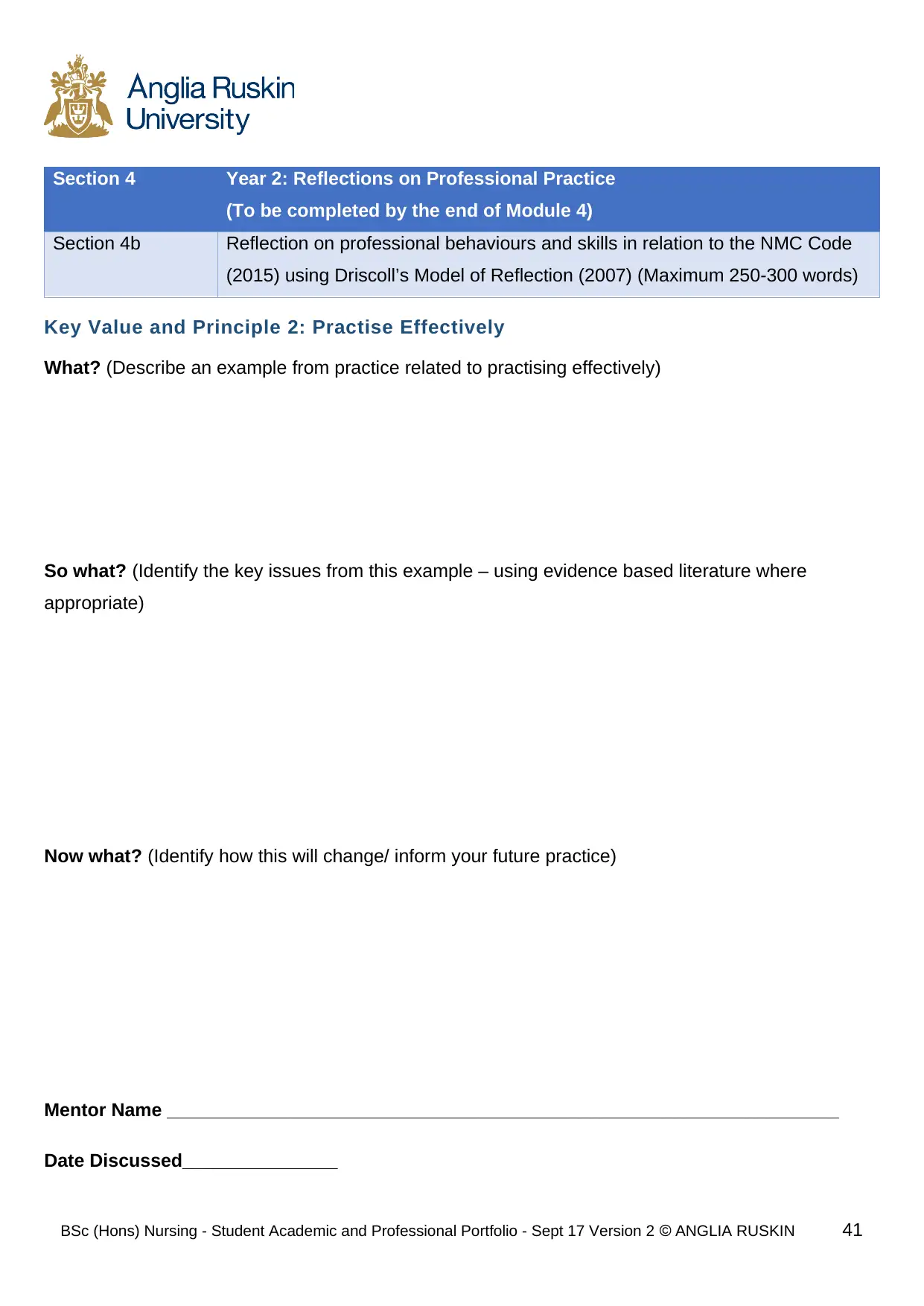
Section 4 Year 2: Reflections on Professional Practice
(To be completed by the end of Module 4)
Section 4b Reflection on professional behaviours and skills in relation to the NMC Code
(2015) using Driscoll’s Model of Reflection (2007) (Maximum 250-300 words)
Key Value and Principle 2: Practise Effectively
What? (Describe an example from practice related to practising effectively)
So what? (Identify the key issues from this example – using evidence based literature where
appropriate)
Now what? (Identify how this will change/ inform your future practice)
Mentor Name _________________________________________________________________
Date Discussed_______________
BSc (Hons) Nursing - Student Academic and Professional Portfolio - Sept 17 Version 2 ANGLIA RUSKIN 41
(To be completed by the end of Module 4)
Section 4b Reflection on professional behaviours and skills in relation to the NMC Code
(2015) using Driscoll’s Model of Reflection (2007) (Maximum 250-300 words)
Key Value and Principle 2: Practise Effectively
What? (Describe an example from practice related to practising effectively)
So what? (Identify the key issues from this example – using evidence based literature where
appropriate)
Now what? (Identify how this will change/ inform your future practice)
Mentor Name _________________________________________________________________
Date Discussed_______________
BSc (Hons) Nursing - Student Academic and Professional Portfolio - Sept 17 Version 2 ANGLIA RUSKIN 41
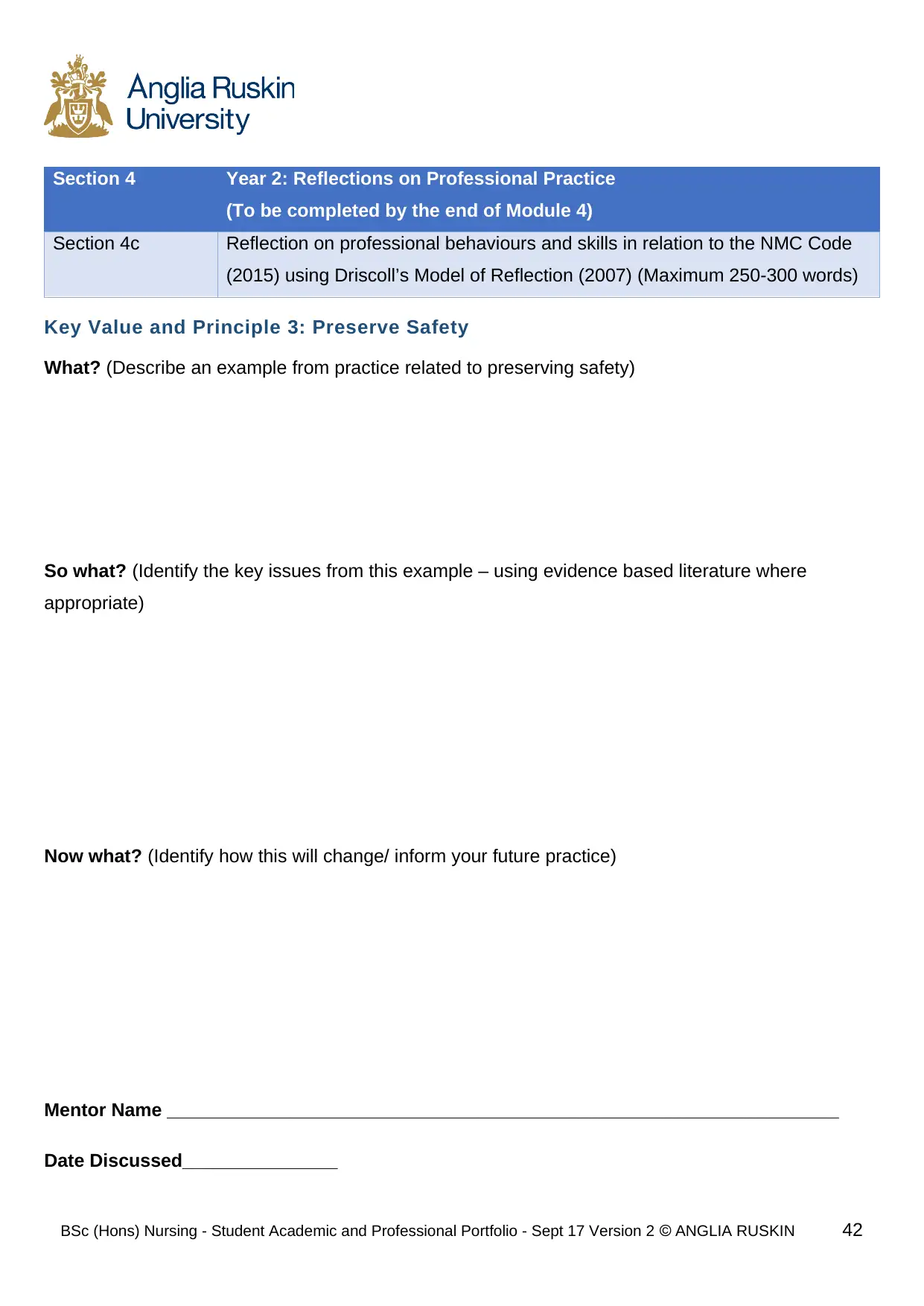
Section 4 Year 2: Reflections on Professional Practice
(To be completed by the end of Module 4)
Section 4c Reflection on professional behaviours and skills in relation to the NMC Code
(2015) using Driscoll’s Model of Reflection (2007) (Maximum 250-300 words)
Key Value and Principle 3: Preserve Safety
What? (Describe an example from practice related to preserving safety)
So what? (Identify the key issues from this example – using evidence based literature where
appropriate)
Now what? (Identify how this will change/ inform your future practice)
Mentor Name _________________________________________________________________
Date Discussed_______________
BSc (Hons) Nursing - Student Academic and Professional Portfolio - Sept 17 Version 2 ANGLIA RUSKIN 42
(To be completed by the end of Module 4)
Section 4c Reflection on professional behaviours and skills in relation to the NMC Code
(2015) using Driscoll’s Model of Reflection (2007) (Maximum 250-300 words)
Key Value and Principle 3: Preserve Safety
What? (Describe an example from practice related to preserving safety)
So what? (Identify the key issues from this example – using evidence based literature where
appropriate)
Now what? (Identify how this will change/ inform your future practice)
Mentor Name _________________________________________________________________
Date Discussed_______________
BSc (Hons) Nursing - Student Academic and Professional Portfolio - Sept 17 Version 2 ANGLIA RUSKIN 42
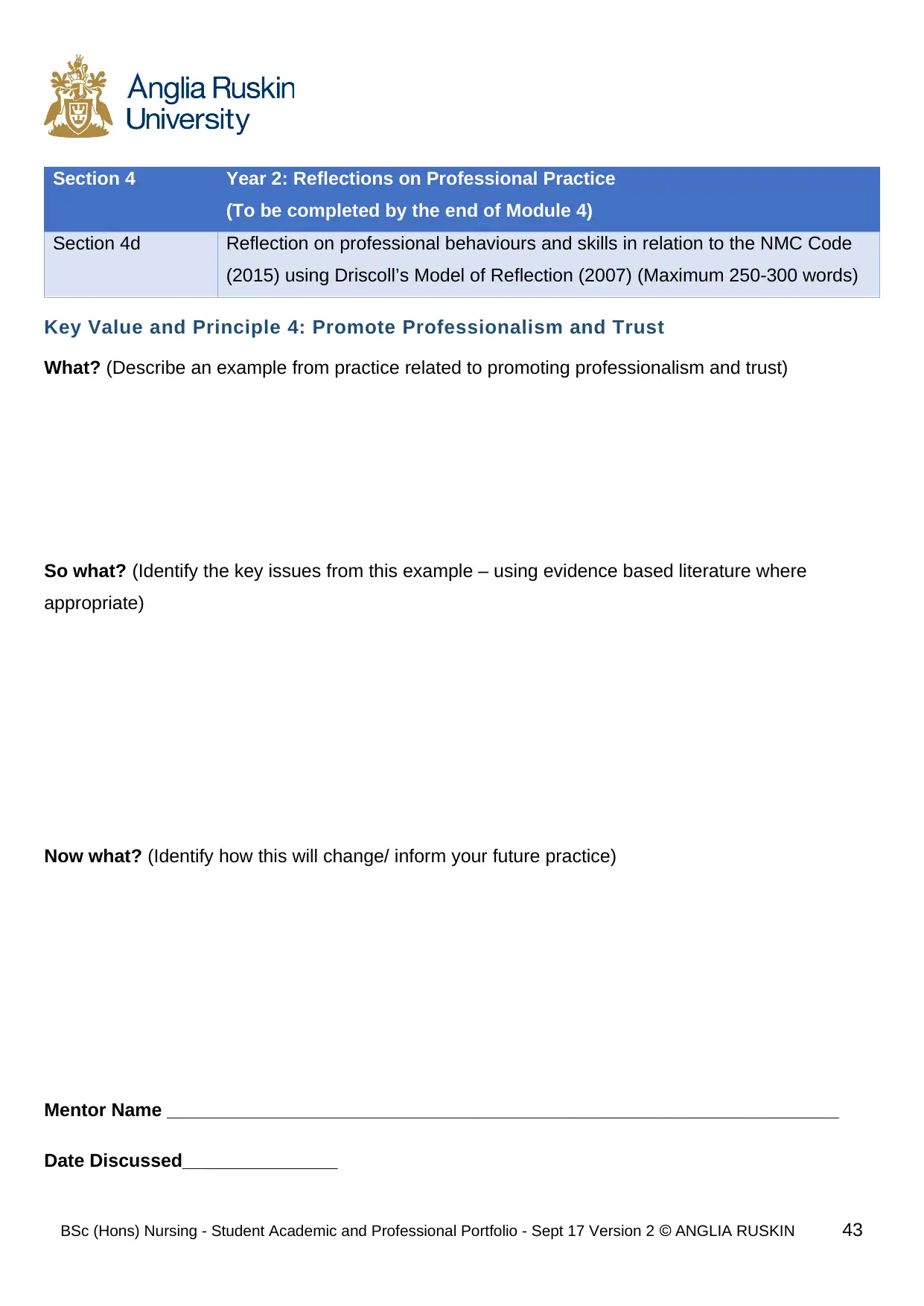
Section 4 Year 2: Reflections on Professional Practice
(To be completed by the end of Module 4)
Section 4d Reflection on professional behaviours and skills in relation to the NMC Code
(2015) using Driscoll’s Model of Reflection (2007) (Maximum 250-300 words)
Key Value and Principle 4: Promote Professionalism and Trust
What? (Describe an example from practice related to promoting professionalism and trust)
So what? (Identify the key issues from this example – using evidence based literature where
appropriate)
Now what? (Identify how this will change/ inform your future practice)
Mentor Name _________________________________________________________________
Date Discussed_______________
BSc (Hons) Nursing - Student Academic and Professional Portfolio - Sept 17 Version 2 ANGLIA RUSKIN 43
(To be completed by the end of Module 4)
Section 4d Reflection on professional behaviours and skills in relation to the NMC Code
(2015) using Driscoll’s Model of Reflection (2007) (Maximum 250-300 words)
Key Value and Principle 4: Promote Professionalism and Trust
What? (Describe an example from practice related to promoting professionalism and trust)
So what? (Identify the key issues from this example – using evidence based literature where
appropriate)
Now what? (Identify how this will change/ inform your future practice)
Mentor Name _________________________________________________________________
Date Discussed_______________
BSc (Hons) Nursing - Student Academic and Professional Portfolio - Sept 17 Version 2 ANGLIA RUSKIN 43
Paraphrase This Document
Need a fresh take? Get an instant paraphrase of this document with our AI Paraphraser
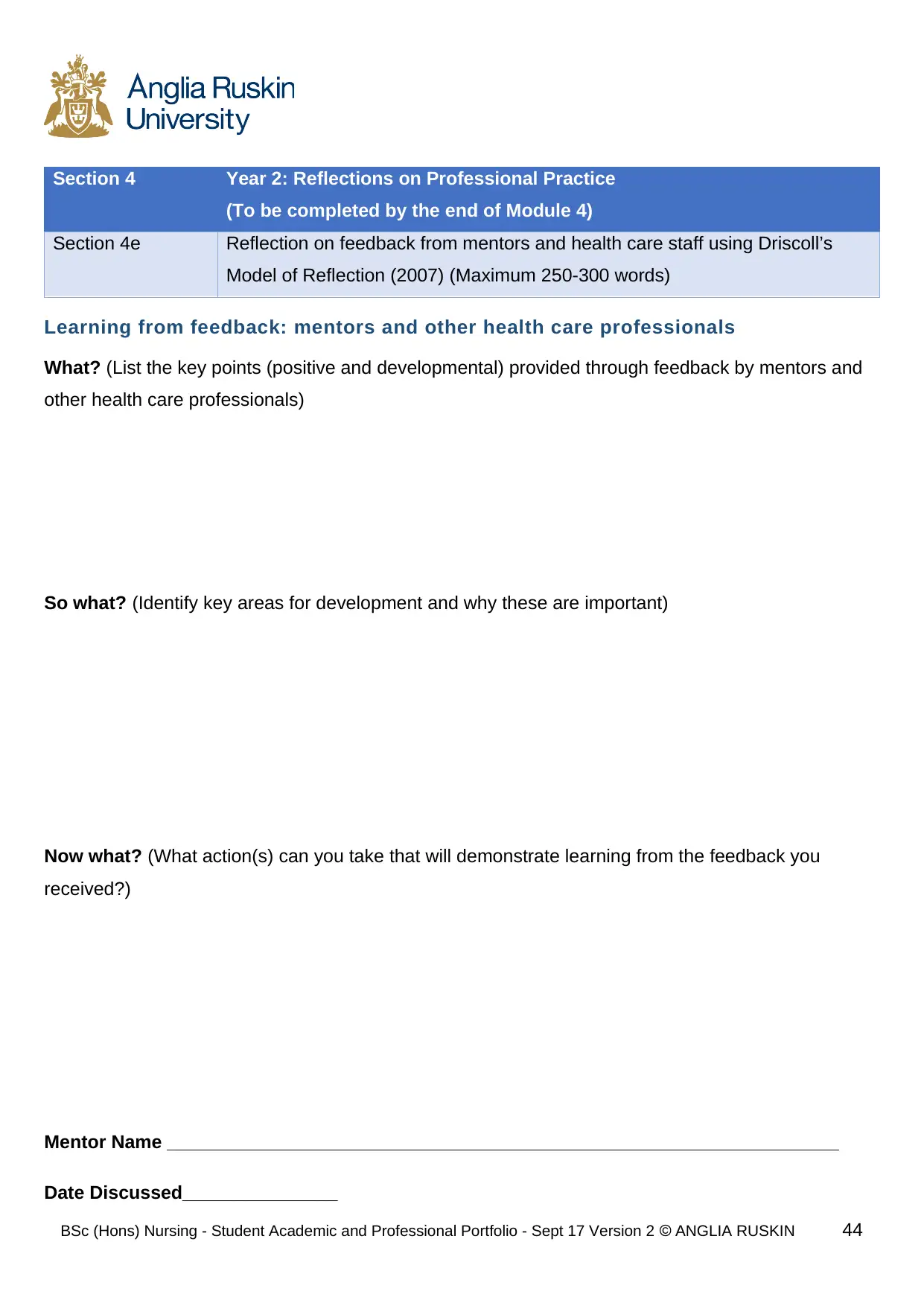
Section 4 Year 2: Reflections on Professional Practice
(To be completed by the end of Module 4)
Section 4e Reflection on feedback from mentors and health care staff using Driscoll’s
Model of Reflection (2007) (Maximum 250-300 words)
Learning from feedback: mentors and other health care professionals
What? (List the key points (positive and developmental) provided through feedback by mentors and
other health care professionals)
So what? (Identify key areas for development and why these are important)
Now what? (What action(s) can you take that will demonstrate learning from the feedback you
received?)
Mentor Name _________________________________________________________________
Date Discussed_______________
BSc (Hons) Nursing - Student Academic and Professional Portfolio - Sept 17 Version 2 ANGLIA RUSKIN 44
(To be completed by the end of Module 4)
Section 4e Reflection on feedback from mentors and health care staff using Driscoll’s
Model of Reflection (2007) (Maximum 250-300 words)
Learning from feedback: mentors and other health care professionals
What? (List the key points (positive and developmental) provided through feedback by mentors and
other health care professionals)
So what? (Identify key areas for development and why these are important)
Now what? (What action(s) can you take that will demonstrate learning from the feedback you
received?)
Mentor Name _________________________________________________________________
Date Discussed_______________
BSc (Hons) Nursing - Student Academic and Professional Portfolio - Sept 17 Version 2 ANGLIA RUSKIN 44
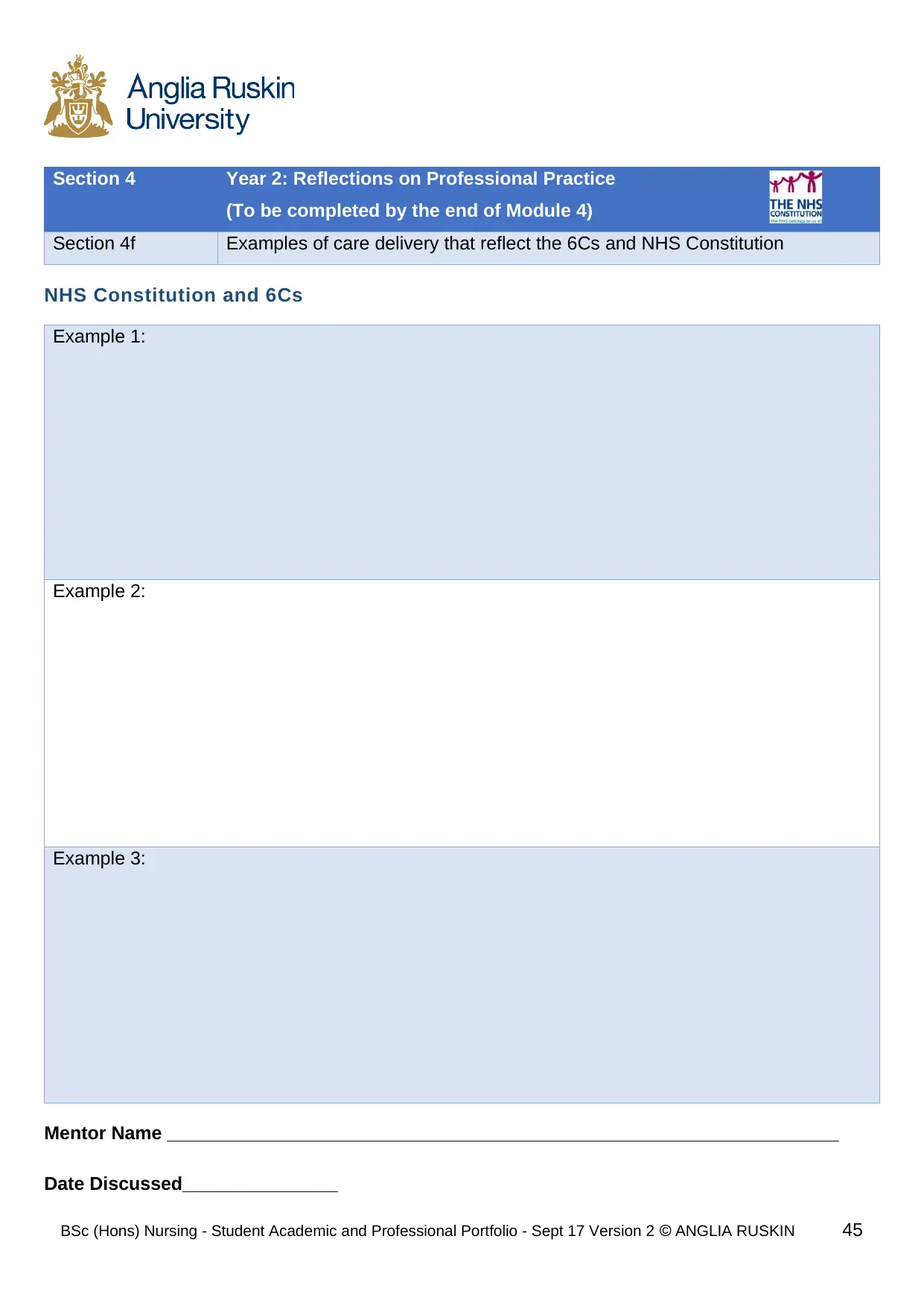
Section 4 Year 2: Reflections on Professional Practice
(To be completed by the end of Module 4)
Section 4f Examples of care delivery that reflect the 6Cs and NHS Constitution
NHS Constitution and 6Cs
Example 1:
Example 2:
Example 3:
Mentor Name _________________________________________________________________
Date Discussed_______________
BSc (Hons) Nursing - Student Academic and Professional Portfolio - Sept 17 Version 2 ANGLIA RUSKIN 45
(To be completed by the end of Module 4)
Section 4f Examples of care delivery that reflect the 6Cs and NHS Constitution
NHS Constitution and 6Cs
Example 1:
Example 2:
Example 3:
Mentor Name _________________________________________________________________
Date Discussed_______________
BSc (Hons) Nursing - Student Academic and Professional Portfolio - Sept 17 Version 2 ANGLIA RUSKIN 45
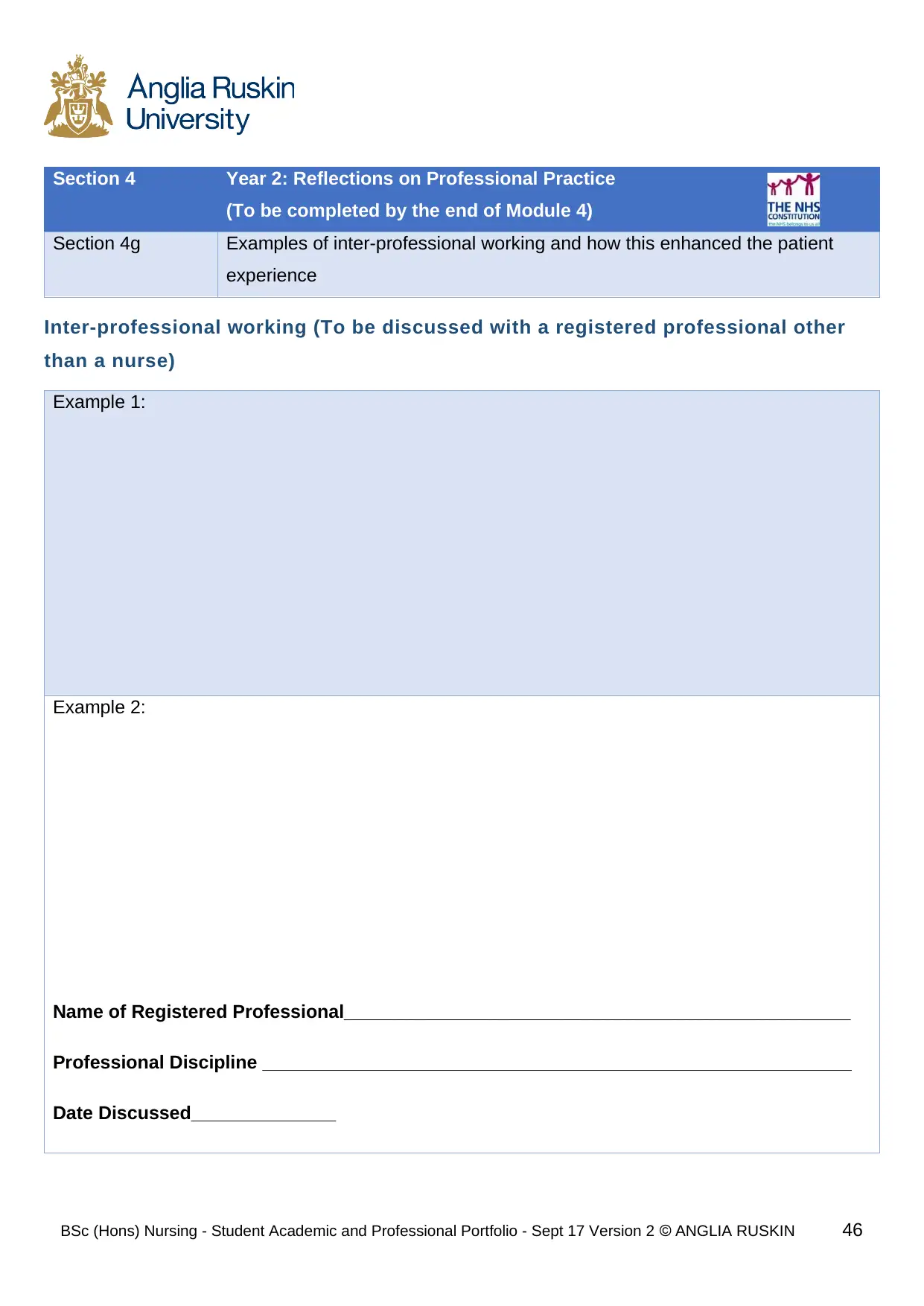
Section 4 Year 2: Reflections on Professional Practice
(To be completed by the end of Module 4)
Section 4g Examples of inter-professional working and how this enhanced the patient
experience
Inter-professional working (To be discussed with a registered professional other
than a nurse)
Example 1:
Example 2:
Name of Registered Professional_________________________________________________
Professional Discipline _________________________________________________________
Date Discussed______________
BSc (Hons) Nursing - Student Academic and Professional Portfolio - Sept 17 Version 2 ANGLIA RUSKIN 46
(To be completed by the end of Module 4)
Section 4g Examples of inter-professional working and how this enhanced the patient
experience
Inter-professional working (To be discussed with a registered professional other
than a nurse)
Example 1:
Example 2:
Name of Registered Professional_________________________________________________
Professional Discipline _________________________________________________________
Date Discussed______________
BSc (Hons) Nursing - Student Academic and Professional Portfolio - Sept 17 Version 2 ANGLIA RUSKIN 46
Secure Best Marks with AI Grader
Need help grading? Try our AI Grader for instant feedback on your assignments.
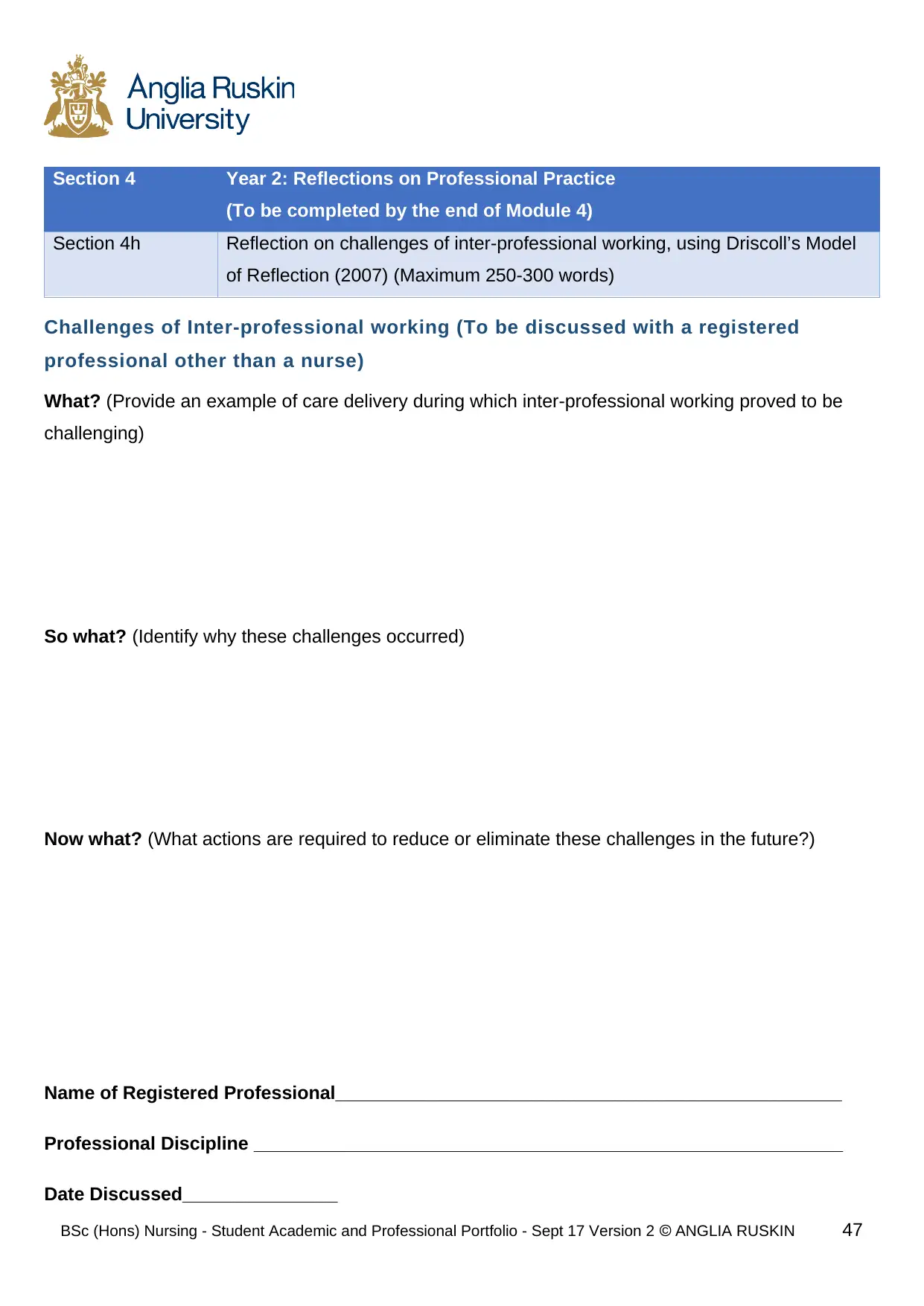
Section 4 Year 2: Reflections on Professional Practice
(To be completed by the end of Module 4)
Section 4h Reflection on challenges of inter-professional working, using Driscoll’s Model
of Reflection (2007) (Maximum 250-300 words)
Challenges of Inter-professional working (To be discussed with a registered
professional other than a nurse)
What? (Provide an example of care delivery during which inter-professional working proved to be
challenging)
So what? (Identify why these challenges occurred)
Now what? (What actions are required to reduce or eliminate these challenges in the future?)
Name of Registered Professional_________________________________________________
Professional Discipline _________________________________________________________
Date Discussed_______________
BSc (Hons) Nursing - Student Academic and Professional Portfolio - Sept 17 Version 2 ANGLIA RUSKIN 47
(To be completed by the end of Module 4)
Section 4h Reflection on challenges of inter-professional working, using Driscoll’s Model
of Reflection (2007) (Maximum 250-300 words)
Challenges of Inter-professional working (To be discussed with a registered
professional other than a nurse)
What? (Provide an example of care delivery during which inter-professional working proved to be
challenging)
So what? (Identify why these challenges occurred)
Now what? (What actions are required to reduce or eliminate these challenges in the future?)
Name of Registered Professional_________________________________________________
Professional Discipline _________________________________________________________
Date Discussed_______________
BSc (Hons) Nursing - Student Academic and Professional Portfolio - Sept 17 Version 2 ANGLIA RUSKIN 47
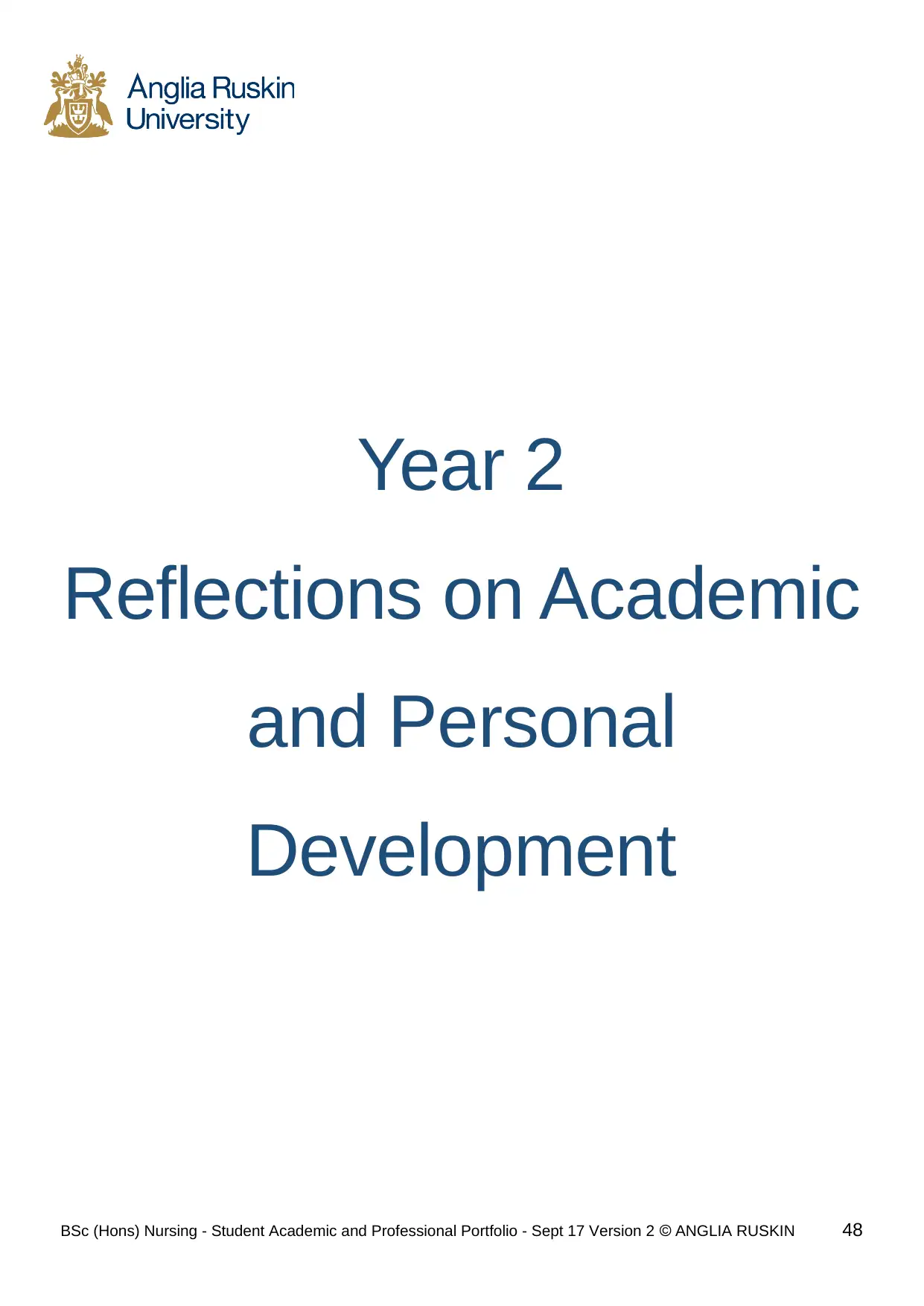
Year 2
Reflections on Academic
and Personal
Development
BSc (Hons) Nursing - Student Academic and Professional Portfolio - Sept 17 Version 2 ANGLIA RUSKIN 48
Reflections on Academic
and Personal
Development
BSc (Hons) Nursing - Student Academic and Professional Portfolio - Sept 17 Version 2 ANGLIA RUSKIN 48
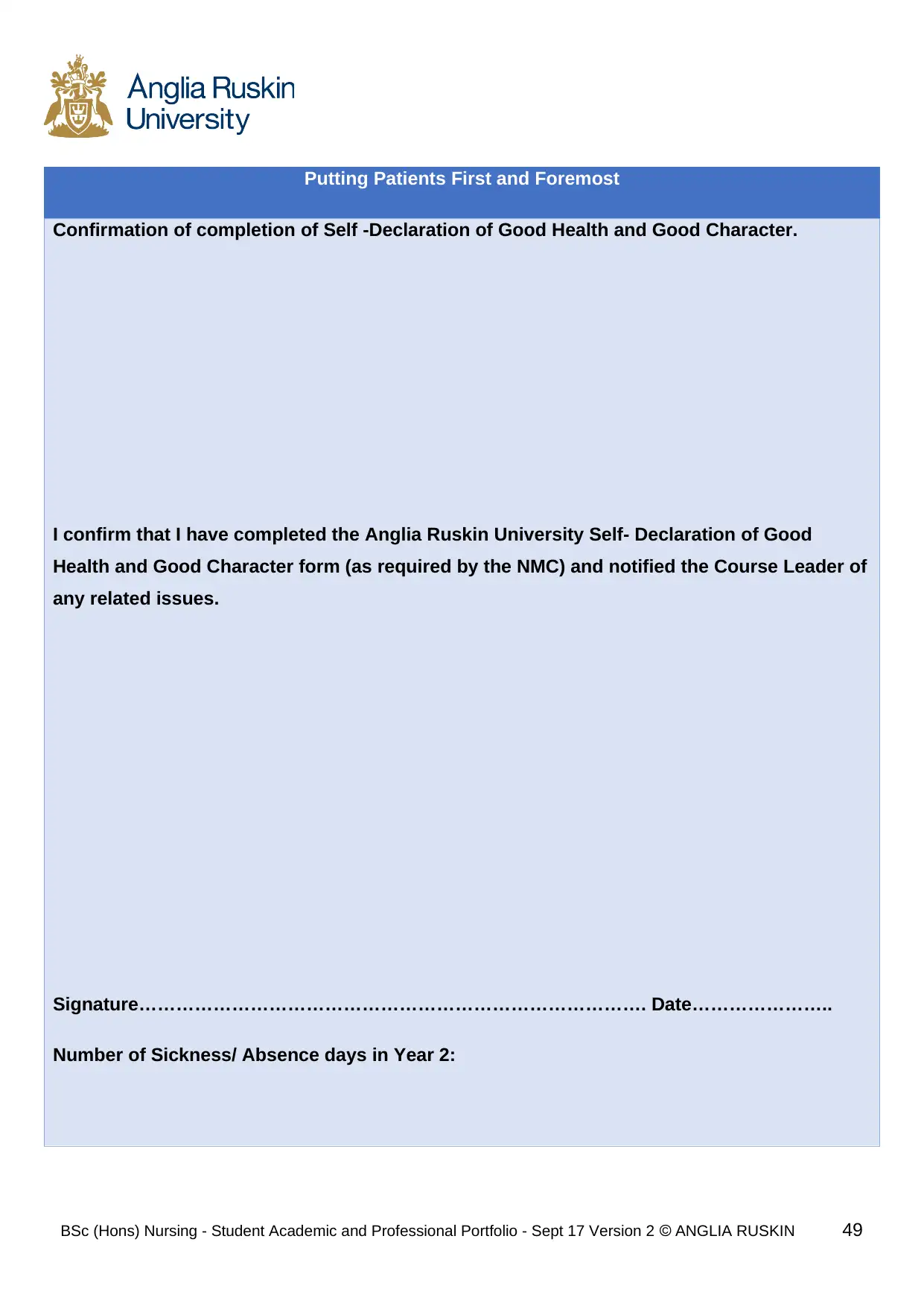
Putting Patients First and Foremost
Confirmation of completion of Self -Declaration of Good Health and Good Character.
I confirm that I have completed the Anglia Ruskin University Self- Declaration of Good
Health and Good Character form (as required by the NMC) and notified the Course Leader of
any related issues.
Signature………………………………………………………………………. Date…………………..
Number of Sickness/ Absence days in Year 2:
BSc (Hons) Nursing - Student Academic and Professional Portfolio - Sept 17 Version 2 ANGLIA RUSKIN 49
Confirmation of completion of Self -Declaration of Good Health and Good Character.
I confirm that I have completed the Anglia Ruskin University Self- Declaration of Good
Health and Good Character form (as required by the NMC) and notified the Course Leader of
any related issues.
Signature………………………………………………………………………. Date…………………..
Number of Sickness/ Absence days in Year 2:
BSc (Hons) Nursing - Student Academic and Professional Portfolio - Sept 17 Version 2 ANGLIA RUSKIN 49
Paraphrase This Document
Need a fresh take? Get an instant paraphrase of this document with our AI Paraphraser
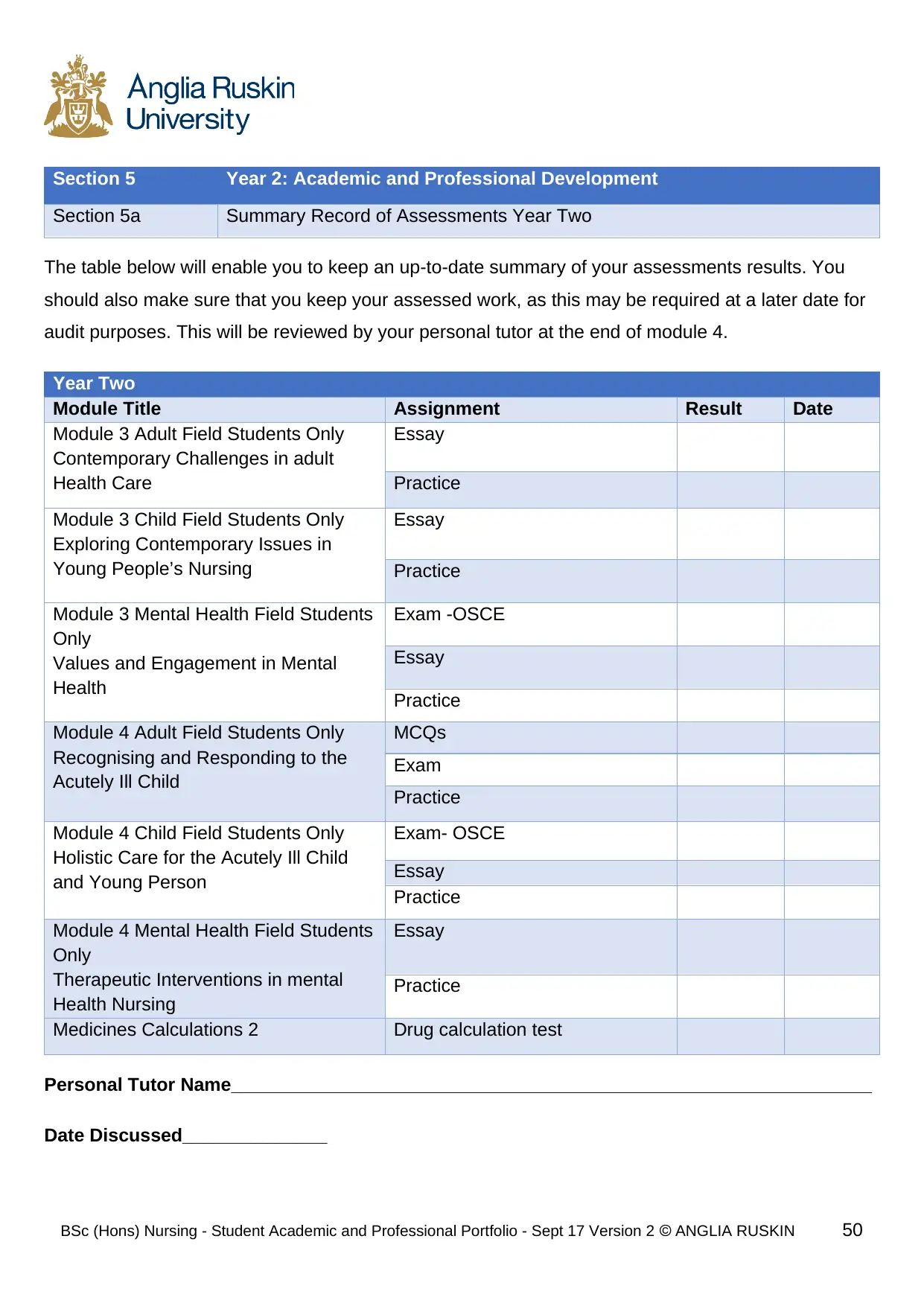
Section 5 Year 2: Academic and Professional Development
Section 5a Summary Record of Assessments Year Two
The table below will enable you to keep an up-to-date summary of your assessments results. You
should also make sure that you keep your assessed work, as this may be required at a later date for
audit purposes. This will be reviewed by your personal tutor at the end of module 4.
Year Two
Module Title Assignment Result Date
Module 3 Adult Field Students Only
Contemporary Challenges in adult
Health Care
Essay
Practice
Module 3 Child Field Students Only
Exploring Contemporary Issues in
Young People’s Nursing
Essay
Practice
Module 3 Mental Health Field Students
Only
Values and Engagement in Mental
Health
Exam -OSCE
Essay
Practice
Module 4 Adult Field Students Only
Recognising and Responding to the
Acutely Ill Child
MCQs
Exam
Practice
Module 4 Child Field Students Only
Holistic Care for the Acutely Ill Child
and Young Person
Exam- OSCE
Essay
Practice
Module 4 Mental Health Field Students
Only
Therapeutic Interventions in mental
Health Nursing
Essay
Practice
Medicines Calculations 2 Drug calculation test
Personal Tutor Name______________________________________________________________
Date Discussed______________
BSc (Hons) Nursing - Student Academic and Professional Portfolio - Sept 17 Version 2 ANGLIA RUSKIN 50
Section 5a Summary Record of Assessments Year Two
The table below will enable you to keep an up-to-date summary of your assessments results. You
should also make sure that you keep your assessed work, as this may be required at a later date for
audit purposes. This will be reviewed by your personal tutor at the end of module 4.
Year Two
Module Title Assignment Result Date
Module 3 Adult Field Students Only
Contemporary Challenges in adult
Health Care
Essay
Practice
Module 3 Child Field Students Only
Exploring Contemporary Issues in
Young People’s Nursing
Essay
Practice
Module 3 Mental Health Field Students
Only
Values and Engagement in Mental
Health
Exam -OSCE
Essay
Practice
Module 4 Adult Field Students Only
Recognising and Responding to the
Acutely Ill Child
MCQs
Exam
Practice
Module 4 Child Field Students Only
Holistic Care for the Acutely Ill Child
and Young Person
Exam- OSCE
Essay
Practice
Module 4 Mental Health Field Students
Only
Therapeutic Interventions in mental
Health Nursing
Essay
Practice
Medicines Calculations 2 Drug calculation test
Personal Tutor Name______________________________________________________________
Date Discussed______________
BSc (Hons) Nursing - Student Academic and Professional Portfolio - Sept 17 Version 2 ANGLIA RUSKIN 50
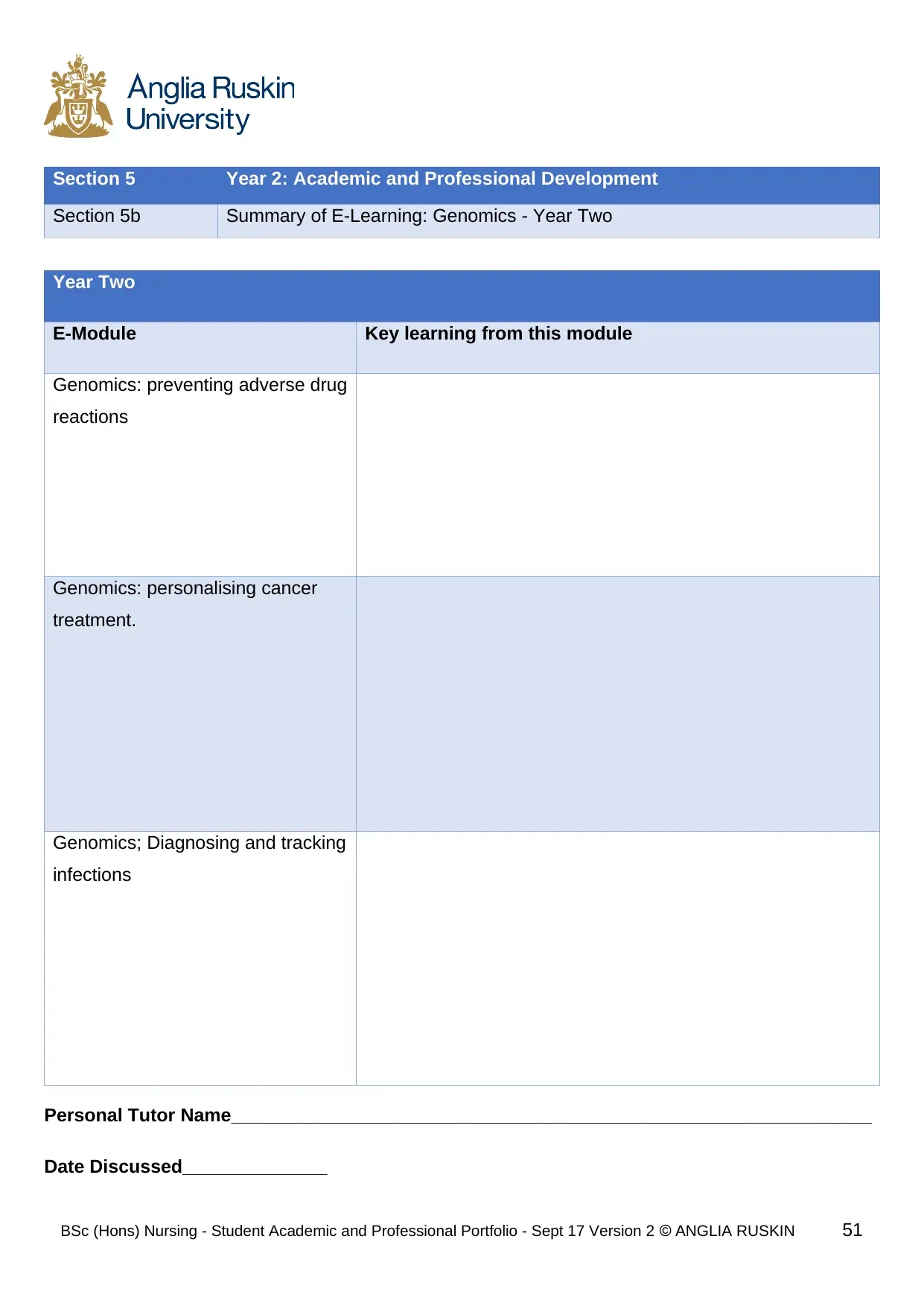
Section 5 Year 2: Academic and Professional Development
Section 5b Summary of E-Learning: Genomics - Year Two
Year Two
E-Module Key learning from this module
Genomics: preventing adverse drug
reactions
Genomics: personalising cancer
treatment.
Genomics; Diagnosing and tracking
infections
Personal Tutor Name______________________________________________________________
Date Discussed______________
BSc (Hons) Nursing - Student Academic and Professional Portfolio - Sept 17 Version 2 ANGLIA RUSKIN 51
Section 5b Summary of E-Learning: Genomics - Year Two
Year Two
E-Module Key learning from this module
Genomics: preventing adverse drug
reactions
Genomics: personalising cancer
treatment.
Genomics; Diagnosing and tracking
infections
Personal Tutor Name______________________________________________________________
Date Discussed______________
BSc (Hons) Nursing - Student Academic and Professional Portfolio - Sept 17 Version 2 ANGLIA RUSKIN 51
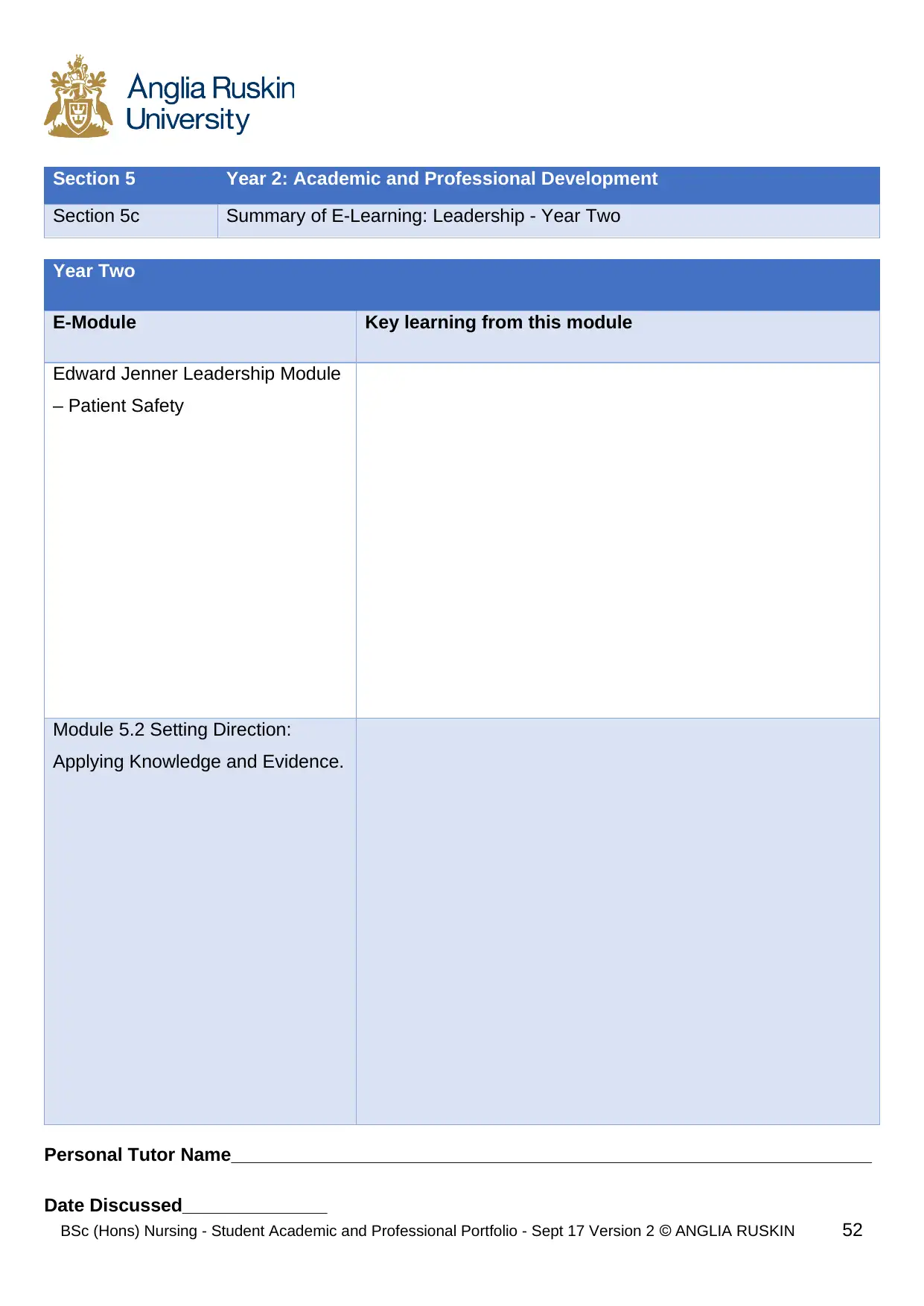
Section 5 Year 2: Academic and Professional Development
Section 5c Summary of E-Learning: Leadership - Year Two
Year Two
E-Module Key learning from this module
Edward Jenner Leadership Module
– Patient Safety
Module 5.2 Setting Direction:
Applying Knowledge and Evidence.
Personal Tutor Name______________________________________________________________
Date Discussed______________
BSc (Hons) Nursing - Student Academic and Professional Portfolio - Sept 17 Version 2 ANGLIA RUSKIN 52
Section 5c Summary of E-Learning: Leadership - Year Two
Year Two
E-Module Key learning from this module
Edward Jenner Leadership Module
– Patient Safety
Module 5.2 Setting Direction:
Applying Knowledge and Evidence.
Personal Tutor Name______________________________________________________________
Date Discussed______________
BSc (Hons) Nursing - Student Academic and Professional Portfolio - Sept 17 Version 2 ANGLIA RUSKIN 52
Secure Best Marks with AI Grader
Need help grading? Try our AI Grader for instant feedback on your assignments.
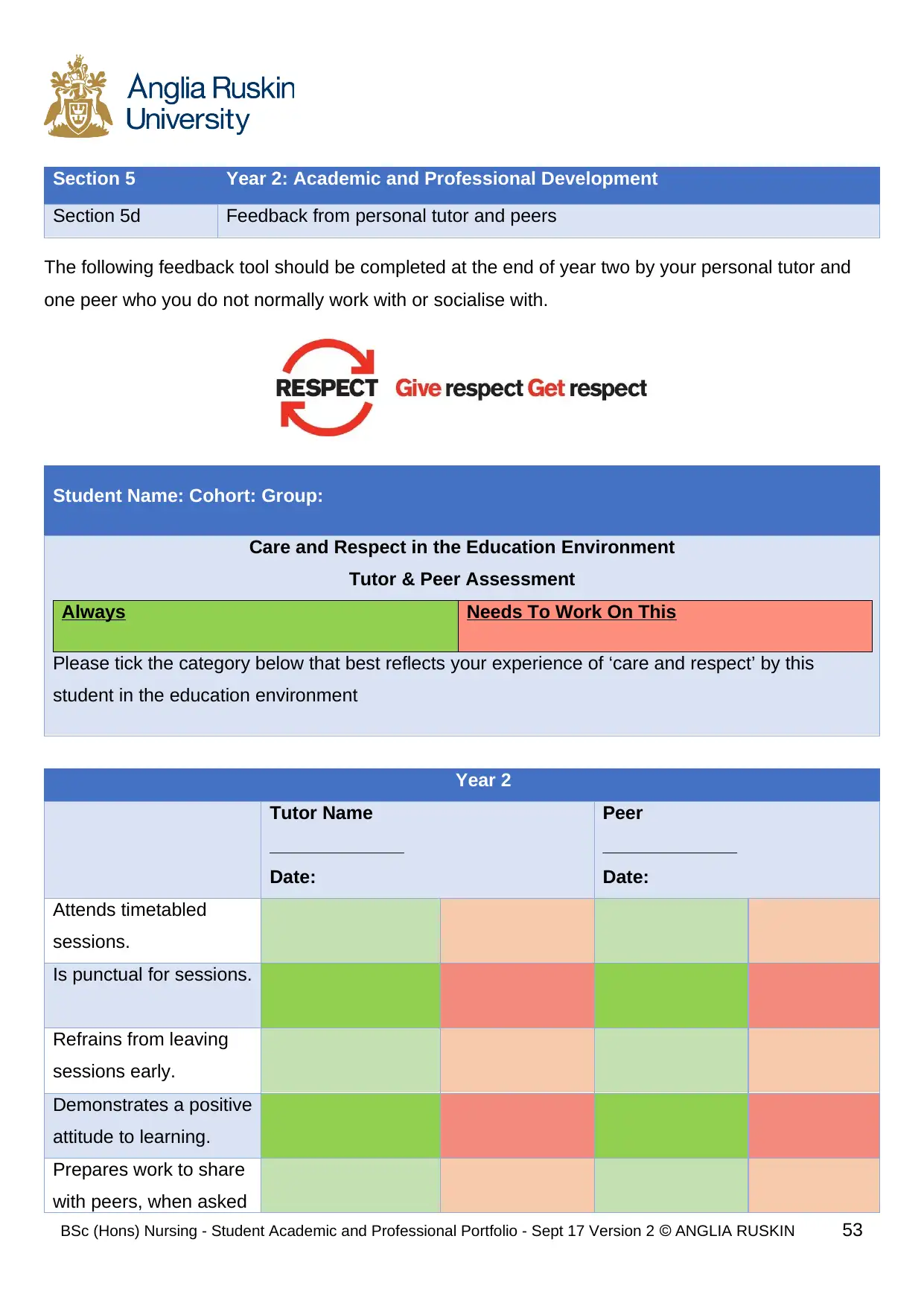
Section 5 Year 2: Academic and Professional Development
Section 5d Feedback from personal tutor and peers
The following feedback tool should be completed at the end of year two by your personal tutor and
one peer who you do not normally work with or socialise with.
Student Name: Cohort: Group:
Care and Respect in the Education Environment
Tutor & Peer Assessment
Always Needs To Work On This
Please tick the category below that best reflects your experience of ‘care and respect’ by this
student in the education environment
Year 2
Tutor Name
_____________
Date:
Peer
_____________
Date:
Attends timetabled
sessions.
Is punctual for sessions.
Refrains from leaving
sessions early.
Demonstrates a positive
attitude to learning.
Prepares work to share
with peers, when asked
BSc (Hons) Nursing - Student Academic and Professional Portfolio - Sept 17 Version 2 ANGLIA RUSKIN 53
Section 5d Feedback from personal tutor and peers
The following feedback tool should be completed at the end of year two by your personal tutor and
one peer who you do not normally work with or socialise with.
Student Name: Cohort: Group:
Care and Respect in the Education Environment
Tutor & Peer Assessment
Always Needs To Work On This
Please tick the category below that best reflects your experience of ‘care and respect’ by this
student in the education environment
Year 2
Tutor Name
_____________
Date:
Peer
_____________
Date:
Attends timetabled
sessions.
Is punctual for sessions.
Refrains from leaving
sessions early.
Demonstrates a positive
attitude to learning.
Prepares work to share
with peers, when asked
BSc (Hons) Nursing - Student Academic and Professional Portfolio - Sept 17 Version 2 ANGLIA RUSKIN 53
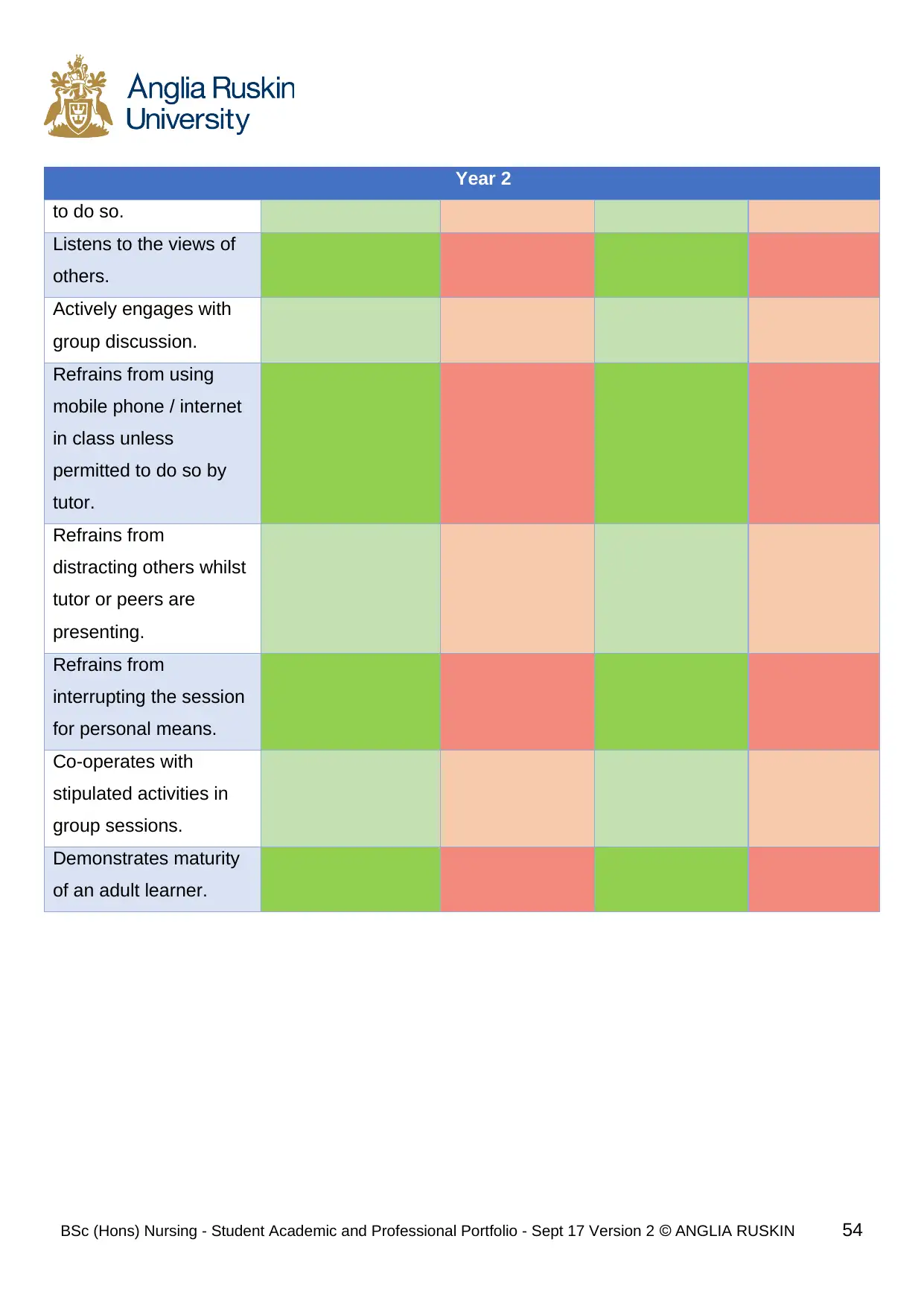
Year 2
to do so.
Listens to the views of
others.
Actively engages with
group discussion.
Refrains from using
mobile phone / internet
in class unless
permitted to do so by
tutor.
Refrains from
distracting others whilst
tutor or peers are
presenting.
Refrains from
interrupting the session
for personal means.
Co-operates with
stipulated activities in
group sessions.
Demonstrates maturity
of an adult learner.
BSc (Hons) Nursing - Student Academic and Professional Portfolio - Sept 17 Version 2 ANGLIA RUSKIN 54
to do so.
Listens to the views of
others.
Actively engages with
group discussion.
Refrains from using
mobile phone / internet
in class unless
permitted to do so by
tutor.
Refrains from
distracting others whilst
tutor or peers are
presenting.
Refrains from
interrupting the session
for personal means.
Co-operates with
stipulated activities in
group sessions.
Demonstrates maturity
of an adult learner.
BSc (Hons) Nursing - Student Academic and Professional Portfolio - Sept 17 Version 2 ANGLIA RUSKIN 54
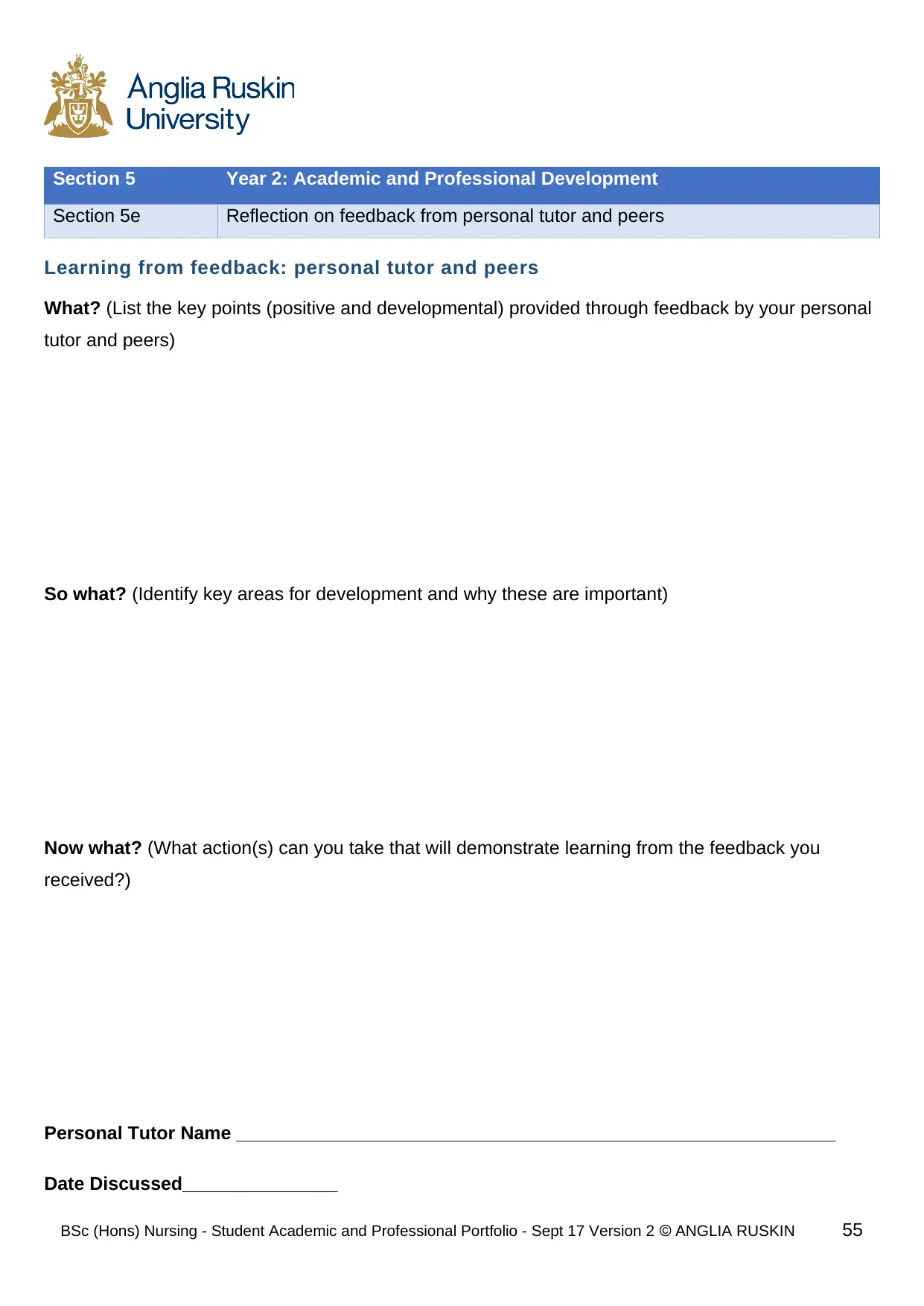
Section 5 Year 2: Academic and Professional Development
Section 5e Reflection on feedback from personal tutor and peers
Learning from feedback: personal tutor and peers
What? (List the key points (positive and developmental) provided through feedback by your personal
tutor and peers)
So what? (Identify key areas for development and why these are important)
Now what? (What action(s) can you take that will demonstrate learning from the feedback you
received?)
Personal Tutor Name __________________________________________________________
Date Discussed_______________
BSc (Hons) Nursing - Student Academic and Professional Portfolio - Sept 17 Version 2 ANGLIA RUSKIN 55
Section 5e Reflection on feedback from personal tutor and peers
Learning from feedback: personal tutor and peers
What? (List the key points (positive and developmental) provided through feedback by your personal
tutor and peers)
So what? (Identify key areas for development and why these are important)
Now what? (What action(s) can you take that will demonstrate learning from the feedback you
received?)
Personal Tutor Name __________________________________________________________
Date Discussed_______________
BSc (Hons) Nursing - Student Academic and Professional Portfolio - Sept 17 Version 2 ANGLIA RUSKIN 55
Paraphrase This Document
Need a fresh take? Get an instant paraphrase of this document with our AI Paraphraser
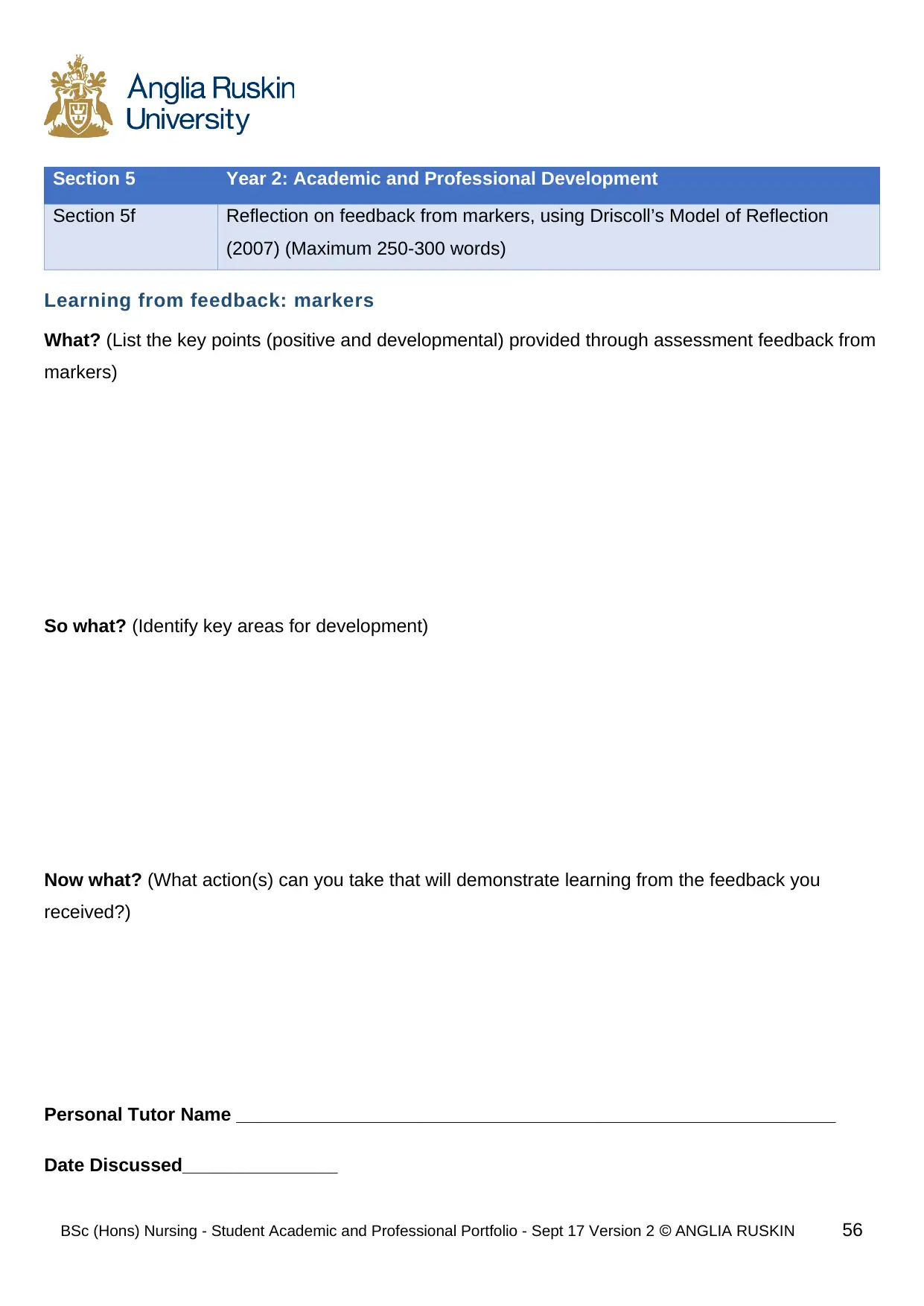
Section 5 Year 2: Academic and Professional Development
Section 5f Reflection on feedback from markers, using Driscoll’s Model of Reflection
(2007) (Maximum 250-300 words)
Learning from feedback: markers
What? (List the key points (positive and developmental) provided through assessment feedback from
markers)
So what? (Identify key areas for development)
Now what? (What action(s) can you take that will demonstrate learning from the feedback you
received?)
Personal Tutor Name __________________________________________________________
Date Discussed_______________
BSc (Hons) Nursing - Student Academic and Professional Portfolio - Sept 17 Version 2 ANGLIA RUSKIN 56
Section 5f Reflection on feedback from markers, using Driscoll’s Model of Reflection
(2007) (Maximum 250-300 words)
Learning from feedback: markers
What? (List the key points (positive and developmental) provided through assessment feedback from
markers)
So what? (Identify key areas for development)
Now what? (What action(s) can you take that will demonstrate learning from the feedback you
received?)
Personal Tutor Name __________________________________________________________
Date Discussed_______________
BSc (Hons) Nursing - Student Academic and Professional Portfolio - Sept 17 Version 2 ANGLIA RUSKIN 56
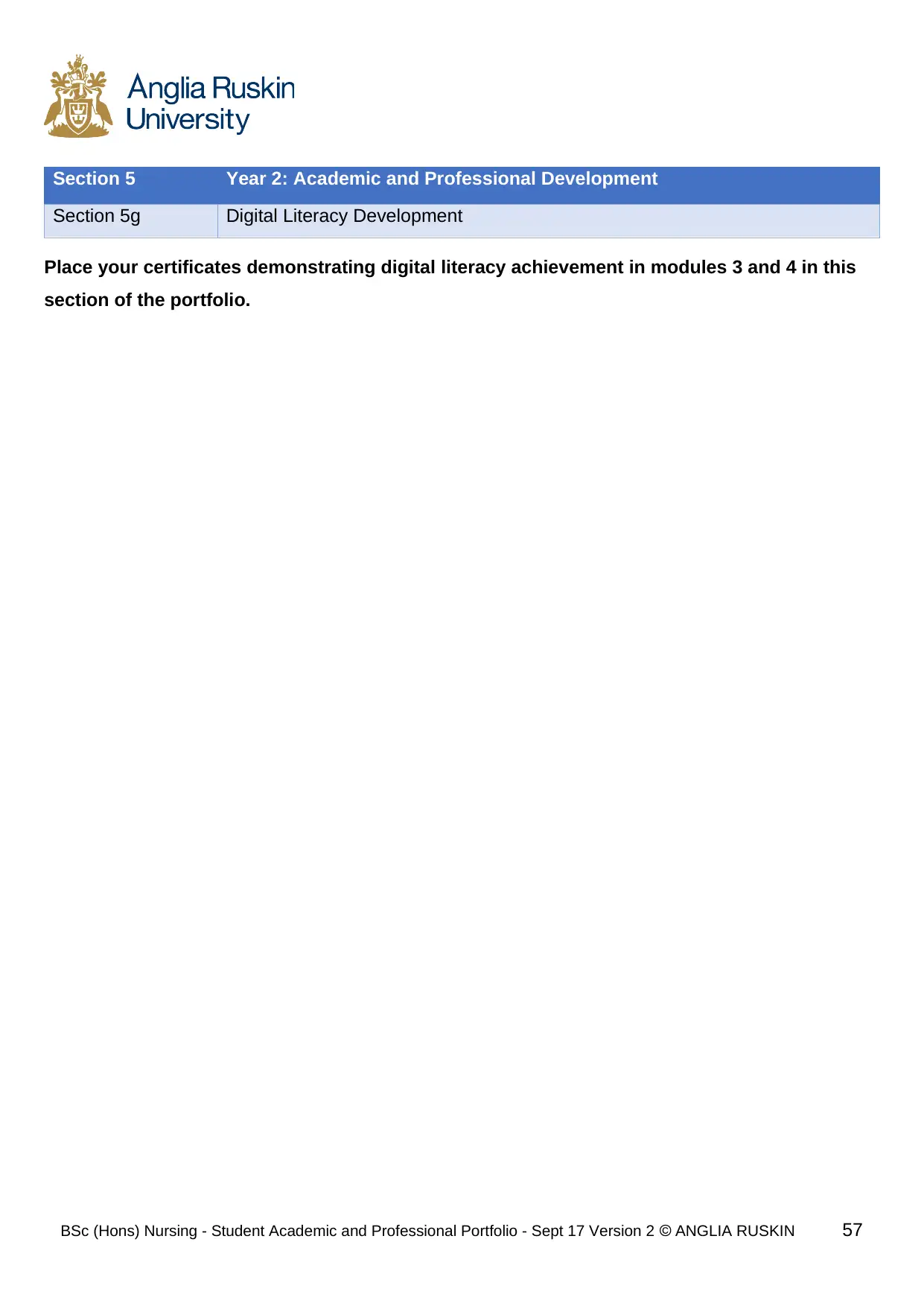
Section 5 Year 2: Academic and Professional Development
Section 5g Digital Literacy Development
Place your certificates demonstrating digital literacy achievement in modules 3 and 4 in this
section of the portfolio.
BSc (Hons) Nursing - Student Academic and Professional Portfolio - Sept 17 Version 2 ANGLIA RUSKIN 57
Section 5g Digital Literacy Development
Place your certificates demonstrating digital literacy achievement in modules 3 and 4 in this
section of the portfolio.
BSc (Hons) Nursing - Student Academic and Professional Portfolio - Sept 17 Version 2 ANGLIA RUSKIN 57
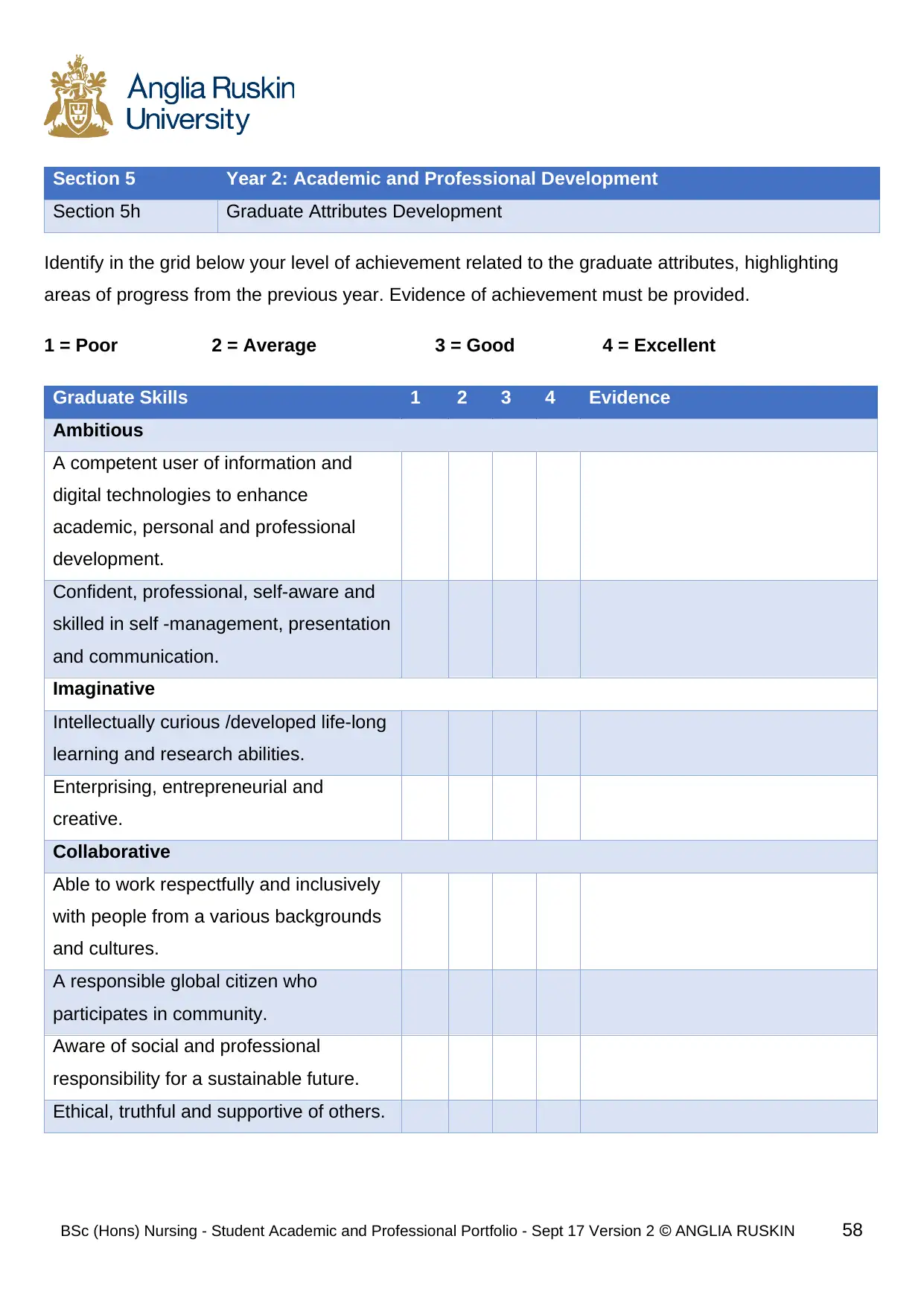
Section 5 Year 2: Academic and Professional Development
Section 5h Graduate Attributes Development
Identify in the grid below your level of achievement related to the graduate attributes, highlighting
areas of progress from the previous year. Evidence of achievement must be provided.
1 = Poor 2 = Average 3 = Good 4 = Excellent
Graduate Skills 1 2 3 4 Evidence
Ambitious
A competent user of information and
digital technologies to enhance
academic, personal and professional
development.
Confident, professional, self-aware and
skilled in self -management, presentation
and communication.
Imaginative
Intellectually curious /developed life-long
learning and research abilities.
Enterprising, entrepreneurial and
creative.
Collaborative
Able to work respectfully and inclusively
with people from a various backgrounds
and cultures.
A responsible global citizen who
participates in community.
Aware of social and professional
responsibility for a sustainable future.
Ethical, truthful and supportive of others.
BSc (Hons) Nursing - Student Academic and Professional Portfolio - Sept 17 Version 2 ANGLIA RUSKIN 58
Section 5h Graduate Attributes Development
Identify in the grid below your level of achievement related to the graduate attributes, highlighting
areas of progress from the previous year. Evidence of achievement must be provided.
1 = Poor 2 = Average 3 = Good 4 = Excellent
Graduate Skills 1 2 3 4 Evidence
Ambitious
A competent user of information and
digital technologies to enhance
academic, personal and professional
development.
Confident, professional, self-aware and
skilled in self -management, presentation
and communication.
Imaginative
Intellectually curious /developed life-long
learning and research abilities.
Enterprising, entrepreneurial and
creative.
Collaborative
Able to work respectfully and inclusively
with people from a various backgrounds
and cultures.
A responsible global citizen who
participates in community.
Aware of social and professional
responsibility for a sustainable future.
Ethical, truthful and supportive of others.
BSc (Hons) Nursing - Student Academic and Professional Portfolio - Sept 17 Version 2 ANGLIA RUSKIN 58
Secure Best Marks with AI Grader
Need help grading? Try our AI Grader for instant feedback on your assignments.
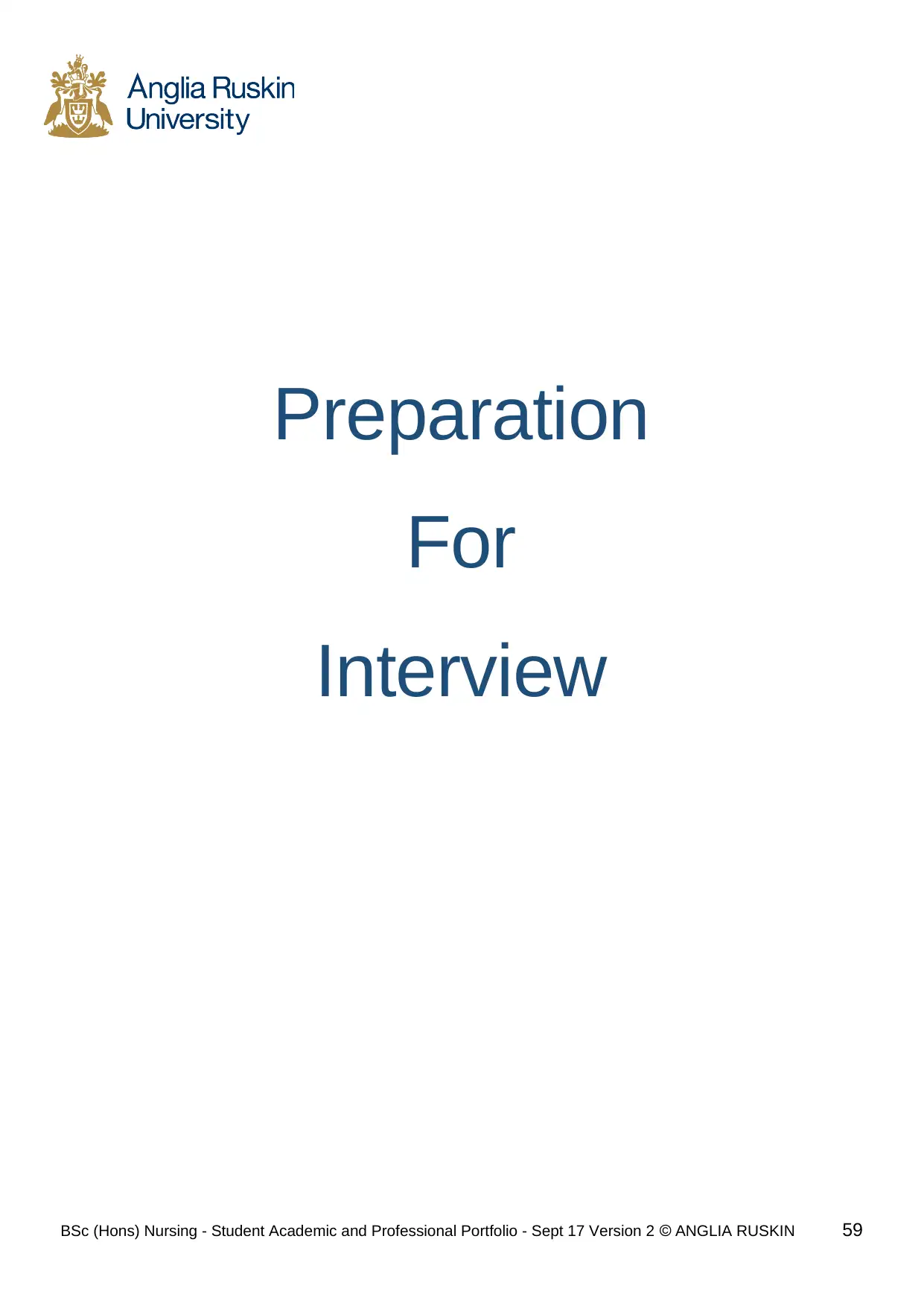
Preparation
For
Interview
BSc (Hons) Nursing - Student Academic and Professional Portfolio - Sept 17 Version 2 ANGLIA RUSKIN 59
For
Interview
BSc (Hons) Nursing - Student Academic and Professional Portfolio - Sept 17 Version 2 ANGLIA RUSKIN 59
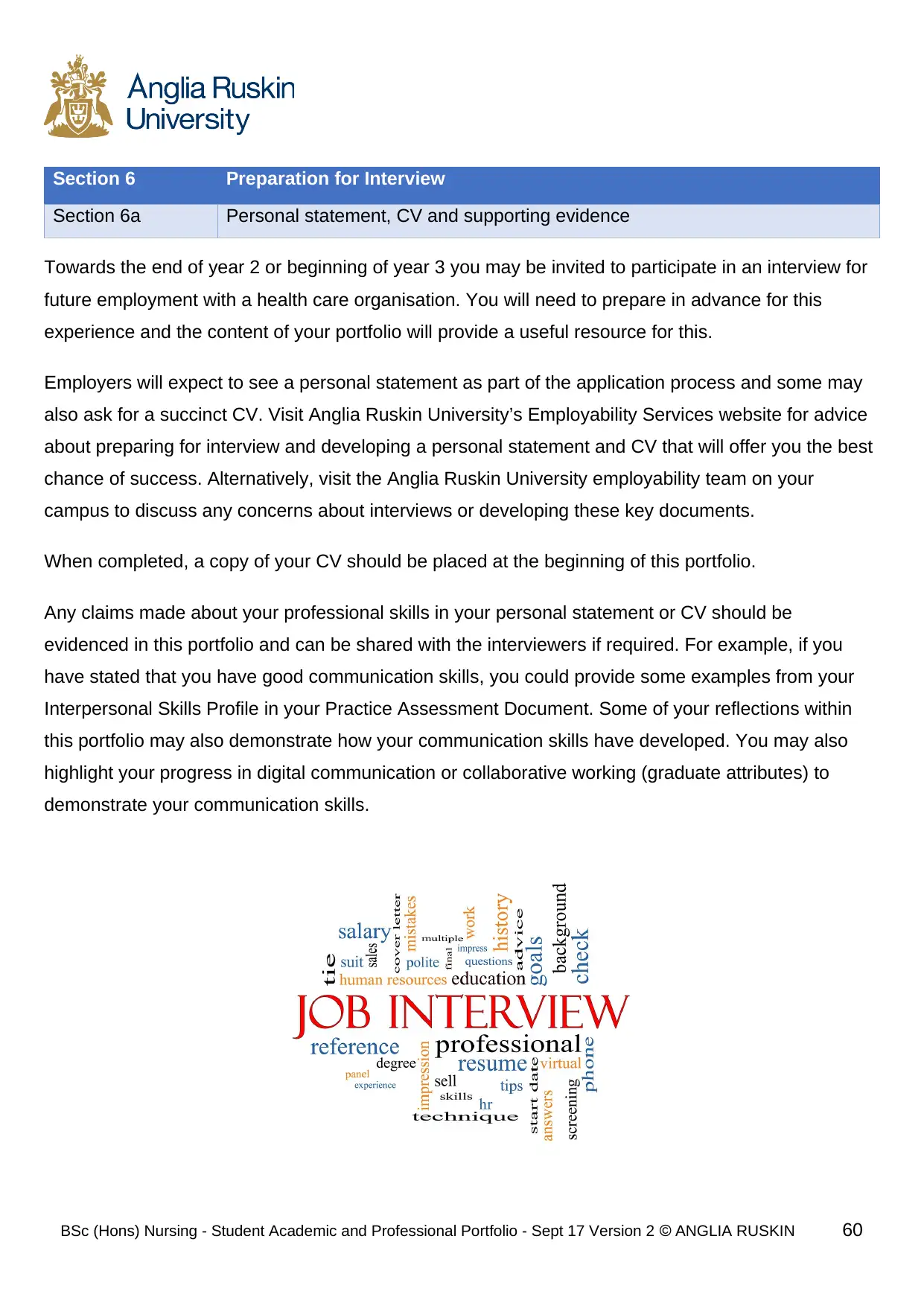
Section 6 Preparation for Interview
Section 6a Personal statement, CV and supporting evidence
Towards the end of year 2 or beginning of year 3 you may be invited to participate in an interview for
future employment with a health care organisation. You will need to prepare in advance for this
experience and the content of your portfolio will provide a useful resource for this.
Employers will expect to see a personal statement as part of the application process and some may
also ask for a succinct CV. Visit Anglia Ruskin University’s Employability Services website for advice
about preparing for interview and developing a personal statement and CV that will offer you the best
chance of success. Alternatively, visit the Anglia Ruskin University employability team on your
campus to discuss any concerns about interviews or developing these key documents.
When completed, a copy of your CV should be placed at the beginning of this portfolio.
Any claims made about your professional skills in your personal statement or CV should be
evidenced in this portfolio and can be shared with the interviewers if required. For example, if you
have stated that you have good communication skills, you could provide some examples from your
Interpersonal Skills Profile in your Practice Assessment Document. Some of your reflections within
this portfolio may also demonstrate how your communication skills have developed. You may also
highlight your progress in digital communication or collaborative working (graduate attributes) to
demonstrate your communication skills.
BSc (Hons) Nursing - Student Academic and Professional Portfolio - Sept 17 Version 2 ANGLIA RUSKIN 60
Section 6a Personal statement, CV and supporting evidence
Towards the end of year 2 or beginning of year 3 you may be invited to participate in an interview for
future employment with a health care organisation. You will need to prepare in advance for this
experience and the content of your portfolio will provide a useful resource for this.
Employers will expect to see a personal statement as part of the application process and some may
also ask for a succinct CV. Visit Anglia Ruskin University’s Employability Services website for advice
about preparing for interview and developing a personal statement and CV that will offer you the best
chance of success. Alternatively, visit the Anglia Ruskin University employability team on your
campus to discuss any concerns about interviews or developing these key documents.
When completed, a copy of your CV should be placed at the beginning of this portfolio.
Any claims made about your professional skills in your personal statement or CV should be
evidenced in this portfolio and can be shared with the interviewers if required. For example, if you
have stated that you have good communication skills, you could provide some examples from your
Interpersonal Skills Profile in your Practice Assessment Document. Some of your reflections within
this portfolio may also demonstrate how your communication skills have developed. You may also
highlight your progress in digital communication or collaborative working (graduate attributes) to
demonstrate your communication skills.
BSc (Hons) Nursing - Student Academic and Professional Portfolio - Sept 17 Version 2 ANGLIA RUSKIN 60
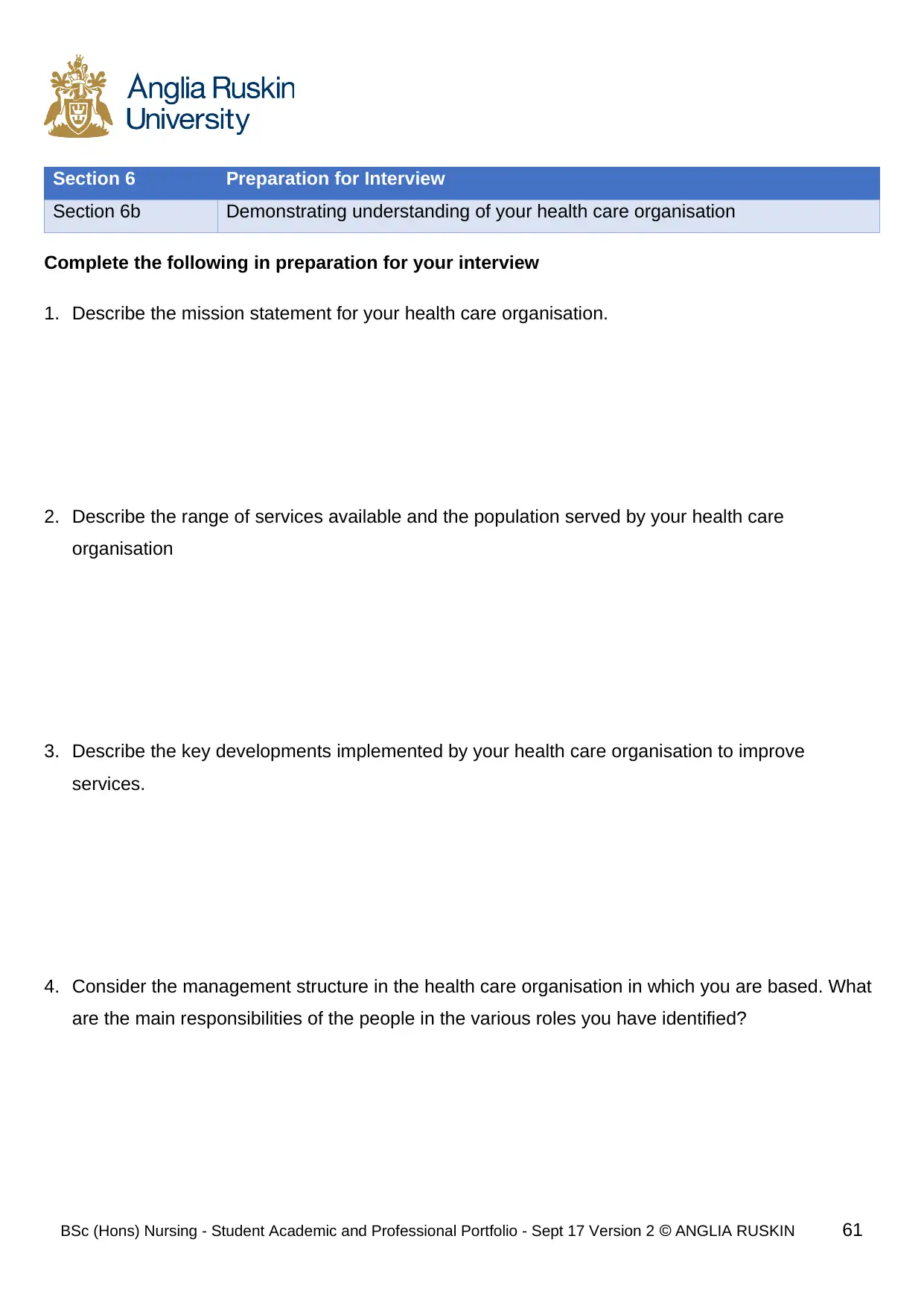
Section 6 Preparation for Interview
Section 6b Demonstrating understanding of your health care organisation
Complete the following in preparation for your interview
1. Describe the mission statement for your health care organisation.
2. Describe the range of services available and the population served by your health care
organisation
3. Describe the key developments implemented by your health care organisation to improve
services.
4. Consider the management structure in the health care organisation in which you are based. What
are the main responsibilities of the people in the various roles you have identified?
BSc (Hons) Nursing - Student Academic and Professional Portfolio - Sept 17 Version 2 ANGLIA RUSKIN 61
Section 6b Demonstrating understanding of your health care organisation
Complete the following in preparation for your interview
1. Describe the mission statement for your health care organisation.
2. Describe the range of services available and the population served by your health care
organisation
3. Describe the key developments implemented by your health care organisation to improve
services.
4. Consider the management structure in the health care organisation in which you are based. What
are the main responsibilities of the people in the various roles you have identified?
BSc (Hons) Nursing - Student Academic and Professional Portfolio - Sept 17 Version 2 ANGLIA RUSKIN 61
Paraphrase This Document
Need a fresh take? Get an instant paraphrase of this document with our AI Paraphraser
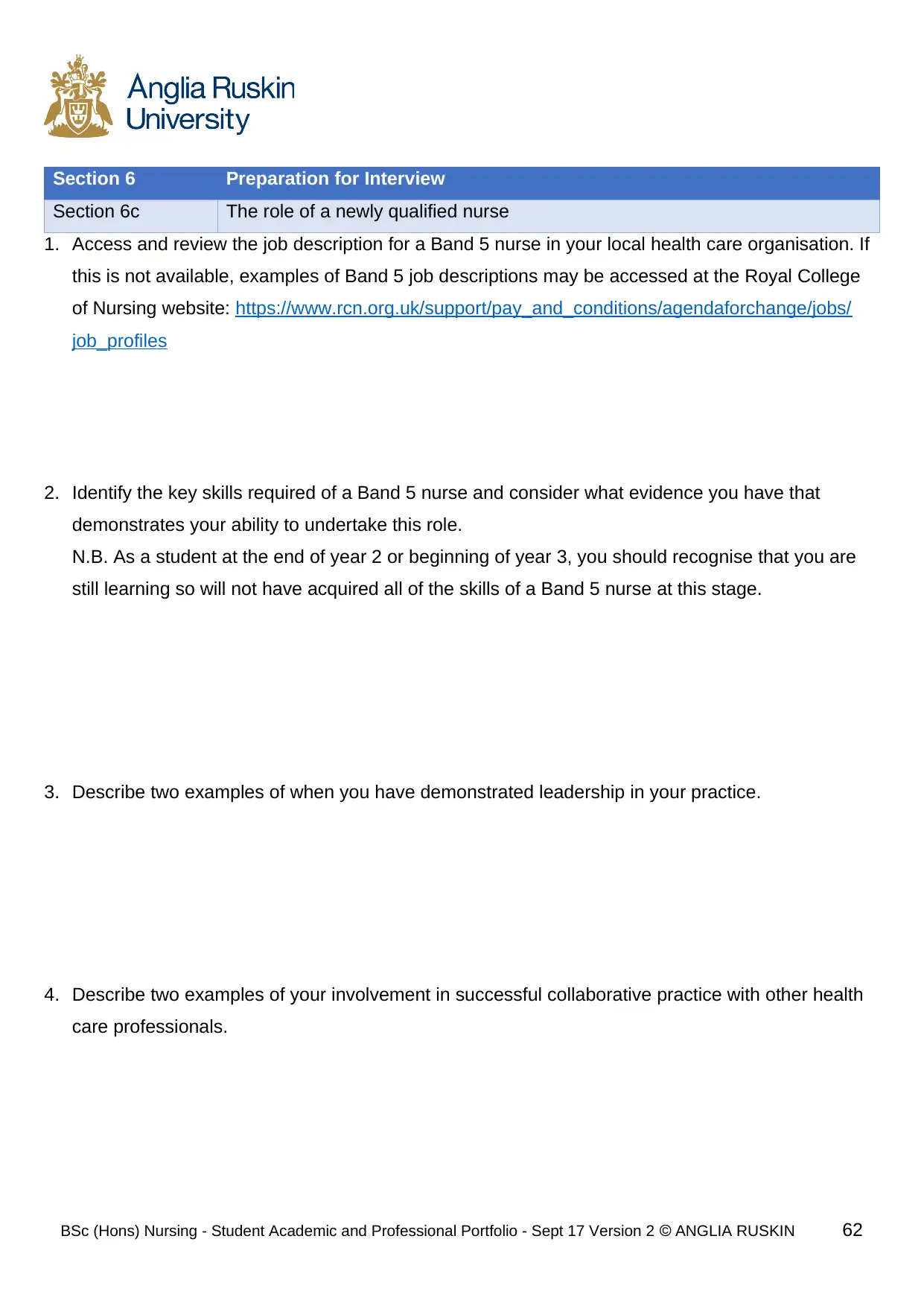
Section 6 Preparation for Interview
Section 6c The role of a newly qualified nurse
1. Access and review the job description for a Band 5 nurse in your local health care organisation. If
this is not available, examples of Band 5 job descriptions may be accessed at the Royal College
of Nursing website: https://www.rcn.org.uk/support/pay_and_conditions/agendaforchange/jobs/
job_profiles
2. Identify the key skills required of a Band 5 nurse and consider what evidence you have that
demonstrates your ability to undertake this role.
N.B. As a student at the end of year 2 or beginning of year 3, you should recognise that you are
still learning so will not have acquired all of the skills of a Band 5 nurse at this stage.
3. Describe two examples of when you have demonstrated leadership in your practice.
4. Describe two examples of your involvement in successful collaborative practice with other health
care professionals.
BSc (Hons) Nursing - Student Academic and Professional Portfolio - Sept 17 Version 2 ANGLIA RUSKIN 62
Section 6c The role of a newly qualified nurse
1. Access and review the job description for a Band 5 nurse in your local health care organisation. If
this is not available, examples of Band 5 job descriptions may be accessed at the Royal College
of Nursing website: https://www.rcn.org.uk/support/pay_and_conditions/agendaforchange/jobs/
job_profiles
2. Identify the key skills required of a Band 5 nurse and consider what evidence you have that
demonstrates your ability to undertake this role.
N.B. As a student at the end of year 2 or beginning of year 3, you should recognise that you are
still learning so will not have acquired all of the skills of a Band 5 nurse at this stage.
3. Describe two examples of when you have demonstrated leadership in your practice.
4. Describe two examples of your involvement in successful collaborative practice with other health
care professionals.
BSc (Hons) Nursing - Student Academic and Professional Portfolio - Sept 17 Version 2 ANGLIA RUSKIN 62
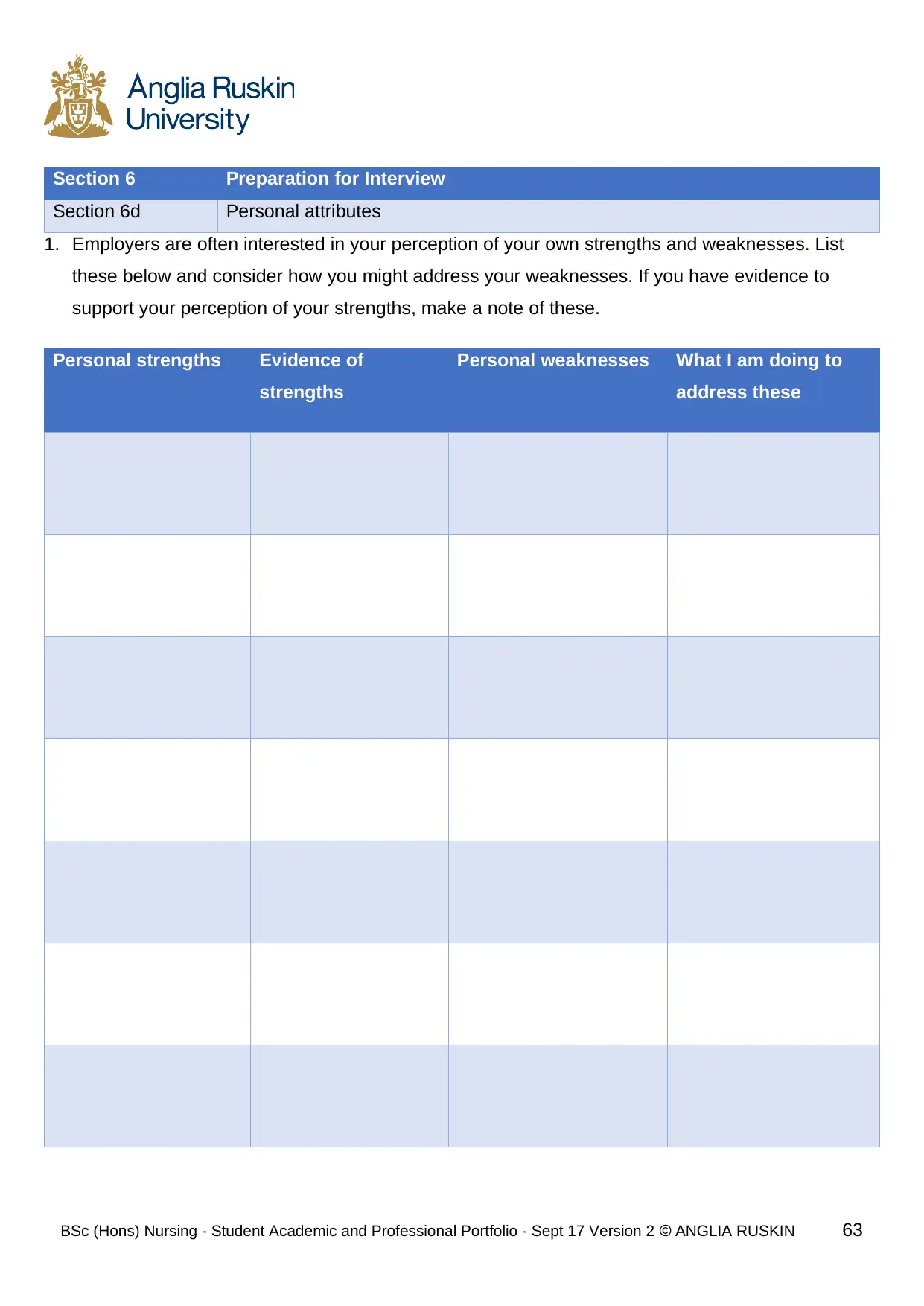
Section 6 Preparation for Interview
Section 6d Personal attributes
1. Employers are often interested in your perception of your own strengths and weaknesses. List
these below and consider how you might address your weaknesses. If you have evidence to
support your perception of your strengths, make a note of these.
Personal strengths Evidence of
strengths
Personal weaknesses What I am doing to
address these
BSc (Hons) Nursing - Student Academic and Professional Portfolio - Sept 17 Version 2 ANGLIA RUSKIN 63
Section 6d Personal attributes
1. Employers are often interested in your perception of your own strengths and weaknesses. List
these below and consider how you might address your weaknesses. If you have evidence to
support your perception of your strengths, make a note of these.
Personal strengths Evidence of
strengths
Personal weaknesses What I am doing to
address these
BSc (Hons) Nursing - Student Academic and Professional Portfolio - Sept 17 Version 2 ANGLIA RUSKIN 63
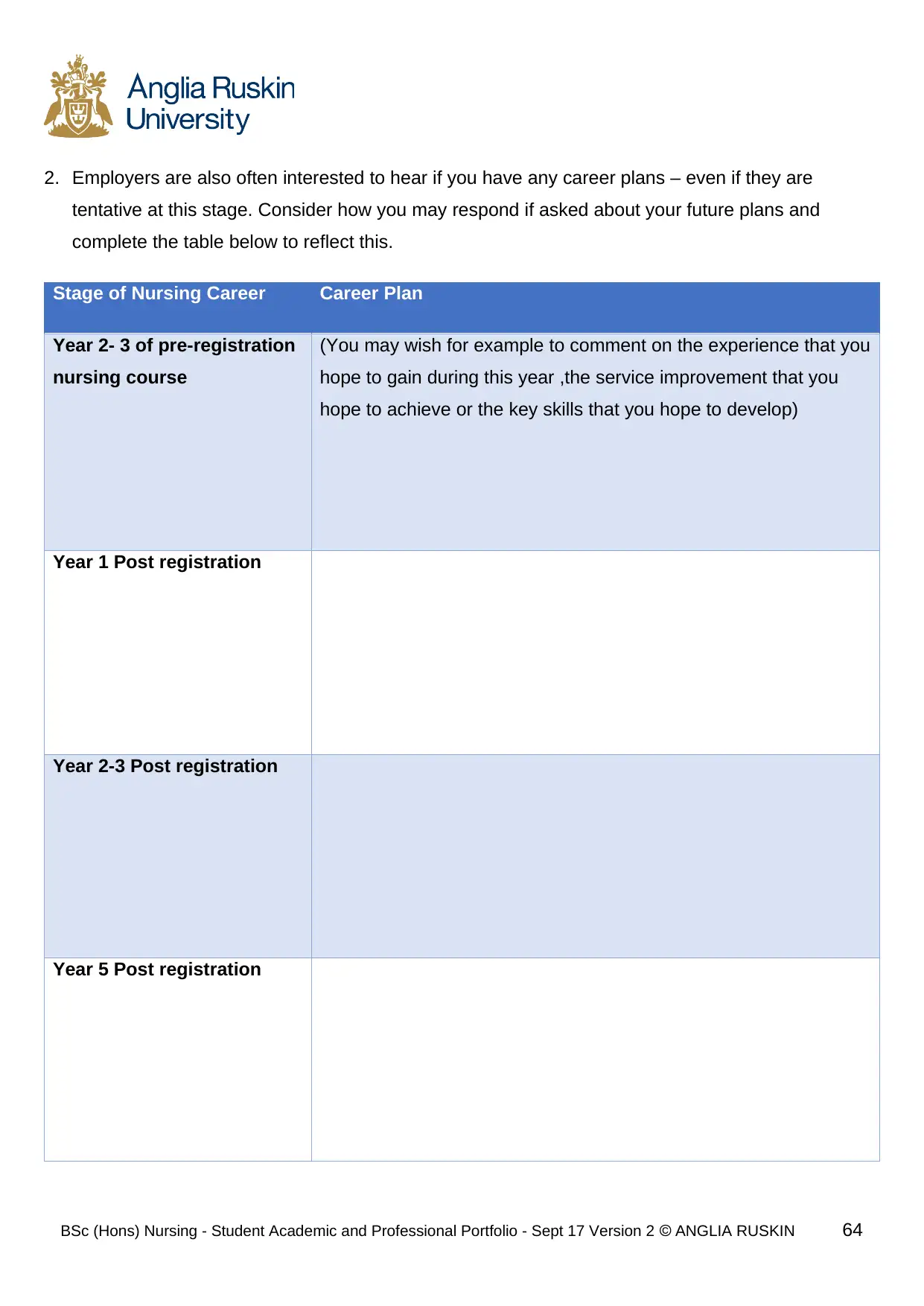
2. Employers are also often interested to hear if you have any career plans – even if they are
tentative at this stage. Consider how you may respond if asked about your future plans and
complete the table below to reflect this.
Stage of Nursing Career Career Plan
Year 2- 3 of pre-registration
nursing course
(You may wish for example to comment on the experience that you
hope to gain during this year ,the service improvement that you
hope to achieve or the key skills that you hope to develop)
Year 1 Post registration
Year 2-3 Post registration
Year 5 Post registration
BSc (Hons) Nursing - Student Academic and Professional Portfolio - Sept 17 Version 2 ANGLIA RUSKIN 64
tentative at this stage. Consider how you may respond if asked about your future plans and
complete the table below to reflect this.
Stage of Nursing Career Career Plan
Year 2- 3 of pre-registration
nursing course
(You may wish for example to comment on the experience that you
hope to gain during this year ,the service improvement that you
hope to achieve or the key skills that you hope to develop)
Year 1 Post registration
Year 2-3 Post registration
Year 5 Post registration
BSc (Hons) Nursing - Student Academic and Professional Portfolio - Sept 17 Version 2 ANGLIA RUSKIN 64
Secure Best Marks with AI Grader
Need help grading? Try our AI Grader for instant feedback on your assignments.
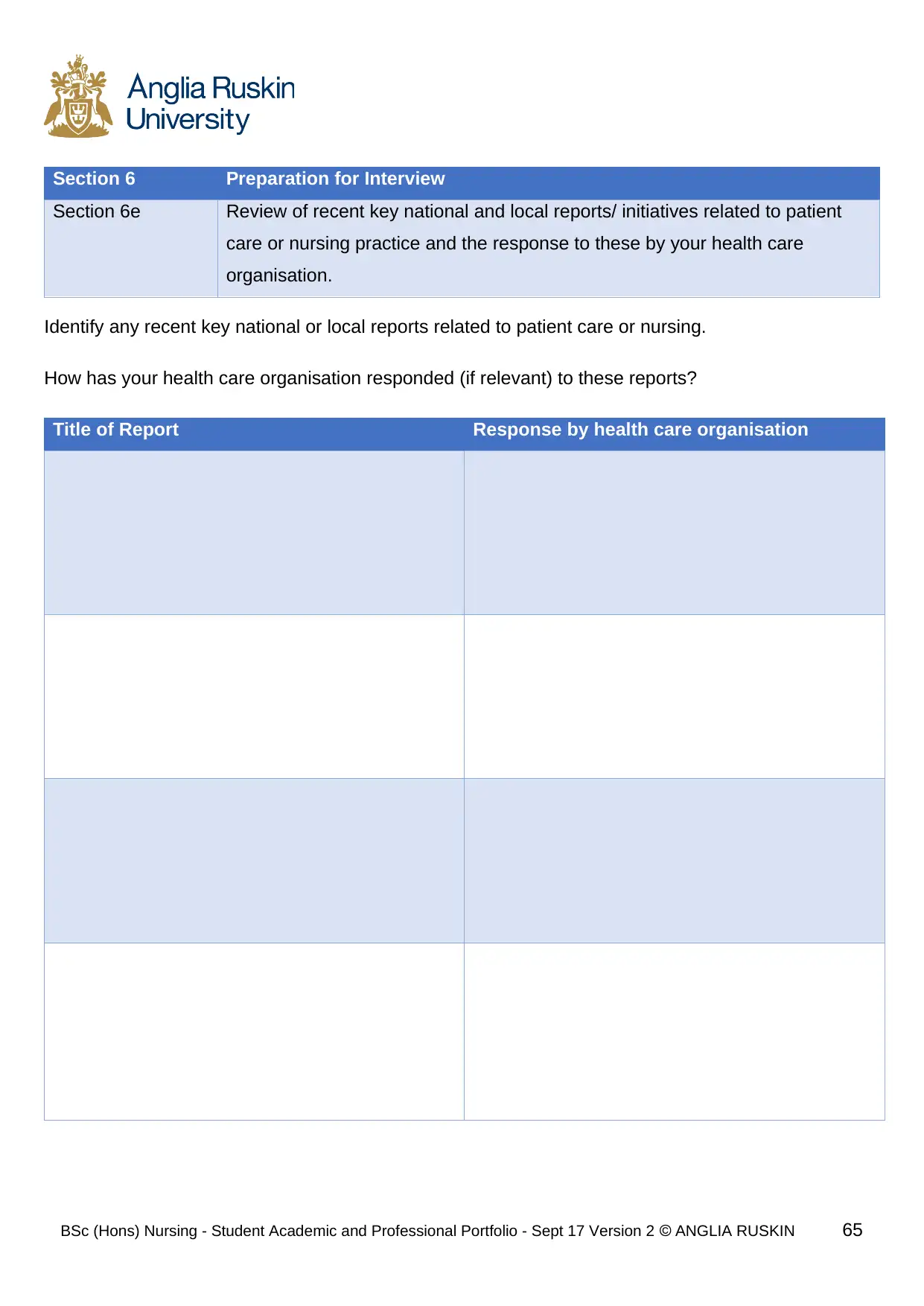
Section 6 Preparation for Interview
Section 6e Review of recent key national and local reports/ initiatives related to patient
care or nursing practice and the response to these by your health care
organisation.
Identify any recent key national or local reports related to patient care or nursing.
How has your health care organisation responded (if relevant) to these reports?
Title of Report Response by health care organisation
BSc (Hons) Nursing - Student Academic and Professional Portfolio - Sept 17 Version 2 ANGLIA RUSKIN 65
Section 6e Review of recent key national and local reports/ initiatives related to patient
care or nursing practice and the response to these by your health care
organisation.
Identify any recent key national or local reports related to patient care or nursing.
How has your health care organisation responded (if relevant) to these reports?
Title of Report Response by health care organisation
BSc (Hons) Nursing - Student Academic and Professional Portfolio - Sept 17 Version 2 ANGLIA RUSKIN 65
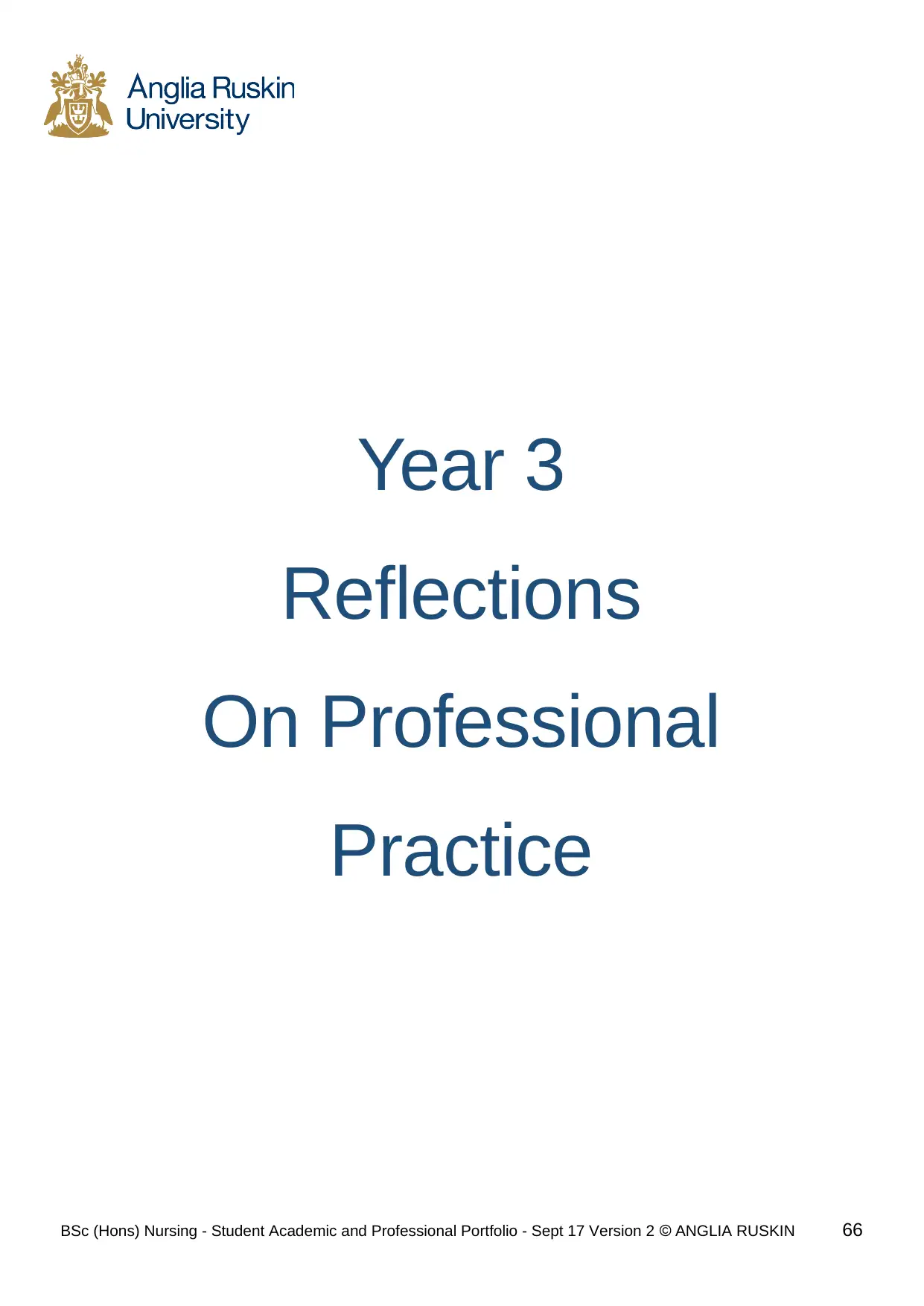
Year 3
Reflections
On Professional
Practice
BSc (Hons) Nursing - Student Academic and Professional Portfolio - Sept 17 Version 2 ANGLIA RUSKIN 66
Reflections
On Professional
Practice
BSc (Hons) Nursing - Student Academic and Professional Portfolio - Sept 17 Version 2 ANGLIA RUSKIN 66
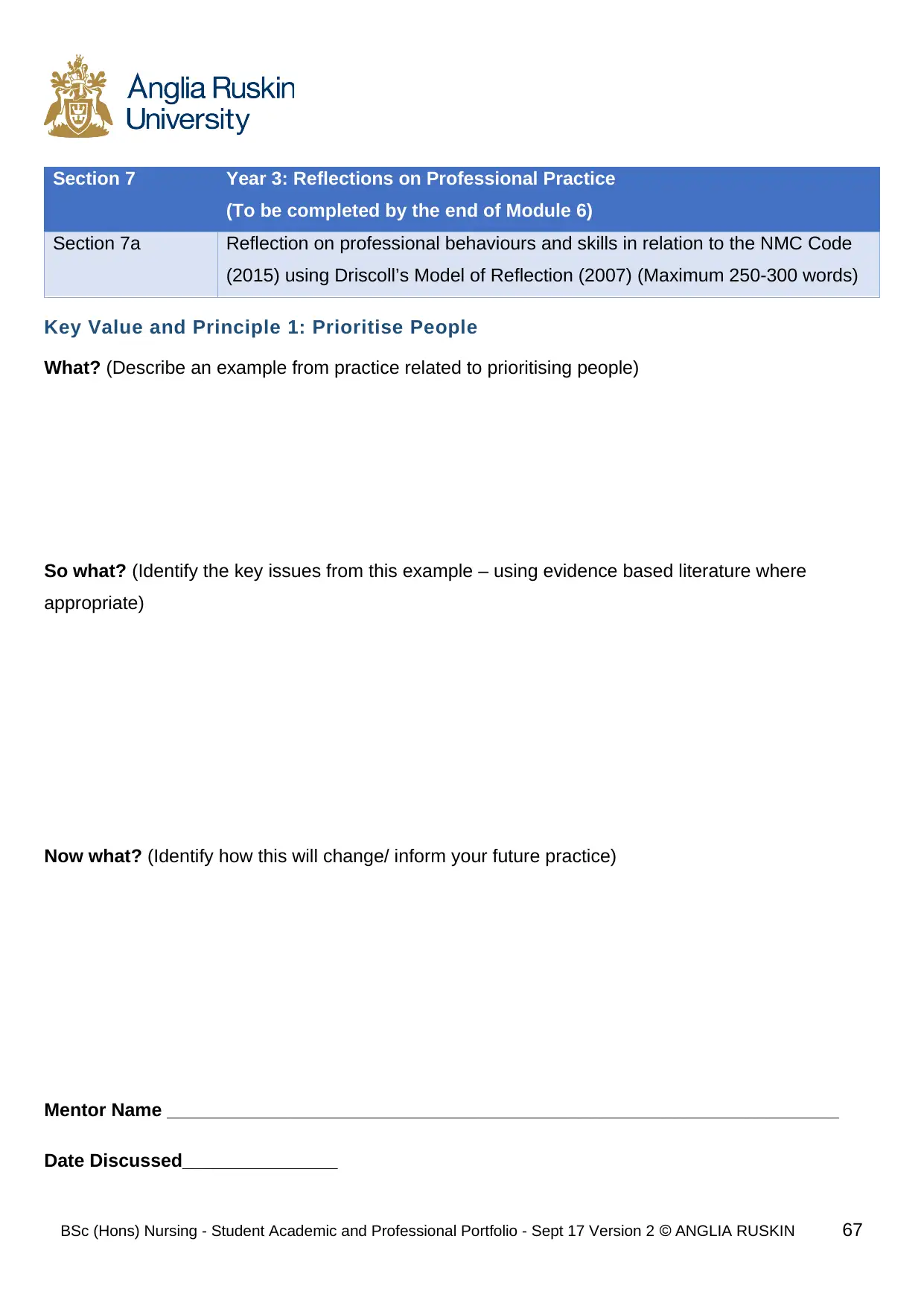
Section 7 Year 3: Reflections on Professional Practice
(To be completed by the end of Module 6)
Section 7a Reflection on professional behaviours and skills in relation to the NMC Code
(2015) using Driscoll’s Model of Reflection (2007) (Maximum 250-300 words)
Key Value and Principle 1: Prioritise People
What? (Describe an example from practice related to prioritising people)
So what? (Identify the key issues from this example – using evidence based literature where
appropriate)
Now what? (Identify how this will change/ inform your future practice)
Mentor Name _________________________________________________________________
Date Discussed_______________
BSc (Hons) Nursing - Student Academic and Professional Portfolio - Sept 17 Version 2 ANGLIA RUSKIN 67
(To be completed by the end of Module 6)
Section 7a Reflection on professional behaviours and skills in relation to the NMC Code
(2015) using Driscoll’s Model of Reflection (2007) (Maximum 250-300 words)
Key Value and Principle 1: Prioritise People
What? (Describe an example from practice related to prioritising people)
So what? (Identify the key issues from this example – using evidence based literature where
appropriate)
Now what? (Identify how this will change/ inform your future practice)
Mentor Name _________________________________________________________________
Date Discussed_______________
BSc (Hons) Nursing - Student Academic and Professional Portfolio - Sept 17 Version 2 ANGLIA RUSKIN 67
Paraphrase This Document
Need a fresh take? Get an instant paraphrase of this document with our AI Paraphraser
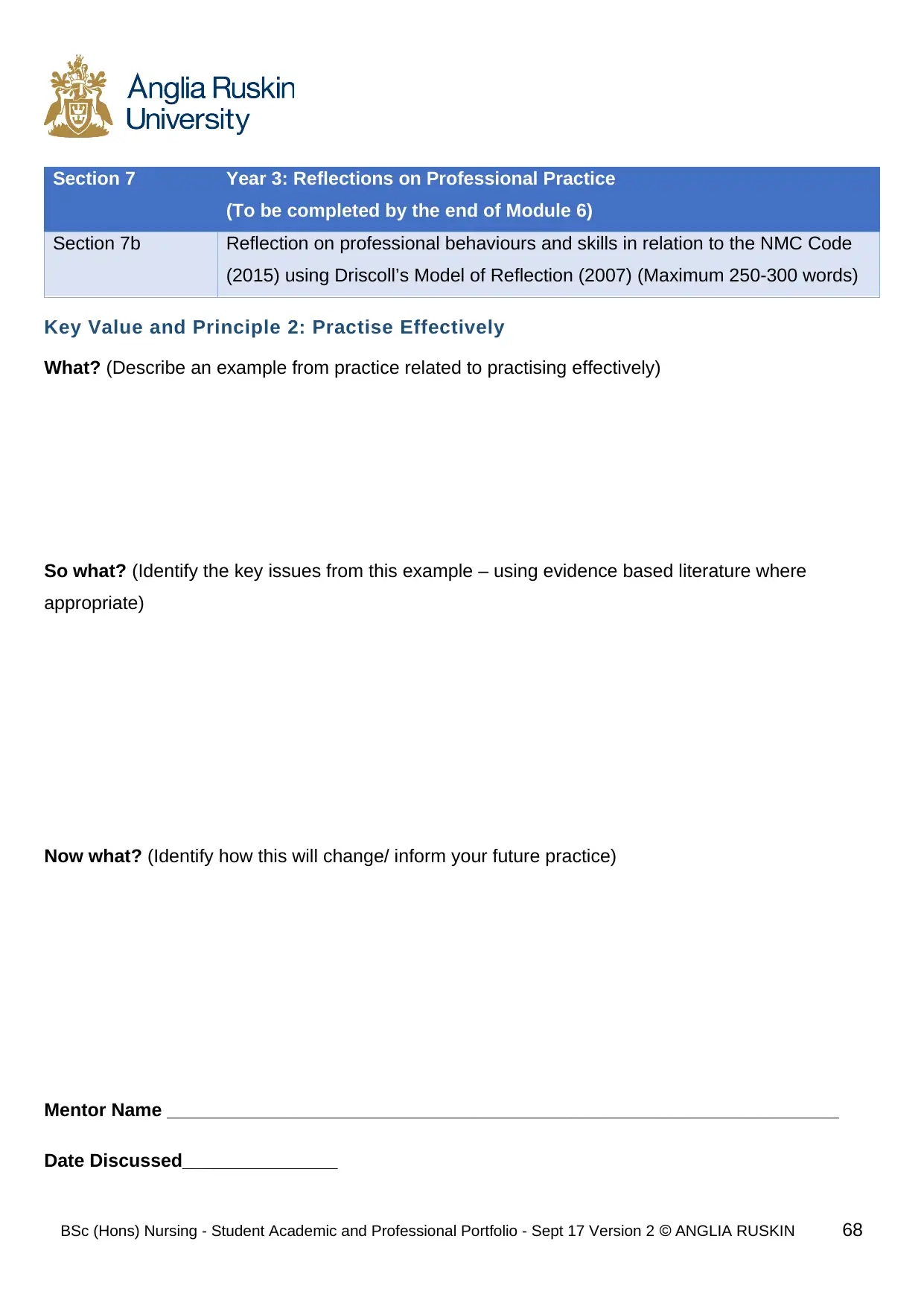
Section 7 Year 3: Reflections on Professional Practice
(To be completed by the end of Module 6)
Section 7b Reflection on professional behaviours and skills in relation to the NMC Code
(2015) using Driscoll’s Model of Reflection (2007) (Maximum 250-300 words)
Key Value and Principle 2: Practise Effectively
What? (Describe an example from practice related to practising effectively)
So what? (Identify the key issues from this example – using evidence based literature where
appropriate)
Now what? (Identify how this will change/ inform your future practice)
Mentor Name _________________________________________________________________
Date Discussed_______________
BSc (Hons) Nursing - Student Academic and Professional Portfolio - Sept 17 Version 2 ANGLIA RUSKIN 68
(To be completed by the end of Module 6)
Section 7b Reflection on professional behaviours and skills in relation to the NMC Code
(2015) using Driscoll’s Model of Reflection (2007) (Maximum 250-300 words)
Key Value and Principle 2: Practise Effectively
What? (Describe an example from practice related to practising effectively)
So what? (Identify the key issues from this example – using evidence based literature where
appropriate)
Now what? (Identify how this will change/ inform your future practice)
Mentor Name _________________________________________________________________
Date Discussed_______________
BSc (Hons) Nursing - Student Academic and Professional Portfolio - Sept 17 Version 2 ANGLIA RUSKIN 68
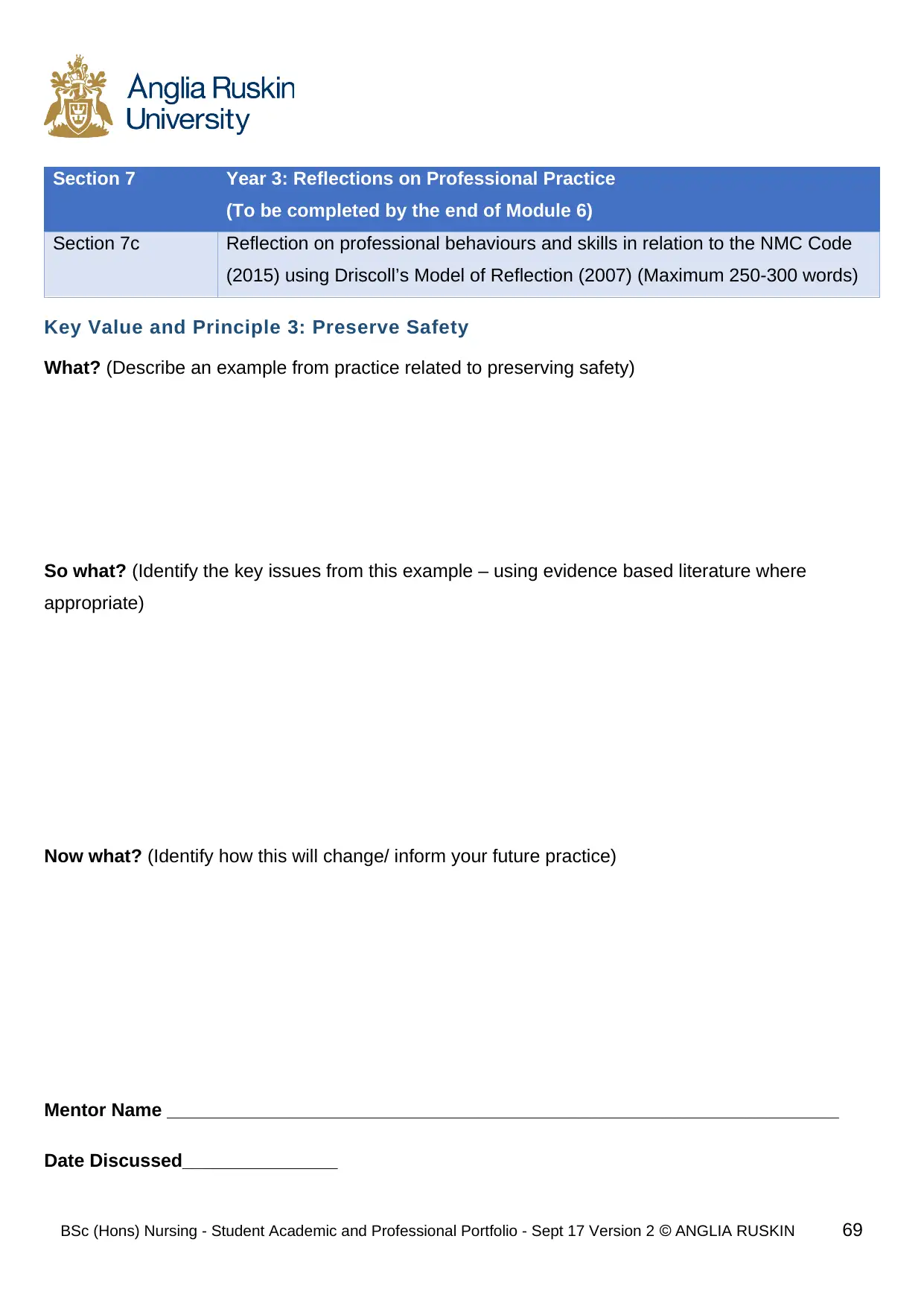
Section 7 Year 3: Reflections on Professional Practice
(To be completed by the end of Module 6)
Section 7c Reflection on professional behaviours and skills in relation to the NMC Code
(2015) using Driscoll’s Model of Reflection (2007) (Maximum 250-300 words)
Key Value and Principle 3: Preserve Safety
What? (Describe an example from practice related to preserving safety)
So what? (Identify the key issues from this example – using evidence based literature where
appropriate)
Now what? (Identify how this will change/ inform your future practice)
Mentor Name _________________________________________________________________
Date Discussed_______________
BSc (Hons) Nursing - Student Academic and Professional Portfolio - Sept 17 Version 2 ANGLIA RUSKIN 69
(To be completed by the end of Module 6)
Section 7c Reflection on professional behaviours and skills in relation to the NMC Code
(2015) using Driscoll’s Model of Reflection (2007) (Maximum 250-300 words)
Key Value and Principle 3: Preserve Safety
What? (Describe an example from practice related to preserving safety)
So what? (Identify the key issues from this example – using evidence based literature where
appropriate)
Now what? (Identify how this will change/ inform your future practice)
Mentor Name _________________________________________________________________
Date Discussed_______________
BSc (Hons) Nursing - Student Academic and Professional Portfolio - Sept 17 Version 2 ANGLIA RUSKIN 69
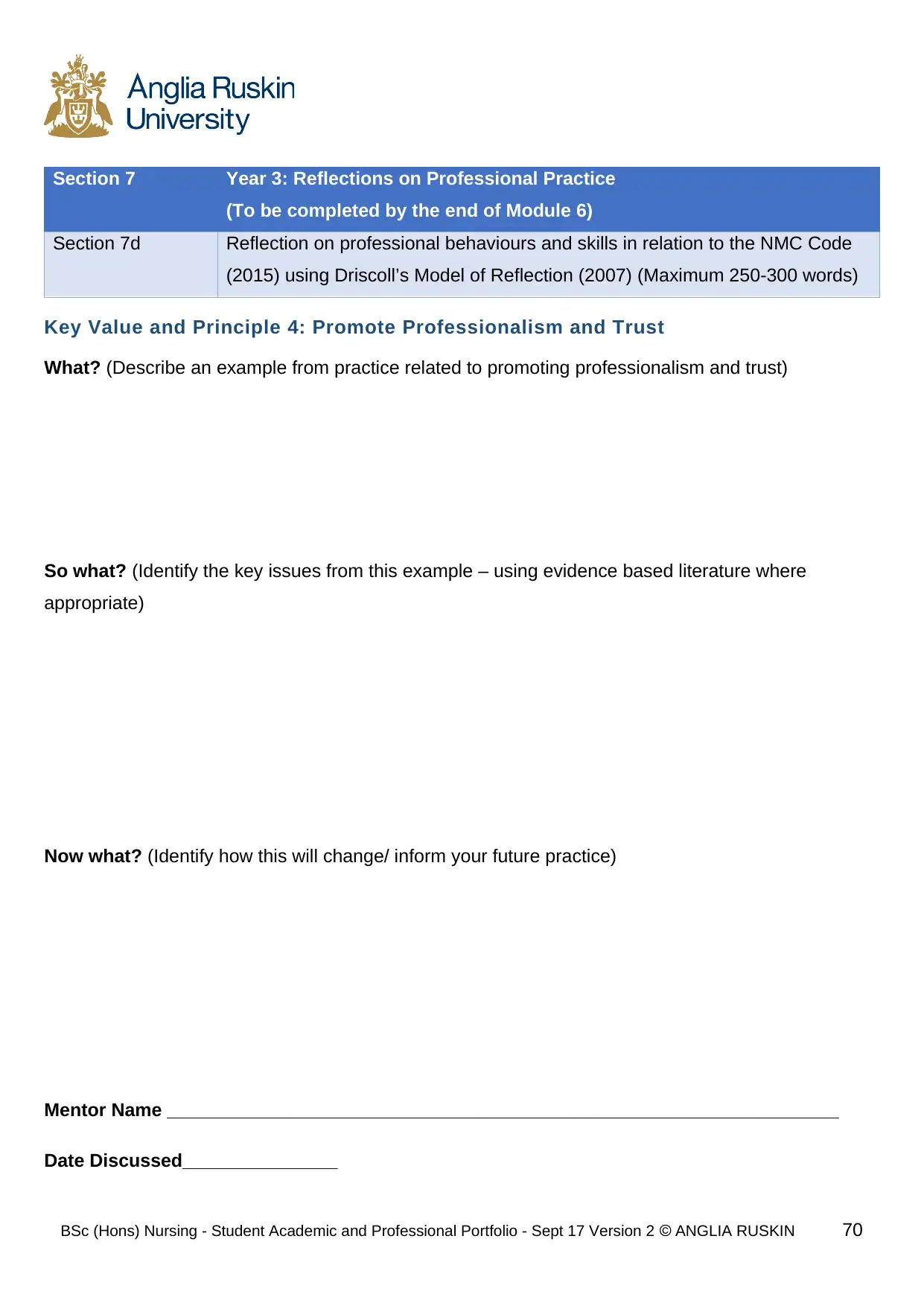
Section 7 Year 3: Reflections on Professional Practice
(To be completed by the end of Module 6)
Section 7d Reflection on professional behaviours and skills in relation to the NMC Code
(2015) using Driscoll’s Model of Reflection (2007) (Maximum 250-300 words)
Key Value and Principle 4: Promote Professionalism and Trust
What? (Describe an example from practice related to promoting professionalism and trust)
So what? (Identify the key issues from this example – using evidence based literature where
appropriate)
Now what? (Identify how this will change/ inform your future practice)
Mentor Name _________________________________________________________________
Date Discussed_______________
BSc (Hons) Nursing - Student Academic and Professional Portfolio - Sept 17 Version 2 ANGLIA RUSKIN 70
(To be completed by the end of Module 6)
Section 7d Reflection on professional behaviours and skills in relation to the NMC Code
(2015) using Driscoll’s Model of Reflection (2007) (Maximum 250-300 words)
Key Value and Principle 4: Promote Professionalism and Trust
What? (Describe an example from practice related to promoting professionalism and trust)
So what? (Identify the key issues from this example – using evidence based literature where
appropriate)
Now what? (Identify how this will change/ inform your future practice)
Mentor Name _________________________________________________________________
Date Discussed_______________
BSc (Hons) Nursing - Student Academic and Professional Portfolio - Sept 17 Version 2 ANGLIA RUSKIN 70
Secure Best Marks with AI Grader
Need help grading? Try our AI Grader for instant feedback on your assignments.
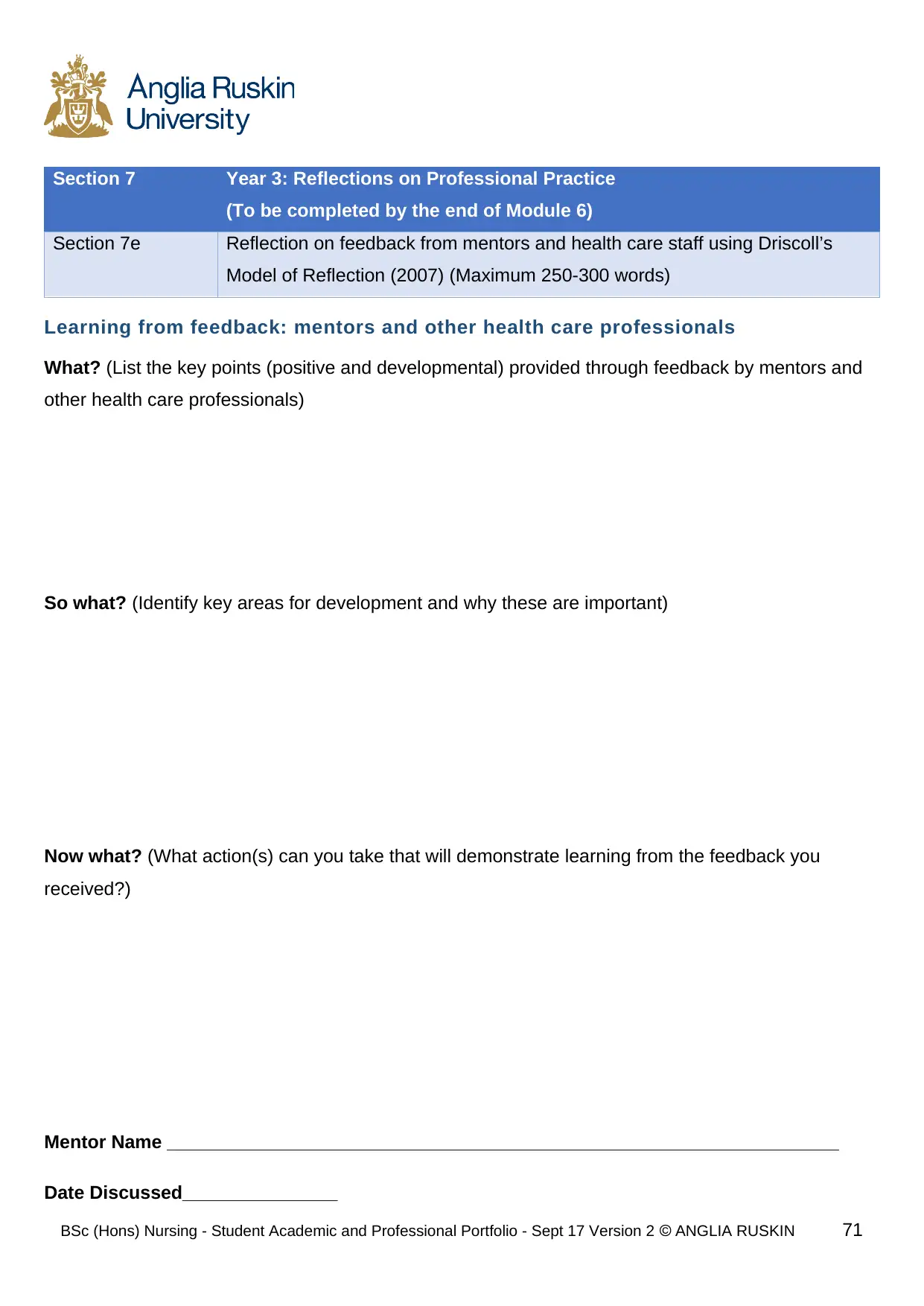
Section 7 Year 3: Reflections on Professional Practice
(To be completed by the end of Module 6)
Section 7e Reflection on feedback from mentors and health care staff using Driscoll’s
Model of Reflection (2007) (Maximum 250-300 words)
Learning from feedback: mentors and other health care professionals
What? (List the key points (positive and developmental) provided through feedback by mentors and
other health care professionals)
So what? (Identify key areas for development and why these are important)
Now what? (What action(s) can you take that will demonstrate learning from the feedback you
received?)
Mentor Name _________________________________________________________________
Date Discussed_______________
BSc (Hons) Nursing - Student Academic and Professional Portfolio - Sept 17 Version 2 ANGLIA RUSKIN 71
(To be completed by the end of Module 6)
Section 7e Reflection on feedback from mentors and health care staff using Driscoll’s
Model of Reflection (2007) (Maximum 250-300 words)
Learning from feedback: mentors and other health care professionals
What? (List the key points (positive and developmental) provided through feedback by mentors and
other health care professionals)
So what? (Identify key areas for development and why these are important)
Now what? (What action(s) can you take that will demonstrate learning from the feedback you
received?)
Mentor Name _________________________________________________________________
Date Discussed_______________
BSc (Hons) Nursing - Student Academic and Professional Portfolio - Sept 17 Version 2 ANGLIA RUSKIN 71
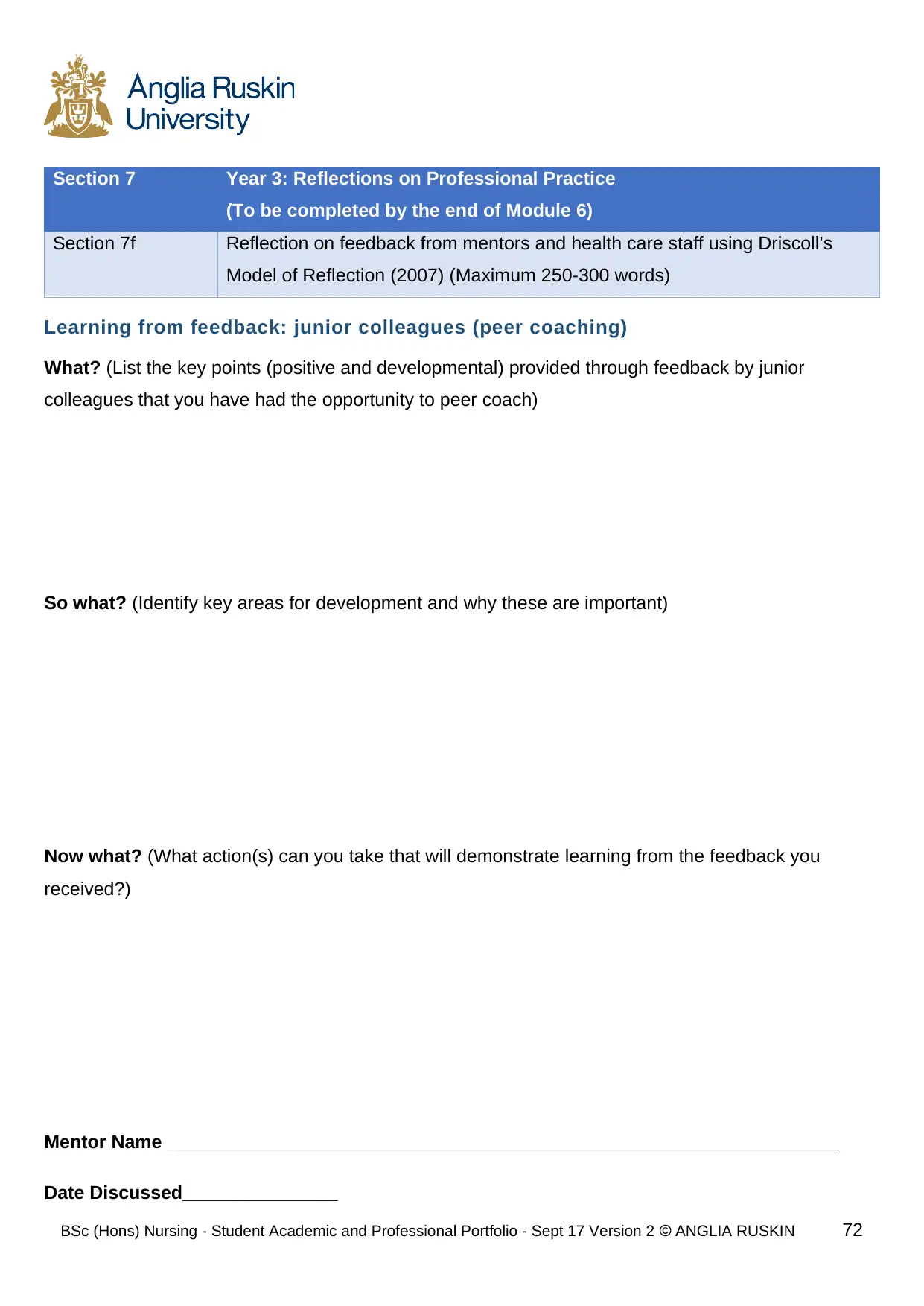
Section 7 Year 3: Reflections on Professional Practice
(To be completed by the end of Module 6)
Section 7f Reflection on feedback from mentors and health care staff using Driscoll’s
Model of Reflection (2007) (Maximum 250-300 words)
Learning from feedback: junior colleagues (peer coaching)
What? (List the key points (positive and developmental) provided through feedback by junior
colleagues that you have had the opportunity to peer coach)
So what? (Identify key areas for development and why these are important)
Now what? (What action(s) can you take that will demonstrate learning from the feedback you
received?)
Mentor Name _________________________________________________________________
Date Discussed_______________
BSc (Hons) Nursing - Student Academic and Professional Portfolio - Sept 17 Version 2 ANGLIA RUSKIN 72
(To be completed by the end of Module 6)
Section 7f Reflection on feedback from mentors and health care staff using Driscoll’s
Model of Reflection (2007) (Maximum 250-300 words)
Learning from feedback: junior colleagues (peer coaching)
What? (List the key points (positive and developmental) provided through feedback by junior
colleagues that you have had the opportunity to peer coach)
So what? (Identify key areas for development and why these are important)
Now what? (What action(s) can you take that will demonstrate learning from the feedback you
received?)
Mentor Name _________________________________________________________________
Date Discussed_______________
BSc (Hons) Nursing - Student Academic and Professional Portfolio - Sept 17 Version 2 ANGLIA RUSKIN 72
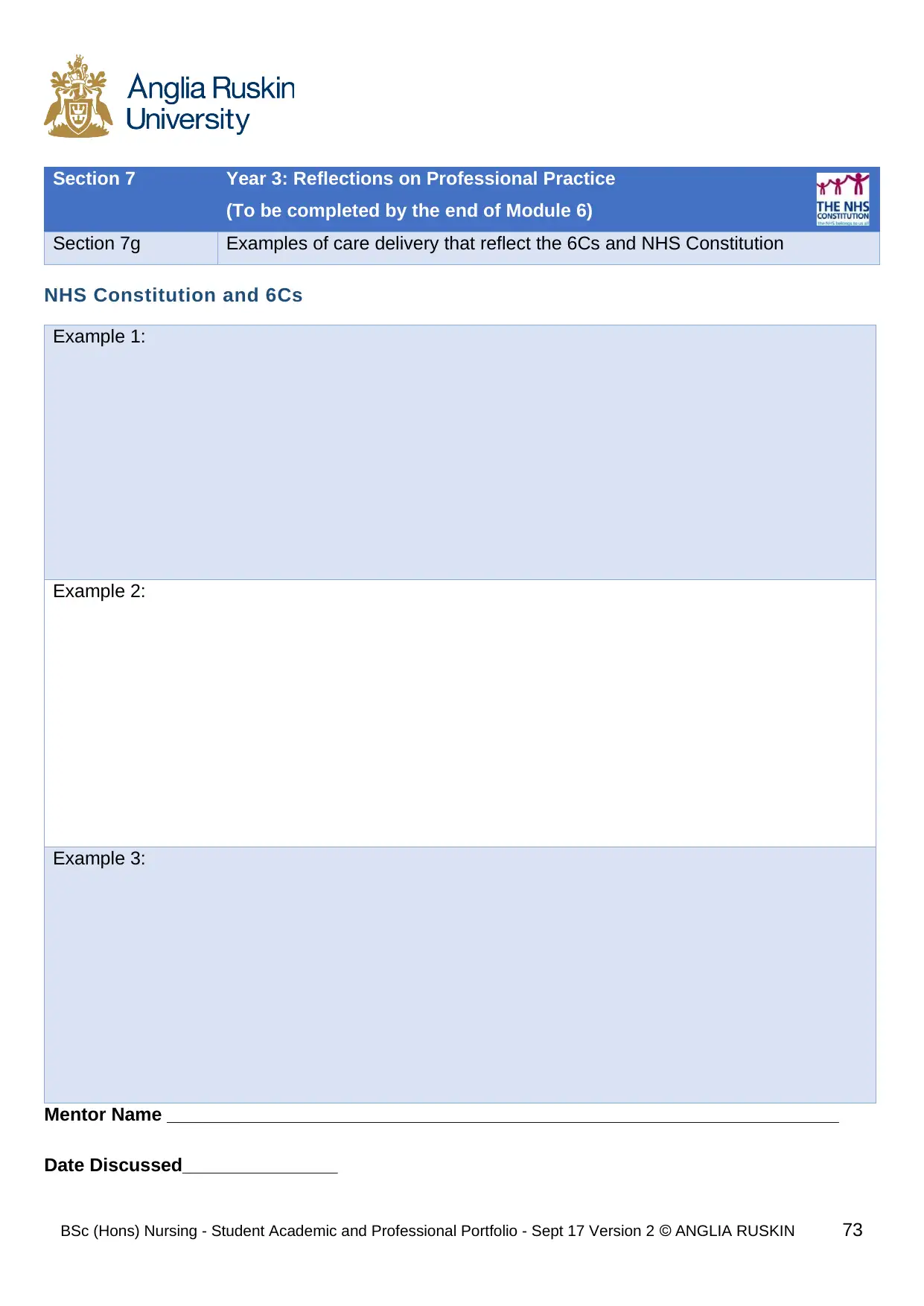
Section 7 Year 3: Reflections on Professional Practice
(To be completed by the end of Module 6)
Section 7g Examples of care delivery that reflect the 6Cs and NHS Constitution
NHS Constitution and 6Cs
Example 1:
Example 2:
Example 3:
Mentor Name _________________________________________________________________
Date Discussed_______________
BSc (Hons) Nursing - Student Academic and Professional Portfolio - Sept 17 Version 2 ANGLIA RUSKIN 73
(To be completed by the end of Module 6)
Section 7g Examples of care delivery that reflect the 6Cs and NHS Constitution
NHS Constitution and 6Cs
Example 1:
Example 2:
Example 3:
Mentor Name _________________________________________________________________
Date Discussed_______________
BSc (Hons) Nursing - Student Academic and Professional Portfolio - Sept 17 Version 2 ANGLIA RUSKIN 73
Paraphrase This Document
Need a fresh take? Get an instant paraphrase of this document with our AI Paraphraser
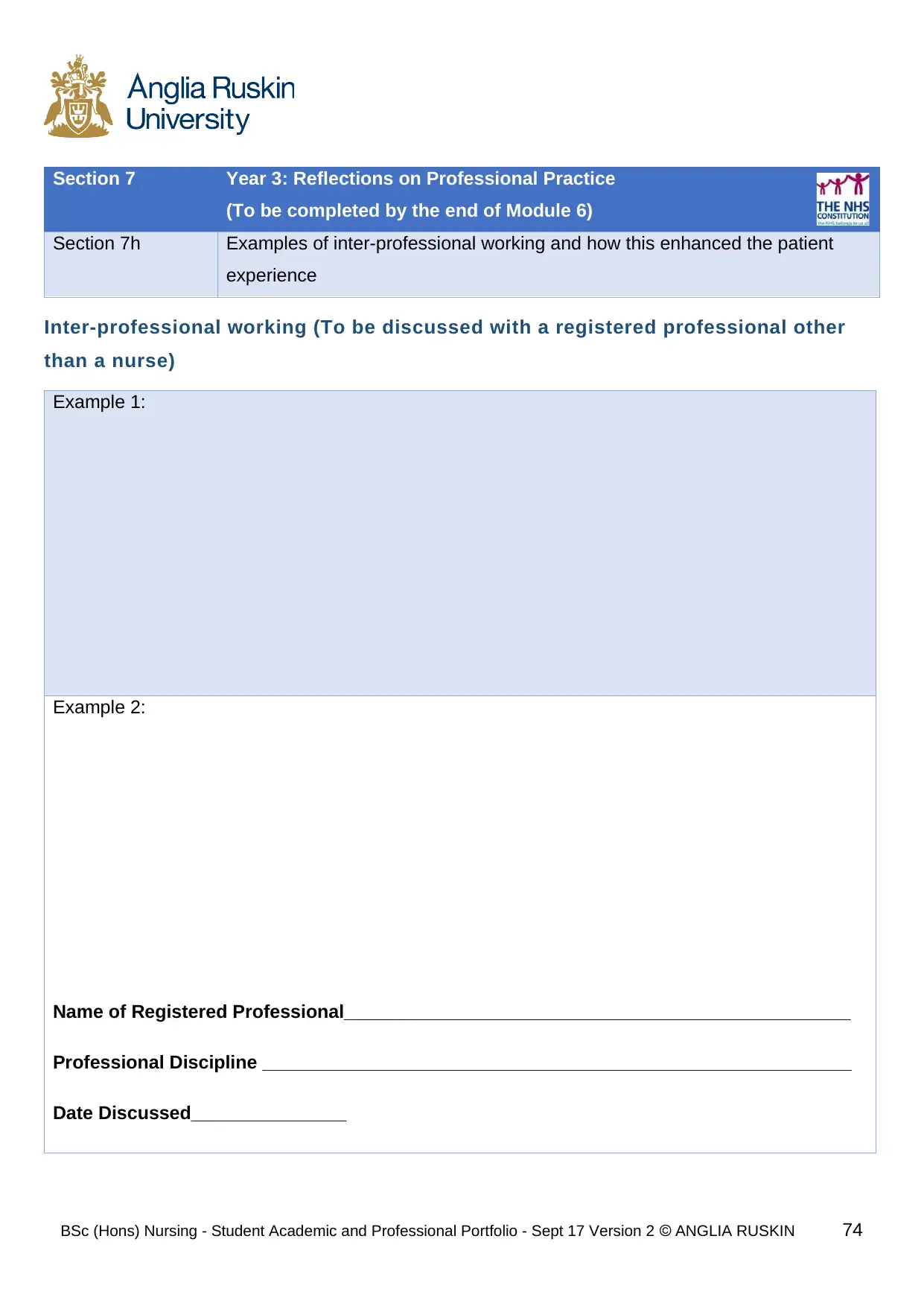
Section 7 Year 3: Reflections on Professional Practice
(To be completed by the end of Module 6)
Section 7h Examples of inter-professional working and how this enhanced the patient
experience
Inter-professional working (To be discussed with a registered professional other
than a nurse)
Example 1:
Example 2:
Name of Registered Professional_________________________________________________
Professional Discipline _________________________________________________________
Date Discussed_______________
BSc (Hons) Nursing - Student Academic and Professional Portfolio - Sept 17 Version 2 ANGLIA RUSKIN 74
(To be completed by the end of Module 6)
Section 7h Examples of inter-professional working and how this enhanced the patient
experience
Inter-professional working (To be discussed with a registered professional other
than a nurse)
Example 1:
Example 2:
Name of Registered Professional_________________________________________________
Professional Discipline _________________________________________________________
Date Discussed_______________
BSc (Hons) Nursing - Student Academic and Professional Portfolio - Sept 17 Version 2 ANGLIA RUSKIN 74
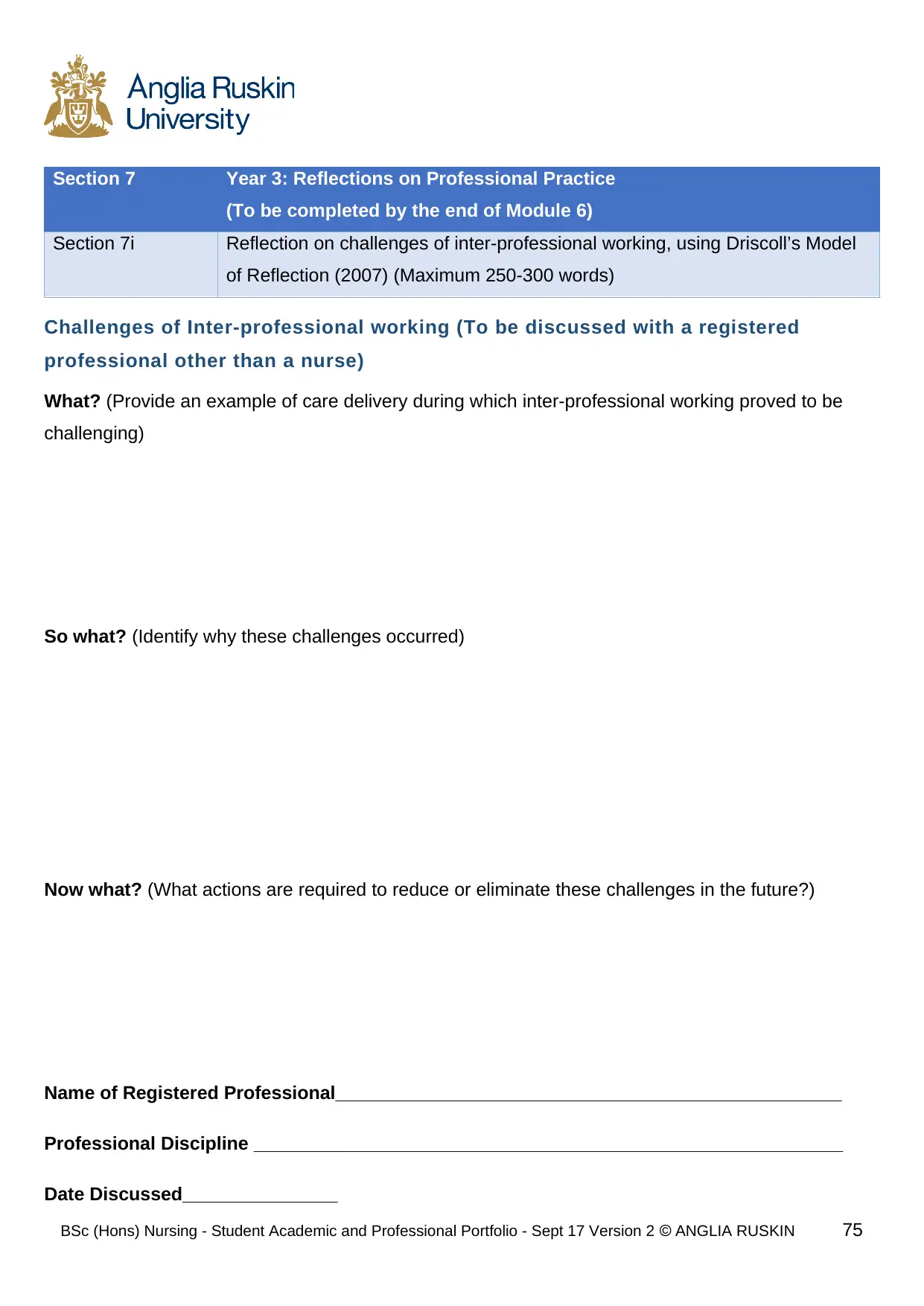
Section 7 Year 3: Reflections on Professional Practice
(To be completed by the end of Module 6)
Section 7i Reflection on challenges of inter-professional working, using Driscoll’s Model
of Reflection (2007) (Maximum 250-300 words)
Challenges of Inter-professional working (To be discussed with a registered
professional other than a nurse)
What? (Provide an example of care delivery during which inter-professional working proved to be
challenging)
So what? (Identify why these challenges occurred)
Now what? (What actions are required to reduce or eliminate these challenges in the future?)
Name of Registered Professional_________________________________________________
Professional Discipline _________________________________________________________
Date Discussed_______________
BSc (Hons) Nursing - Student Academic and Professional Portfolio - Sept 17 Version 2 ANGLIA RUSKIN 75
(To be completed by the end of Module 6)
Section 7i Reflection on challenges of inter-professional working, using Driscoll’s Model
of Reflection (2007) (Maximum 250-300 words)
Challenges of Inter-professional working (To be discussed with a registered
professional other than a nurse)
What? (Provide an example of care delivery during which inter-professional working proved to be
challenging)
So what? (Identify why these challenges occurred)
Now what? (What actions are required to reduce or eliminate these challenges in the future?)
Name of Registered Professional_________________________________________________
Professional Discipline _________________________________________________________
Date Discussed_______________
BSc (Hons) Nursing - Student Academic and Professional Portfolio - Sept 17 Version 2 ANGLIA RUSKIN 75
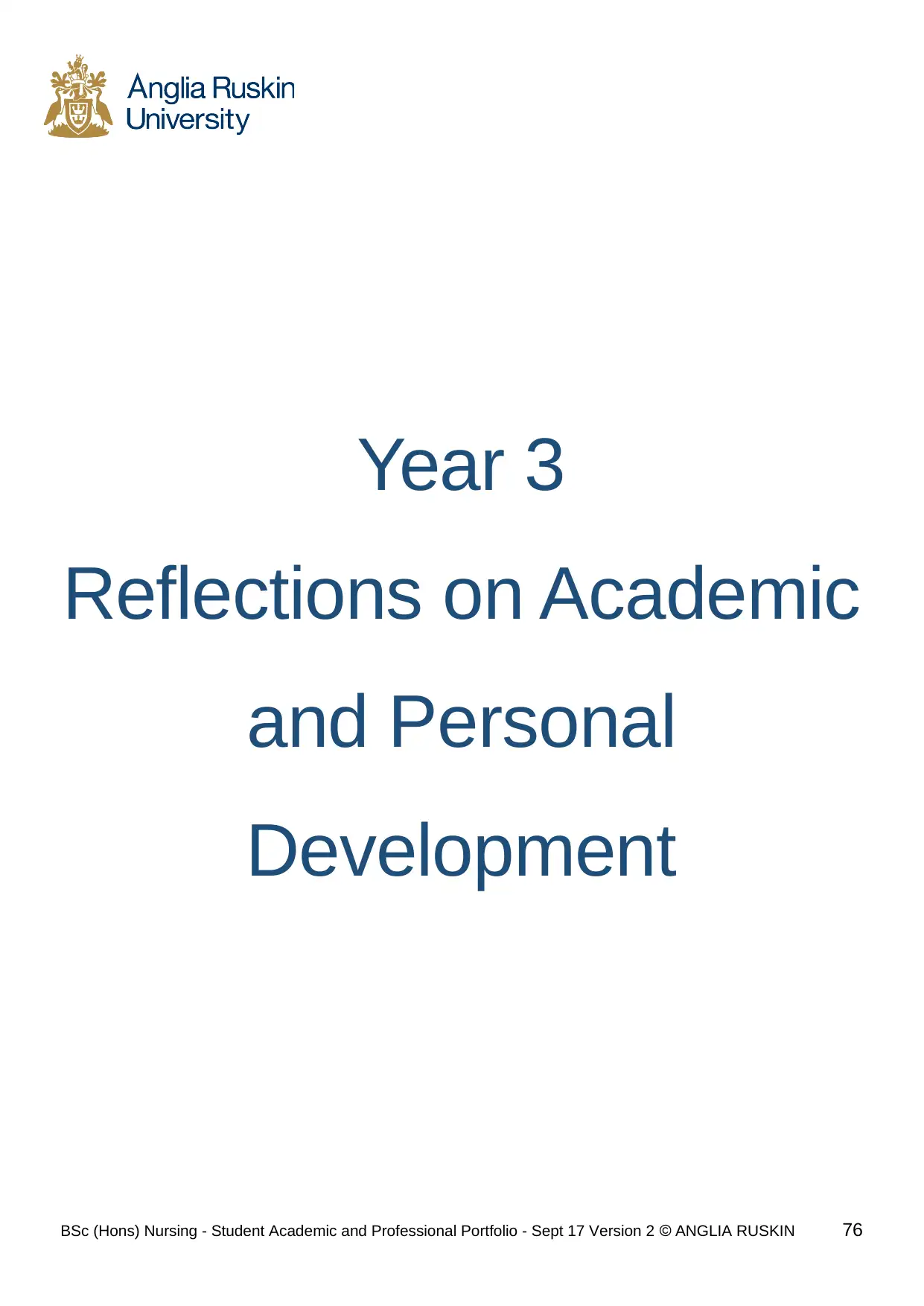
Year 3
Reflections on Academic
and Personal
Development
BSc (Hons) Nursing - Student Academic and Professional Portfolio - Sept 17 Version 2 ANGLIA RUSKIN 76
Reflections on Academic
and Personal
Development
BSc (Hons) Nursing - Student Academic and Professional Portfolio - Sept 17 Version 2 ANGLIA RUSKIN 76
Secure Best Marks with AI Grader
Need help grading? Try our AI Grader for instant feedback on your assignments.
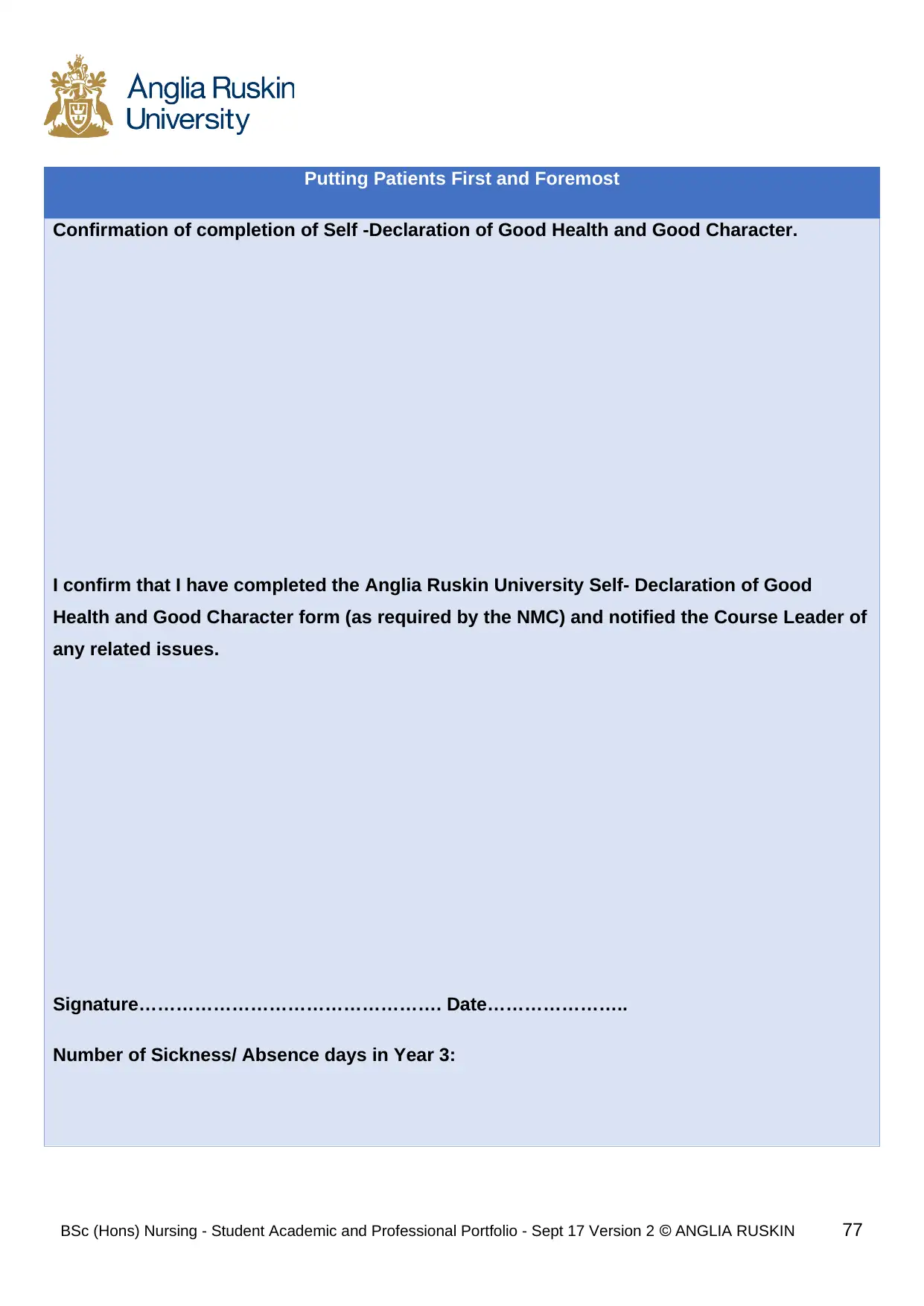
Putting Patients First and Foremost
Confirmation of completion of Self -Declaration of Good Health and Good Character.
I confirm that I have completed the Anglia Ruskin University Self- Declaration of Good
Health and Good Character form (as required by the NMC) and notified the Course Leader of
any related issues.
Signature…………………………………………. Date…………………..
Number of Sickness/ Absence days in Year 3:
BSc (Hons) Nursing - Student Academic and Professional Portfolio - Sept 17 Version 2 ANGLIA RUSKIN 77
Confirmation of completion of Self -Declaration of Good Health and Good Character.
I confirm that I have completed the Anglia Ruskin University Self- Declaration of Good
Health and Good Character form (as required by the NMC) and notified the Course Leader of
any related issues.
Signature…………………………………………. Date…………………..
Number of Sickness/ Absence days in Year 3:
BSc (Hons) Nursing - Student Academic and Professional Portfolio - Sept 17 Version 2 ANGLIA RUSKIN 77
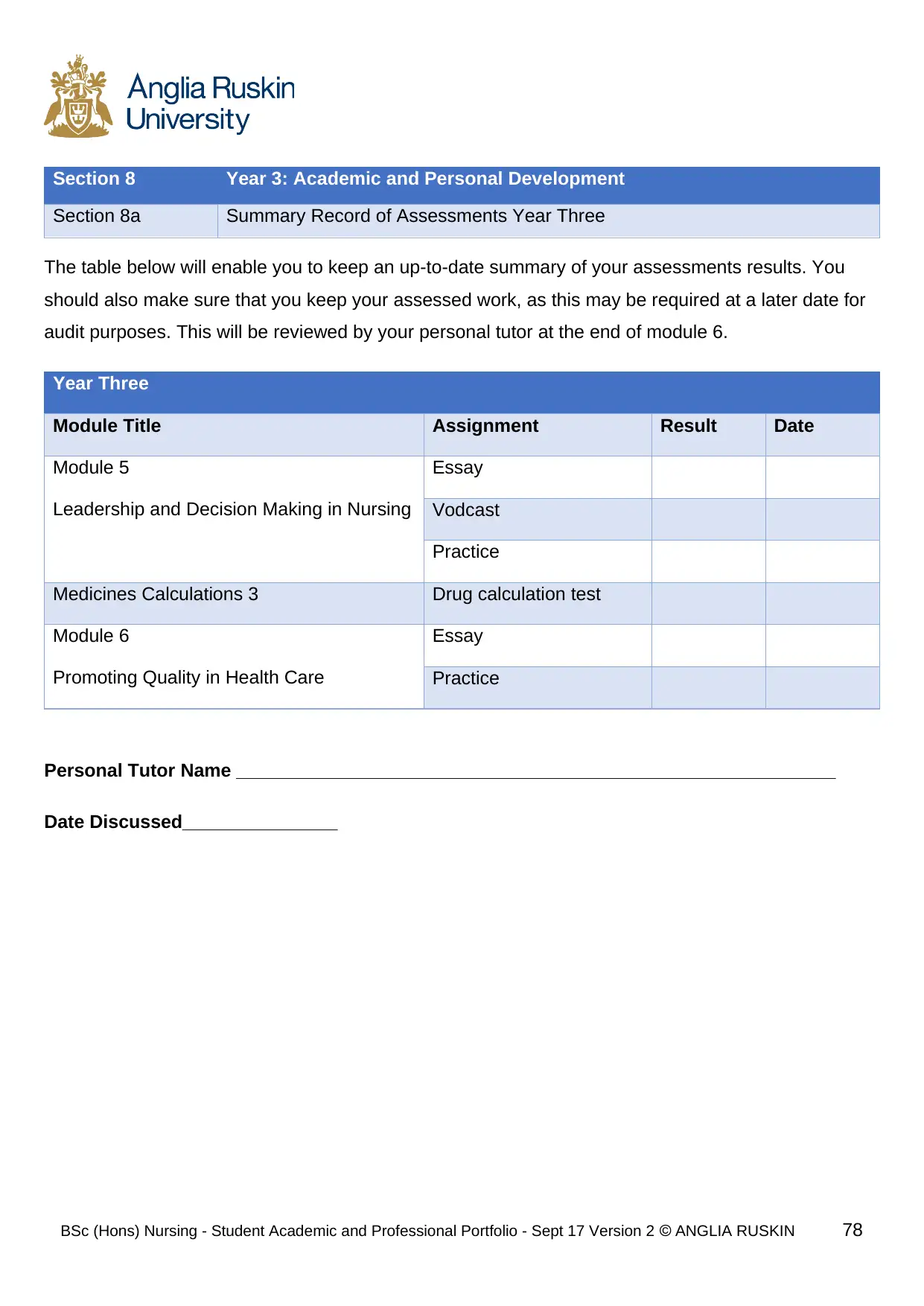
Section 8 Year 3: Academic and Personal Development
Section 8a Summary Record of Assessments Year Three
The table below will enable you to keep an up-to-date summary of your assessments results. You
should also make sure that you keep your assessed work, as this may be required at a later date for
audit purposes. This will be reviewed by your personal tutor at the end of module 6.
Year Three
Module Title Assignment Result Date
Module 5
Leadership and Decision Making in Nursing
Essay
Vodcast
Practice
Medicines Calculations 3 Drug calculation test
Module 6
Promoting Quality in Health Care
Essay
Practice
Personal Tutor Name __________________________________________________________
Date Discussed_______________
BSc (Hons) Nursing - Student Academic and Professional Portfolio - Sept 17 Version 2 ANGLIA RUSKIN 78
Section 8a Summary Record of Assessments Year Three
The table below will enable you to keep an up-to-date summary of your assessments results. You
should also make sure that you keep your assessed work, as this may be required at a later date for
audit purposes. This will be reviewed by your personal tutor at the end of module 6.
Year Three
Module Title Assignment Result Date
Module 5
Leadership and Decision Making in Nursing
Essay
Vodcast
Practice
Medicines Calculations 3 Drug calculation test
Module 6
Promoting Quality in Health Care
Essay
Practice
Personal Tutor Name __________________________________________________________
Date Discussed_______________
BSc (Hons) Nursing - Student Academic and Professional Portfolio - Sept 17 Version 2 ANGLIA RUSKIN 78
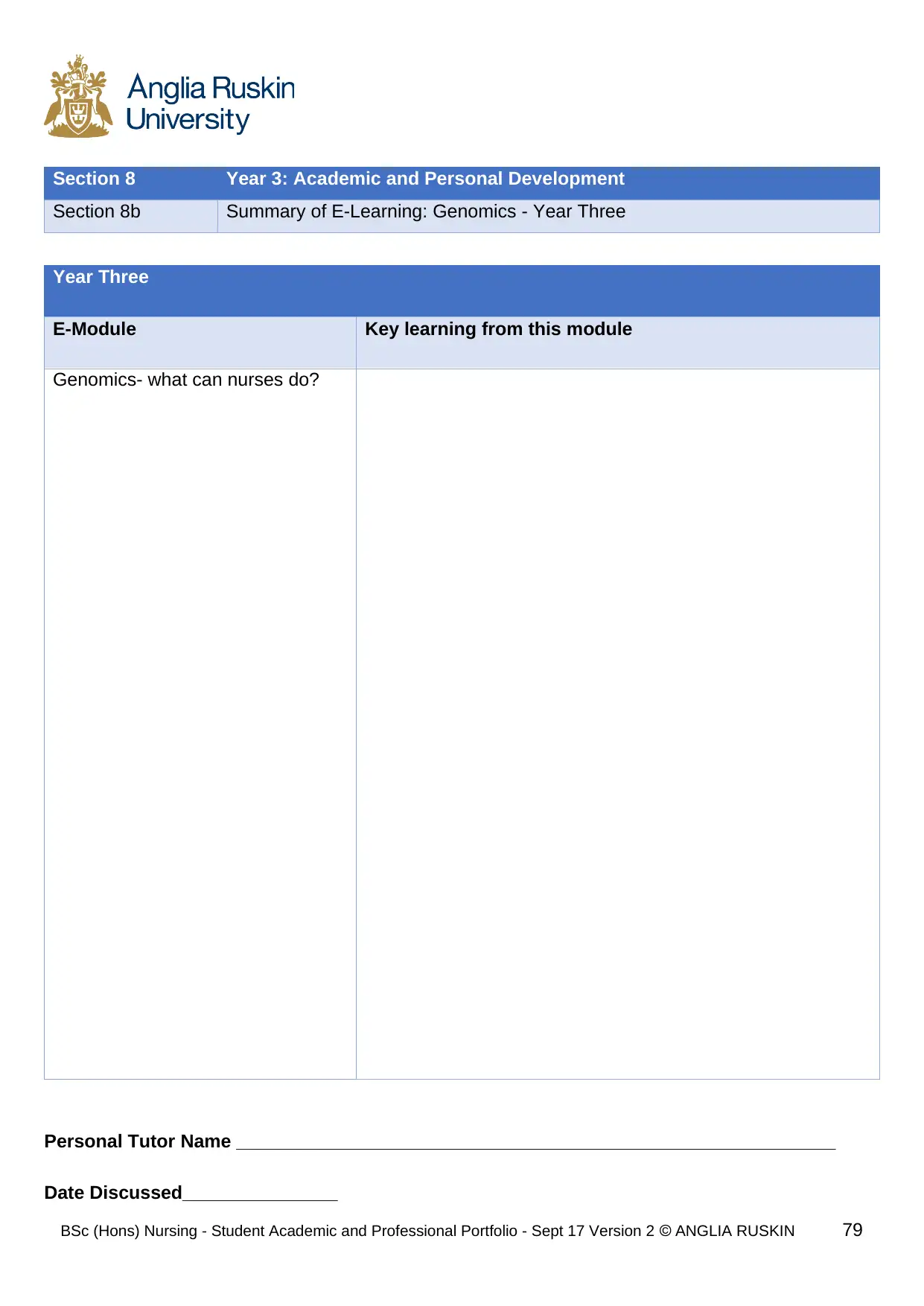
Section 8 Year 3: Academic and Personal Development
Section 8b Summary of E-Learning: Genomics - Year Three
Year Three
E-Module Key learning from this module
Genomics- what can nurses do?
Personal Tutor Name __________________________________________________________
Date Discussed_______________
BSc (Hons) Nursing - Student Academic and Professional Portfolio - Sept 17 Version 2 ANGLIA RUSKIN 79
Section 8b Summary of E-Learning: Genomics - Year Three
Year Three
E-Module Key learning from this module
Genomics- what can nurses do?
Personal Tutor Name __________________________________________________________
Date Discussed_______________
BSc (Hons) Nursing - Student Academic and Professional Portfolio - Sept 17 Version 2 ANGLIA RUSKIN 79
Paraphrase This Document
Need a fresh take? Get an instant paraphrase of this document with our AI Paraphraser
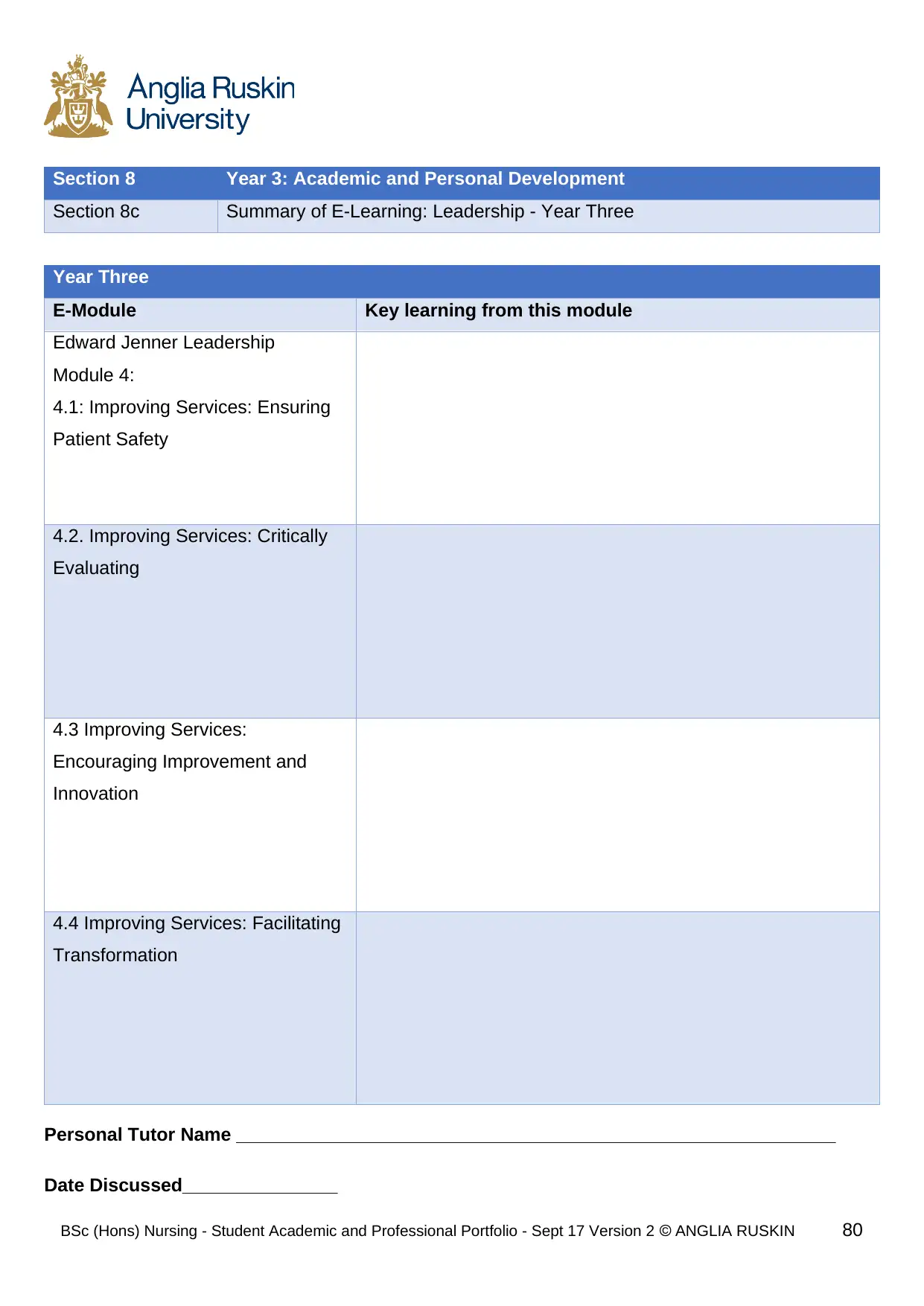
Section 8 Year 3: Academic and Personal Development
Section 8c Summary of E-Learning: Leadership - Year Three
Year Three
E-Module Key learning from this module
Edward Jenner Leadership
Module 4:
4.1: Improving Services: Ensuring
Patient Safety
4.2. Improving Services: Critically
Evaluating
4.3 Improving Services:
Encouraging Improvement and
Innovation
4.4 Improving Services: Facilitating
Transformation
Personal Tutor Name __________________________________________________________
Date Discussed_______________
BSc (Hons) Nursing - Student Academic and Professional Portfolio - Sept 17 Version 2 ANGLIA RUSKIN 80
Section 8c Summary of E-Learning: Leadership - Year Three
Year Three
E-Module Key learning from this module
Edward Jenner Leadership
Module 4:
4.1: Improving Services: Ensuring
Patient Safety
4.2. Improving Services: Critically
Evaluating
4.3 Improving Services:
Encouraging Improvement and
Innovation
4.4 Improving Services: Facilitating
Transformation
Personal Tutor Name __________________________________________________________
Date Discussed_______________
BSc (Hons) Nursing - Student Academic and Professional Portfolio - Sept 17 Version 2 ANGLIA RUSKIN 80
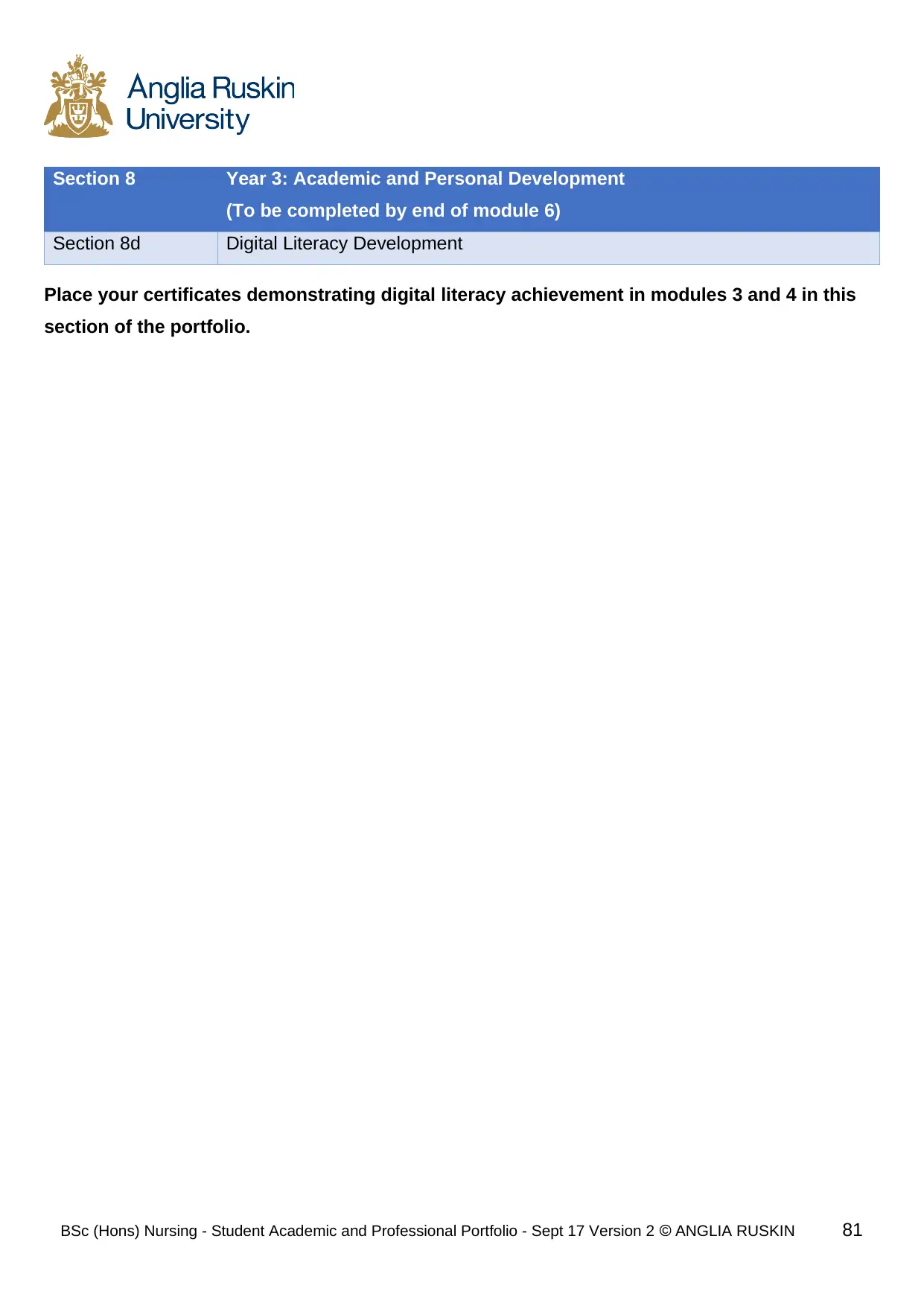
Section 8 Year 3: Academic and Personal Development
(To be completed by end of module 6)
Section 8d Digital Literacy Development
Place your certificates demonstrating digital literacy achievement in modules 3 and 4 in this
section of the portfolio.
BSc (Hons) Nursing - Student Academic and Professional Portfolio - Sept 17 Version 2 ANGLIA RUSKIN 81
(To be completed by end of module 6)
Section 8d Digital Literacy Development
Place your certificates demonstrating digital literacy achievement in modules 3 and 4 in this
section of the portfolio.
BSc (Hons) Nursing - Student Academic and Professional Portfolio - Sept 17 Version 2 ANGLIA RUSKIN 81
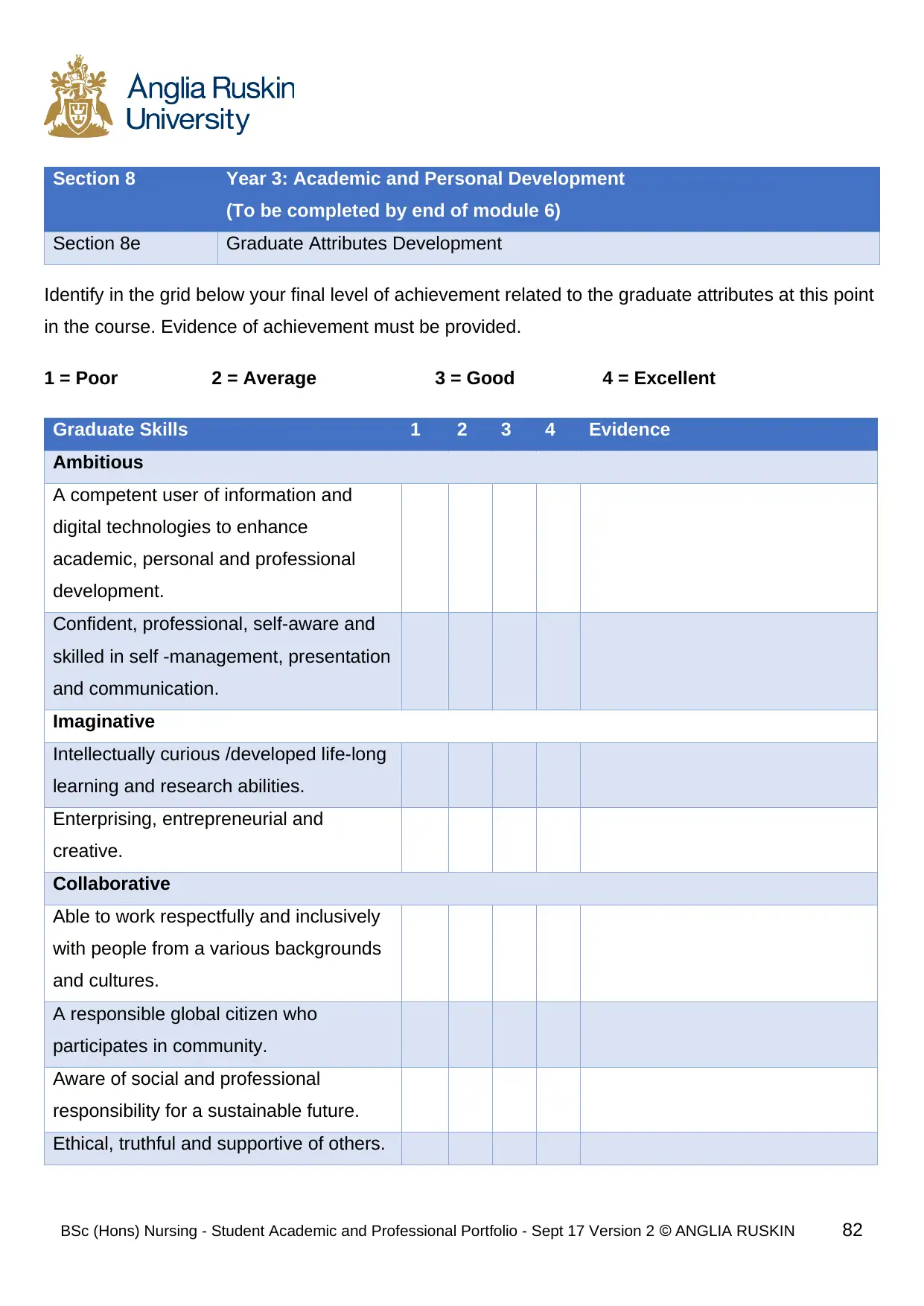
Section 8 Year 3: Academic and Personal Development
(To be completed by end of module 6)
Section 8e Graduate Attributes Development
Identify in the grid below your final level of achievement related to the graduate attributes at this point
in the course. Evidence of achievement must be provided.
1 = Poor 2 = Average 3 = Good 4 = Excellent
Graduate Skills 1 2 3 4 Evidence
Ambitious
A competent user of information and
digital technologies to enhance
academic, personal and professional
development.
Confident, professional, self-aware and
skilled in self -management, presentation
and communication.
Imaginative
Intellectually curious /developed life-long
learning and research abilities.
Enterprising, entrepreneurial and
creative.
Collaborative
Able to work respectfully and inclusively
with people from a various backgrounds
and cultures.
A responsible global citizen who
participates in community.
Aware of social and professional
responsibility for a sustainable future.
Ethical, truthful and supportive of others.
BSc (Hons) Nursing - Student Academic and Professional Portfolio - Sept 17 Version 2 ANGLIA RUSKIN 82
(To be completed by end of module 6)
Section 8e Graduate Attributes Development
Identify in the grid below your final level of achievement related to the graduate attributes at this point
in the course. Evidence of achievement must be provided.
1 = Poor 2 = Average 3 = Good 4 = Excellent
Graduate Skills 1 2 3 4 Evidence
Ambitious
A competent user of information and
digital technologies to enhance
academic, personal and professional
development.
Confident, professional, self-aware and
skilled in self -management, presentation
and communication.
Imaginative
Intellectually curious /developed life-long
learning and research abilities.
Enterprising, entrepreneurial and
creative.
Collaborative
Able to work respectfully and inclusively
with people from a various backgrounds
and cultures.
A responsible global citizen who
participates in community.
Aware of social and professional
responsibility for a sustainable future.
Ethical, truthful and supportive of others.
BSc (Hons) Nursing - Student Academic and Professional Portfolio - Sept 17 Version 2 ANGLIA RUSKIN 82
Secure Best Marks with AI Grader
Need help grading? Try our AI Grader for instant feedback on your assignments.
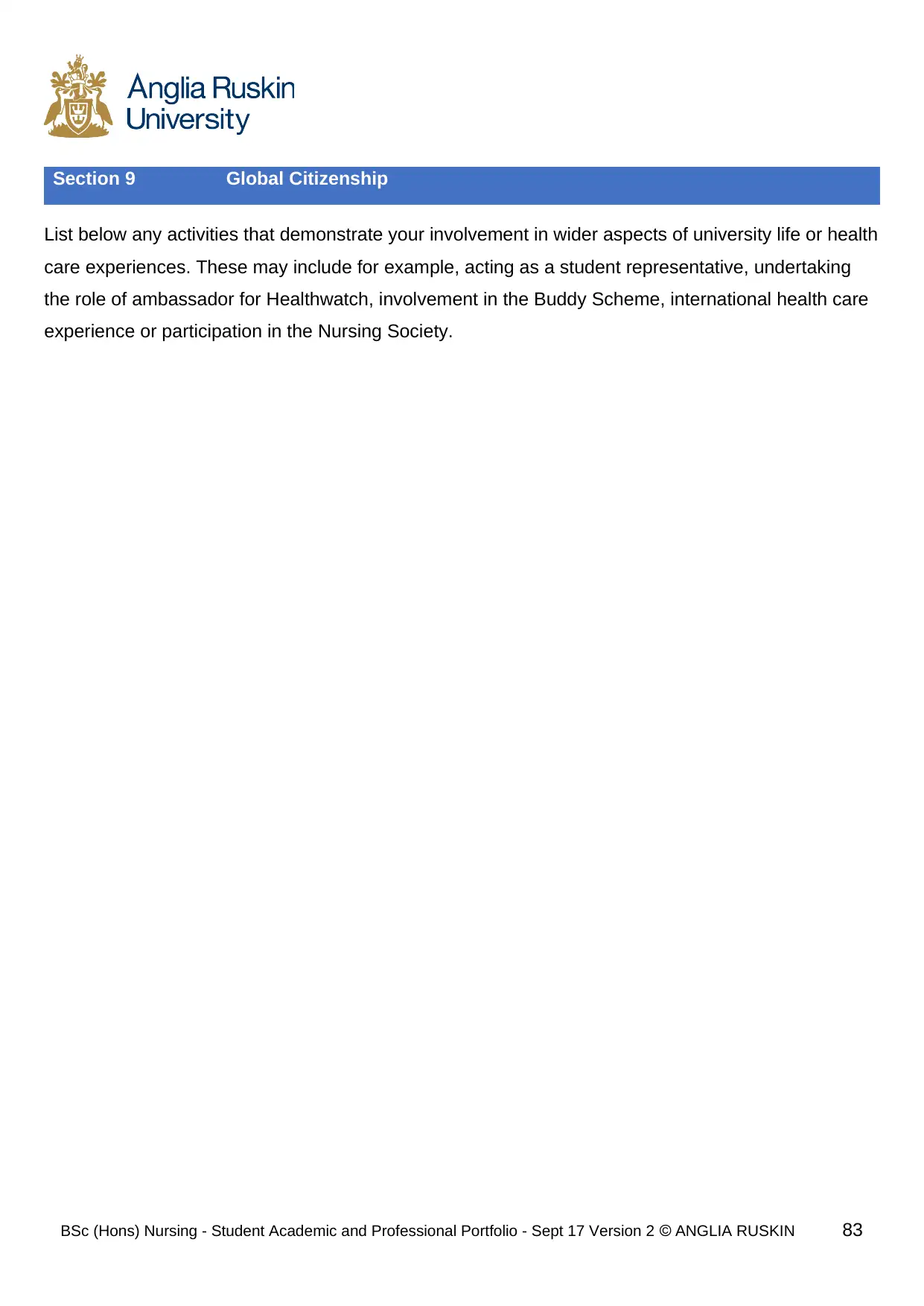
Section 9 Global Citizenship
List below any activities that demonstrate your involvement in wider aspects of university life or health
care experiences. These may include for example, acting as a student representative, undertaking
the role of ambassador for Healthwatch, involvement in the Buddy Scheme, international health care
experience or participation in the Nursing Society.
BSc (Hons) Nursing - Student Academic and Professional Portfolio - Sept 17 Version 2 ANGLIA RUSKIN 83
List below any activities that demonstrate your involvement in wider aspects of university life or health
care experiences. These may include for example, acting as a student representative, undertaking
the role of ambassador for Healthwatch, involvement in the Buddy Scheme, international health care
experience or participation in the Nursing Society.
BSc (Hons) Nursing - Student Academic and Professional Portfolio - Sept 17 Version 2 ANGLIA RUSKIN 83
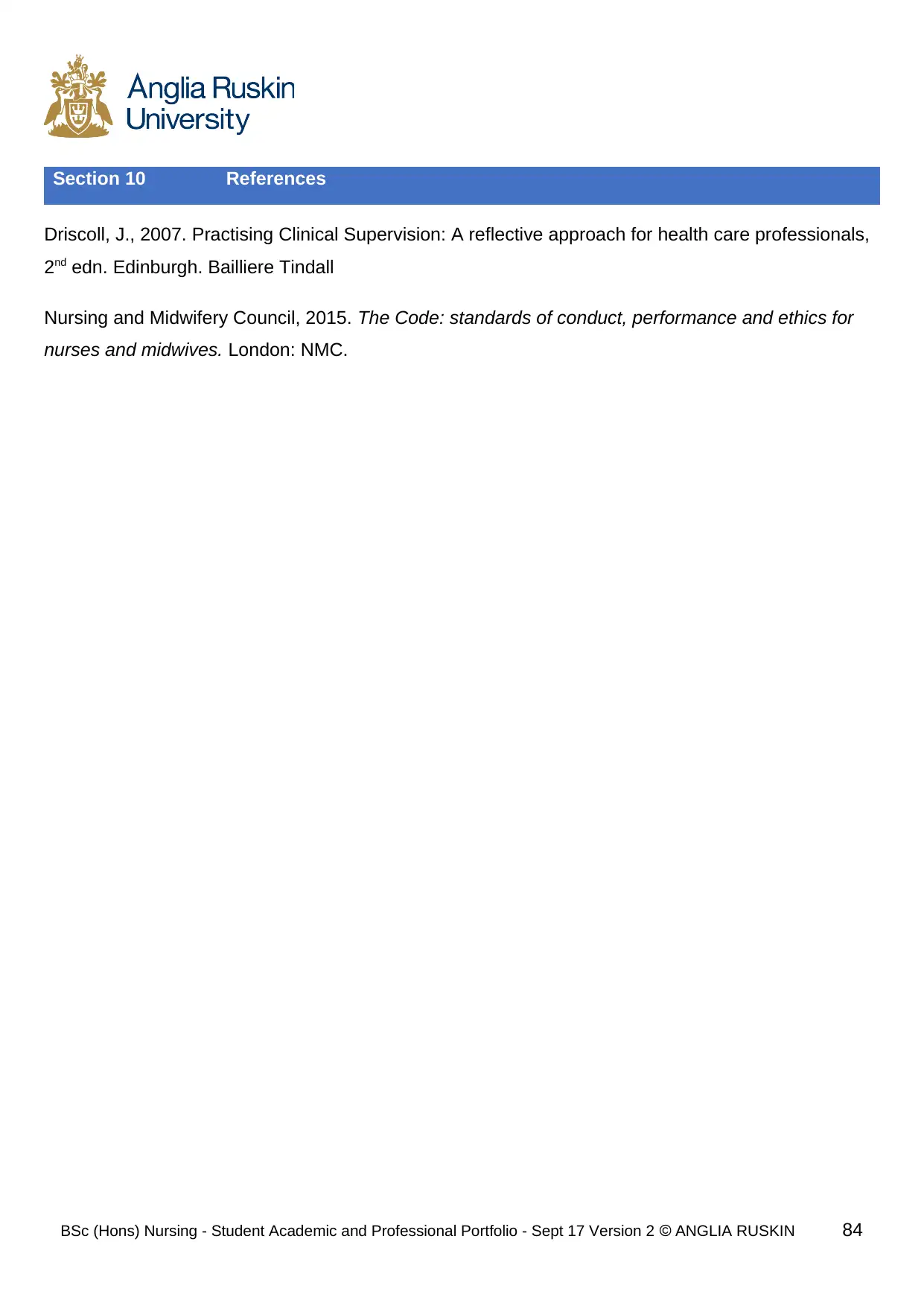
Section 10 References
Driscoll, J., 2007. Practising Clinical Supervision: A reflective approach for health care professionals,
2nd edn. Edinburgh. Bailliere Tindall
Nursing and Midwifery Council, 2015. The Code: standards of conduct, performance and ethics for
nurses and midwives. London: NMC.
BSc (Hons) Nursing - Student Academic and Professional Portfolio - Sept 17 Version 2 ANGLIA RUSKIN 84
Driscoll, J., 2007. Practising Clinical Supervision: A reflective approach for health care professionals,
2nd edn. Edinburgh. Bailliere Tindall
Nursing and Midwifery Council, 2015. The Code: standards of conduct, performance and ethics for
nurses and midwives. London: NMC.
BSc (Hons) Nursing - Student Academic and Professional Portfolio - Sept 17 Version 2 ANGLIA RUSKIN 84
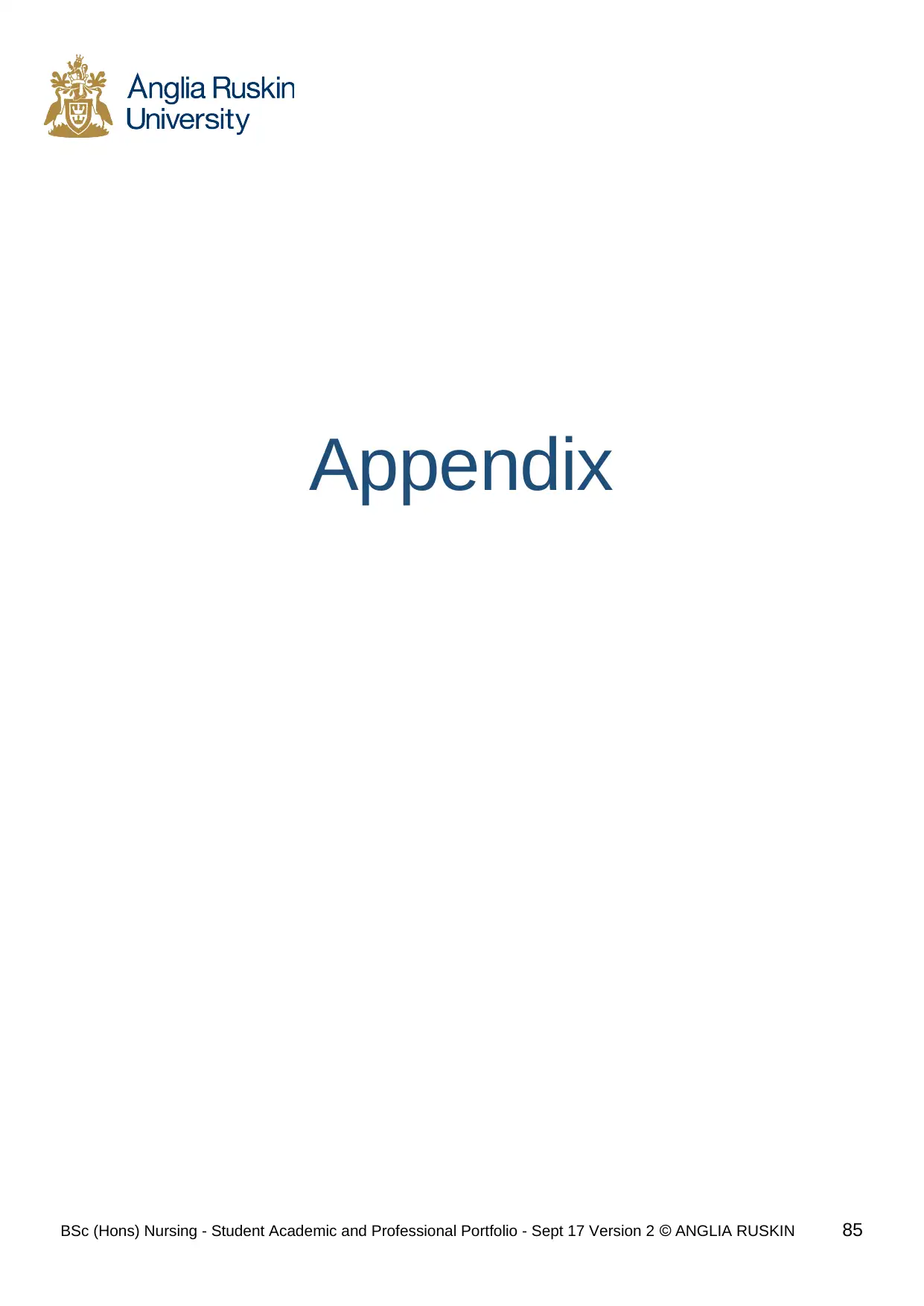
Appendix
BSc (Hons) Nursing - Student Academic and Professional Portfolio - Sept 17 Version 2 ANGLIA RUSKIN 85
BSc (Hons) Nursing - Student Academic and Professional Portfolio - Sept 17 Version 2 ANGLIA RUSKIN 85
Paraphrase This Document
Need a fresh take? Get an instant paraphrase of this document with our AI Paraphraser
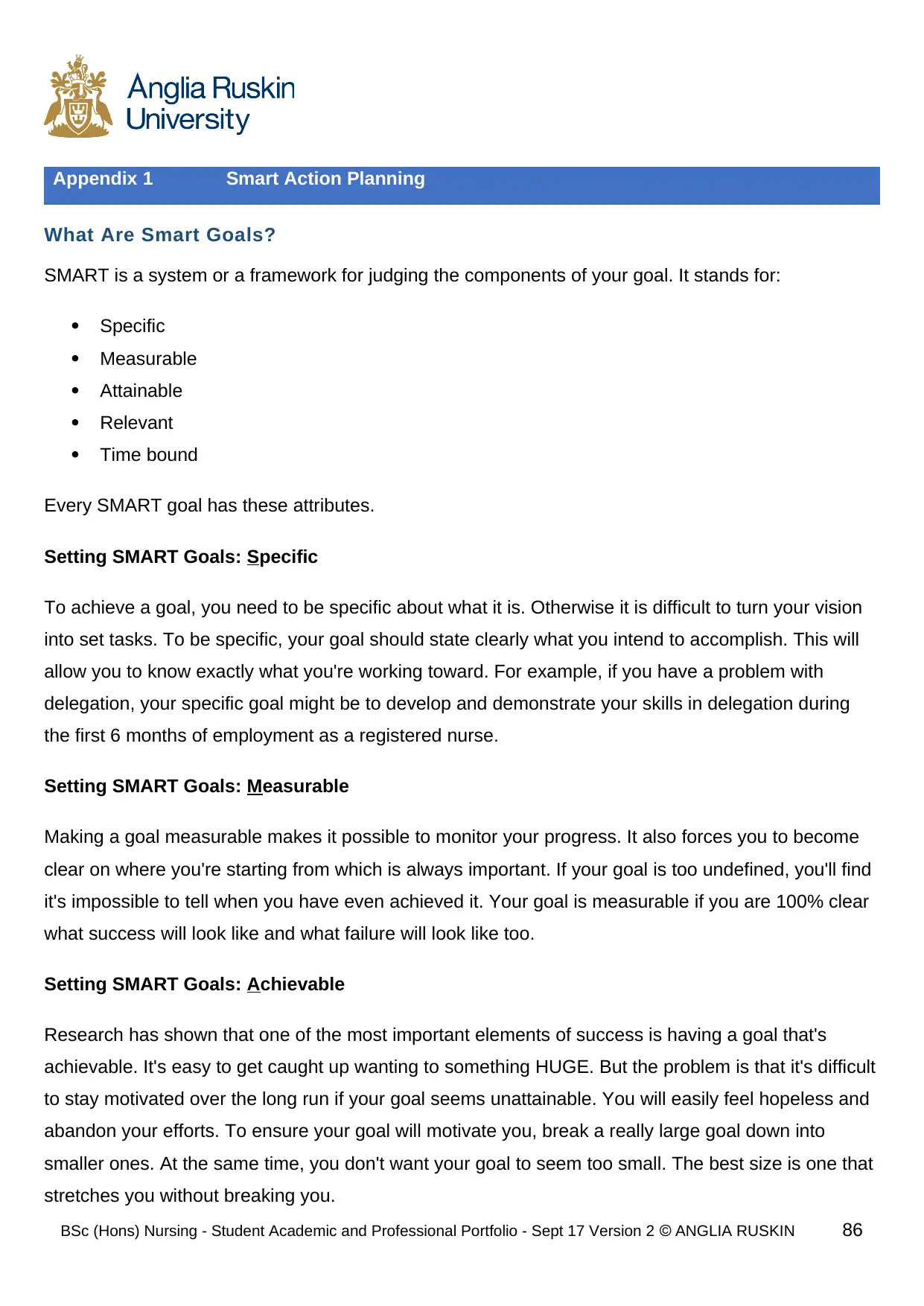
Appendix 1 Smart Action Planning
What Are Smart Goals?
SMART is a system or a framework for judging the components of your goal. It stands for:
Specific
Measurable
Attainable
Relevant
Time bound
Every SMART goal has these attributes.
Setting SMART Goals: Specific
To achieve a goal, you need to be specific about what it is. Otherwise it is difficult to turn your vision
into set tasks. To be specific, your goal should state clearly what you intend to accomplish. This will
allow you to know exactly what you're working toward. For example, if you have a problem with
delegation, your specific goal might be to develop and demonstrate your skills in delegation during
the first 6 months of employment as a registered nurse.
Setting SMART Goals: Measurable
Making a goal measurable makes it possible to monitor your progress. It also forces you to become
clear on where you're starting from which is always important. If your goal is too undefined, you'll find
it's impossible to tell when you have even achieved it. Your goal is measurable if you are 100% clear
what success will look like and what failure will look like too.
Setting SMART Goals: Achievable
Research has shown that one of the most important elements of success is having a goal that's
achievable. It's easy to get caught up wanting to something HUGE. But the problem is that it's difficult
to stay motivated over the long run if your goal seems unattainable. You will easily feel hopeless and
abandon your efforts. To ensure your goal will motivate you, break a really large goal down into
smaller ones. At the same time, you don't want your goal to seem too small. The best size is one that
stretches you without breaking you.
BSc (Hons) Nursing - Student Academic and Professional Portfolio - Sept 17 Version 2 ANGLIA RUSKIN 86
What Are Smart Goals?
SMART is a system or a framework for judging the components of your goal. It stands for:
Specific
Measurable
Attainable
Relevant
Time bound
Every SMART goal has these attributes.
Setting SMART Goals: Specific
To achieve a goal, you need to be specific about what it is. Otherwise it is difficult to turn your vision
into set tasks. To be specific, your goal should state clearly what you intend to accomplish. This will
allow you to know exactly what you're working toward. For example, if you have a problem with
delegation, your specific goal might be to develop and demonstrate your skills in delegation during
the first 6 months of employment as a registered nurse.
Setting SMART Goals: Measurable
Making a goal measurable makes it possible to monitor your progress. It also forces you to become
clear on where you're starting from which is always important. If your goal is too undefined, you'll find
it's impossible to tell when you have even achieved it. Your goal is measurable if you are 100% clear
what success will look like and what failure will look like too.
Setting SMART Goals: Achievable
Research has shown that one of the most important elements of success is having a goal that's
achievable. It's easy to get caught up wanting to something HUGE. But the problem is that it's difficult
to stay motivated over the long run if your goal seems unattainable. You will easily feel hopeless and
abandon your efforts. To ensure your goal will motivate you, break a really large goal down into
smaller ones. At the same time, you don't want your goal to seem too small. The best size is one that
stretches you without breaking you.
BSc (Hons) Nursing - Student Academic and Professional Portfolio - Sept 17 Version 2 ANGLIA RUSKIN 86
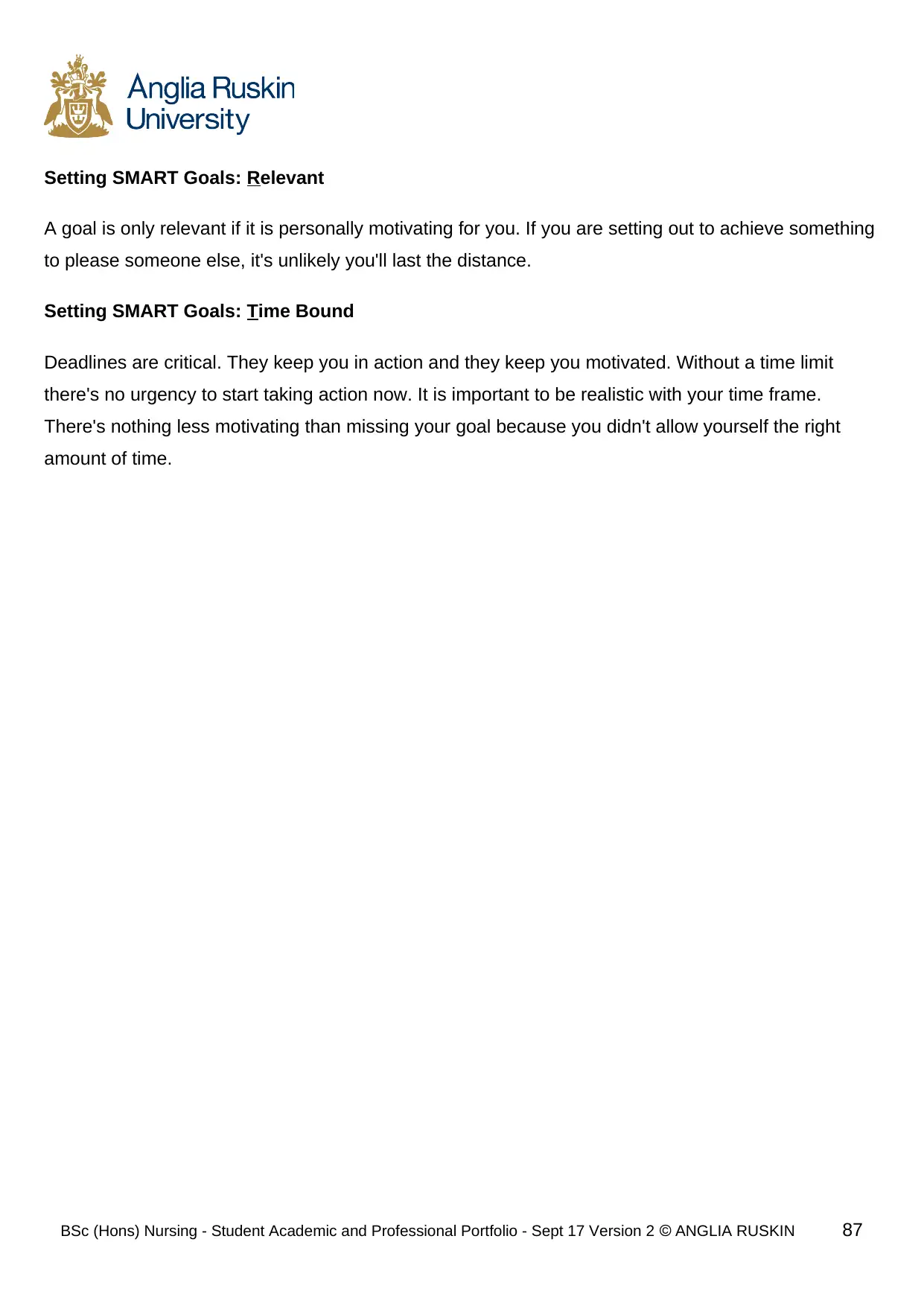
Setting SMART Goals: Relevant
A goal is only relevant if it is personally motivating for you. If you are setting out to achieve something
to please someone else, it's unlikely you'll last the distance.
Setting SMART Goals: Time Bound
Deadlines are critical. They keep you in action and they keep you motivated. Without a time limit
there's no urgency to start taking action now. It is important to be realistic with your time frame.
There's nothing less motivating than missing your goal because you didn't allow yourself the right
amount of time.
BSc (Hons) Nursing - Student Academic and Professional Portfolio - Sept 17 Version 2 ANGLIA RUSKIN 87
A goal is only relevant if it is personally motivating for you. If you are setting out to achieve something
to please someone else, it's unlikely you'll last the distance.
Setting SMART Goals: Time Bound
Deadlines are critical. They keep you in action and they keep you motivated. Without a time limit
there's no urgency to start taking action now. It is important to be realistic with your time frame.
There's nothing less motivating than missing your goal because you didn't allow yourself the right
amount of time.
BSc (Hons) Nursing - Student Academic and Professional Portfolio - Sept 17 Version 2 ANGLIA RUSKIN 87
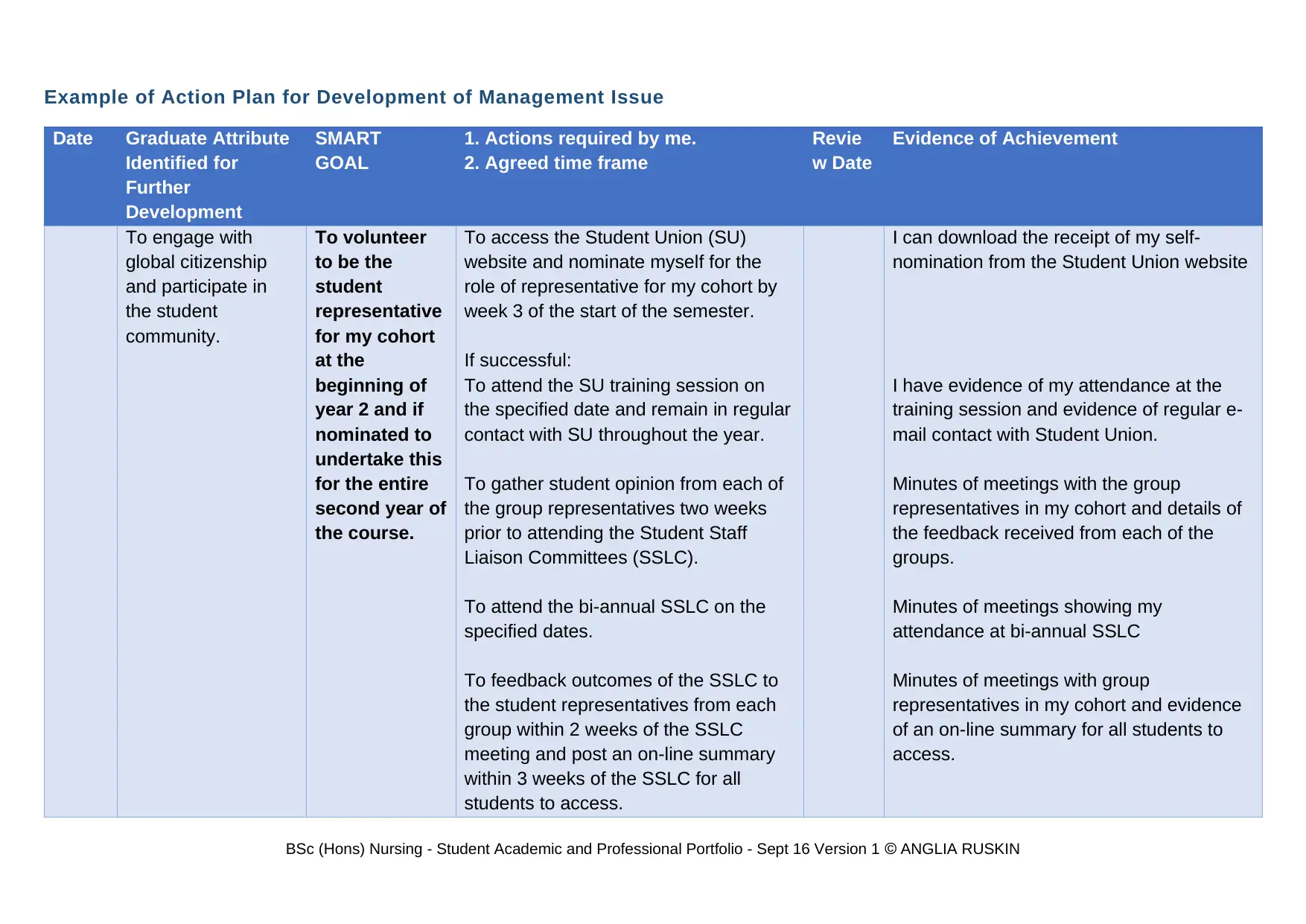
Example of Action Plan for Development of Management Issue
Date Graduate Attribute
Identified for
Further
Development
SMART
GOAL
1. Actions required by me.
2. Agreed time frame
Revie
w Date
Evidence of Achievement
To engage with
global citizenship
and participate in
the student
community.
To volunteer
to be the
student
representative
for my cohort
at the
beginning of
year 2 and if
nominated to
undertake this
for the entire
second year of
the course.
To access the Student Union (SU)
website and nominate myself for the
role of representative for my cohort by
week 3 of the start of the semester.
If successful:
To attend the SU training session on
the specified date and remain in regular
contact with SU throughout the year.
To gather student opinion from each of
the group representatives two weeks
prior to attending the Student Staff
Liaison Committees (SSLC).
To attend the bi-annual SSLC on the
specified dates.
To feedback outcomes of the SSLC to
the student representatives from each
group within 2 weeks of the SSLC
meeting and post an on-line summary
within 3 weeks of the SSLC for all
students to access.
I can download the receipt of my self-
nomination from the Student Union website
I have evidence of my attendance at the
training session and evidence of regular e-
mail contact with Student Union.
Minutes of meetings with the group
representatives in my cohort and details of
the feedback received from each of the
groups.
Minutes of meetings showing my
attendance at bi-annual SSLC
Minutes of meetings with group
representatives in my cohort and evidence
of an on-line summary for all students to
access.
BSc (Hons) Nursing - Student Academic and Professional Portfolio - Sept 16 Version 1 ANGLIA RUSKIN
Date Graduate Attribute
Identified for
Further
Development
SMART
GOAL
1. Actions required by me.
2. Agreed time frame
Revie
w Date
Evidence of Achievement
To engage with
global citizenship
and participate in
the student
community.
To volunteer
to be the
student
representative
for my cohort
at the
beginning of
year 2 and if
nominated to
undertake this
for the entire
second year of
the course.
To access the Student Union (SU)
website and nominate myself for the
role of representative for my cohort by
week 3 of the start of the semester.
If successful:
To attend the SU training session on
the specified date and remain in regular
contact with SU throughout the year.
To gather student opinion from each of
the group representatives two weeks
prior to attending the Student Staff
Liaison Committees (SSLC).
To attend the bi-annual SSLC on the
specified dates.
To feedback outcomes of the SSLC to
the student representatives from each
group within 2 weeks of the SSLC
meeting and post an on-line summary
within 3 weeks of the SSLC for all
students to access.
I can download the receipt of my self-
nomination from the Student Union website
I have evidence of my attendance at the
training session and evidence of regular e-
mail contact with Student Union.
Minutes of meetings with the group
representatives in my cohort and details of
the feedback received from each of the
groups.
Minutes of meetings showing my
attendance at bi-annual SSLC
Minutes of meetings with group
representatives in my cohort and evidence
of an on-line summary for all students to
access.
BSc (Hons) Nursing - Student Academic and Professional Portfolio - Sept 16 Version 1 ANGLIA RUSKIN
1 out of 88
Related Documents
Your All-in-One AI-Powered Toolkit for Academic Success.
+13062052269
info@desklib.com
Available 24*7 on WhatsApp / Email
![[object Object]](/_next/static/media/star-bottom.7253800d.svg)
Unlock your academic potential
© 2024 | Zucol Services PVT LTD | All rights reserved.





